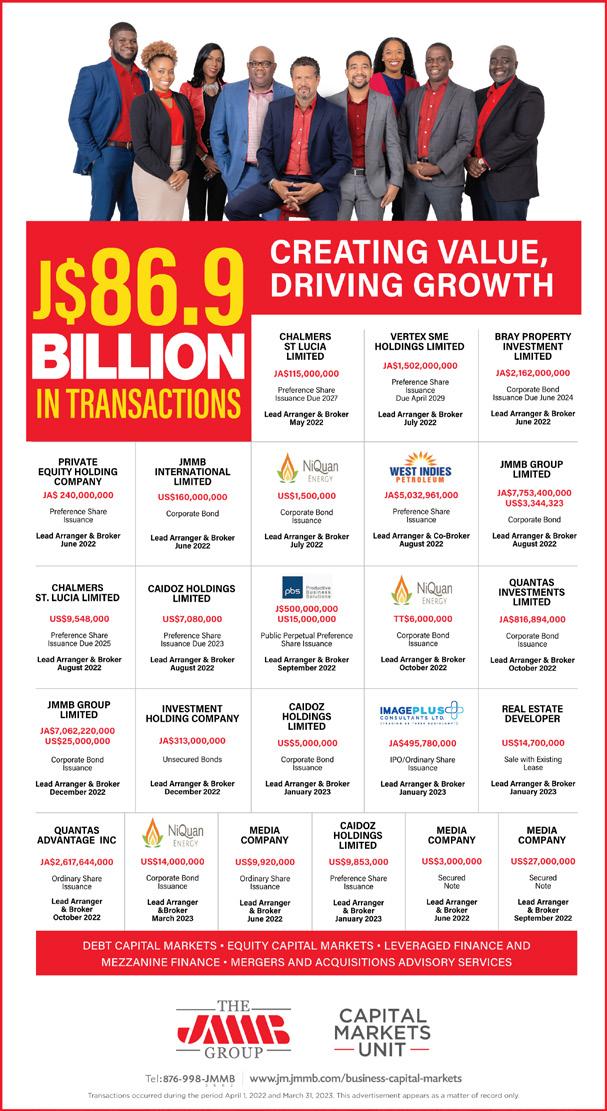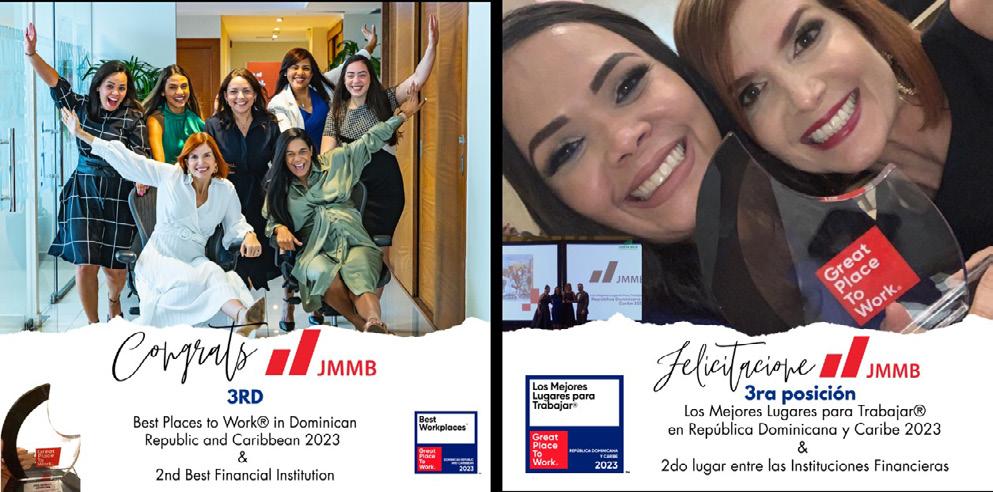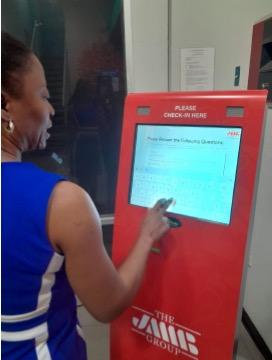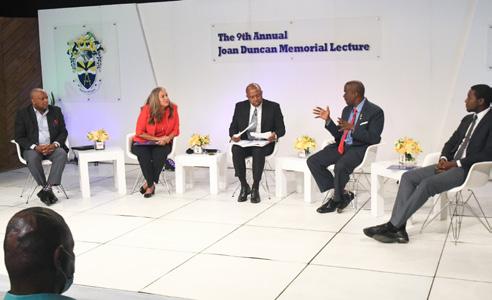




To maximise client satisfaction through exceptional client care and world-class financial advice and expertise.
Solidity, ethics, credibility and openness are hallmarks of JMMB as experts in all aspects of our operations.
To be a dynamic, international, multifaceted financial group with a caring, loving and fun environment where team members are productive, creative, happy and fulfilled.
We promise to keep your best interest at heart, and we will do so by listening to, understanding and caring for you and your family’s unique needs, exceeding your greatest expectations by providing simple, transparent solutions oriented around you and your family’s life goals.








RESTRUCTURING

CORPORATE
CHAIRMAN'S

GROUP EXECUTIVE LEADERS' PROFILES
HEADS OF ENTITIES
CORPORATE GOVERNANCE
RISK MANAGEMENT
ENVIRONMENTAL SUSTAINABILITY
INFORMATION TECHNOLOGY
DIGITAL SERVICES
MARKETING REPORT
GROUP CULTURE & HUMAN DEVELOPMENT
CLIENT INTIMACY & EXPERIENCE
VISION OF LOVE
JOAN DUNCAN FOUNDATION
TOP 10 SHAREHOLDERS
SHAREHOLDINGS OF DIRECTORS
SHAREHOLDINGS OF SENIOR MANAGERS
CORPORATE INFORMATION
PROXY FORM
DIRECTORS' REPORT
FINANCIAL STATEMENTS


United by purpose, connected at heart –we achieve together.
NOTICE IS HEREBY GIVEN that the TENTH ANNUAL GENERAL MEETING of JMMB GROUP LIMITED (the “Company”) will be held on FRIDAY OCTOBER 6, 2023 at 10: 30 a.m. (Jamaica) in a hybrid format (i) at the AC Hotel Kingston located at 38-42 Lady Musgrave Road, Kingston 5 Jamaica, for attendance in person, and (ii) via electronic means* in accordance with the provisions of the Companies Act of Jamaica 2004 (as amended) to consider and if thought fit, to pass the following ordinary resolutions:
1. TO RECEIVE THE REPORTS OF THE DIRECTORS AND AUDITORS AND THE AUDITED ACCOUNTS FOR THE TWELVE (12) MONTHS ENDED MARCH 31, 2023.
“THAT the Reports of the Directors and Auditors and the Audited Accounts for the year ended March 31, 2023, circulated with the Notice convening the meeting be and are hereby adopted”.
2. RATIFY INTERIM DIVIDEND PAYMENTS AND DECLARE THEM FINAL.
“THAT the interim dividend of Twenty-Five Cents (25¢) paid on July 11, 2022, be and is hereby ratified and declared as final and that no further dividend be paid in respect of the year under review”.
3. TO RE-APPOINT DIRECTORS RETIRING BY ROTATION PURSUANT TO ARTICLE 105.
The Directors retiring from office by rotation pursuant to Article 105 of the Company’s Articles of Incorporation are Dr. Anne Crick, Mrs Patricia Dailey-Smith, Mrs Audrey Deer-Williams and Mr Reece Kong, all of whom, being eligible, offer themselves for re-election.
To consider and (if thought fit) pass each of the following resolutions:
Resolution 3 (a): “THAT Dr. Anne Crick be and is hereby re-elected a Director of the Company.”
Resolution 3 (b): “THAT Mrs. Patricia Dailey-Smith be and is hereby re-elected a Director of the Company.”
Resolution 3 (c): “THAT Mrs. Audrey Deer Williams be and is hereby re-elected a Director of the Company.”
Resolution 3 (d): “THAT Mr. Reece Kong be and is hereby re-elected a Director of the Company.”
4. ELECTION OF OTHER RETIRING DIRECTOR PURSUANT TO ARTICLE 108.
In accordance with Article 108 of the Articles of Incorporation, the following Director, having been appointed during the year, retires and is eligible for re-election.
“That Director Leighton McKnight, having been appointed during the year, be and is hereby elected a director of the Company”.
5. TO APPOINT AUDITORS AND AUTHORISE THE DIRECTORS TO FIX THE REMUNERATION OF THE AUDITORS.
“THAT KPMG, Chartered Accountants, having agreed to continue in office as auditors, be and are hereby appointed auditors of the Company to hold office until the end of the next Annual General Meeting at a remuneration to be fixed by the Directors of the Company.”
“THAT the amount included in the Audited Accounts of the Company for the year ended March 31, 2023, as remuneration for their services as Directors be and is hereby approved.”
Dated this 4th day of August 2023
By Order of the Board
Carolyn DaCosta, JP Company Secretary
REGISTERED OFFICE:
6 Haughton Terrace, Kingston 10, Jamaica.
NB: A member entitled to vote at the meeting is entitled to appoint a Proxy to attend and vote in his stead. A Proxy need not be a member of the Company. Enclosed is a Proxy Form for your convenience, which must be lodged at the Company’s Registered Office at least forty-eight (48) hours before the time appointed for holding the meeting. The Proxy Form shall bear the stamp duty of J$100.00. The stamp duty may be paid by adhesive stamp(s) to be cancelled by the person executing the Proxy Form.
*NB: The details of the electronic methods of accessing the meeting online will be shared shortly via our website and in daily newspapers and, in any event, at least 21 days before the date fixed for the holding of the Annual General Meeting.
August 4, 2023
Dear Valued Shareholder,
We are pleased to invite you to our Annual General Meeting (AGM) on October 6, 2023, where we will share the results of our performance for the financial year ended March 31, 2023, and discuss our strategic plans for the near future.
The Notice of AGM can be found on page 3 of this Annual Report.
For the convenience of all shareholders, the meeting will be streamed live for viewing, via our website (www.jmmb. com) and our interactive platform, details of which will be published in the newspapers and on www.jmmb.com at least 21 days before the meeting. An email advisory will also be disseminated to all shareholders for whom we have a current email address.
A contactless system will be observed for the distribution of our annual report. The meeting documents will be accessible for viewing and downloading on the following websites:
• www.jmmb.com
• www.jamstockex.com
• www.stockex.co.tt
Should you require a hard copy of the annual report, please send an email to shareholderquery@jmmb.com, and we will make arrangements to accommodate your request.
Finally, we would also like to take this opportunity to thank you for your partnership and for choosing to be a part of the JMMB family.
Sincerely,
Archibald Campbell, CD, DBA, FCA Group Chairman
The original operating entity, Jamaica Money Market Brokers Ltd. (JMMB), opened its doors in November 1992 as the first of its kind in Jamaica. This was to be the beginning of a legacy built on the core values of integrity, care, honesty and openness, underpinned by the Vision of Love. Thirty years later, the vision that led to the launch of JMMB (1992) fueled its evolution from a single operating entity to the JMMB Group. This Group, now a financial services group of companies, serves over 460,000 clients and their families in Jamaica, Trinidad and Tobago and the Dominican Republic. Genuine care for clients, credibility, talent and expertise have catapulted the JMMB Group to become a successful, dynamic, international, multi-faceted financial services group that is valued for its commitment to heart-to-heart connections, providing genuine, caring relationships and proactively delivering personalised financial solutions across banking, investment and insurance brokerage services.
In 2015, JMMB was replaced as the parent company of the JMMB Group by JMMB Group Limited (JMMBGL), a newly formed company incorporated in Jamaica under the Companies Act (2014). This was achieved by a court's actioned and shareholder-approved Scheme of Arrangement between the two companies and their shareholders. On implementation of the Scheme of Arrangement, JMMBGL became the holding Company of the JMMB Group, which includes the companies listed in the chart set out below. As part of the reorganisation, JMMB's ordinary shares were delisted from the JSE, the BSE and the TTSE, and JMMBGL's ordinary shares were listed instead. As a subsequent event, the Board took the
decision to apply to delist JMMBGL's existing ordinary shares from the BSE due to consistent generally low trading volumes on the BSE, as well as the costs of maintaining the listing on the BSE. The Company's ordinary shares have since been delisted from the BSE. This portfolio of companies has positioned the JMMB Group to become a financial force to be reckoned with in the region and the wider international marketplace and has significantly strengthened its ability to truly deliver partnerships with clients in achieving their life goals.
JMMB Group's commitment to corporate social responsibility is actualised through the JMMB Joan Duncan Foundation (the "Foundation"). The Foundation seeks to positively impact individuals, communities and the nation through transformational projects whose primary objective is to unearth individual greatness, resulting in a paradigm shift in attitudes and behaviours. This effort is carried out primarily through nationbuilding projects, educational and transformational training, as well as entrepreneurial transformation and hands-on community involvement.
The JMMB Group is poised for even greater success as it continues to expand locally and regionally and buildout core business lines by investing in infrastructure, technology and training and improving service channel delivery. All of the phases of the Group's journey have been birthed out of a vision to ultimately build a financial services entity equipped with all the solutions needed to help individuals and businesses achieve their dreams.
JMMB Group Limited conducted a restructuring exercise involving some of its Jamaican member companies. This restructuring was undertaken following receipt of the non-objection from the Bank of Jamaica (“BOJ”) and is part of a wider restructuring exercise being undertaken by the Group. The restructuring exercise is aimed at harmonizing the Group’s overall corporate structure for its local and overseas holdings with the structure required for financial groups under the Banking Services Act, 2014 (“BSA”) by separating financial services companies in the Group from the nonfinancial companies.
JMMB Financial Holdings Limited (“JMMBFH”) was incorporated as a new direct wholly-owned subsidiary of JMMBGL to hold, directly and indirectly, the shares of all of the financial services companies within the Group. The Jamaican entities now held within the financial group headed by JMMBFH as a result of the restructuring are:
(i) Jamaica Money Market Brokers Limited, together with its wholly-owned subsidiaries:
a. JMMB Insurance Brokers Limited
b. JMMB Securities Limited, and
c. JMMB Fund Managers Limited
(ii) JMMB Bank (Jamaica) Limited
(iii) JMMB Money Transfer Limited
As a result of the restructuring, the non-financial Jamaican companies formerly owned by Jamaica Money Market Brokers Limited, i.e., JMMB Real Estate Holdings Limited and Capital and Credit Securities Limited, are now all held outside of the financial group under the direct ownership of JMMBGL.
The entities in Trinidad and Tobago, the Dominican Republic and Barbados will also be restructured subject to received regulatory approval in line with the mandate of the Banking Services Act (2014).





See List of Regulators on page 8 of this Annual Report.
* Associated Company


Partnerships forged in trust.
We are pleased to submit the Annual Report for JMMB Group Limited for the year ended March 31, 2023. The JMMB Group posted a Net Profit of J$6.3 billion and an Operating Revenue of J$23.4 billion. Earnings Per Share stood at J$3.15 .
The JMMB Group demonstrated its ability to deliver sound performance during a contractionary and high inflationary environment. Our results, though below the levels of the previous financial year, reflected the skilful execution of our business plans and our success in controlling costs and asset levels. As a result, the Group was able to post solid profits in a challenging environment, while continuing to lay the groundwork for expanding our client base and building out our medium to long-term strategies .
JMMB Group saw promising results from our operations in Trinidad and Tobago and steady results from our operations in Jamaica and the Dominican Republic. Overall, the core businesses of the Group, including our Banking Services business lines, continued to show growth. A more in-depth analysis of the performance of each business line and of our overall results is presented in the Management Discussion and Analysis Section of this Report.
KEY
OF THE FY 2022/23
We continue to reap the success of our diversification strategy. Both the banking and investment management business lines were able to deliver credible results in the face of a high inflationary-high interest rate environment. The JMMB Group's strategic investment in Sagicor Financial Company (SFC) contributed significantly to our overall profitability, which saw positive returns for the Group.
The Group reinforced its strategic plan by focusing more intensely on building our digital capabilities to better serve our clients across the region. During the year, we launched our core online banking solution, Moneyline, in the Dominican Republic as we work to increase our digital footprint in that region. Our Point of Sale (POS) solution was also rolled out in Jamaica for our business clients in the Corporate and SME segments.
In 2022, CariCRIS upgraded JMMB Group Limited's corporate credit ratings on the Jamaica national scale. The national scale ratings indicate the 'high creditworthiness' of JMMB Group compared to other obligors in Jamaica. CariCRIS' upgrade is based primarily on a notable improvement in the Group's financial risk profile over the last three years.
Consistent with our commitment to disciplined capital management, the Group has further strengthened its risk management framework by implementing its RiskAdjusted Return on Capital (RAROC) Model, maintaining a solid capital position across the Group. The Group's liquidity positions remain strong and adequately able to respond effectively to external shocks.
On behalf of the Board, I sincerely thank all our valued shareholders and clients for their continued support and confidence in the Group.
I also express my most profound appreciation to the management team for their leadership and for driving the strategy and implementation of the Group's plans. To our team members in all the territories we operate, thank you for your contribution, dedication, loyalty, and


hard work in driving the Group's business sustainability while building their career path with the Group. I am very confident that with everyone's continued commitment, perseverance, and teamwork, the Group will be able to realize its vision and mission. Finally, I wish to place on record my deepest gratitude to my fellow members of the Board for their immense contributions, wise counsel and confidence in the direction of the Group.
During 2022, the Board was fully engaged and supportive in reviewing and steering the direction of the Group's Strategic Objectives. This included approving updated operational, financial, and capital allocation targets for the Group —underpinned by strategies and initiatives to achieve them. We continued laying the groundwork for future success by reinforcing our already strong governance and compliance culture to safeguard our stakeholders' interests and ensure longterm shareholders' value creation.
Moving forward, we will continue to seek opportunities to drive our business forward with our diversified services by leveraging our strong track record and capabilities that we have built over the years to ensure the viability of the business. We will continue to pursue value creation, business sustainability, and growth strategies in all business segments of the Group.
The management will continue to build out the operational plan to achieve our long-term strategy, exercise financial prudence and tighten operating costs to maximize shareholder value.
Our foundation for future growth has been established, and we have navigated the obstacles to pursue our strategies. Despite the challenging economic climate that may lie ahead, we firmly believe the JMMB Group is on track for longterm growth and success. We are confident our actions to develop a more sustainable business model will allow the Group to continue delivering solid results yearly.

ARCHIBALD CAMPBELL, CD, DBA, FCA GROUP CHAIRMAN






DR ARCHIBALD CAMPBELL, CD, DBA, FCA – CHAIRMAN INDEPENDENT DIRECTOR
Archibald is the Chairman of JMMB Group Limited and a number of its Subsidiaries, as well as the Board of Trustees of the JMMB Pension Fund. Prior to this, he served as a director at the University Hospital of the West Indies. He was also a member of the Sugar Industry Divestment negotiation team, a trustee of two pension funds and a director of several companies, including hotels, property management companies, banks, tertiary-level institutions and a number of non-profit organisations.
He was a lecturer at the University of the West Indies (UWI), where he taught accounting as well as Risk Management in the Banking Degree. Archibald also served as Bursar of the UWI and Chief Financial Officer with responsibility for maintaining relations with the seventeen (17) contributing Caribbean countries regarding funding. He is a Chartered Accountant and is a member and past president of the Institute of Chartered Accountants of Jamaica (ICAJ). He was presented with the Distinguished Member Award for 2020 by the ICAJ for his outstanding contribution to the institute and the accountancy profession.
In 2021 the Government of Jamaica awarded him The Order of Distinction, Commander Class (CD) for exemplary service to his profession in the fields of accounting and finance. Archibald is a published author and speaker in the accounting and finance sectors. With a Doctorate in Business Administration (DBA) and an M.Sc. in Accounting from the University of the West Indies, extensive international training and certification and over 40 years of experience in the banking industry, Archibald is an unmatched resource.
KEITH DUNCAN, CD – GROUP CHIEF EXECUTIVE OFFICER EXECUTIVE DIRECTOR
Keith is an Executive Director and the Group Chief Executive Officer of the JMMB Group of Companies. He has responsibility for overall performance and charting the strategic direction of the Group. His financial expertise has benefited not only the JMMB Group but also the Jamaican financial sector. Keith served as President of the Private Sector Organization of Jamaica (PSOJ) for the period 2019 - 2022, which was during unprecedented times of the COVID-19 Pandemic. He also served as a Vice-President of the PSOJ from 2013 – 2015 and is currently Co-Chair of PROJECT STAR - A partnership for social & economic transformation In Jamaica.
Keith is a former President of the Jamaica Securities Dealers Association (JSDA). He continues to contribute his service to Jamaica through various roles, including his current appointment as Chairman of the Economic Programme and Oversight Committee (EPOC). He is the immediate past Chairman of the National Information and Communications Technology Advisory Council (NICTAC), which provides advisory services to the Ministry of Science, Energy and Technology in relation to its ICT Portfolio. Under his leadership, the JMMB Group was conferred with the American Foundation for the University of the West Indies (AFUWI) Award for Excellence in Business Leadership in February 2020 and the prestigious ‘Best of Chamber Award’ from the Jamaica Chamber of Commerce in March 2011.
Known for his commitment to youth development, Keith served as Chairman of the National Youth Service from 2003 to 2009. He worked closely with the respective boards and teams to fulfil the mission of creating and reforming Jamaica’s youth to become purposeful citizens. He is also a founding member of the YUTE Programme in Jamaica (Youth Upliftment through Employment). In 2020, Keith was awarded the National Honour, the Order of Distinction, in the rank of Commander, by the Government of Jamaica, for his exceptional service in the fields of Finance, Business, Youth Empowerment and Community Development. In April 2022, Keith received the International Achievement Award from The American Friends of Jamaica (AFJ) for his leadership and work in National Development.
He holds the Chartered Financial Analyst (CFA), a professional financial designation.




DR. ANNE CRICK
INDEPENDENT DIRECTOR
Anne holds a Master’s degree and a PhD in Organizational Management and is a Senior Lecturer and former Associate Dean and Department Head at the University of the West Indies in the Faculty of Social Sciences. She has served on several boards in Jamaica, including HEART Trust NTA, UCJ Hospitality and Tourism Advisory Board, the Jamaica Customer Service Association and the Jamaica Association for Training and Development. In addition to being an extensively published author, Anne brings to the JMMB Group a wealth of knowledge and experience in managing large teams and developing senior leaders in private-sector organizations. She is a JMMBGL’s Culture and Human Development Board Committee member and chairs its Nomination and Corporate Governance Committee.

ANDREW COCKING INDEPENDENT DIRECTOR
Andrew brings to the Group over 37 years of experience in banking, with over 33 years at the senior management level. He started his banking career in 1985 at Citibank. Andrew’s areas of expertise include treasury management, information technology, mergers and acquisitions, risk management, banking, finance, administration and emerging trends in finance & banking, with a particular interest in technology. Andrew has served on many public and private boards, including Cable & Wireless Jamaica Limited and HEART Trust NTA. As one of the founders of Capital & Credit Financial Group, Andrew served as Deputy Group President of Capital & Credit Financial Group and an independent consultant. He currently serves on the board of Regency Petroleum Company. Before assuming those positions, he served as President and CEO of Capital and Credit Merchant Bank for 11 years.
PATRICIA DAILEY-SMITH INDEPENDENT DIRECTOR
Patricia brings to the JMMB Group over 25 years of experience and has an inexhaustible reservoir of knowledge in accounting, audit and finance. Patricia is a JMMBGL’s Audit and Compliance Committee member and the Chair of JMMBGL’s Board Finance Committee. Patricia retired from the position of Audit Partner at KPMG, having served the firm locally and internationally at varying senior management levels. While at KPMG, Patricia managed large portfolios covering a broad cross-section of industries, including banking, insurance and other financial services, telecommunications, hospitality, leisure and tourism, manufacturing, healthcare, Government and education.




AUDREY DEER- WILLIAMS INDEPENDENT DIRECTOR
Audrey is the Chief Technical Director assigned to the Social Security Division of the Ministry of Labour and Social Security. She worked in various capacities in the United States in the financial services sector prior to her service in the public sector in Jamaica. Audrey is a distinguished public servant whose extensive training and expertise in multiple areas have made her an invaluable resource to the JMMB Group. She holds an undergraduate degree in Economics and Accounting and a Master’s in Business Administration from Manchester Business School, Manchester, England. She is the Chair of the Group Culture and Human Development Committee, and she sits on the JMMBGL Board Risk Committee.

DONNA DUNCAN-SCOTT EXECUTIVE DIRECTOR
Donna is passionate about building and maintaining the love-based culture, which supports the Group's competitive advantage. As an authentic, principled, love-based leader, she works with the Culture and Human Development Team (CHDT) to create and implement the people-operating frameworks, people policies, processes, and practices that develop and maintain our unique culture. The CHDT supports team members to "realise the greatness within, to the benefit of themselves, our clients, the organisation and the society" (Our Vision of Love). She also has extended this transformational thinking to developing the Conversations for Greatness programme, which provides individuals with the tools for a mindset change to increase the experience of love and possibility thinking.
Donna holds a Bachelor's degree in Industrial Engineering from UWI, St Augustine, and a Master of Business Administration from the Richard Ivey School of Business at the University of Western Ontario in Canada. She also holds the prestigious international Chartered Financial Analyst professional designation. With the birth of her two daughters in quick succession, she chose to swap the emotionally demanding role of the Group CEO, which she assumed after her mother's passing and co-founder of JMMB, for the role of Group Lead for the Culture and Human Development Team. This allowed her to focus on her passion for creating spaces for individuals to realise their greatness through motherhood and organisational transformation. During her five years at the Company's helm, she led the team in becoming a full-service brokerage company, expanding regionally and growing our brokerage client base to the largest in the Caribbean. Donna is the recipient of several awards, most notable of which include the Jamaica Observer Business Leader Award in 2002 for her stellar leadership, then at the helm at JMMB, and later the Lifetime Achievement Award in 2017, for outstanding contribution to the field and her unwavering commitment to Jamaica. In 2022, Donna was awarded the AFJ International Humanitarian Award and The JHUAN Impact Award for work that embodies excellence in truth and service and has positively impacted the broader community.
HUGH DUNCAN NON-INDEPENDENT DIRECTOR
Hugh has over 30 years of experience in Retail, Corporate and Investment banking in senior positions and brings a diverse and valuable interplay of skills to the Group Board.
He held senior positions at the CEO, Directorship and Vice Presidential levels in Jamaica, The Philippines, Trinidad & Tobago and other Caribbean territories. He serves on the Board of JMMB Bank (T&T) Limited, a reporting issuer in Trinidad and Tobago. Hugh holds a Bachelor’s degree in Finance and Management and a Master’s degree in Business Administration, focusing on Finance and Marketing.




1

DENNIS HARRIS INDEPENDENT DIRECTOR
A certified accountant with over 40 years of experience locally and internationally, Dennis brings an unparalleled wealth of experience and knowledge in finance and strategic business management. Dennis served as the Managing Director of Unicomer (Jamaica) Limited (which trades as Courts, Lucky Dollar, Ashley, Ready Cash and Radio Shack) from 2011 until his retirement in August 2021. He was also the Executive Leader of the Courts USA stores in New York and was the Chairman of Trustees for the Company's pension plan. Before he was appointed Managing Director, he served as Regional Finance Director of Courts Caribbean with responsibility for Finance, Consumer Credit and IT; before that, as Deputy Managing Director of the Courts Jamaica operations with responsibilities that included Marketing, IT and Consumer Credit.
Dennis qualified as an accountant (FCCA) in the UK and, before his return to Jamaica, worked as Finance Director in the United Kingdom, including finance oversight of a Dutch subsidiary.
In addition to his position on the JMMB Group Board, Dennis also Chairs the Board of JMMB Bank Jamaica and the Group Board Risk Committee. Dennis also serves as an Independent Director of Sagicor Financial Company Limited (SFC), which trades on the Toronto Stock Exchange, and Gallagher Caribbean Group Limited, the largest insurance brokers in the Caribbean. He also serves as Chairman of the Audit Committee for SFC.
REECE KONG
Reece has almost three decades of experience as an information technology professional. His information technology expertise includes the development of Automated Fingerprint Identification Systems (AFIS) Document Imaging and Business Process Reengineering. He was also the chief architect of the first computerised Government Accounting System developed and deployed in Jamaica. Reece started his company in 1998– RMP & Associates Limited, which has grown to be one of Jamaica’s leading technology firms, providing technological expertise to various government agencies, financial institutions and other corporate entities. Most notably, Reece and his company were responsible for developing the Government of Jamaica’s Central Treasury Management System (CTMS), a key tool in the Government’s IMF-guided financial restructuring. He chairs the Information Technology Board Committee and is a member of the Board Risk Committee.
Leighton brings to the Board over 36 years of extensive and diversified experience in audit, taxation, financial management, reporting, business advisory services, and management consulting. He recently retired as the Territory Leader/Senior Partner of PricewaterhouseCoopers [PwC] Jamaica, one of the premier professional services firms on the island. Leighton was also the firm’s markets’ leader and a PwC Caribbean Region’s Core Leadership Team member, where he served as the Diversity, Equality & Inclusion Leader. He also served as the region’s Advisory Leader and locally as managing partner, assurance leader and human capital leader.
Leighton is a graduate of the University of the West Indies, a Fellow member of the Institute of Chartered Accountants of Jamaica, and a Fellow member of the Association of Chartered Certified Accountants. He is currently an Executive in Residence at the Mona School of Business and Management at the University of the West Indies, Mona Campus. Leighton is a renowned member of the Kiwanis International movement and a Trustee on its Eastern Canada & the Caribbean District board. He has given decades of service to this organization, and his contributions have been recognized with several prestigious awards. In 2013, the Government of Jamaica appointed him to the Order of Distinction, Commander Class for outstanding contribution to Public Service, Philanthropy and Community Service.




1

H. WAYNE POWELL, O.D, J.P INDEPENDENT DIRECTOR
Wayne is a Business, Financial and Leadership Consultant who served as Vice-President at Scotiabank International, serving the English-Speaking Caribbean, and Executive Vice-President at Scotiabank Jamaica. He has been recognized at the national level, Order of Distinction, for his extraordinary contribution to the banking sector in Jamaica. As a finance, business and leadership consultant, he brings to the JMMB Group over 45 years of knowledge and experience in the financial sector, both locally and internationally. Wayne is also known for his contribution to nation-building as a Commissioner on the Integrity Commission of Jamaica, a Justice of the Peace, and through his membership in and Past President of the Rotary Club of New Kingston. He also serves in charitable organizations, including currently serving as Chairman of the Open Arms Development Centre Limited. Wayne also sits on several corporate and public sector boards and is a member of the JMMB Group’s Audit, Finance, and Culture & Human Development Board Committees. He is also a director of JMMB Bank and chairman of the Bank’s Board Credit Committee. Wayne also serves as Chairman of the Diocesan Financial Board for the Diocese of Jamaica and the Cayman Islands.
WAYNE SUTHERLAND NON-INDEPENDENT DIRECTOR
Wayne has formerly served as the Managing Director of Butterkist Limited and Jamaica Venture Fund Limited, a Senior Director of Air Jamaica Ltd and a Commissioner on the Jamaican Securities Commission. He is currently a professional investor and a First Angels Investor group member.
He has invested in over ten companies over the past 12 years. Wayne currently serves the JMMB Group in many areas and is Chairman of JMMB Investments (Trinidad and Tobago) Limited and JMMB Securities (T&T) Limited. He is also a Director of JMMB Bank (T&T) Limited and JMMB Express Finance Limited (T&T). Wayne holds a Bachelor of Science degree from the University of the West Indies and an MBA from the Columbia University Graduate School of Business. He is a member of JMMB Group’s and the T&T subsidiaries’ Board Audit Committees. Wayne is also a Nominations and Corporate Governance and Information Technology Board Committees member.
3 AUDREY WELDS INDEPENDENT DIRECTOR
Audrey has distinguished herself as an outstanding Attorney-at-Law in the private and public sectors, with a career of over 35 years. Audrey is also an active member of the legal fraternity who has served on several sub-committees of the Jamaican Bar Association and currently serves on the Accounting Reports Committee and the Proceeds of Crime Act Committee of the General Legal Council. She holds an LL.B. degree from the University of the West Indies, an LL.M. from King’s College, London and a LEC from the Norman Manley Law School. She has been a Norman Manley Law School Course Director for over 15 years.




V. ANDREW
Andrew is the Chief Investment Officer at Jamaica Producers Group (JPG), a company listed on the Jamaica Stock Exchange (JSE), having served as Group Treasurer for several years. Before JPG, he also worked in the financial industry for several years. As an Independent Director, he currently serves as Chairman of the Audit and Compliance Committee, in addition to being a member of the Risk and Finance Committees and a board member of several Subsidiaries.
He has a Bachelor’s degree in Chemical Engineering and a Master’s in Business Administration. He also chairs the Board of Trustees of the preparatory school, Emmanuel Christian Academy.
Carolyn has served as Corporate Secretary for Jamaica Money Market Brokers Limited and its subsidiaries since March 16, 2008, and for JMMB Group Limited since its incorporation in May 2012. As someone who "grew up" in the organization, she brings a unique combination of technical skills, experience, and invaluable institutional knowledge to these critical roles. In her role, she ensures that appropriate and timely information is provided to the Board and its committees and is responsible for advising and supporting the Chairman and Board on governance and regulatory matters.
Carolyn holds a certification in Corporate Governance from Harvard Business School, an MBA in Finance, a Diploma in International Compliance from the Manchester Business School in the UK, a Bachelor of Laws degree from the University of London and a Bachelor of Arts degree from the University of the West Indies Mona. Additionally, Carolyn is a Fellow of the International Compliance Association and a Justice of the Peace for the parish of St. Catherine.
Carolyn offers proven, reliable and consistent support to the Board of Directors and Shareholders while, in true JMMB fashion, building real, heart-to-heart connections across the JMMB Group and the Jamaican financial sector.




Unity in purpose, love in action – our connected hearts drive us forward.

In 2022, global growth slowed compared to the previous year. The United States, China, and India experienced modest growth rates. At the same time, many European economies expanded at a slow pace due to factors such as Brexit, high inflation, the war in Ukraine, and long-standing structural issues. Global growth averaged 3.4%, indicating a steady but inconsistent expansion. The growth rate in Latin America fell to 3.9% after expanding by 7.0% in 2021.
Inflation pressures intensified across many economies occasioned by rising demand, disruption in the global supply chain and a sharp increase in commodity prices. Persistently high inflation forced central banks to increase their policy rate. Developing countries' central banks, particularly those in Latin America and the Caribbean, led the rate hiking cycle in 2021 to not only combat inflation but also to address external imbalances and steep erosion in the value of their currencies. The script flipped in 2022, as central banks in developed economies led the rate hike path. The US Federal Reserve (Fed), European Central Bank, and Bank of England raised their policy rates during the period.
Volatility increased in Q1 due primarily to the war in Ukraine but subsided towards the end of the year. The risk associated with the war, trade tension involving the US and China, and political instability in the Middle East all added to the global uncertainty during the year.
In the bond market, rising yields made newly issued government and corporate bonds more attractive. Still, rising interest rates diminished the value of existing bond portfolios. Portfolio managers faced challenges adjusting their strategies due to regulatory and other constraints. Global equity market performances were mixed, with some major indices reaching record highs while others encountered challenges. Technology and growth stocks, which performed well in 2021, faced heightened volatility and scrutiny in 2022. However, sectors like healthcare, renewable energy, and e-commerce displayed resilience.

In summary, the global economy experienced moderate growth in 2022 amid rising inflation and interest rates. The results in bond markets were mixed, while stock markets mainly declined. The 2023 economic outlook is cautiously optimistic, with expected continued modest growth, challenged by persistently high inflation and geopolitical tension.
Based on the IMF and consensus forecast, the global economy is expected to grow in 2023. The IMF expects growth of 3.0%, while the consensus forecast puts growth at 3.2%. However, headwinds abound in different forms, including high inflation and interest rate, geopolitical tension, and recent financial turmoil. Global prices have trended down, but inflation remains high in many larger economies, which may compel central banks to stay or increase their policy rates. As the war in Ukraine rages on, there is always the risk of the conflict spreading beyond the borders of Ukraine or Russia reneging on an agreement to allow Ukraine to export grains. Although the tension between the Biden administration and China has subsided, the two countries are locked in a tug-owar on trade and control over the South China Sea. Plus, there is tension between China and Taiwan, with China asserting claims over Taiwan under the one-China policy. The failure of three local banks in the US and Credit Suisse highlights fragility in the banking system despite improvement in risk management and increased capital adequacy requirements following recommendations adopted after the global financial crises in 2008-2009. These developments exacerbate the fear of contagion to non-financial entities. Based on the assessment, despite a positive growth outlook, the balance of risk is tilted towards the downside.
Real GDP growth slowed in 2022 to 4.1% after the economy expanded by 5.2% in 2021. The higher economic base and elevated interest rates weighed on growth during the period. For the fiscal year, the economy expanded 4.3%. The Goods-producing sector grew by 1.8%, while the service sector grew by 5.0%. Within the Goods-producing Industry, Construction (4.2%) and Mining & Quarrying (2.3%) declined while Agriculture (54.8%) and Manufacturing (5.3%) grew. All the sectors within the Service Industry grew except for Producers of Government Services, which was flat. The stand-out performers were Hotel & Restaurants (Tourism), Other Services, and Transportation which grew by 34.9%, 10.4%, and 5.4%, respectively. Highinterest rates adversely affected the Construction sector, while favourable weather conditions and recovery boosted activities in Agriculture. Despite headwinds in the global market, strong job market conditions in the US and pent-up demand for travel had a net positive effect on Tourism. Positive economic growth, high employment, and remittance flows buoyed activities in Other Services. Strong economic growth and falling energy prices positively affected the Transportation sector.
Continued economic growth had a net positive effect on the labour market, which continues to recover from the COVID-19 pandemic. Unemployment fell to 6.6% in July 2022 compared to 8.5% for the same period in 2021. Unemployment is expected to fall in coming quarters with economic expansion, especially in the service sectors.
In FY 2022/2023 The Government of Jamaica revised the spending estimate to $1,001.9 billion following initial programmed spending of $960 billion. However, at the end of the period the total amount expended was $981.6 billion, representing above-the-line spending of $820.0 billion and amortisation of $161.6 billion. Revenues and Grants of $827.8 billion were used to fund above-theline expenditures, resulting in a fiscal surplus of $7.8 billion (0.3% of GDP). The fiscal surplus combined
with loan inflows of $118.3 billion was insufficient to cover amortisation, resulting in an overall deficit of $30.7 billion, which was funded by resources from prior periods. Some of the key highlights of the budget were the high primary balance surplus of $159.2 billion (5.9%) of GDP and capital spending of $53.2 billion (2% of GDP). Austere fiscal measures and modest GDP growth resulted in a reduction in debt to GDP to 79.7%.
Inflation moderated to 6.20% in March 2023 after rising as high as 11.8% in June 2022. We had formed the view that prices would have moderated in 2022 as the supplyside challenges caused by the COVID-19 pandemic subside. However, Russia invaded Ukraine, and this jolted commodity markets. The conflict caused volatility to spike as the market believed the war could spread throughout Europe. The market was further jolted by Ukraine's inability to export grains and chemicals, vital inputs in the global supply hub, and the West imposing sanctions on Russia.
As a result, commodity prices, including energy, rose sharply. The Bloomberg Commodity Price Index (BCPI) increased from 100 points in November 2021 to 126 in March 2022. West Texas Intermediary (WTI) crude oil prices increased by 37% over the same period, moving from an average of US$79.15 per barrel in November 2021 to US$108.50 per barrel in March 2022, and remained relatively elevated throughout 2022.
The sharp rise in international prices and increased local food prices caused by the drought negatively impacted the CPI during the first half of the year. However, price pressures moderated the in late Q2 through to Q1:2023.
As a result of declines in local and international prices, the rate of increase in the CPI slowed markedly from November 2022 through to March. The 2023 net result was that inflation fell by 511 basis points over the 12 months from March 2022 to March 2023.
We expect inflation to fall within the central bank's target range of 4% - 6% in the fiscal year 2023. This reflects continued moderation in international commodity and local food prices remaining relatively stable. However, the risk is tilted towards the upside,

as an escalation in the conflict in Ukraine could send commodity markets into a tailspin and global prices soaring again.
With inflation breaching the upper limit of the Bank of Jamaica’s inflation target in late Q3:21 and high inflation expectations, the central bank commenced the rate hiking cycle. Over the 12-month period, November 2021 to November 2022, the BOJ increased the policy rate nine times, pushing it to 7.0%, a cumulative increase of 650 basis points.

Given that inflation is falling and expected to remain subdued over multiple quarters, the central bank will stay further interest rate rises in FY 2023. However, we anticipate lower rates in 2024. The interest rate differential between US- and J-dollar instruments is positive but narrow. If the central bank cuts rates too soon, it could lead to currency volatility as funds flow outwards in search of higher returns.
Treasury bill (T-bill) yields closely track the BOJ's policy rate, and, as such, adjustments during the review period were relatively in line with the movement in the policy rate. Yields on the 3- and 6-month T-bills at the end of March were 8.21% and 8.31%, respectively, 209 basis points and 194 basis points higher than in March 2022. We expect T-bill yields to fall in line with the policy rate when the central bank embarks on its rate reduction cycle.
Volatility subsided in the foreign exchange market in FY 2022 compared to the previous two fiscal years. At the end of March 2023, the Jamaica dollar traded at an exchange rate of J$150 to US$1, representing a depreciation rate of 1.7% month-over-month and 1.87% year-over-year. Although end-user demand was relatively high during the period, the restrictions imposed on regulated entities, intervention by the central bank and robust inflows from remittance and tourism helped maintain harmony in the market. The central bank imposed a moratorium on issuing US-dollar and USdollar debt instruments in the capital market as part of the thrust to contain inflation.
Notably, the GOJ entered a USS$1.7 billion precautionary agreement with the International Monetary Fund. The funds gave the central bank additional ammunition to help defend the currency without breaching critical limits for the net international reserve (NIR). The NIR stood at US 3.7 billion or five months of imports at the end of March.
For FY 2023/24, the GOJ plans to spend $1,021.7 billion, of which above-the-line expenditure is $887.7 billion and below-the-line spending is $134.0 billion. To cover overall outlay, planned inflows from Revenues and Grants amount to $897.6 billion, or 6.5% above the estimated collections in the prior year. Loans receipt of $139.4 billion and other inflows of $15.8 billion complete the overall receipts.
Based on the revenue and expenditure profile, the government expects a fiscal surplus of $9.9 billion (0.3%) and a primary balance surplus of $165.0 billion (5.6% of GDP). Debt to GDP is expected to decline to 65.6%.
The budget, as presented, appears credible and is aligned with GOJ's objective of maintaining fiscal prudence and reducing debt to GDP to the target of 60% by March 2028. With the public sector wage restructuring almost completed, the risk to the budget is low. On the expenditure side, rising global and domestic interest rates pose upside risk, as disruption in global supply could cause inflation to remain elevated, forcing central banks to continue to increase interest rates. Under this scenario, the cost of new issuances and floating rate debt would rise, leading to higher than budgeted debt payments. Tax buoyancy is close to one, so the revenue profile is relatively in line with the projected inflation path. Although a sharp deterioration in economic activities could result in revenue contraction. We assign a low probability of such an event occurring in the next fiscal year.
Despite our view about this upcoming budget, there are two matters of concern to us: The high wage to GDP and the lack of dedicated assets to offset GOJ's future pension obligations. Although we are generally pleased that the GOJ and most public sector unions have reached an agreement with the wage restructuring, which gives more certainty to the payment structure over the medium term, we are concerned with the material departure of wages & salaries as a proportion of GDP relative to what
was agreed to with the International Monetary Fund. As part of the fiscal consolidation exercise communicated to the market. The GOJ was committed to lowering the share of wages & salaries to GDP to 9%. However, the ratio will rise to 11.4% over the medium term. Inclusive of GOJ's contribution to public sector workers' pensions, the ratio moves to above 12.3%.
Public sector pensions are future obligations that the government of Jamaica must honour and should technically be included as part of the debt stock. The lack of a dedicated pool of assets to satisfy future payments poses a high risk to the sovereign's long-term fiscal sustainability. Jamaica's ageing and declining population exacerbate this risk. Currently, pension payments are made wholly from the Consolidated Funds.
We expect growth to slow to 2%-3% as the growth momentum across several sectors slows because of the higher economic base. At the sectorial level, we expect positive growth in Bauxite Mining, Tourism, Manufacturing and Distributive trade. However, we anticipate a moderate slowdown in Construction as higher interest rates lead to a pullback in new projects and mortgages. While loan growth remains robust across most sectors, it continues to slow in the construction sector, a trend which began in 2021.
The fiscal account is in a good position, and we expect no marked change in the budget as presented. With the public sector wage restructuring nearly complete, the budget risk has subsided. However, interest rate risk remains a concern in light of the continued external interest rate rise. We expect revenues and expenditures to rise in line with inflation in FY 2023/24. Additionally, we expect a fiscal surplus and a relatively high primary balance surplus. Therefore, debt to GDP is expected to continue to fall.

Real GDP growth is estimated to have expanded by 4.9% in 2022 despite tighter monetary policy and the prevailing global headwinds. The DR remains a business-friendly environment, and policies enacted by the previous governments continue to affect the economy positively. Despite the less enabling monetary environment, credit to households and businesses from financial institutions grew year-over-year by more than 10% at the end of the year. This added to the economy's dynamism, although inflation undercut consumers’ purchasing power. The central bank remained steadfast in achieving low inflation despite external price pressure for most of the year. High domestic interest rates made DR assets more attractive relative to external assets, leading to locals purchasing pesosdenominated securities and higher savings in pesos, which caused the pesos to strengthen.
The government extended financial support to households to help people cope with the increased cost of living. However, this did not significantly impact the fiscal account as the administration continued to unwind COVID-19-related spending. The fiscal deficit increased marginally during the calendar years.
However, with an election due in 2024, the government could be tempted to increase spending, especially on capital projects, At best, no material change is expected in the fiscal accounts over the next two years.
Inflation has trended down and is expected to remain subdued after hitting a 10-year of 10.5% in June 2021 and averaging 8.8% in 2022. In March 2023, the 12-month inflation rate was 5.9%, just above the upper band of the central bank's target range of 3% -5%. As in the case of several countries throughout the region, lower commodity prices, in particular fuel, contractionary monetary policy, and the high CPI base, are some of the main factors behind inflation slowing as fast as it did in FY 2023.
Transportation and electricity usage constitutes a large share of the CPI basket. These sectors are energy-intensive, and most inputs are imported. The fall in crude oil prices led to a sharp decline in related prices for these services. Additionally, the reduction in food and other commodity prices contributed to lower prices in other divisions in the CPI basket.

Elevated inflation and inflation expectations caused the central bank to raise the policy rate and curtail liquidity support to the financial sector since late Q4:2021. These measures have helped to attenuate monetary expansion and consumer spending. With the CPI base elevated from the rapid price expansion in 2021-2022, the combination of external factors and tight monetary policy has helped to lower domestic price rise. We expect an inflation trend within the central bank's target range of 3%-5% during the calendar and fiscal year, respectively. Upside risks are slightly elevated, reflecting geopolitical instability that could push external commodity prices beyond the current levels.
The Dominican Republic pesos strengthened in 2022 following a sharp decline in 2020 induced by the reduction in foreign currency flows caused by the COVID-19 pandemic. However, the steep increase in remittance flows relative to the pre-pandemic period, robust foreign direct investment, rising domestic interest rates and direct sale of currency by the central bank made conditions more favourable for the local currency. However, towards the end of the year, the central bank was less active in the market.
At the end of March 2023, the pesos traded at an exchange rate of DOP$ 54.50 to US$1. The domestic currency strengthened month-over-month by 1%. Still, it was relatively in line with the exchange rate for the similar period in 2022.
We expect external foreign currency flows to continue to normalise and demand for foreign currency to rise over time. The high local interest rate has helped to keep savings and investments in local currency. As inflation and inflation expectations fall, the central bank will cut rates. The balance of overall conditions is likely to favour low to moderate depreciation of the pesos at the end of the calendar year and fiscal year, respectively..
Amid concerns about rising domestic inflation, the Central Bank of the Dominican Republic (CBDR) commenced its rate hiking cycle in late 2021 and maintained it in 2022. The policy rate was adjusted by 150 basis points in Q4 2021 to 4.50% and 400 basis points from January to November 2022, pushing it to 8.50%. Rates remained unchanged in Q1:2023, as the central bank believed that conditions in the external and domestic markets did not warrant any further increase. The increase in the policy rate is in tandem with other measures geared towards helping the CBDR to achieve its inflation target; these included selling the US dollar directly in the market and tightening the overall money supply. With inflation on a downward path and the external accounts stable, the central bank will cut the policy rate by the end of the year. It could be sooner, depending on how fast inflation and inflation expectations fall and the central bank's view regarding the risk of capital flight. The magnitude of the change in rate will depend on the central bank attenuating these risks while maintaining a high growth path.
The growth rate in the DR will decelerate to about 4.2% in 2023 as the lag effect of tight monetary policy and international headwinds weigh on domestic activities. Within this context, we expect growth across most sectors, particularly Tourism, Construction, Commerce, Exports from the Free zones and, to a lesser extent, Mining & Quarrying. If, however, specific challenges which affected the mining industry in the first half of 2022 persist, the industry could experience a contraction.
The inflation path of the DR is anchored to global inflation, especially energy prices. We are already seeing where inflation is trending down. We expect it will continue to fall and end the year around the mid-point of the central bank's targeted range. With inflation in retreat, the central bank is expected to lower the policy rate in the coming quarters. Changes in the US policy rate will influence the pace of adjustment as the central bank moderates the risk of capital flight.
On the external side, we envisage a reduction in the current account deficit. Barring a severe shock to the US and Europe, tourism will continue to increase. At the same time, remittance flows are likely to remain robust. However, on a net basis, we expect the demand for foreign currency to grow relative to supply, resulting in low to modest depreciation of the pesos relative to the US dollar. The central bank will be less active in the foreign exchange market, with inflation within the targeted range. The overall risk to the economy is low to moderate and reflects mainly external headwinds from high global interest rates and rising geopolitical risk.

In 2022, the economy of Trinidad and Tobago (TT) continued to recover from the contractions experienced in 2020 and 2021. The economy is estimated to have expanded by 2.5%, buoyed by growth in both the petroleum and non-petroleum sector. High energy prices in the global market and an increase in energy output had a net positive effect on the petroleum sector, including the petrochemical sector, which was adversely affected by the shortage of feedstock in the two years leading up to 2022. With the COVID-19 pandemic fading and the central bank's neutral monetary policy, the non-petroleum sector experienced growth. A modest reduction in unemployment also supported growth in the sector.

Positive GDP growth and high energy prices relative to budget drove tax intake. Revenues-to-GDP is estimated to increase to 29.3% in 2022 compared to 22.8% in 2021. With tightening in spending, in particular reduction of petroleum subsidies and COVID-related expenses, expenditure fell to 29.0% in 2022 versus 31.1% in 2021. The combination of higher revenues and lower expenditure resulted in a fiscal surplus estimated at 0.3% of GDP. Debt to GDP is estimated to have contracted to 65.4%, following an increase to 74.7% in 2020, the height of the COVID-19 pandemic.
The sovereign's external balance remained strong during 2022, with the current account surplus (CAS) surging to 18.9% amid high energy prices and improvements in energy output. With modest energy prices envisaged in coming years, the CAS is expected to moderate. Despite the high CAS, capital outflows increased while the central bank was active in the currency market. Consequently, net reserves of US$6.83 billion were

relatively unchanged compared to 2021. The Heritage Stabilization Fund stood at US$5.1 billion at the end of 2022.
Unlike several other Caribbean and Latin American sovereigns, inflation was relatively low in Trinidad and Tobago in 2021 through mid-2022 due to the stability of the local currency and the distributors absorbing external price rises. However, domestic price rise accelerated during the second half of the year through to Q1:2023 due to the passthrough effect of higher external prices, rising local agriculture prices occasioned by bad weather and partial fuel subsidy elimination. Inflation reached a 10-year of 8.7% in December but subsided to 7.3% in March 2023, which was still higher than the 4.1% recorded in March 2022.
We expect inflation to fall in the coming quarters due to low commodity prices and the relatively high domestic CPI base. Although aggregate demand is rising, lower external prices will help to attenuate local price pressure over the look-ahead period. Within this context, we expect inflation to fall to 4.5% by year-end and 4.0% by the end end of the fiscal year.
The Central Bank of Trinidad and Tobago (CBTT) reiterated and maintained its stance to stabilise the domestic currency. At the end of March, the domestic currency traded at an exchange rate of TT$6.72 to US$1. This represented a depreciation of 0.1% when compared to March 2022. The relative stability was achieved within the context of solid petrocurrency flows, as the sovereign benefitted from a steep rise in oil prices in Q1:2022 through to Q3:2022. The current account is estimated to have increased despite imports rising as the economy recovered from the COVID-19 pandemic. Notwithstanding pressure from end-user in the foreign currency market, the CBTT held its own and kept the local currency stable.
Over the next 12 months, we expected no marked change in the local currency's value. The current account will
likely moderate but remain positive as energy prices fall and imports increase. We envisage net capital outflow, but insufficient to overwhelm the CAS and cause a net drawdown in the net international reserves, which stood at US$6.78 million at the end of March (8.7 months of imports).
The last time the CBTT changed the policy rate was in March 2020, when it was revised downwards from 5.0% to 3.5%. It has held steady since despite building pressures to adjust it upwards. However, the central bank favours a harmonious environment to allow the Non-Petroleum sector to expand instead of tightening monetary policy to reduce inflation. In this regard, the CBTT noted that it had taken the balance of domestic and external risk in arriving at its decision to keep the policy rate unchanged. The interest rate differential between 3-month TT and T-bill yields fell by approximately 400 basis points. However, the bank maintained tight control over capital flows and the currency market.
With inflation in retreat and the non-petroleum sector showing green shoots, the central bank will likely hold the policy rate stable through the third quarter. External factors will heavily influence the decision to move the policy rate, moreso rate rise in the US. Local economic conditions will also play a role. Although the falling external price has contributed to inflation moderating, rising domestic demand could push prices higher. Based on our assessment of all the factors, we believe that the central bank will increase the policy rate by the end of the year to attenuate inflation pressure.
We expect Trinidad and Tobago’s economy to grow at a rate of 3.2% in 2023, as the petroleum sector benefits from higher output and tailwind from the fading COVID-19 pandemic buoy activities in the non-petroleum sector. With several energy projects under development coming to fruition, we envisage higher production in the industry, which, combined with modest external prices, will drive growth. Improvements in energy output will help ease the feedstock constraint and, in the process,
boost activities in the petrochemical sector. Continued low-interest rates and unemployment and the dynamism in the overall economy will drive output in the Non-Petroleum sector.
Moderation in energy prices will dampen inflows to government revenues, causing revenue to GDP to fall in 2023. Despite cuts in energy subsidies, higher wages and salaries will drive spending, resulting in a fiscal deficit of 2.8%. With no change in the value of the currency, strong GDP growth will lead to lower debt to GDP.
The modest current account surplus will support the central bank policy stance on the currency. As such, we do not anticipate any change in the value of TT-dollar in 2023. Risk to the current account is low, as higher global output supports energy prices moving up and the prevailing geopolitical risk tilt price movement to the upside.
Despite inflation trending down, the central bank is likely to raise the policy rate in coming quarters. Higher internal demand for goods and services will support demand-pull inflation, forcing the central bank to increase interest rates to attenuate inflation risk.


Innocence and joy, connections and dreams –where hearts intertwine, futures shine.
The Board of Directors and Management of JMMB Group Limited (JMMBGL) are pleased to present the Management Discussion and Analysis (MD&A) for JMMBGL’s annual report for the financial year ending March 31st 2023.
The Board of Directors and Management are responsible for the integrity and objectivity of the information contained herein and present this information based on their informed judgment with appropriate consideration to materiality.
The MD&A is prepared to enable readers, clients, stakeholders and shareholders to assess the operations and financial performance of JMMBGL for the financial year ended March 31st 2023, compared with prior years and should be read in conjunction with the JMMBGL’s financial statements.
In this regard, management maintains a system of accounting and reporting that provides for the necessary internal controls to ensure transactions are properly authorized and recorded, assets are safeguarded against unauthorized use or disposal, and liabilities are fully recognized. Importantly, the system of control is continually reviewed for effectiveness and is supported by written policies and guidelines, qualified personnel, and strong internal audit and risk assessment procedures.
The Financial information disclosed in this MD&A is consistent with JMMBGL’s audited consolidated financial statements and related notes for the financial year ended March 31st, 2023. Unless otherwise indicated, all amounts expressed are in Jamaican dollars and have been primarily derived from JMMBGL’s financial statements, which are prepared in accordance with International Financial Reporting Standards (IFRS).
This MD&A may contain forward-looking statements. Forward-looking statements are statements made based on assumptions or predictions of the future which may not necessarily be realized. Although JMMBGL believes that in making any such statement, its expectations are based on reasonable assumptions, any such statement may be influenced by factors that could cause actual outcomes and results to be materially different from those projected.



J$6.3 Billion
Net Profit
J$23.4 Billion Net Operating Revenue
J$665 Billion Total Assets
J$722 Billion Funds Under Management
KEITH DUNCAN, CD GROUP CHIEF EXECUTIVE OFFICER



The Financial Year 2022/2023 saw the JMMB Group Limited (“JMMBGL”, “JMMB Group” or “the Group”) achieve credible financial performance in the face of persistent unfavourable economic and market conditions regionally and globally. The JMMB Group delivered net profits of J$6.3B and successfully executed key strategic imperatives that have not only resulted in improved client experience but has better positioned the Group for sustainable growth. This follows the Group’s exceptional performance of record profits under more normalized market conditions in the previous financial year. The Group’s 2022/23 performance speaks to the overall strength of the Company and its revenue diversification strategy amidst the global economic conditions. It also speaks to the confidence that its clients and all stakeholders continue to have in the Group. JMMB Group continues to demonstrate resilience, equipped with additional strategies that are being systematically embedded to strengthen its operations, deepen client partnership and deliver sustainable shareholder value.
The JMMB Group remains steadfast in its vision, mission and its purpose to transform the lives of each client that it serves and the territories within which it operates. The Group’s journey has been founded on the principle of love, a principle on which it has not wavered. This journey includes the regional diversification of its operations to meet the needs of its stakeholders and drive growth and long-term sustainability of the business. The Group is increasingly positioned to provide its clients with a wide array of financial solutions across the region, no matter where they might be in their financial lifecycle.
Since the onset of the Covid-19 pandemic, the global economy has experienced unprecedented macroeconomic challenges that have negatively impacted countries, companies and people. The COVID-19 pandemic and the European geo-political crisis created a series of crises that resulted in high and sustained inflation. Central banks regionally and
globally sought to respond to inflationary pressures by employing contractionary monetary policy tools during the period. The resultant increasing interest rates led to a decline in asset prices and margin compression and increased market volatility led to a reduction in investment and trading opportunities in the market.
With all of the continuous challenges, the Group has delivered credible performance due to its embedded revenue diversification strategy, active balance sheet management and robust risk management framework. The Group proactively conducted risk analysis, scenario analysis and stress testing on its operations to ensure that it was fortified to meet the challenges presented by the economic conditions. In the face of what seemed to have been daunting headwinds, the Group remained focused on keeping close to its clients, advancing its strategic agenda and relentlessly executing its strategic initiatives geared towards growth both in the medium and long term.
During the last financial year, the JMMB Group continued its digital transformation agenda, further deepening its digital capabilities by delivering key solutions to improve operational efficiency, enhance client experience and enable greater partnerships with its clients. The Group developed its Queue Management Solution that allows clients to schedule appointments at branches for a time most convenient to them. This helps to reduce wait time in the locations and improve the overall quality of the experience for each client.
During the year, the Group also launched its core online banking solution, referred to as Moneyline, in the Dominican Republic. In the coming quarters, the Group will utilise Moneyline to increase its digital footprint in that region. Additionally, the Group continued on this thrust with the launch of its Digital Services Dashboard, a strategic enabler to its digital migration strategy that enables the tracking and monitoring of the client migration to the digital solutions, as well as transactions being done across the Group.
The JMMB Group also continues to expand its range of financial solutions in response to the needs of its clients.
The Group is pleased to report the successful delivery of its Global Equities Fund, Regional Sovereign Bond Fund, International Bond Fund, and Optimal Funds (TTD & USD), allowing clients to invest in various funds to meet their financial goals. The need for these types of solutions has been further underscored during these periods of market volatility.
The Group also delivered its Merchant Acquiring Point of Sale (POS) solution in Jamaica for its business clients in the Corporate and SME segments. The POS solution is backed by the WiPay platform in the local market. These POS solutions include POS devices, e-commerce solutions, and quick response QR code (scan to pay) solutions, all designed to enable businesses to provide a seamless in-person and online payment experience. These POS solutions accept all Visa and MasterCard debit and credit cards. Finally, the Group has continued to build out its suite of ePay card solutions with the delivery of its Airport VISA prepaid card, which allows airline clients to conduct transactions by loading cash to a non-reloadable prepaid card for airline-related purchases. Here is a complete list of products delivered by the Group to serve its clients within the last financial year:
Point of Sale (POS)
Airport VISA Prepaid Card
JA Prior to the launch of this product, the Bank offered limited options to meet the payment acceptance needs of its business banking clients. By entering the merchant acquiring market, the Bank is able to close this gap by allowing business clients to accept payments via point of sale or other electronic means such as eCommerce.
JA Most airlines operating out of NMIA and SIA no longer accept cash as a payment method. ePay created a solution that allows airline customers to make payments by loading cash to a nonreloadable prepaid card.
The card can only be used for airline-related purchases and is locked to that particular merchant code.
The solution enables merchants to accept credit, debit and prepaid card payments inperson and remotely, using various methods and thus, in turn, provide easier and more convenient ways of accepting payments in the market.
This solution targets travellers who do not have a payment method accepted by the airport (travellers who travel mainly with cash).
Targets persons who must make on-thespot airport payments, such as for additional tickets or fees.
Global Equities Fund
Regional Sovereign Bond Fund
International Bond Fund
TT$ Optimal Fund
US$ Optimal Fund
TT A Unit Trust fund investing primarily in international equities and denominated in US$.
TT A Unit trust denominated in US$ and investing in high quality sovereign fixed income securities.
TT A Unit trust denominated in US$ and investing in high quality international fixed income securities.
TT Based on the TT market’s needs and stable NAV (net asset value) mutual funds (TTD and USD), our JMMB Optimal funds intend to match the demands of the market with their inherent stability and higher returns than commercial bank products. A stable NAV fund is defined by its limited volatility in asset prices due to the short-term nature of the underlying assets.
To provide a long-term real rate of return that outperforms inflation.
Long-term capital growth
To provide a risk-adjusted return long term that outperforms its benchmarks.
Medium to Long Term
U.S. dollar stable medium-term capital growth and income
Medium to Long-term
The funds will add value to investors primarily through pairing funds that match risk appetites and expertise in financial advice and planning.
The Optimal stable NAV funds aim to provide comfort in investing for clients with a lowrisk appetite.
The JMMB Group’s revenue diversification strategy, also dubbed as ‘SMART’ growth, has enabled the enterprise to successfully navigate consistent periods of adverse market conditions and deliver credible performance when most needed. The ‘SMART’ growth strategy involves driving efficient growth by maximizing areas where the JMMB Group can achieve the best use of capital through intentional diversification of its income streams. SMART growth also includes the optimization of capital through the employment of the Risk-Adjusted Return On Capital (RAROC) model. RAROC offers a comprehensive way of considering risk in conjunction with returns, supporting better decisionmaking, capital allocation, performance measurement, and regulatory compliance.
Since its inception, the JMMB Group has been strategically expanding its financial solutions and services regionally to meet its growing client needs, diversify its income stream and increase earnings. In terms of regional diversification, Jamaica contributed 20% or J$1.23B to Group Net Profit, Trinidad and Tobago contributed 16% or J$1.04B, while the Dominican Republic contributed 21% or J$1.33B to Group Net Profit. Notably, the Group’s strategic investment in SFC contributed J$2.7B to the Group’s profitability, further validating the value of its strategic diversification across countries and business lines.
Jamaica’s performance was especially impacted by the contractionary monetary policy by the Bank of Jamaica but remained adequately capitalized and resilient. Dominican Republic’s performance was also dampened by similar monetary policy but remained a key strategic territory for the Group with immense potential for growth. Trinidad and Tobago continues on its upward path of delivering strong performance as a result of more favourable market conditions and a more accommodative central bank monetary policy environment that existed during the financial year. This speaks volumes to the strength of the Company and further underscores the importance of the regional diversification strategy to the long-term sustainability of the Group.


In terms of business line diversification, both the banking and related services and financial and associated services were able to deliver credible performance in the face of a high inflationary-high interest rate environment. The Banking business line contributed [57%] to the Net Operating Revenue of the Group, while the Financial and related services contributed [39%]. The remittance business, a part of Banking and related services, continues to show strong results despite a dip in profit YoY. The Group’s Insurance brokerage business, which is a part of the Financial and other related services business line, continues to also grow, with a YoY growth rate of 13% over the previous year.
The elevated inflation and interest rate scenario have had a notable impact on the Investment business line in Jamaica and the Dominican Republic, including a decline in asset prices and limiting opportunities for trading gains. Additionally, the conditions would have resulted in margin compression on both the banking and investment business lines in Jamaica and the Dominican Republic and, as a result, has had an adverse impact on the bottom line of the Group. The Banking and Investment Business lines will continue focusing on revenue diversification and driving capital-efficient growth.
The Group’s 23.32% stake in Sagicor Financial Company Limited (SFC) provided a material contribution to Net Profit of $J2.7B or 43% for the financial year 2022/2023. SFC’s contribution to net profit during a challenging period further validates the strategic value of this investment and the value of the Group’s revenue diversification strategy.
The expectation is that this investment in SFC will continue to provide long-term value to the Group for the foreseeable future with its expansion into Canada and impending acquisition of ivari. SFC’s push to strengthen its financial position and create growth opportunities by diversifying its geographic exposure and leveraging economies of scale augurs well for the Company and the JMMB Group.
The JMMB Group continues to embark on its journey to become a regionally integrated financial services Group to serve the needs of its clients across the region most efficiently. For this reason, the Group continues to take deliberate steps to make this vision a reality which informs the design of its Operating Model.
The Group continues to standardize its systems, processes and operating structures to facilitate centralization and digitization. To date, the team has completed the standardization of supporting processes and systems in Compliance, Human Resources and Finance. It has successfully standardized all its banking operations across all three (3) operating territories. The team is currently in the process of standardizing its Funds and Investments business lines. Service delivery to clients (in-branch and online) has also been standardized across all three (3) territories.
Centralization is intended to support the Business Model of the Group, which is geared towards a rapid pace of growth across business lines. The initial benefits of standardization have allowed for the centralization of its Call Centre operations and its debit card processes. The team anticipates further gains in its middle and back offices as a result of standardization.
As the enterprise grows, it anticipates that digitization will significantly drive scale and increase productivity as it expands across geographies and business lines. Digitization of its loan delivery and loan management services is currently being implemented.
The team continues to invest in IT Infrastructure, having established its administrative structures to facilitate and drive planned growth. This year’s increase in expenses is [8%], which is in keeping with inflation. Going forward, the Group expects to maintain a reduced rate of growth in expenses.
The Group also advanced its integrated client partnership program that aims to equip the sales teams with the knowledge, tools and skillset to engage clients on all financial solutions of the Group, regardless of whether the solution is a core banking or investment solution. This program aims to more effectively and efficiently serve clients through one comprehensive conversation and one touchpoint for all solutions.
The JMMB Group remains strong, healthy and wellpoised for growth in the medium and long term. This is due to the strategic efforts that have been made to bolster the Group’s risk and governance framework. JMMB Group Limited conducted a restructuring exercise involving some of its Jamaican member companies. This restructuring was undertaken following receipt of the non-objection from the Bank of Jamaica (“BOJ”) and is part of a wider restructuring exercise being undertaken by the Group. The restructuring exercise aims to harmonise the Group’s overall corporate structure for its local and overseas holdings with the structure required for financial groups under the Banking Services Act, 2014 (“BSA”) by separating financial services companies in the Group from the non-financial companies.
JMMB Financial Holdings Limited (“JMMBFH”) was incorporated as a new direct wholly-owned subsidiary of JMMBGL for the purpose of holding, directly and indirectly, the shares of all of the financial services companies within the Group. The Jamaican entities now held within the financial Group headed by JMMBFH as a result of the restructuring are:
(i) Jamaica Money Market Brokers Limited, together with its wholly-owned subsidiaries:
a. JMMB Insurance Brokers Limited
b. JMMB Securities Limited, and
c. JMMB Fund Managers Limited
(ii) JMMB Bank (Jamaica) Limited
(iii) JMMB Money Transfer Limited
As a result of the restructuring, the non-financial Jamaican companies formerly owned by Jamaica Money Market Brokers Limited, i.e., JMMB Real Estate Holdings Limited and Capital and Credit Securities Limited, are now all held outside of the financial group under the direct ownership of JMMBGL.
The entities in Trinidad and Tobago, the Dominican Republic and Barbados will also be restructured subject to receiving regulatory approval in line with the mandate of the Banking Services Act (2014).
Robust Capital Management Strategy
As an enterprise, JMMB Group maintains strong capital positions across its Group. The Group's liquidity positions remain strong and adequately able to respond effectively to external shocks.
As previously mentioned, the Group has further strengthened its risk management framework with the implementation of its RAROC Model. Risk-Adjusted Return on Capital is a common approach to computing the expected return on capital employed. RAROC is one of the tools to measure the organisation's profitability most accurately. Together with the ascertained economic capital and the risk exposure, expected returns can be calculated through a better-informed process.
For the JMMB Group, the model provides three distinct benefits:
(I) Consistency and Comparability: RAROC allows the different units or divisions within the Group to be compared on an equal footing. This is because the RAROC model accounts for the specific risks associated with each business unit, providing a standardised measure of performance.
(II) Capital Allocation: By identifying the risk-adjusted returns of different business units, RAROC allows for better allocation of capital within the organisation. This ensures that capital is being used in a way that maximises risk-adjusted returns.
(III)Pricing: RAROC is also beneficial in pricing decisions. It allows the Group to price its products and services such that the pricing reflects the risk taken. In
conclusion, the model enables the Group to allocate capital to the best economic return and to assets that contribute the best return for shareholder's capital.
JMMB Group continues to invest in technology and collaborate with its strategic security partners in strengthening its cyber security framework. This has allowed the Group to enhance its ability to protect customer data, mitigate cyber threats, and maintain the trust and confidence of its valued clients. With an improved cyber security framework in place, the aim is to proactively identify and respond to emerging threats, ensuring the resilience and uninterrupted delivery of its financial services.
JMMB Group employs a proactive approach to current and emerging fraud trends. The JMMB Group Fraud Monitoring & Investigations team partners with management and other stakeholders to bolster its fraud management initiatives through continuous improvement of its policies, procedures, systems and controls. This partnership ensures that there are ongoing enhancements to its control framework and that the new initiatives being rolled out are properly assessed with a view to mitigating fraud whilst meeting the clients’ needs.
JMMB recognizes the role its clients play in fraud management and it is committed to increasing the awareness of its existing and prospective clients through various mediums – direct communication, information shared on its websites as well as social media and online banking platforms.
Through these partnerships and ongoing efforts, with each stakeholder taking ownership of their respective roles and responsibilities, the JMMB Group will effectively meet the challenges to come.
The JMMB Group is committed to having the best interest of all at heart – Happy Team Members, Happy Clients and Happy Shareholders, and to that end, the team has defined its Team Member Value Proposition, which is consistent with its Vision of Love and focused on supporting its team members in being Happy High Performing and Self Actualizing. The JMMB Group designed, developed and executed initiatives to enhance the delivery of its promise and better create its desired Team Member experience. The team’s efforts over the years have yielded a positive affirmation of JMMB being A Great Place to Work ® by 7.9/10 team members. Its Jamaica and the Dominican Republic (DR) operations were also recertified as a Great Place to Work. The team is proud that the DR operations was ranked 3rd Best Place to Work and 2nd Best Financial Institution in the Dominican Republic and the Caribbean 2023.
By prioritizing the well-being and development of its team members, the JMMB Group equips them to own and achieve their shared goals and enjoy an engaged team that is set up for greater productivity, resilience and organizational success. Therefore, the key lead indicator for its people objectives includes an increase in Ownership behaviours. This is measured through bi-annual surveys on key behavioural competencies. Another lead indicator is executed via the leadership 360 feedback, as the team assesses the competency levels of its leadership to provide the support, coaching and training to build cohesive teams with the right people in the right role that deliver on the Group’s team member, client and shareholder value propositions. The team is also fulfilling its team member value proposition by offering increased personal learning and development for all team members through the JMMB University Up Campus -LinkedIn Learn, with 93,547 LinkedIn videos viewed by the end of the financial year. The team relaunched the JMMB Way training program, a two-day immersion in tools for personal and team transformation to live a values-based life more effectively, with 152 team members participating up to March 31, 2023. Additionally, Team Leaders pursue seminars in JMMB leadership fundamentals inside of the Group’s Leadership Development Programme – Evolve Track with 173 graduates since its launch in 2018.
JMMB Group remains focused on achieving sustainable, long-term earnings growth, stable dividend income streams and capital appreciation for its shareholders. This principle forms an explicit part of the Group’s strategic planning process. JMMB GL’s dividend policy seeks to appropriately reward shareholders through dividends while retaining the capital required for supporting future growth and maintaining regulatory requirements.
The Group has taken deliberate steps to improve returns to shareholders with an ongoing share buyback program to ensure that the stock trades at a fair price in the market.
Central banks worldwide are expected to ease their contractionary monetary policy regime as global inflation adjusts to targeted levels. There are, therefore, positive signs ahead, with inflation falling within or trending towards the target range of the Group’s operating countries. In the case of Jamaica, the Bank of Jamaica, at the end of the financial year, kept the policy rate fixed at 7.0%, and it is anticipated that the BOJ will also loosen its monetary policy. Meanwhile, the central bank in the Dominican Republic has started to reduce policy rates during the first quarter of the 2023/24 financial year. While Trinidad and Tobago is facing rising inflation, the Central Bank has not employed the tight monetary policy strategy of their counterparts in the region and globally. Collectively, the impact of loosened monetary policy will positively impact all business lines.
The JMMB Group continues to pursue its growth path by applying four major areas of growth and revenue diversification:
The Group has been actively exploring M&A prospects as favourable trends in the Caribbean and Latin America continue to present attractive opportunities for long-term sustainable returns. Having successfully closed two (2) major business deals within the last two years, namely, investment in SFC, which is now contributing 43% of Group Profits and the acquisition of Bell Bank, which was completed in October 2022 in the Dominica Republic, the Group is poised to see even greater returns in the next three (3) years based on its current pipeline.
In addition to its existing pipeline, the JMMB Group will continue to reap from its stake in Sagicor Financial Company Limited as it looks to make major investments within the next 6-12 months. The SFC has entered into a definitive agreement to acquire ivari, a subsidiary of Wilton Re Ltd., subject to regulatory approvals. The acquisition of ivari aligns with Sagicor’s business strategy of growing in individual life insurance and diversifying into adjacent geographic markets. The estimated contribution of ivari to SFC’s revenue is 22% and net income to stakeholders is 27%. With that said, the JMMB Group will continue to reap the benefits from its 23.32% stake in SFC.
The Real Estate Business Line was fully established in 2022/23, and its focus is to monetize JMMB’s existing Land Bank through the creation of real estate development products [for on-sale & lease]. This is intended to generate revenue for JMMB Group, diversify its income streams, and create value for its shareholders. Its Real Estate solutions will seek to present an Environmentally Friendly/Sustainable Component consistent with JMMB’s thrust of being a “Socially and Environmentally Conscious Company”.
JMMB Group is looking to capitalize on the growth potential in the Commercial Real Estate Market and will focus its initial projects in this area. Planning & Design commenced in 2022/23 for over 100,000 sq. ft. of Commercial Office Space for three projects slated for implementation over the next three (3) years across the island. The first project for implementation is the renovation and expansion of a 33,000 sq. ft. building in Down Town Kingston, and this is slated for completion in early 2025/26. The Real Estate Business Line’s role is to undertake the Real Estate Developments directly by managing the Planning, Design & Construction Process and later bringing the real estate product to market for sale or lease.
This business line shows excellent potential for profit generation over the next three (3) years. The Group continues to look for opportunities within this area as it diversifies its revenue streams and channel capital to areas of great potential.
Private equity has proven to be an asset class that generates outsized returns and provides portfolio diversification for investors. Recognizing that regional market conditions are now more suited than ever to this asset class, the JMMB Group in FY 2022/23 established Vertex SME Holdings Limited (“Vertex”) – a JMMBmanaged private equity investment vehicle that provides
an efficient way for investors with the appropriate risk appetite to gain exposure to this asset class. In August 2022, with the JMMB Group as its anchor investor, Vertex successfully closed its first round of fundraising where, despite the challenges posed by the increasing interest rate environment, the private equity investment vehicle raised commitments of J$1.5B from the local market.
As Investment Manager for Vertex, JMMB SL has curated a robust pipeline of deal opportunities across a myriad of sectors spanning several Caribbean countries. JMMB SL has maintained a consistent and disciplined approach to sourcing and evaluating potential deals on behalf of its clients and will continue this thrust into 2023/24 as it seeks to provide even greater earning opportunities for the Group and its stakeholders.
JMMB Money Transfer Limited has several strategic initiatives on the horizon, including launching JMMBMTL’s Visa Prepaid Card, which will facilitate offering other value-added solutions. Coupled with that, the team continues to explore opportunities to provide additional digital payment solutions. JMMBMTL will be launching its Outbound product offerings to include Cross Border services. The Company is focused on delivering on its value proposition of ease and convenience by continuing to streamline key processes, improving client access and embedding service standards that exceed the expectations of its partners and clients alike. The Group will also seek to expand its Remittance business into other countries of operation.
Digital payments, a critical need for retail and business clients, have been a key focus of the JMMB Group. The Group has continued to strengthen its portfolio of Payments solutions building on the launch of the VISA Debit Card, which is currently offered in Jamaica and Trinidad & Tobago. In FY 2022/2023, JMMB Bank in Jamaica launched merchant acquiring solutions, providing its merchant clients with physical and virtual point-of-sale solutions. In addition to expanding digital payment acceptance, the Group has partnered with financial technology (FinTech) companies to launch
prepaid open and closed loop card solutions, the JMMB Bank Airport Card and JMMB Meals card.
The Group will continue to add value to its clients across business and retail segments by closing key digital payment product gaps and leveraging partnerships and the Group’s core competencies to introduce innovative payment solutions. In the short term, this will see the Group introducing existing payment solutions to new territories and launching payment products new to the Group across territories.
The rollout of its product suite has also been in high gear since the start of the FY with the completion/launch of several major products across the Group. These products have been aligned with its Smart Growth strategy and will specifically contribute to the increasing diversification of its income streams by increasing fee income.
connections, it continues to eke out opportunities for growth in the areas of client partnership and client access.
JMMB Group posted credible performance for the financial year ended March 31, 2023, delivering net profits of J$6.3B. This performance was delivered particularly within the context of contractionary monetary policy that resulted in a high interest-high inflationary environment that impacted asset prices, investment and trading opportunities and margins. The increased cost of funds impacted NII as well as gains on securities trading, which took a significant hit during the period. As a result of this, Net Profit declined by 46% when compared to the prior period.
The JMMB continues its digital push across all territories. Major digital products to come in this FY 2023/24 to help drive efficiency across the Group are a Mobile App, Online Onboarding and an MT Prepaid Card. JMMB Group continues to create solutions with its clients’ best interests at heart. Through genuine heart-to-heart
The Group’s strategic investment of 23.32% in Sagicor Financial Corporation (SFC) contributed 43% or J$2.7B of Group profitability. SFC’s contribution to net profit during this challenging macroeconomic period further underscores the strategic value of this investment and the value of the Group’s revenue diversification strategy.
Net Operating Revenue for the period totalled J$23.4B, representing a year-over-year decline of 12% or $3.2B. Net interest income was materially impacted by lower
net interest income and gains on securities trading, which were negatively affected by market conditions. It is to be noted that all other major revenue line items delivered growth.
monetary policy, as central banks sought to curtail inflation, would have impacted market liquidity, trading activity and negatively impacted asset prices globally.
(NII) declined by 5% or J$621M to J$11.1B. This was on account of the high-interest rate environment caused by the tight monetary policy, particularly in Jamaica and the Dominican Republic.
The team, however, remained steadfast with its client engagement and client partnership strategy and continued to tailor its solutions to meet the specific needs of clients, no matter where they might be along their financial lifecycles. Clients’ funds under management continued to show robust growth, which speaks to the confidence that its clients continue to have in the Group.
Fees and commission income increased by 19% or J$485M to J$3B. By segment, the banking segment experienced the largest growth, with 46% year over year, driven by growth in value-added services. The Investment segment remained steady, with growth of 5%. This was contributed by capital market transactions and the equity brokerage.
Foreign exchange (FX) trading gains increased by 26% or J$663M year-over-year to J$3.3B. This reflected increased volume activity resulting from the continued rebound of economic activity, especially in the Jamaican tourism sector, which is its primary foreign exchange earner, and the energy sector in Trinidad and Tobago.
The JMMB Group remained focused on its geographic diversification strategy as well as on expanding its financial solutions and services to meet its growing client needs.
Trading gains experienced a year-over decline of 52% or J$3.8B down to J$3.5B. This was due to the elevated inflation and interest rate environment, which limited opportunities for trading gains. The contractionary
In Jamaica, Operating Revenue decreased by 20% to J$13.2B, mainly due to NII fall-off and gains on securities trading. This reflected the high-interest rate environment induced by contractionary monetary policy and its impact on investment and trading opportunities in the market.
In Trinidad and Tobago, Operating Revenue increased by 27% or J$1.2B to J$5.9B, as all lines except other fees and commissions recorded material increases. This was due to more favourable market conditions and a more accommodative central bank monetary policy environment that existed during the financial year.
In the Dominican Republic, Operating Revenue decreased by 20% or J$1.1B to J$4.3B due to a fall in NII and gains and securities trading. The performance was dampened by tight monetary policy in response to inflationary pressures. This resulted in increased cost of funds, lower market liquidity and reduced investment and trading activities. Notwithstanding, the Dominican Republic remains a key strategic territory for the Group with immense potential for growth.
standardization, centralization, digitization as well as integrated service delivery.
The Group’s Total Asset base grew by 8% or J$52B to J$665.4B over the period. This was due to increases in loans and notes receivable, investment securities as well as interest in associated company. Loans and notes receivable as of March 31, 2023, totalled J$178B, reflecting growth of 25% or J$36B. The quality of the asset portfolio remained high as the growth was achieved through robust underwriting mechanisms and enhanced monitoring of the loan book.
The investment portfolio increased by J$10.4B or 3% to J$342.5B. Growth in the asset base was funded by customer deposits which increased by 14% or J$21.3B to J$173.1B as well as repurchase agreements which increased by 7% or J$19.4B to J$317.7B and, to a lesser extent, multilateral funding.
The Group’s strategic cost management framework aims to manage short-term business requirements with investments that will drive long-term strategic imperatives. The Group granted inflationary increases and continued to adjust staff complement in alignment with long-term objectives. Additionally, the Group continued to invest in the execution of its strategic initiatives aimed at driving long-term value and scale.
Thus, Operating Expenses rose by 8% or J$1.4B for the period to J$19.9B. The Group will continue to focus on improving operational efficiency through
The Group had total clients’ Funds Under Management (FUM) at the end of March 31, 2023, of J$722B. This reflected growth of 8% or J$54.4B and can be attributed to increases in customer deposits, repurchase agreements as well as pension funds. Unit trusts FUM decreased by 8% or J$5.8B to J$66B. The reduction in unit trust FUM may be attributed to liquidity needs as well as clients’ preference for fixed-income solutions, as returns are attractive and there is no price risk. Further,
there were opportunities to lock in elevated rates, with quite a few corporates raising funds at attractive yields. On the contrary, pension FUM increased by 20% to J$45.6B due to increased contributions in Jamaica and the Dominican Republic.
Growth in on-balance funding lines reflected the continued success of our proprietary financial partnership conversation. Clients with short-term horizons benefited from on-balance sheet solutions such as repos, which increased by 7% or J$19.4B to J$317.7B. Further, customer deposits grew by 14% or J$21.3B to J$173.1B as the team continued its strategy to initiate and deepen its relationship in sectors across the territories.
Notably, the Group’s creditworthiness and ability to drive long-term value was affirmed with the drawdown of the fourth tranche of a loan, amounting to US$20M from the Inter-American Investment Corporation (IDB Invest) for on-lending to Small and Medium Enterprises (SMEs). This brings the total to US$86M and will allow the team to continue to broaden its footprint and improve service delivery to this traditionally underserved segment. The SME Resource Centre continues to provide substantial value to SMEs through professional expertise and mentorship to help entrepreneurs take their businesses to the next level.
Assessment Process (ICAAP) prior to the start of each financial year to assess capital requirements for projected growth as well as potential risk factors in the upcoming year. The Group’s liquidity positions remain strong and adequately able to respond effectively to external shocks.
The Group’s policy has been to maintain a strong capital base that exceeds regulatory requirements to enable continued growth of the business and maintain market confidence. Capital is raised to fund specific growth initiatives that provide the best risk-adjusted return for the Company and shareholder’s capital.
At the end of March 31, 2023, total shareholders’ equity stood at J$54.4B, reflecting a 2% decline year over year. Even though significant profit was recorded for the period, this was completely offset by a negative investment revaluation reserve.
There was a negative investment revaluation reserve of J$11.4B at the start of the review period as bond prices were impacted by the high interest rate environment. This negative position increased over the period to J$16.9B, given the continued high-interest rate environment and increased global uncertainty, rising commodity prices and supply chain disruptions.
All entities within the Group continued to maintain regulatory capital adequacy requirements above the regulatory minimum requirements for each territory. The Group employs the Internal Capital Adequacy
Given reduced shareholders’ equity, the Group’s Book Value per common share moved from J$28.09 to J$27.27, a change of 3%. Over the same period, the market price
per share moved from J$44.39 to J$30.27, which reflects the high-interest rate environment and its general impact on equity valuations in the market. Notwithstanding this, the Group’s stock continues to hold significant short- and long-term value for shareholders, and the expectation is that the share price will increase based on the outlook of more favourable economic conditions and a positive financial outlook for the Company.
The Group’s solid financial performance for the year 2022/2023 underscores the value and efficacy of its geographic diversification strategy. Despite a decline in Jamaica’s contribution to operating profit, this was partially offset by the growth in the contribution from other territories.
Total dividends paid and proposed for the 2022/2023 financial year amounted to J$489M, down from J$1.7B in the prior period. JMMB Group is focused on achieving sustainable, strong long-term earnings growth as well as stable dividend income streams and capital appreciation for its shareholders. The dividend policy of the Group seeks to appropriately reward shareholders through dividends while retaining the capital required to support short- and long-term strategy execution needs and maintaining regulatory requirements.


Given an accommodative environment in Trinidad, contribution to the Group’s operations moved from 17% to 60%. On the contrary, Jamaica and the Dominican Republic were negatively impacted by rising interest rates and, by extension, a decline in bond prices. However, local trading activity continued in the Dominican Republic, albeit not as robust as in the prior period. Thus, the contribution to the Group’s operations by the Dominican Republic moved from 35% to 37%.
The following sections detail country and segment operating results for the period under review as well as the strategic outlook for financial year 2023/2024.
In Jamaica, economic recovery continued. For FY 22/23, the economy grew by 4.7%, mainly due to the tourism, construction, agriculture and commerce sectors. This was underpinned by improved employment levels and stable foreign exchange rates. Nevertheless, the financial year under review was a very challenging one as, similar to other countries around the globe, Jamaica continued its tight monetary policy in response to high inflation. Local inflation was largely imported as globally, food and energy prices were elevated. Thus, financial markets were adversely impacted, particularly as it relates to funding costs and trading activities.
Consequently, investors were in a risk-off mode with strong aversion to price volatility. Within this context, the Group’s Jamaican entities delivered credible performances, contributing significantly to the Group’s overall profitability. This was moored by the Group’s strategic pillars of client partnership, operational efficiency and productivity and a strong focus on its people. There was increased focus on smart growth as efficient use of capital was prioritized.
Recognizing that strong client partnership continues to distinguish the Group in the market, the team continued to strengthen partnership skills and tools as per the following initiatives:
• Continued integration of client segments at a country level – Given the goal of ensuring that clients benefit from the ‘One JMMB ’ experience regardless of the touchpoint, alignment of the structure and delivery mechanism of client segments continued. This was specifically for the Retail and Corporate segments and will ensure that the optimal integration of the solutions suite across the country is facilitated.
• Expanded suite of offering – An integral part of the team's value proposition is partnering with clients at every step of their financial life journey. Therefore, it is critical to continuously assess the suite of solutions to ensure that it adequately meets clients' needs. As a result of this review process, during the year, the private equity fund, Vertex, was officially launched. This was particularly noteworthy as J$1.5B in funding was raised in a challenging market. Also, the tema's ePAY airport card was launched in June 2022 and its eCommerce solution in November 2022.
• Client contact and engagement strategy – Even though global recovery continued following the pandemic, generally, there is a higher level of apprehension among clients. This is further fuelled by elevated food and energy prices as well as the war in Ukraine, which is giving rise to increased geopolitical fragmentation. It was especially important to provide accurate and timely information to clients as they face this post-pandemic world fraught with uncertainties. This was achieved through direct oneon-one contact as well as emails, webinars and other client engagements.
• Client access strategy – The Ocho Rios branch was relocated to Island Village for greater visibility and accessibility.
One of the key pillars in ensuring best-in-class client partnerships is maintaining an efficient cost structure. Thus, there was continued focus on operational efficiency through business process improvement framework and improved infrastructure. To this end, during the year, the insurance brokerage business line transferred to webbased software with less system downtime and reduced human intervention.
Further, achieving the organization's vision would be virtually impossible without a motivated team complement. Consequently, being certified "Great Places to Work" is an important distinction for the JMMB Group. This is within the context of the post-pandemic world, where well-being is more nuanced and allencompassing.
The Jamaican entities’ contribution to Group operating revenue was J$13.2B, which was 20% lower than the
prior period. This was due primarily to a decline in NII and trading gains, as the high-interest rate environment resulted in margin compression and a subdued trading environment. Otherwise, there was growth in fees from managed funds which continued to evidence the efficacy of the team’s client contact strategy and client confidence in the team’s expertise. Fees, commission, and FX trading gains largely reflected increased economic activity.
The operating results of the Group’s entity operations in Jamaica are based on the business line segment to which they contribute, as detailed below:
•
• JMMB Fund Managers Limited
• JMMB Securities Limited
• JMMB International Limited
• JMMB Bank (Jamaica) Limited
JMMB Money Transfer
Jamaica’s investment management segment delivered solid performance during the year despite continued headwinds from the pandemic. In this context, the teams in this segment focused on client education and engagement, providing reassurance and consistent support in goal protection and growth. In executing this, the team focused on providing sound financial advisory services via the Group’s proprietary financial partnership conversation model, which allowed teams to genuinely remain apprised of clients’ financial goals while building trust.
Operating Revenue
The Investment Management segment reported net Operating Revenue of J$5.1B for the period under review. This reflected a reduction of 39%, which was due largely to rising interest rates which impacted interest margins and trading activity.
The business line’s solid result is demonstrative of the strong partnerships maintained as the team successfully supported clients in meeting their financial goals. This resulted in total clients’ Funds Under Management growth of 4% to J$379.5B, which was driven by on-balance sheet FUM. By successfully executing a consistent client engagement strategy, the team was able to ascertain clients’ needs and defensively position their portfolios to mitigate possible downside risks. Thus, portfolios were skewed towards on-balance sheet solutions, particularly for clients with short-term investment horizons. On-balance sheet FUM consequently increased by 5% to J$278B. However, NII declined from J$1.4B to J$960M as rising global interest rates negatively impacted it. Further, the increased tightness of the local funding markets resulted in a sharp increase in the cost of funds.
The financial year started with material concern about the war in Ukraine and its impact on prices. This exacerbated already rising interest rates maintained to combat elevated inflation. Consequently, the Asset Management business line continued to be adversely impacted as asset prices were lower. Nevertheless, the team continued to focus on providing guidance, support and financial advice to clients. This was paramount given that the Asset Management business line includes off-balance sheet funds, which are subject to price fluctuations.
Given the rising interest rate environment, there was reduced appetite for funds as investors could be adequately compensated without price risk. This also adversely impacted asset prices resulting in lower net asset value, dampening fund return. Thus, off-balance sheet FUM moved from J$161B to J$143B. As mentioned earlier, this decline mainly reflected clients with shortterm horizons. Otherwise, clients, in the main, continued to remain confident in the investment offerings, fully assured that they would be able to achieve their financial goals. This reflected the team’s focus on educating clients on the need to establish long-term goals and their attainment via a well-structured and targeted program. Thus, fees from managed funds increased by 4% to J$1.43B.
The CIS market share was challenged as clients with short-term horizons preferred on-balance-sheet solutions. This resulted in a reduced market share, which was approximately 11.7% of the local CIS market. Discounting for clients with short-term horizons, clients continued to exhibit confidence in the expertise of the team and the financial solutions offered. Further, the business line maintained its position as the third-largest player in this space and continued to gain ground on the second-placed player. These CIS are managed in accordance with established investment policies geared towards providing long-term financial value for clients. This is as the team continuously reviews strategies and makes tactical adjustments as market dynamics change.
Notwithstanding the challenging market environment, the pension business line remained consistent, with FUM growing by 6.7% to end the year at J$25.8B. Continued efforts to strengthen partnerships with the existing client base and to promote the importance of long-term financial security materially influenced the outcome. This resulted in an increase in the client base and contribution levels as the team successfully navigated the market and leveraged the opportunities that arose.
The services and solutions under this business line range from pooled funds to segregated fund management and other customized service offerings. Core focus areas remain consistent with the prior year as the team sought to improve client communication and engagement with an emphasis on building corporate relationships and financial education, particularly with respect to longterm retirement planning. Given the post-pandemic paradigm, the team further leveraged social media, digital marketing and promotional campaigns to execute this focus.
Post the pandemic, the team has been very successful in bolstering client confidence and, by extension, forging
stronger partnerships with a particular focus on their financial well-being. While the economy is expected to continue to recover in the 2023/2024 financial year, the team is cognizant that significant risks remain at the global level. These risks include persistently elevated prices resulting in persistent inflation and continued contractionary monetary policies. These have the potential knock-on effect of subdued asset prices, lower remittance inflow and reduced investor sentiment.
Consequently, it will be of utmost importance that the team continues to deepen this partnership to ensure that confidence remains high. A nimble approach will therefore be required to make timely and appropriate portfolio decisions to support clients in navigating these uncertainties. Moreover, it is expected that there may be opportunities created in the short term that clients should be able to benefit from. The team thus remains proactive in identifying such opportunities with a view to tactically positioning the client portfolios to obtain the best possible outcomes.
In the coming year, the drive is to expand the suite of CIS solutions further while ensuring that value is maximized for clients and their needs are continuously met through the range of offerings. While for the pensions, the team will continue to utilize social media, digital marketing and promotional campaigns to raise awareness of financial and retirement planning and their relative importance in the financial life cycle.
Given that interest rates are expected to remain elevated, the team will continue to actively manage its funding portfolio to ensure that it is maximizing spreads and making prudent investment decisions to ensure an optimal risk-adjusted return on the portfolios.
The Treasury management business line includes foreign exchange, bond and equity trading for the proprietary portfolio as well as equity trading commission. Given the continued contractionary monetary policy experienced during the year, the business line recorded total revenue of J$1.54B compared to J$4.1B in the previous year.
For the 2022/2023 financial year, the international capital markets were severely challenged in light of rising global interest rates. This was due to the high inflation experienced across most world economies, which resulted in hawkish actions taken by central banks to contain inflation. The US Federal Reserve also unwound its balance sheet removing liquidity from the market.
higher interest rates prevailing in local and international markets, there was an aversion to regional equity markets. There was a distinct preference for government and central bank primary issues, which provided a more attractive risk-adjusted return to investors. Retail activity was also under pressure as the inflationary impact on the cost of living resulted in lower disposable income. This was reflected in the lower number of trades that were executed in the markets relative to the previous year.
JMMB Securities remained the broker of choice with the Jamaica Stock Exchange (JSE) market share rankings of first for the number of trades, first for trade volume and third for trade value for the 2022 calendar year. Further, the Company received five (5) awards at the recently held JSE Best Practices Awards. These include first place for investor relations, first place for member dealer website and first runner-up for expansion of investors.
Notably, a high-interest rate environment does not bode well for emerging market assets as there is reduced appetite and, by extension, reduced trading activity since investors are not searching for yields. Further, the risk premium usually increases, resulting in depressed asset prices. Thus, fixed-income trading was weak with low volumes.
Locally, the Bank of Jamaica continued to use monetary policy to contain inflation. Thus, the BOJ benchmark policy rate was increased by 250 basis points over the year, moving from 4.5% to 7%, with the last rate adjustment in December 2022. After the pause, the Central Bank increased the reserve requirements for deposittaking institutions by 1%, which further restricted the deployment of funds in the funding markets. Monetary policy actions resulted in tight liquidity conditions and a high cost of funding.
The main regional equity indices struggled as well throughout the year, with low trading activity. The JSE Combined index fell by 12.7% over the financial year, while the All-TT Index decreased by 10.40%. With
The Cambio recorded FX trading gains of J$468.8M for the financial year, which reflected a 14% decline. The performance was reasonable given the Bank of Jamaica’s frequent intervention in the FX market to address any supply-demand imbalances, selling over US$596M to end users. As a result, there were reduced opportunities for dealers to supply the market with USD, and the local currency revalued against the USD by over 2%. Given the limited ability of the cambio to make spreads in a revaluing market, there was special emphasis on competitive rates and best-in-market execution. This ensured that client satisfaction remained high as their needs are being met.
Interest rates are expected to remain elevated going into 2024, which could result in economic slowdown. Within this context, the team expects FX rates to remain stable with moderate depreciation as the BOJ continues to support orderly rate evolution. However, trading activities across fixed-income, equities and foreign exchange could continue to be challenged. The team will continue to position the portfolios to achieve the optimal risk/reward profile to create shareholder value.
Notwithstanding the challenging macroeconomic conditions during the period, the Group's Capital Markets team successfully arranged transactions totalling J$86.9B, representing another year of credible results. This result demonstrates the team's resilience and creativity in a high-interest rate, highinflation environment. It represents a diverse range of deals from varying industries and sectors across the region.
The Group's Capital Markets team led the arrangement of J$2.1B in Corporate Bond financing for Bray Property Investment Limited and the arrangement and cobrokering of J$5B in Preference share issuance for West Indies Petroleum. The team was also the lead arranger and broker of US$15M and J$500M in Public Perpetual Preference Share Issuance for Productive Business Solutions, among a wide range of other successful transactions.
The team continues demonstrating its class and creative ingenuity in its consistent skilful navigation of the prevailing unfavourable economic conditions to arrange financing deals that create value and drive growth across the region.

Continued
Congruent with the country strategy, the banking team maintained its focus on client partnership during the year. This included ensuring that clients are provided with an optimal solution suite. Thus, the team remained nimble in assessing services and solutions, making enhancements as necessary. Notably, in November 2022, the Bank launched its merchant acquiring solution, which enables clients to accept virtual and in-person card-based payments. The value proposition continued to be the enhanced client experience, as there is a dedicated and responsive team in place to support this solution.
Further, the Bank continued to deepen its strategic partnership with Fintech specialists Norbrook Transaction Services Limited, the provider of ePay payment services. This partnership allows the Bank to expand its card solutions capabilities significantly, enabling its expansion into a wider array of digital payment solutions. As a result, in June 2022, the ePay airport card was launched. This is one of the niche cardbased solutions that was promised in the prior financial year. Since airport counters are cashless, local and international travellers without existing debit or credit cards who have fees to pay can utilize these cards. In the coming years, other niche card-based solutions, wallets for essential services and digital solutions will be launched to enhance existing payment capabilities.
The Bank continued to focus on SMEs as, historically, this is an underserved segment. The team worked internally and cross-institutionally to improve the capacity for SME financing, including securing an additional US$30M in funding from IDB Invest, a member of the Inter-American Development Bank Group. Through this financing partnership, the Bank will continue building its SME solutions suite and, as an additional funding source, this decreases the Bank’s dependence on shorter-tenor term deposits, which is ultimately to the benefit of SME clients.
Given the foregoing, the banking segment delivered another strong year’s performance with Operating Profit totalling J$1.7B. For the year, net operating revenue grew by 12% to J$7.2B, largely attributable to a deliberate focus on expanding the solutions suite and services as well as increased economic activity locally. Core revenue, which consists of NII, banking fees and foreign currency trading, resultantly grew by 12% over the prior period to J$7.2B as all lines grew.
NII grew by 7% to J$5.3B. While there was strong growth in the loan portfolio, this was adversely impacted by margin compression, given the high-interest rate environment. Further, commercial bank deposit rates were published, making clients more rate sensitive.
Net loans grew by 23% to J$112B. The value proposition for the team’s loan solutions continued to be superior service, flexibility, customized solutions and fast turnaround time. As at end-March 2023, this loan portfolio growth has positioned the Bank as the fourth largest commercial bank in Jamaica, moving up one
place from the prior year. As in the prior year, the growth of the loan portfolio continued to outpace the commercial banking sector as growth in the sector was 14% year-over-year. Moreover, at the end of the period, the Bank accounted for 9.85% of total loans in the industry compared to 9.04% at the start of the period. The team, however, continued to be nimble in its approach to growth by prioritizing asset quality which served to maintain the high quality of the loan portfolio.
on improving convenience, filling gaps in the Bank’s solutions suite, particularly for the business segment and implementing client goal protection measures as required.
With the acceleration of the Group’s digital transformation due to the local and global environment, the Bank will benefit from the Group’s imperative to increase its digital footprint. Projects to directly impact banking clients in the coming year will thus include upgrades to online banking functionality and an improved user experience on Moneyline. New digital engagement channels will also be rolled out, significantly improving clients’ ability to start and maintain a goal and relationship with the Bank. Lastly, the team will roll out a new system and supporting processes to improve clients’ loan journey and yield efficiencies for the Bank.
The robust loan growth was funded predominantly by a significant increase in the Bank’s deposit base. This growth evidenced the success of the country’s strategy to offer the full suite of solutions available to clients regardless of their primary business line touchpoint. There was thus a deliberate focus by all client partnership teams on growing deposits.
As at the financial year-end, the deposit base totalled J$124B, which reflected a 7% increase over the prior period. Growth in the deposit portfolio was on pace with the commercial banking sector, as the rate of growth for the sector was 9%.
FX trading rebounded in alignment with improved economic activity, moving FX trading gains to 33% above the prior year to end at J$1.5B.
The team expects continued economic recovery in the coming year, albeit at a slower pace. Further, significant downside risks remain. These include inflationary pressures and longer-than-expected contractionary monetary policy. Noting these, the team will continue to deepen client partnerships with an intense focus
This business line’s growth now includes strategic partnerships, with eleven (11) international partners offering services in over 160 countries across the world, local and international money transfer services, and NHT refunds via an island-wide network of over 100 agents, including the JMMB Bank (Jamaica) Limited locations. Beneficiaries are also now able to have JMD funds deposited at any financial institution in Jamaica, as well as to foreign currency accounts denominated in USD, CAD and GBP.
For the financial year, total remittance inflows to Jamaica were flat as performance is more tepid, reflecting the absence of pandemic-related stimulus in major source markets, namely the USA, UK and Canada. The business line’s growth was in tandem with the market as operating revenue was down 2% at J$589M.
The team continued to focus on driving client-centricity and delivering the value proposition of ease and convenience to clients. This was achieved via initiatives aimed at improving key client-facing and business
operations processes, improving client access locally and increasing the number of international partners. The business operations processes improved throughout the year, focusing on digitizing several key internal processes, which directly resulted in an improvement in the timely and accurate completion of transactions and, more importantly, faster access for clients to funds. Coupled with other initiatives, the team was able to boost performance for the year through joint marketing initiatives with its international partners. There was, in turn, a marked increase in remittance inflows from three major inbound corridors, namely the USA, the UK and Canada.
As strong governance is a key area of focus for this segment, the team continued to strengthen its compliance program through annual online AML/CFT training for all agents. It utilized advance features of the core payment platform to detect ‘Black-listed’ persons and create profiles of recipients deemed high risk.
The suite of services and solutions under the insurance brokerage business line continued to augment core financial services with competitively priced personal and corporate insurance solutions. Given the local economic environment, the team sought to support clients in mitigating the risk of financial uncertainty and loss. In doing, the team sought to further partner with the business lines in Jamaica to ensure clients’ goals were adequately protected.
Net Operating Revenue improved 14% over the prior year, totalling J$269M, reflecting improved growth in brokerage fees. This growth was attributable to sustained efforts to maximize cross-selling opportunities within the Group, particularly the banking business line. This growth was also largely due to the team’s focus on partnership, service quality and convenience, resulting in high retention rates during the period.
In the year ahead, the focus will remain on increasing market share and further differentiation through valueadded solutions and services. To achieve this, the team will continue to leverage technology to improve and add new disbursement types and experiences, including cards and other digital methods. The team will also continue to focus on adding new agent locations and corridors for both inbound and outbound transactions and expanding this business line into the other operating territories.
The value proposition for this business line will continue to be built on innovative, competitively priced solutions and convenience via more digital channels and experiences. In the coming year, the team will continue to refine the solutions suite to ensure that clients’ unique needs are met in the most cost-efficient manner. The team will also remain focused on opportunities to diversify the portfolio and further grow the client base across all client segments via the continued leveraging of the client base of the Group’s Jamaica operations.
2023/2024
The local economy is expected to continue to recover in the upcoming financial year, albeit at a slower pace. There are still, however, material risks that exist. The team will, as such, continue to remain proactive in identifying potential risks and implementing mitigating measures. Concurrently, there will be a deliberate focus on identifying and capitalizing on opportunities in the most cost-efficient manner. A central part of this will be the execution of key strategic imperatives which focus on enhancing the provision of financial solutions in an entity-agnostic manner as well as improving efficiency and convenience.
The team will continue integrating the sales team to better deliver its value proposition of providing holistic financial solutions across all client segments. The team will also continue to nimbly identify and capitalize on market opportunities as they arise which are consistent with the clients’ financial life goals while ensuring that risk-adjusted returns are maximized for them. Innovative and customized loan solutions will also be a focus for the year as well as new, valueadded payment solutions in response to clients’ needs.
Delivering services and solutions safely and efficiently across channels will remain a high priority. In the coming year, the team will continue the execution of digital transformation initiatives with the end in mind that more solutions will be available digitally via a simple, seamless and integrated interface. The Jamaica operations thus will spearhead the Group’s implementation of a digital client onboarding tool and a mobile app in the coming year. These projects are expected to significantly enhance client experience across channels while yielding efficiencies for the entities across the Jamaican operations.

For 2022/2023 financial year, the Dominican economy continued to record strong growth. However, this was within the context of a contractionary monetary policy environment as the Central Bank continued to combat inflation, which was largely imported. This resulted in higher interest rates and lower market liquidity.
The market conditions contrasted with what was observed in the first half of the prior period. The Central Bank’s measures in the preceding period resulted in unprecedented levels of market liquidity and, consequently, low-interest rates. This created exceptionally favourable market conditions for trading and funding investment portfolios.
Within the context of more challenging conditions, the Group's Dominican Republic operation continued to identify and capitalize on market opportunities and delivered a strong performance. As the Group continues to expand in this territory and increase brand awareness, it remains conscious that the ‘win-win’ combination is to continue to prioritize client partnership in the most costefficient manner. A key component of this partnership is providing a comprehensive suite of financial solutions and services. Within this frame, the merger of Bell Bank with the existing operations was completed and, thus, the successful transition to a commercial bank. This will enable the Group to expand its offerings as it supports its clients on their financial life journey.
Recognizing that strong client partnership continues to distinguish the Group in the market, the team continued to strengthen partnership skills and tools as per the following initiatives:
• Continued integration of client segments at a country level – Given the goal of ensuring that clients benefit from the ‘One JMMB’ experience regardless of the
touchpoint, alignment of the structure and delivery mechanism of client segments continued. This was specifically for the Retail and Corporate segments and will ensure that the optimal integration of the solutions suite across country is facilitated.
• Expanded suite of offering – An integral part of the client value proposition is being able to partner with clients at every step of their financial life journey. It is, therefore, critical that there is a continuous assessment of the suite of solutions to ensure that it is complete. As a result of this review process, during the year, the team launched a new sustainable infrastructure and development fund with the mandate of generating positive returns for its clients as well as positively impacting society.
• Client contact and engagement strategy – Even though the Dominican economy has exceeded prepandemic output, there remained material downside risks at the global level, which could adversely impact the economy. As a result, it was important to continue to provide accurate and timely information to clients as they face this post-pandemic world fraught with uncertainties. This was achieved through direct oneon-one contact as well as emails, webinars and other client engagements.
• Client access strategy – Given the Bell Bank merger, the Group expanded its physical footprint. Thus, three (3) new locations were added this financial year, which will allow the team to better serve clients. These were Mega Centro, Bellavista and Punta Cana.
Further, the team continued to standardize processes and systems to ensure that it benefits from scale at a Group level. For the period under review, the core banking system was changed to that which the other banking entities in the Group utilize. This lays the foundation for the efficient deployment of solutions, especially the digital capabilities, across the Group.
Lastly, the Group recognized that achieving the organization’s vision would be virtually impossible without a motivated team complement. Consequently, being certified “Great Places to Work” is an important distinction for JMMB Group. This is within the context of the post-pandemic world in which well-being is more nuanced and all-encompassing.
The entities in the Dominican Republic contributed J$4.3B to the Group, reflecting a decline of 20%. This was due mainly to reductions in trading gains and NII, on account of the contractionary monetary policy. Thus, funding facilities offered by the Central Bank were discontinued, and the monetary policy rate was increased by 350 basis points over the financial year to end at 8.50% as of March 2023. This resulted in lower asset prices, higher cost of funds and reduced market liquidity. Notably, NII reflected strong growth in the loan portfolio due to the completion of the merger between JMMB Bank DR and Bellbank, as well as the exponential increase in investment portfolios across all entities. Notably, fee and commission income more than doubled, moving from J$166M to J$364M, and reflected increased economic activity. At the same time, fees earned from managing funds declined by 2% or J$10.7M year-over-year to 614M.
The operating results of the Group’s operations in the Dominican Republic are based on the business line segment to which they contribute, as detailed below:
Investment Management
Banking
• JMMB Puesto de Bolsa, S.A (Securities Broker)
• JMMB Sociedad Administradora de Fondos de Inversión, S.A. (Fund Management)
• AFP JMMB BDI, S.A. (Pension Funds Administrator)
• Banco de Ahorro y Crédito JMMB Bank, S.A.
Dom Rep’s investment management segment delivered solid performance during the year, despite the challenging operating environment occasioned by tight monetary policy. Nevertheless, the team continued to focus on client education and engagement. This was facilitated primarily by the team’s financial partnership conversations, through which the team remained apprised of clients’ financial goals and continued to build trust. This was validated by the strong uptake of solutions and services as clients continued to build diversified portfolios.
As the team continued to offer financial solutions consistent with clients’ life goals, the segment reported net operating revenue of J$3.1B for the year, reflecting a decline of 31% as there was a reduction in results of both the Treasury Management business line and the Asset Management business line.
focus on communicating the advantages of this product to its clients, which has resulted in increased demand from both corporate and retail segments. Thus, the team continued to deepen wallet share as well as attract new clients during the period. This underscored the continued confidence in the team's expertise to assist in achieving clients' financial life goals. However, NII was halved to J$600M on account of the higher cost of funds.
The Asset Management business line includes onbalance sheet funds, which generate NII, and off-balance sheet funds, which provide fee income.
This business line experienced another strong year despite lower asset prices due to the monetary policy environment. Nonetheless, there continued to be a strong appetite for the solutions offered.
Off-balance sheet FUM grew by 14% to J$50.4B as the Dom Rep team continued to support clients in their financial life journey. However, fees earned from managed funds were stable at J$641M.
Collective Investment Schemes (CIS) – Continued Expansion of Our Solution Suite to Deliver Long-term Value.
As a result, total clients' funds under management (FUM) grew by 16% to J$107.6B as both on and off-balance sheet solutions reflected strong growth. On-balance sheet FUM increased by 17% to J$57B, attributable to solid growth in the Super Investor solution. This has grown faster than initially projected due to the strategic
During the year, CIS FUM was flat at J$30.6B. While clients continued to demonstrate confidence in the value proposition of the offering, low market liquidity constrained growth. Further, the environment was not
conducive to the issuance of new tranches of existing closed-end funds. However, at the end of the year, the team had seven (7) funds geared towards varying investment objectives, four of which were closed-ended, and the remainder were open-ended. This included a new closed-end Infrastructure/Development fund (FCDS) approved in the latter part of the 2022/23 financial year. This new fund is the direct result of a continuous review program of the suite of CIS solutions by the team to ensure that value is maximized for clients and that the suite of solutions remains adequate to meet clients’ needs.
The new Infrastructure/Development fund mandate will include debt and equity investments in real estate projects, tourism real estate and/or operation, publicprivate partnerships for specialized infrastructure projects and potential private equity transactions.
Discounting for clients with short-term horizon and liquidity needs, there remained a strong appetite for funds, reflecting strong client confidence in the value proposition of the team’s range of CIS. This is within the context of good fund administrative practices, controls and procedures, as corroborated by an upgrade of the team’s rating by Feller Rate in May 2022 from ‘A-‘ to ‘A’.
Pension FUM increased by 43% to J$19.8B, while the client base grew by 33%. Notably, the Dom Rep’s team fund management expertise was once again validated as the pension business had the highest annualized return for clients in 2022 in the pension fund sector. However, three years ago, legislation was passed regarding fees to be charged by pension funds. This specified an annual decrease of 5 basis points until 2029. Thus, for 2022, the fee charged by pension funds was 1.10%, and for 2023 will be 1.05%.
Funds under management are expected to continue to grow in the coming financial year. Further, the team will continue to focus on improving client experience and deepening client partnership, ensuring they remain in
their clients’ world while providing best-in-class financial solutions. Thus, the DR Group will undertake several initiatives geared towards client partnership and client access. These include the introduction of new business lines as well as continued focus on growing existing funds. With the introduction of new and enhanced digital tools, even greater efficiency is expected in terms of client experience and engagement across the country.
The Treasury management business line reflects trading of the Dom Rep’s proprietary bond portfolio. While there was exponential growth in trading gains over the past four years, there was a sharp decline of 31% to J$1.9B in the period of review. Notably, in the prior period, the Central Bank pursued an expansionary monetary policy for the first half of the year. This resulted in favourable market conditions such as high levels of liquidity and low-interest rates. Within this context, the team successfully executed its portfolio rotation strategy. For the second half of the prior year and for the entire period under review, market conditions were materially different as the monetary stance changed and a contractionary monetary policy was pursued. Thus, funding facilities were discontinued, and policy rates were normalized in a bid to control inflation. Like Jamaica, most of the inflationary pressures emanated from external sources. These include supply chain disruption, increased shipping costs as well as higher prices for food, fuel and raw materials. The change in stance resulted in a drastic reversal of the yield curve and a wipeout of excess liquidity. Thus, trading opportunities were reduced.
For the upcoming financial year, the expectation is that an expansionary monetary stance will be taken by the Central Bank as inflation is expected to be within the target range. Thus, increased market liquidity and lower interest rates are expected. This will create a more favourable trading environment for the team to execute its proven strategy of successfully identifying and capitalizing on trading opportunities, including leveraging resources across the Group. The team will also continue to focus its efforts on diversification of funding sources as well as prudent liquidity management.
A key component of the Group, and more specifically, Dom Rep's client value proposition, is the provision of a simple, integrated solution set tailored to meet client's life goals. This involves expanding the products suite to meet clients' growing and evolving needs through a 'one-stop shop', frictionless and convenient experience. The team, therefore, continued to focus on integrating and streamlining its operations in order to facilitate the seamless delivery of solutions and services. Consequently, during the year, the core banking platform was switched to the Group's standard platform. This is expected to improve client service delivery and efficiency gains for Dom Rep and the wider Group.
The banking segment continued to grow, delivering Operating Profit of J$123M.
Net Operating Revenue for the year totalled J$1.1B. This reflected growth of 36% or J$299M and was due in part to increased NII. NII rose by 13% to J$819M and was driven by strong loan growth, as rising interest rates resulted in reduced margins.
Over the year, Net Loans increased by 69% to J$12.8B. This was driven by the completion of the Bell Bank merger with as well commercial lending (predominately small and medium-sized enterprises) and, to a lesser extent, payroll loans and retail lending. The credit quality of the portfolio remained satisfactory. This demonstrates the team’s ability to aggressively grow the business while maintaining a healthy portfolio.
Loan growth was funded by growth of the deposit base. At the end of the period, the deposit base totalled J$15B compared to J$9.5B in the prior period. This represented growth of 58% and was due to the merger as well as organic growth of the deposit portfolio.
As a commercial bank, the strategy will be focused on incorporating the necessary tools to compete in the commercial banking sector. These include new solutions and services as the team broadens the financial partnership conversation. Thus, the team will continue to leverage the country client database to ensure that clients’ financial goals are holistically met, given the goal of ensuring that clients benefit from the ‘One JMMB ’ experience regardless of the touchpoint or entity. This will be underpinned by the implementation of new digital channels, including online banking via the Group’s platform, Moneyline
2023/2024
For the upcoming financial year, it is expected that the monetary policy will shift from a contractionary to an expansionary policy, as key macroeconomic variables, especially inflation, are expected to continue to converge within the target range. This would result in improved market liquidity and lower interest rates. The team is positioned to benefit from this more favourable environment, allowing JMMB to revert to its growth trend. The team remains committed to continuing this trajectory of sustainable growth while maintaining their unwavering commitment to clients and shareholders. The Dom Rep team expects their sustained growth to be driven by our focus in the following areas:
• Integrated Financial Solutions
One of the team’s key differentiators is the provision of holistic financial solutions to its clients. By this, wherever the clients interact across the Group, the teams should be equipped to satisfy all their financial needs. The team will therefore continue to integrate its suite of solutions across its entities in the Dominican Republic to ensure its ability to deliver this. Work to achieve this in the year ahead includes reviews for key processes supporting client partnerships and sales team training. The team
also remains committed to nimbly identifying and capitalizing on market opportunities which may arise and are consistent with their clients’ financial life goals, and which ensure risk-adjusted returns are maximized.
Despite the strong growth of the client base, the Dom Rep team recognizes that there are more opportunities to build and leverage the JMMB Group brand in the market. In the coming year, the team will focus on building brand awareness around the strength, innovation and performance of their solutions, their expertise in the market as well as their values and commitment to helping businesses and individuals achieve their financial goals.
• Digital Transformation
The digital transformation agenda has been paced, and with the onset of the pandemic, the team has ramped up its activities, initiatives and projects to support the build-out of a digital footprint across business line segments. In the coming year, the focus to this end will be on the implementation of new core banking and online banking platforms. This undertaking is expected to lay critical ground for efficiency for the banking business line, position it for further growth and expansion and integrate needed functionalities to support the client’s management of goals online.

Similar to Jamaica and the Dominican Republic, economic recovery continued in Trinidad and Tobago. This was buoyed by the non-energy sector on account of increased economic activity resulting since, in the prior period, COVID-19 containment measures were in place for the first half of the year. Further, Trinidad’s economy is energy-dependent, and there was a rebound in global energy prices, which augured well for the country. However, elevated energy prices and higher food prices had a material impact on inflation which was at levels not seen in recent times. Nonetheless, the government continued to pursue an expansive monetary policy, and unlike many other countries in the region, there were no increases in policy rates. This is underpinned by the expectation of continued moderation in global energy and food prices. Within this context, the Group’s Trinidadian entities delivered record performances.
Recognizing that strong client partnership distinguishes the JMMB Group in the financial space, the Trinidadian team continued to strengthen it during the year. To this end, the team:
• Client contact and engagement strategy – Even though global recovery continued following the pandemic, generally, there is a higher level of apprehension among clients. Thus, it was important that the team had frequent contact with its clients, providing accurate and timely information. The team remained alert to clients' needs and was able to nimbly provide solutions as necessary. During the year, this was evident in its loan solutions as, in some instances, solutions were customized to suit clients' needs.
Client access strategy – The Port of Spain branch was relocated. This was more convenient for clients with greater parking facilities and a better layout.
Given increased economic activity, the country posted record operating revenue of J$5.9B, which was 27% higher than the prior period. This was due to robust growth in most revenue lines, especially NII and foreign exchange trading, up by J$898M and J$333M, respectively.
The operating results of the Group’s entity operations in Trinidad and Tobago are based on the business line segment to which they contribute, as detailed below:
Overview – Solid Performance in a Challenging Fixed-Income Market
The segment performed strongly during the financial year, posting Operating Profit of J$463M. In addition, the team focused on deepening client engagement and wallet share by extension.
The Investment Management segment reported stable Net Operating Revenue of J$947M for the period under review. Improvement in the Asset Management business was offset by reduced outturn in the Treasury Management business line.
The Asset Management business line comprises on-balance sheet funds that generate NII. The team continued to focus on financial partnership and providing sound financial advice to our clients. Given this effort, total clients’ Funds under Management (FUM) grew by 11% to J$24.3B.
Given the continued rebound that is expected in the economy, the Trinidad team will employ a defensive posture to capitalize on opportunities that arise. The team will continue to deepen client engagement and seek to widen its client base. There will be an increased focus on client segmentation to ensure they remain proactive in identifying and addressing the client's needs. They will continue to provide innovative solutions and solutions and services to drive enhanced longterm returns for clients. The team will also focus on client communication and engagement initiatives and leverage social media and other electronic touchpoints to deliver its value proposition seamlessly.
Clients preferred to position in short-term solutions as they would be better able to make tactical adjustments to their portfolios if there are changes in market conditions, especially as it relates to interest rates. Consequently, NII increased by 20% to J$552M. This growth rate was much higher than FUM growth and reflected an improvement in spread given the prevailing low-interest rate environment.
The Treasury management business line reflects equity and bond trading for the proprietary portfolio as well as equity trading commission. For the 2022/23 financial year, trading gains grew by 30% to J$105M. This mainly reflected opportunistic trading instead of more routine activities. Even though there was an improvement in the local economy and local market liquidity was high, global rates remained elevated, which resulted in reduced trading opportunities in emerging market assets.
Fee and Commission Income were 43% lower, moving from J$387M to J$221M, as in the prior period, opportunistic transactions were absent from the period under review. Otherwise, improved economic activity continued to spur volumes for value-added transactions.
Notably, equity trading activities were lower as corporate profits continued to be challenged, given the prevailing global environment. Nevertheless, in 2022, the team was the number one stockbroker accounting for 21.4% of the market.
Global interest rates are expected to remain elevated going into 2024, and this would likely continue to adversely impact appetite for emerging market assets. Thus, trading gains could be constrained. Nevertheless, the Trinidad team will continue to nimbly identify and successfully execute market opportunities to ensure the portfolio is agilely positioned to achieve the optimal risk/reward profile and create shareholder value. Further, the team will continue to position its local and international equity brokerages so that clients can have more diversified portfolios and realize their financial life goals.
With the continued economic rebound in Trinidad and Tobago, the year under review focused on deepening client partnerships through increased client engagement. The Trinidad team continued to closely monitor its clients and proactively assess potential threats, thereby preventing deterioration in the quality of the loan portfolio.
Consequently, its banking business line segment delivered another solid year’s performance with operating profit totalling J$1.7B for the financial year.
Net operating revenue for the 2022/23 financial year grew by 34% to J$5.0B, largely due to higher NII and foreign currency trading. This almost entirely consisted of core revenues encompassing NII, banking fees and foreign currency trading.
NII increased by 27% moving from J$3.0B to J$3.8B, on account of improved spread management as well as a larger loan portfolio. Net loans grew by 17% to J$35.8B and outpaced the market which had single digit growth. This was due in part to the consumer finance segment which continued to outperform. Generally, the team maintained enhanced management and monitoring of loan portfolios to ensure that risks remained within the ambit of risk tolerance.
During the year, the consumer finance loan portfolio surpassed the TT$200M mark as the team continued to innovate in this space. Notably, the onboarding of new clients is now fully digital. Furthermore, there was increased marketing engagement with the launch of the team’s animated character ‘Jef’, rolled out across various channels - digital, billboards, print and radio. The aim is to increase brand awareness and make the brand more relatable, humanizing it for brand recall and awareness and to position the segment as being in the world of the clients.
Extending the prior year's strategy, the Treasury team continued to focus on rebalancing the portfolio away from higher cost institutional funding in order to cause a reduction in the overall funding costs. Thus, the deposits base grew by 5% to J$60.8B.
In the upcoming financial year, the Bank will continue to offer customized banking solutions to meet clients’ specific needs and nurture an ongoing financial partnership to assist clients and businesses achieve their goals. The team will also continue to focus on its client contact strategy to maintain frequent communication and improve accessibility to all its clients. The team’s work on improving accessibility will continue in the upcoming year with further updates to the newly implemented online banking platform, Moneyline. The team expects clients to benefit from additional functionalities and an improved user experience.
Trinidad and Tobago is expected to continue its growth trajectory in the upcoming financial year, albeit at a slower pace. This is on the back of a rebound in oil and gas production and prices as well as increased domestic demand. However, there remains a significant downside risk including the possibility that energy prices and demand could fall again. Nevertheless, we will continue to seek opportunities for growth, and this will be underpinned by a focus in the following areas:
• Integrated Financial Solutions – Work will continue in earnest on streamlining the client base to ensure clients across all segments are appropriately partnered with advisors, have the right solution sets, and have access to the channels and services which best support them in achieving their goals. To support the sales teams, the team
will ramp up initiatives around improving productivity and increasing training on the Group’s proprietary financial partnership conversation model.
• Digital Transformation – The digital transformation agenda has been paced and, with the onset of the pandemic, the team has ramped up its activities, initiatives and projects to support the build out of a digital footprint across business line segments. In the coming year, the focus to this end will be on the implementation of new core banking and online banking platforms. This undertaking is expected to lay critical ground for efficiency for the banking business line, position it for further growth and expansion and integrate needed functionalities to support client’s management of goals online.


...together, we're shaping a connected world.












Keith is an Executive Director and the Group Chief Executive Officer of the JMMB Group of Companies. He has responsibility for overall performance and charting the strategic direction of the Group. His financial expertise has benefited not only the JMMB Group but also the Jamaican financial sector. Keith served as President of the Private Sector Organization of Jamaica (PSOJ) for the period 2019 - 2022, which was during unprecedented times of the COVID-19 Pandemic. He also served as a Vice-President of the PSOJ from 2013 – 2015 and is currently Co-Chair of PROJECT STAR - A partnership for social & economic transformation In Jamaica.












Keith is a former President of the Jamaica Securities Dealers Association (JSDA). He continues to contribute his service to Jamaica through various roles, including his current appointment as Chairman of the Economic Programme and Oversight Committee (EPOC). He is the immediate past Chairman of the National Information and Communications Technology Advisory Council (NICTAC), which provides advisory services to the Ministry of Science, Energy and Technology in relation to its ICT Portfolio. Under his leadership, the JMMB Group was conferred with the American Foundation for the University of the West Indies (AFUWI) Award for Excellence in Business Leadership in February 2020 and the prestigious ‘Best of Chamber Award’ from the Jamaica Chamber of Commerce in March 2011.












Known for his commitment to youth development, Keith served as Chairman of the National Youth Service from 2003 to 2009. He worked closely with the respective boards and teams to fulfil the mission of creating and reforming Jamaica’s youth to become purposeful citizens. He is also a founding member of the YUTE Programme in Jamaica (Youth Upliftment through Employment). In 2020, Keith was awarded the National Honour, the Order of Distinction, in the rank of Commander, by the Government of Jamaica, for his exceptional service in the fields of Finance, Business, Youth Empowerment and Community Development. In April 2022, Keith received the International Achievement Award from The American Friends of Jamaica (AFJ) for his leadership and work in National Development.
Peta-Gaye has been a member of the JMMB family for the past seven years and has already established a standard of excellence in the overall strategy and execution of internal audits across the Group. She has over a decade of experience sized organizations across several industries in Jamaica and the wider Caribbean region before her appointment to the JMMB Group. In addition to leading the Group's Internal Audit Function, she oversees the Group Fraud Monitoring and






Peta-Gaye holds a Bachelor's degree in Accounting and Management Studies and Internal Auditing and Fraud Examination certification. She is a Fellow of the Institute of Chartered Accountants of Jamaica and a Fellow of the Association of Chartered Certified Accountants (U.K.)











Avinash is an accomplished finance professional with over 15 years of experience managing treasury, liquidity, investments, and foreign exchange for leading financial institutions. He currently serves as the Group's Chief Investment Officer, responsible for the Group's investment portfolio strategy, liquidity planning and management, capital planning and raising, and leading various management committees.
He has been with the Group for five years and previously was Country Treasurer/Group Solutions Lead at JMMB, overseeing portfolio management, liquidity, foreign exchange, asset and liability pricing and developing new treasury solutions.
Before joining JMMB, Avinash spent over ten years at various financial institutions, where he obtained experience in Treasury management, auditing, marketing, trading, risk monitoring, and business continuity.
Avinash holds a Master's in Business Administration from Heriot-Watt University. He is a results-driven leader with expertise in treasury management, strategic planning, risk management, and maximizing organizational efficiency and profitability.
















Carolyn joined Jamaica Money Market Brokers Limited (JMMB) in 1995 and was appointed as Company Secretary for JMMB and its subsidiaries on March 16, 2008, and for JMMB Group Limited since its incorporation in May 2012, when she was also appointed as the Group Chief Compliance Officer. As someone who "grew up" in the organization, she brings a unique combination of technical skills, experience, and invaluable institutional knowledge to these critical roles. Carolyn holds a certification in Corporate Governance from Harvard Business School, an MBA in Finance, a Diploma in International Compliance from the Manchester Business School in the UK, a Bachelor of Laws degree from the University of London and a Bachelor of Arts degree from the University of the West Indies Mona. Additionally, Carolyn is a Fellow of the International Compliance Association and a Justice of the Peace for the parish of St. Catherine. She also serves as JSE Mentor and director for Image Plus Consultants Limited.







Carolyn strongly advocates for the JMMB Group's commitment to maintaining and promoting the highest corporate governance and compliance risk management standards. As such, she ensures, with the support of her team, that the Group executes on all of its regulatory expectations, disclosures and Compliance Obligations while ensuring that every client's needs are met or exceeded.
Carolyn offers proven, reliable and consistent support to the Board of Directors and Shareholders while, in true JMMB fashion, building real, heart-to-heart connections across the JMMB Group and the Jamaican financial sector.




































DONNA DUNCAN-SCOTT
Group Chief Culture & Human Development Officer
Donna is passionate about building and maintaining the love-based culture, which supports the Group's competitive advantage. As an authentic, principled, love-based leader, she works with the Culture and Human Development Team (CHDT) to create and implement the people-operating frameworks, people policies, processes, and practices that develop and maintain our unique culture. The CHDT supports team members to "realise the greatness within, to the benefit of themselves, our clients, the organisation and the society" (Our Vision of Love). She also has extended this transformational thinking to developing the Conversations for Greatness programme, which provides individuals with the tools for a mindset change to increase the experience of love and possibility thinking.
Donna holds a Bachelor's degree in Industrial Engineering from UWI, St Augustine, and a Master of Business Administration from the Richard Ivey School of Business at the University of Western Ontario in Canada. She also holds the prestigious international Chartered Financial Analyst professional designation. With the birth of her two daughters in quick succession, she chose to swap the emotionally demanding role of the Group CEO, which she assumed after her mother's passing and co-founder of JMMB, for the role of Group Lead for the Culture and Human Development Team. This allowed her to focus on her passion for creating spaces for individuals to realise their greatness through motherhood and organisational transformation. During her five years at the Company's helm, she led the team in becoming a full-service brokerage company, expanding regionally and growing our brokerage client base to the largest in the Caribbean. Donna is the recipient of several awards, most notable of which include the Jamaica Observer Business Leader Award in 2002 for her stellar leadership, then at the helm at JMMB, and later the Lifetime Achievement Award in 2017, for outstanding contribution to the field and her unwavering commitment to Jamaica. In 2022, Donna was awarded the AFJ International Humanitarian Award and The JHUAN Impact Award for work that embodies excellence in truth and service and has positively impacted the broader community.








PATRICK A. ELLIS Group Chief Financial Officer
For the last 12 years, Patrick has held the post of Group Chief Financial Officer, a role which includes the oversight and execution of the Group’s strategic and financial operations. Chief among his responsibilities is the preparation of financial statements, regulatory reporting, assessing the viability of possible acquisitions, and financial management for Group operations in Jamaica, Trinidad & Tobago and the Dominican Republic.
Patrick holds an MBA (Finance) from the Manchester Business School. He is also a Fellow of the Association of Chartered Certified Accountants (U.K.), a Fellow of the Institute of Chartered Accountants of Jamaica, and a Certified Public Accountant. Patrick serves as Director for Sagicor Life Insurance Company (Sagicor USA).
































PAUL A. GRAY


Group Chief ExecutiveSpecial Projects, Office of the CEO
With over 25 years of experience in the financial industry, including the Dominican Republic, Paul brings a wealth of knowledge and experience to his current role as Group Chief Executive of Special Projects, where he is responsible for leading and overseeing specific projects of key strategic importance.
Paul served in the capacity of Group Chief Investment & Treasury Officer until May 2017, when he was seconded to serve as Interim Country Chief Executive Officer for JMMB Dominican Republic from May 2017 to June 2019, as well as Interim Chief Executive Officer of JMMB Sociedad Administradora de Fondos de Inversiones S.A May 2017 to September 2018.
Paul is a member of the Board of Directors of JMMB Insurance Brokers Limited. He is also a past president of the Jamaica Primary Dealers Association of Jamaica.
Paul holds a Master’s degree in Finance from the Manchester Business School UK, Certification in Merger & Acquisition Integration from PRICHETT, as well as receiving various professional training in Treasury, Asset/ Liability and Risk management, both locally and overseas.







JULIAN MAIR


Group Chief Investment Strategist
With over 20 years of experience, Julian has a proven record of accomplishment in the financial services industry, including his integral role in developing the region’s capital markets.
In his current role as JMMB’s Group Chief Investment Strategist, Julian is responsible for leading the strategic direction of the Group’s investments.
His experience includes positions at Dehring, Bunting and Golding Limited (now Scotia Investments Jamaica Limited) and JMMB. He is a former Managing Director of Lets Investment Limited, where his leadership resulted in the boutique operation becoming a global player in trading internationally issued securities.
Julian is currently the Chairman of the Jamaica Stock Exchange (JSE) and a founding member and past president of the Jamaica Securities Dealers Association (JSDA). Julian serves on the boards of JMMB Securities Limited, JMMB Investments (Trinidad & Tobago) Limited, JMMB Securities (T&T) Limited, JMMB Puesto de Bolsa; Supreme Ventures Racing and Entertainment Ltd and Sagicor Life Insurance Inc.























DERECK RAJACK Group Chief Risk Officer
Dereck serves as the Group's Chief Risk Officer. He brings 20 years of experience in the investment and banking sectors with strong technical expertise in risk management gained through education, professional certifications, and direct hands-on experience. He held senior managerial and executive roles in general risk management and specialized roles in credit and market risk management. He was also an adjunct lecturer at the Arthur Lok Jack Graduate School of Business for five years. Dereck is responsible for the oversight of the risk function as well as ensuring that a consistent enterprise-wide risk management framework is in place across the JMMB Group to support the strategic business goals and objectives.
Dereck holds a bachelor's degree in Mathematics (First Class Honours) from the University of the West Indies as well as the Certified Financial Risk Manager (FRM) designation and Sustainability and Climate Risk (SCR) certification both from the Global Association of Risk Professionals (GARP).


































KERRY-ANN STIMPSON Group Chief Marketing Officer
Kerry-Ann has been a financial services marketer for 20 years, leading the marketing function of well-known Caribbean-based financial brands. As JMMB’s Group Chief Marketing Officer, she leads the organisation’s marketing strategy development and execution, including digital marketing, field marketing, corporate communications and client insight management.
Kerry-Ann has an MBA in Marketing from the Robert H. Smith School of Business, University of Maryland, College Park, Maryland, U.S.A.
She is also the producer and host of The Internal Marketing Podcast. In this personal project, she supports the marketing and communication leadership community by hosting discussions with various subject matter experts in internal marketing and employee brand advocacy.





















Patricia has over 30 years of experience in management, operations and strategic planning in the financial services and manufacturing sectors. As Group Chief Operations Officer, she is charged with leading the establishment of the operational framework and overseeing the processes for the efficient and effective service delivery of products and services through the management of shared services and business lines across the JMMB Group of companies, to support the achievement of the strategic goals. She also oversees the day-to-day operation of the regulations and policies monitoring departments.
Patricia has held senior positions at the ICD Group of Companies (now ICD Group Limited), Butterkist Limited and HoFAB Manufacturing Company Limited. She holds a B.Sc. in Pure and Applied Chemistry from the University of the West Indies (UWI), Jamaica. She has completed several professional development and leadership courses and seminars, including Women and Power: Leadership in a New World, with the John F. Kennedy School of Government at Harvard. Patricia actively contributes to nation-building through voluntary services. She serves as Chairman of the JMMB Joan Duncan Foundation and as a Director of JMMB Bank (Jamaica) Limited, The MultiCare Youth Foundation, Stanley Motta Limited, The Early Childhood Commission and National Commission on Violence Prevention.








PETER THOMPSON


Group Manager Client Investment Officer
Appointed April 1, 2023
Peter serves as Group Manager for Client Investment, responsible for investment management for pension portfolios, money market funds and customized portfolios. He joined the JMMB team in 2002 as a research analyst and has since held the positions of business development analyst, business development manager and manager of Group product portfolio.
Peter holds a Master and Bachelor of Science degree in Economics from The University of the West Indies, Mona and is a CFA charterholder. He is a trustee of the Urban Development Corporation (UDC) Pension fund, a director on the board of the NIF Resort Management Company Limited and chairman of the loans and investments committee of Key Insurance Company Limited. He is also a member of the CFA Society of Jamaica.
Since 2014, he has been an adjunct lecturer at the Mona Business School, UWI, Mona, delivering finance and investment management courses.






















Claudine joined the JMMB Group team as Group Chief Strategy Officer in 2016, bringing a well-decorated career in risk management, strategic management, business analytics, project management, compliance and product development to bear on the role. As the Group Chief Strategy Officer, she is tasked with providing strategic leadership and innovative solutions to create and unlock opportunities for sustainable growth and value for all stakeholders. She is also tasked with leading the Group’s client experience design and supporting the execution of its client partnership activities.
Claudine holds a Bachelor of Science and a Master of Business Administration (MBA) in Economics and Psychology and Banking and Finance, respectively, from the University of the West Indies, Mona. These are complemented by certification in International Risk Management and Mergers and Acquisitions. She is also an Accredited Director and the chairperson of Turner Innovations. Claudine sits on the Boards of Innovate 10X and e GOV Jamaica Ltd. Additionally, she sits on the Finance Committee for the Council of Voluntary Social Services. She is a passionate advocate for the MSME community and serves the sector in many areas, including as a business mentor.




































KEISHA FORBES ELLIS
Chief Country Officer and Chief Executive Officer – Jamaica Money Market Brokers Ltd.
Keisha embodies a true JMMB success story, having joined the Company 26 years ago as a Trading Assistant and climbing the ranks to the position of Chief Country Officer (Jamaica) and CEO of JMMB Investments. Her expertise includes trading and treasury management, portfolio management and strategic planning. Thus, she ably provides strategic leadership to the financial entities in Jamaica. She is charged with the responsibility for the growth of these entities.
Keisha holds an MBA with a specialization in Banking and Finance from Mona School of Business, UWI and a Bachelor’s degree in Business Management from Nova South Eastern University.









SHARON GIBSON


Chief Executive Officer – JMMB Money Transfer Ltd.
Sharon is a seasoned financial expert with over two decades at the managerial level in the industry, with a proven track record of delivering exceptional client experience, driving innovation and achieving solid results. Before joining the JMMB team in October 2014, she served in several capacities at National Commercial Bank (NCB), including product development manager, customer service manager and operations manager.
She holds an Executive Master of Business Administration (EMBA), with Distinction, from the University of the West Indies, Mona, and other professional designations, including AICB from the Canadian Institute of Bankers. Sharon also has a Diploma in Management Studies from the Jamaica Institute of Management (JIM).
Bringing her in-depth experience to bear at the national level, Sharon serves as a director of the Jamaica Money Remitters Association (JMRA) and a member of the Modernization of Jamaica’s Remittance Industry Project Steering Committee, which is spearheaded jointly by the International Organization for Migration (IOM) and the Planning Institute of Jamaica (PIOJ).


SHERON GILZEAN






Chief Executive Officer – JMMB Insurance Brokers Ltd.
Sheron has served as CEO of JMMB Insurance Brokers Ltd. since 2017 after being promoted from her previous position as General Manager. Sheron boasts a wealth of insurance industry knowledge, having amassed over 35 years of experience in claims and underwriting, risk management, team building and relationship management. Sheron has been a parttime lecturer at the College of Insurance & Professional Studies since 2003 and is also a former Executive and Chartered Member of the Jamaica Society of Insurance Professionals and Technicians (JSIPT). She was elected as an Executive Member of the Jamaica Insurance Brokers Association Board (JIBA) in March 2023.
Her educational achievements complement her experience; she holds an undergraduate and postgraduate degree from the UWI, Mona and is a Fellow Chartered Insurance Professional with the Insurance Institute of Canada. She recently completed her Risk Management certification through the Insurance Institute of Canada. She is the past Treasurer and a Distinguished member of the Kiwanis Club of Constant Spring and a Charter Member of the Kiwanis Club of Young Professionals, Kingston.



















JEROME SMALLING


Group Banking Lead and Chief Executive Officer –JMMB (Jamaica) Limited
Jerome is a seasoned financial expert with an esteemed 26year career in banking spanning the Caribbean and North America. Jerome joined the JMMB Group team in 2012 as the CEO of the then JMMB Merchant Bank. In his role as Group Banking Lead, his key functions include: formulating strategic plans, ensuring the development and promotion of products and services, reviewing the Bank's overall financial position, and determining appropriate strategies to achieve sustained profitability, expansion and growth.
His career includes tenures as Scotiabank Branch Manager, Vice President, Personal Banking at RBC Caribbean and Manager, Branch Sales Strategy Initiatives at the RBC Royal Bank's National Office in Toronto, Canada.
He holds an MBA and a Bachelor's degree in Business & Professional Management from the H. Wayne Huizenga Business School, Nova Southeastern University, Florida, USA. Jerome is also a fellow of The Institute of Canadian Bankers and completed executive training at The University of Pennsylvania's Wharton Business School.
Jerome is a Director for JMMB Bank and is responsible for JMMB's banking businesses in Trinidad and Tobago and the Dominican Republic. He is the immediate past President of the Jamaica Bankers' Association. He sits on the boards of the Ports Authority of Jamaica and the Spectrum Management Authority, where he leads as Chairman of the Board Finance Sub Committees. He also serves on the Board of his Alma Mater, Munro College.





















CHRISTOPHER WALKER
Chief Executive Officer – JMMB Fund Managers Ltd.
Christopher joined the JMMB team in September 2012, following JMMB’s acquisition of the Capital and Credit Financial Group (CCFG). A veteran financier, having served 27 years in the financial services industry, Christopher was appointed to his current position at the helm of JMMB Fund Managers Limited in April 2013. His current post sees him continuing to offer expert leadership while overseeing the operating and governance framework for the Group’s off-balance sheet client portfolio, focusing on collective investment schemes (CIS), fund registrar services, pension funds and other annuity-based solutions. He also acts as Chairman of the Group Client Portfolio Investment Committee. Complementing his vast experience is a BSc in Management and Economics from the University of the West Indies (UWI), a Canadian Investment Manager Designation from the Canadian Securities Institute and a Master’s degree in Business Administration from the University of Liverpool.
Additionally, Christopher is the chairman of IV Acquisitions Limited and The Jamaica Evangelistic Association and a director on the boards of 109OHR Limited and Chalmers Commercial Limited.




















SHAWN MOSES





Chief Executive Officer – JMMB Bank (Trinidad and Tobago) Ltd.
For over 18 years, Shawn has been involved in the banking industry, holding various roles in Small and Medium Enterprises and Commercial and Corporate lending. Shawn has a proven track record of success, not only has he delivered the requisite growth numbers over his tenure, but he also developed and initiated value-added solutions for his client base.
Shawn is highly results-oriented with an undoubted work ethic. He brings a strong passion for leadership and people management, and development. He holds a Masters in International Finance with Distinction from the Arthur Lok Jack Graduate School of Business and an undergraduate degree from The University of the West Indies, with a Double Major in Economics and Management.

















ELSON JAMES


Chief E xecutive Officer – JMMB Express Finance (T&T) Ltd.
Elson has built a track record of excellence as he spearheaded the design and launch of JMMB Express Finance (T&T) Limited, an arm of the JMMB Group primarily focused on providing consumer loans to the Trinidad and Tobago market. Elson has held several management positions at financial entities such as Citibank, American Express, Ryder Systems and Unicomer and brings valuable multi-national working experience gained in the Caribbean, the United States and Asia.
With more than 20 years of consumer and corporate finance experience, Elson has been expanding his track record of profit creation and improvement at JMMB. Elson has a Bachelor’s degree in Business Administration and Management from UWI St Augustine and an MBA in Finance from Pennsylvania State University Smeal College of Business.








TRICIA KISSOON


Chief Executive Officer - JMMB Investments (T&T) Ltd. and JMMB Securities (T&T) Ltd.
Tricia is the CEO of JMMB Investments and Securities and is a prominent figure in the financial services sector. She is driven to impact the lives of those she serves since she has more than 18 years of experience and a desire to change the world. Tricia holds a Bachelor of Sciences in Economics & Finance from the University of the West Indies (UWI) and a Masters of Business Administration (MBA) from Edinburgh Business School.
Tricia is passionate about improving the world, enabling her clients to achieve financial freedom while encouraging her team members to reach their full potential. She is a director of the Mutual Fund Association of Trinidad and Tobago (MFATT) and the Securities Dealers Association of Trinidad and Tobago (SDATT), as well as a member of the American Chamber of Trinidad and Tobago (AMCHAM T&T) Environmental, Social and Governance (ESG) Committee as well as Chairwoman of the ESG Banking and Finance Sub-committee.



























JUAN JOSÉ MELO
Chief Country Officer and Chief Executive OfficerJMMB Puesto De Bolsa S.a / AFP JMMB BDI, S. A.











Juan is a finance executive with 17 years of experience in the Dominican financial market, specializing in banking and investments. Before joining the JMMB Group in 2009 as Director of Investment Banking, he worked as a financial consultant at firms such as Deloitte and KPMG, where he participated in various advisory projects for important companies in the Dominican Republic.
In 2012, he was appointed General Manager of the Crédito América Corporation after JMMB acquired the majority of its shares and was tasked with developing the banking business for JMMB in the Dominican Republic. In 2015 he headed the acquisition and rebranding of the Banco de Ahorro y Crédito Rio, which, combined with the assets and liabilities of Corporación de Crédito América, gave way to the creation of JMMB Bank, Banco de Ahorro y Crédito, for which he was appointed CEO.
In June 2019, he assumed the Chief Country Officer position for JMMB Group in the Dominican Republic, CEO of JMMB Puesto de Bolsa, and CEO of AFP JMMB BDI. His responsibilities as Chief Country Officer for JMMB Dominican Republic are mainly to oversee and lead the operations of the four companies that make up the Group: JMMB Bank, JMMB Puesto de Bolsa, AFP JMMB BDI and JMMB Funds (SAFI).
Juan holds an Industrial Engineering degree from the Pontificia Universidad Católica Madre y Maestra and a Masters in Finance from the Universidad de Comillas in Madrid, Spain. As part of his vision for JMMB, he looks to continue the growth of the Group and its various companies, focusing on customer satisfaction.










JESUS CORNEJO
Chief Executive Officer – JMMB Sociedad Administradora De Fondos De Inversión, S.A. (SAFI)
With over 27 years of experience, Jesus has extensive knowledge of the Banking and Securities market in the Dominican Republic and Mexico. His previous experience includes Risk Management, Treasury and Client Partnership leadership positions at Citigroup, APAP, and JMMB Puesto de Bolsa.
Jesus holds an Industrial Engineering degree from Universidad Panamericana and a Masters in Business Administration from ITESM in Mexico. He graduated from Kellogg's CEO Management Program and PADE - Senior Business Management Program from Barna Management School.









INDALECIO LOPEZ DEFILLO
Chief Executive Officer – Banco Múltiple JMMB Bank, S.A.
Indalecio brings over two decades of banking experience to the JMMB Group. Before his appointment as Chief Executive Officer for the Bank in 2019, Indalecio served as Client Partnership Country Head for JMMB DR, and was instrumental in developing our integrated financial services model.
As Chief Executive Officer, Indalecio continues to be integral to the success of our Dominican Republic operations. He holds a Business Administration degree from the Pontificia Universidad Católica Madre y Maestra and a Masters in Business Administration from the University Carlos III of Madrid.


Hearts that nurture, bonds that endure –unconditional love connects us all.

The Board of Directors (the Board) of JMMB Group Limited (JMMBGL) remains committed to high standards of governance that are consistent with regulatory expectations and evolving best practices and are aligned with our strategy and risk appetite. Good governance is not just about overseeing JMMBGL and its practices but doing so in a way that is transparent, accountable and with integrity. It involves an independent Board actively engaging with all stakeholders, knowing the business and its risks, constructively challenging management, understanding the opportunities and challenges of a changing industry and economy. It involves setting robust standards and principles that will guide JMMBGL and its subsidiaries in delivering on its purpose of helping clients achieve their financial goals and the communities in which we operate while enhancing value for our shareholders.
This report provides an overview of the corporate governance structures, principles, policies, and practices of the Board of JMMBGL, which enable the Group to meet the governance expectations of its stakeholders, including its Regulators.
While JMMBGL has adopted an enterprise-wide approach to Corporate Governance from a policy perspective, the structures of all subsidiaries are independent of JMMBGL and are managed through representation by JMMBGL’s Directors and Officers on the Board and Board Committees of the subsidiaries, either as members or standing invitees. The JMMBGL corporate governance systems are subject to ongoing review, assessment, and improvement.
The Board proactively adopts governance policies and practices designed to align the interests of the Board and Management with those of shareholders and other stakeholders and promote the highest standards of ethical behaviour and risk management across the Group. The Board exercises its authority in accordance with relevant Articles of Incorporation, internal policy and applicable laws and regulations.


JMMBGL places significant focus on the quality of oversight, direction and communication among the Board and its Committees, Management, Shareholders, and other Stakeholders (including Regulators), and the relationships among these groups are of paramount importance. The figure below depicts JMMBGL’s model Corporate Governance structure.
The Board's functions are fully described in the Group's Corporate Governance Policy, which can be found on our website at www.jmmb.com, specifically at: https://www.jmmb.com/sites/default/files/Jamaica/ Attachments/Policies/JMMB-Group-Corp-GovPolicy-May-25-2023.pdf
The JMMBGL Board and its Committees dealt with significant strategic, operational, regulatory and compliance-related matters for the Financial Year ending March 31 2023.
These included:
1. Ongoing and flexible strategic planning to ensure that the Group’s strategies remained relevant in the context of:
a. The ongoing response to the COVID-19 pandemic, including adjustments to financial structures and cash flow management;
b. The impact of the Russia/Ukraine war on the world economy;
c. The reorganization of the Group with a new financial holding company as mandated by the Banking Services Act (2014).
a. Overseeing the management of cybersecurity threats and control environment improvements;
b. Overseeing and setting the tone at the top with respect to Governance and compliance matters;
c. Managing changes in the regulatory and economic environment.
3. Business Continuity and Succession:
a. Considering sustainability issues and responses;
b. Overseeing talent management and succession planning, evaluating performance and approving the compensation of senior management.
4. Governance and Reporting:
a. Fostering a culture of integrity and good governance;
b. Financial performance and External financial reporting;
c. Overseeing financial reporting, internal controls, communications and public disclosure.
5. Review of capital structure and approval of dividend payments.
The Board and its Committees periodically review their effectiveness as part of their commitment to continuously improving their oversight, guidance, and constructive challenge of management. Managed by the Nominations and Corporate Governance Committee, this process also includes separate evaluations of the Board Chair and each Committee Chair and a self-assessment. The results inform the Board’s development of priorities and action plans. Based on the last independent assessment results, action was taken to ensure that the Board and its Committees are operating effectively.
Our Director Effectiveness Framework identifies the key characteristics and behaviours the Board considers essential for each Director to successfully fulfil his or her role. This framework forms the basis of the peer evaluation components of the assessment and reflects the Director’s commitment to improvement at a Board and individual level.
Having an independent Board Chairman (the Chairman) for JMMBGL enhances the Board's independent oversight and the ability to monitor management more effectively. The Chairman provides leadership to the Board and ensures the effective overall functioning of the BOD, including maintaining a relationship of trust with Board members. While he does not serve on any Board committee, he attends and participates in Committee meetings as needed. The Chairman has unrestricted access to management and the authority to engage independent advisors, including legal counsel, and approve their engagement fees and terms.
Among other things, the Chairman also:
1. Sets the tone with respect to Corporate Governance and manages conflicts of interest;
2. Ensures that Board decisions are taken on a reasoned and well-informed basis, and to that end, ensure that the Management/Leadership Team is making adequate reports and providing the information required to support these decisions;
3. Presides over Board and shareholders’ Annual General/Extraordinary and other Shareholder meetings (where applicable);
4. Ensures that good relations and effective lines of communication are maintained with the Leadership Team, shareholders and strategic stakeholders;
5. Coordinates with the Group Nominations and Corporate Governance Committee and the Company Secretary for the assessment of Board Committees and Directors;
6. Has regular discussions with the Group CEO, assesses his performance against agreed goals, provides coaching and aligns on a development plan where appropriate;
7. Ensures that the views of Shareholders coming to his/her attention are communicated to the Board and other relevant parties;
8. Approves the trading of JMMBGL shares by the subsidiaries’ Directors and senior management during a lock-out period in accordance with the Jamaica Stock Exchange Model Code.
The Nominations and Corporate Governance Committee, in collaboration with Chair, analyzes evaluations of the Board, provides feedback, and makes recommendations as appropriate.
There is a clear distinction between the roles and responsibilities of the Board and senior management that fosters an environment of transparency, confidence and mutual trust in which the Board can constructively challenge and provide guidance to management. The primary responsibility of Management and Senior Team Leaders is to partner, collaborate with, and execute the strategic objectives and policies established by the Board in a manner consistent with the business strategy, risk appetite, and other policies approved by the Board.
The Group has established Group Chief roles at the organization's highest level, which support the CEO with the effective running of the organization.
The Board delegates authority and responsibility for dayto-day affairs to the Group's chief executives and senior team leaders. This team is accountable for implementing the Board's decisions and is responsible for directing and overseeing the operations of the Group. The Group CEO and other group chiefs have written mandates describing their respective roles, responsibilities and required authorities of their positions.
The Group Chiefs are responsible for JMMB Group's strategy and its execution. They actively shape and make recommendations for the respective Board Committees' and the entire Board's approval.
The Group Chiefs have independent oversight with respect to the Finance, Risk Management, Compliance, and Internal Audit functions and are responsible for providing enterprise-wide oversight in this regard. The heads of these functions have direct access to the JMMBGL Finance Committee, Risk Management Committee and Audit and Compliance Committee (as
appropriate) and report through these Committees to the Board of Directors.
The JMMB Group takes an enterprise-wide approach to subsidiary governance. The Board and its Committees oversee subsidiary governance on an entity and country level. The Office of Strategy Management monitors the performance of JMMB Group's subsidiaries through several business line meetings, bringing together local expertise and global oversight. This centralized approach provides consistency and transparency, enabling us to respond to evolving business needs, best practices as well as regulatory requirements and expectations.
Overall policies are determined at the Group level with consultation at the various country levels on subsidiary Boards, enhancing our strong governance. Active and engaged subsidiary Boards play a crucial role in overseeing our entities in various jurisdictions. Our subsidiaries' Boards comprise a majority of independent Directors with specific skills and experience to assist the subsidiary Board in balancing the interests of all stakeholders, challenging management and furthering the strategic priorities of JMMBGL.
We continue to accelerate diversity on our subsidiary Boards and leverage the subsidiary Boards' experience to build talent for growth across the Group.
Continuous and open dialogue with shareholders and other stakeholders is a key priority. The Board encourages all stakeholders to provide timely and meaningful feedback. There are many ways in which people can engage with us and access important information (see table in next column).
The Board of JMMBGL applies the most robust ethical and corporate governance standards, encompassing high levels of business integrity, honesty, accountability, and transparency. The Code of Conduct and Ethics (the Code) guides operating with integrity. JMMBGL’s commitment to high ethical standards is the foundation of the Vision of Love and our Core Values. By demonstrating these values every day, we strengthen our ethical culture and elevate the JMMB brand. The Code is designed to help all users understand that “how” we achieve our goals is as important as the goal itself and is critical to sustainable growth.
The Board and Management are expected to set the tone at the top, conduct all their business and affairs in full compliance with applicable laws, rules and regulations, and encourage and promote such behaviour across the Group. The JMMBGL continues to enhance Board and Committee reporting on conduct and culture matters, including client outcomes, team member conduct and risk culture, and the impact on the integrity, soundness and resilience of financial markets on our reputation. Monitoring emerging trends and best practices helps refine a holistic approach to overseeing these critical issues.
Our Code of Conduct and Partnership Contract establishes standards of desired behaviours that apply to Directors, Management, and all Team Members and covers our treatment of critical areas such as Anti-Bribery and Corruption, Political Contributions and Activities, Conflicts of Interest, Insider Trading, Competition and Fair Dealing, Foreign Payments, and Financial Responsibility.
JMMBGL fosters an open and transparent environment where Team Members can speak up and raise concerns through various channels without retaliation. An online learning program is administered annually, at the end of which Team Members and Directors are asked to confirm that they are familiar with and understand the Group's values and principles.
As a part of our goal of continuous improvement, the Nominations and Corporate Governance Board Committee this year developed and implemented a Code of Conduct and Ethics specifically for Directors across the Group.
Conflicts of interest can arise due to professional and contractual arrangements, directorships and other business interests. The personal or business interests of Directors and Executive Officers may conflict with those of JMMB Group. They must disclose the nature and extent of the conflict of interest as soon as possible, in writing or by requesting to have it entered in the meeting minutes. In the event of a conflict of interest, the Director or Executive officer in question will recuse him/herself when the issue is being discussed, and he/she will not vote nor participate in the decision.
The Board sets and expects the highest standards of conduct at JMMBGL to build and maintain the trust of our clients, investors, colleagues and other stakeholders. The Board, with Management, sets the tone from the top and promotes an open and transparent culture. We recognize that the Board's responsibility to oversee culture and conduct is broad and demands that we adopt a continuous improvement mindset towards our practices.
Diversity and inclusion have always been core values at JMMBGL. The Group is an equal opportunity employer, and principles of equity, diversity and recruitment and
promotion based on merit are at the heart of everything that the Group does. JMMBGL believes that a balanced and diverse Board leads to rich and sustainable oversight. As such, JMMBGL is committed to ensuring that its BODs reflect the diversity of its clients, team members, shareholders and communities.
Further, the Group supports the contribution of people with differences in ethnicity, gender, language, age, sexual orientation, religion, socio-economic status, physical and mental ability, thinking styles, experience and education, and as such, these and other aspects of diversity are always important factors in our recruitment. The Board is committed to diversity and inclusion at all levels, thus providing the Group access to a broader pool of talent and driving creativity, innovation and growth.




JMMB Group is committed to adhering to Corporate Social Responsibility (CSR) principles as part of the Group’s Core Values and its Vision of Love and Values. These CSR principles include:
i. Minimizing the impact and maximizing the benefits that our operations have on the environment and the communities in which we operate;
ii. Integrating CSR considerations into business decisions;
iii. Complying with and exceeding, where practicable, all applicable legislation, regulations and codes of practice.
The JMMB Group executes its CSR strategies through the JMMB/Joan Duncan Foundation and through the decentralized programs at those JMMB Group subsidiaries operating outside of Jamaica.
The Group is committed to reviewing and periodically reporting CSR performance to encourage continuous improvement in this area.
The BOD, in carrying out its responsibilities, understands that it has a role to play in Environmental, Social and Governance (hereinafter termed “ESG”) matters. As such, JMMB Group is actively concerned with the wellbeing of its clients, the communities in which JMMB operates and the sustenance of the environment. Therefore, ESG is included in JMMB Group’s business and CSR strategies. The Banking business line has an approved ESG Policy. Management is working to finetune the Group’s ESG Policy.
Several Team Members, as well as Directors, have attended training in this area.
105-106)
The Board maintains a matrix to help identify the competencies and experience it regards as key to the
long-term strategic success of the JMMB Group of Companies. The matrix assists the Group Nominations and Corporate Governance Board Committee acquire the right talent and expertise in a dynamic marketplace and evolving regulatory landscape. As the matrix shows, the Directors bring diverse knowledge, experience and perspectives, which support strong and effective oversight of the JMMB Group as it pursues its strategic goals and financial objectives. The Board directors are selected based on proven skill and expertise in their fields and diverse viewpoints and experience, which directly benefit the Board's operation as the business custodian.
As stated above, the Board has delegated specific responsibilities to its Board Committees. Delineated below are the membership and attendance at meetings. Each Committee's terms of reference can be found in the JMMB Group's Corporate Governance Policy, available on the Group's website.
To assist in exercising its responsibilities, the Board has established six (6) Committees, namely:
1. Audit and Compliance Committee
2. Risk Management Committee
3. Nominations and Corporate Governance Committee
4. Information Systems Committee
5. Culture and Human Development Committee, and
6. Finance Committee
Each Committee has a written mandate that sets out its roles and responsibilities. Committees review their mandates as needed based on changes in the environment or legislation or as part of the periodic review of the Corporate Governance Policy. These reviews ensure that the Board and its Committees are adaptive and responsive to new requirements while practising strong oversight.
i. Report from the Nominations & Corporate Governance Committee
The Nominations and Corporate Governance Committee of the JMMBGL BOD has Group-wide oversight responsibility and is appointed to assist the JMMBGL Board by advising on applying governance principles. This Committee is also responsible for assessing the appropriate mix of skills and characteristics required of BOD members in the context of the current composition of the Board and the needs of the Company and for recommending new Directors to the JMMBGL Board.
The Nominations and Corporate Governance Committee is satisfied that its activities over the fiscal year have fulfilled its mandate. In the course of this period, the Committee met and executed inter alia the following;
1. Reviewed and approved the BOD’s ratification of the Group’s Corporate Governance Policy, Code of Conduct and Ethics and Directors’ Handbook;
2. Reviewed and recommended the appointment of Directors to the Trinidadian subsidiaries;
3. Assessed the appointment of a new Director to JMMB Group Limited and JMMB Financial Holdings Limited;
4. Reviewed the conduct of the Annual General Meeting and made recommendations for improvement;
5. Reviewed Jamaica Stock Exchange (JSE) Corporate Governance Index results and agreed on actions to be taken;
6. Reviewed JSE Corporate Governance Index Handbook;
7. Recommended training to enhance the functioning of the Board.
A total of nine (9) meetings were convened for the FY ended March 31 2023.
ii. Report from the Culture and Human Development Committee
The Culture and Human Development Committee (CHD) of the JMMBGL Board has Group-wide oversight responsibility and is appointed to advise the JMMBGL Board on compensation and compensation risk management and provide oversight of key people policies and practices, including employee engagement, diversity, and inclusion. The Culture and Human Development Committee assists the Board in discharging its duties regarding team members, ensuring that the activities are consistent with the policies and directives of the Boards of the JMMB Group. The Committee formulates and reviews the compensation packages for Board members and senior officers. Doing so ensures that compensation is consistent with the Group's objectives, strategy, and control environment to guarantee fairness and compliance with the legal requirements of the countries where the Group operates and consistency with its mission and values.
During the year, the Committee focused on the following:
1. Execution and assessment of the Great Places to Work Survey;
2. Review of Executive Compensation;
3. Review and discussion of the Long-Term Incentive program;
4. Retention and succession strategies;
5. Approval of revision of CHD Strategy & Budget.
A total of seven (7) meetings were convened during the Financial Year.
The Finance Committee assists the Board in the oversight of financial reporting. To this end, the Finance Committee is responsible for ensuring that the annual financial statements and other returns are accurate and consistent with policy and International Accounting Standards, and that financial transactions are consistent with the policies and directives of the Board.
This Committee is also charged with ensuring the quality and integrity of financial statements and public accountability reporting. It oversees the Group's financial
reporting, ensuring that fair, balanced, comprehensible and compliant reports are produced.
The Finance Committee maintained surveillance of the financial statements review process and submitted a certification to the Board, enabling approval of the financial statements.
The Group has robust controls, procedures, and systems designed to ensure that information is disclosed promptly to the Regulators and the market.
The Committee met and executed inter alia on the following:
1. Recommended the approval of the audited financial statements for JMMB Group Limited and its subsidiaries;
2. Recommended the approval of unaudited financial statements for JMMB Group Limited and its subsidiaries;
3. Considered dividend payment to shareholders;
4. Reviewed dividend policy;
5. Recommended the approval of the annual budget for the Group of Companies;
6. Assessed the performance of the external auditors.
Auditor independence
For the Financial Year ended March 31, 2023, the Committee reviewed the external auditors’ independence, the scope of non-audit services and independence safeguards with the Group's external auditor - KPMG Chartered Accountants. As part of the review, the Committee received and reviewed confirmation in writing that, in KPMG's professional judgement, the independence and objectivity of the audit engagement partner and audit staff were not impaired.
A total of eight (8) meetings were held for the year.
iv. Report of the Information Systems Committee
The Information Systems (IS) Committee of the JMMBGL Board has Group-wide oversight responsibility. It is appointed to assist the JMMBGL Board in its oversight
of technology strategy, investments made in support of the strategy, information security and cyber security matters, as well as other technology-related risks. The Committee is responsible for establishing structures, mechanisms and processes that ensure information systems (IS) are controlled and deliver value to the business. The responsibilities of the Committee include:
1. Guiding the Group as to the future of technological developments;
2. Linking IT strategy and goals to the business strategy and goals;
3. Leading the development of a process framework based on generally accepted practices that aligns, controls and measures IT activities;
4. Ensuring that there is consistent and relevant communication between IT and the business on strategic and operational activities, issues and opportunities;
5. Directing the development and implementation of a performance measurement mechanism to monitor IT-related strategic and operational activities across the Group;
6. Leading the development of a robust IT risk management framework with clearly defined and articulated responsibilities across the Group; and
7. Providing oversight to ensure that IT policies are adhered to and procedures exist to reinforce defined policies.
During the year, the IS Committee executed, inter alia, on the following areas:
1. Monitored the standardisation of T 24 in Banco Multiple JMMB Bank, S.A.;
2. Reviewed and approved 2022-2023 IT Budget;
3. Reviewed and updated IS Policies:
• Grp IS Configuration & Change Management Policy
• Grp Information Security Management Policy
• Group IT Governance Policy
4. Reviewed and approved Infrastructure update plans
5. Reviewed, and opined on Mobile App evolution –Strategy and Framework;
6. Review of Cloud Strategy – ongoing;
7. Reviewed/Monitored IT risk issues;
8. Review and implementation of the strategy for strengthening the connectivity across the territories for improved disaster recovery.
A total of four (4) meetings were convened during the Financial Year.
v.
As an integral part of the Group's corporate governance structure, the Group's Internal Audit and Compliance Units and activities are guided by a Charter approved by the Group Audit & Compliance Committee (GACC). Both Units report to the GACC, which ensures independence in the review of the effectiveness of the Group's risk management, governance, regulatory compliance and internal control processes.
The GACC provides independent, structured, systematic
oversight of governance, risk management, compliance and internal control practices. The GACC also supports the Board and Management by providing assessments, advice and guidance on the quality, adequacy and effectiveness of management's practices and potential improvement of:
1. Internal Audit activity and processes;
2. Risk management processes and controls;
3. Management of Compliance Risks, including Regulatory Risk, Conduct Risk and Anti-Money Laundering and Counter Financing of Terrorism and Proliferation (AML/CFT/CFP);
4. Effectiveness of Internal controls;
5. Compliance Framework and activities;
6. Annual Compliance Plan to support the Group’s strategies;
7. Fraud Prevention.
During the Financial Year under review, the Committee achieved the following:
1. Reviewed and approved the Group's audit and compliance plans and strategies, ensuring the plans were designed to assist the Group in achieving its strategic objectives;
2. Reviewed reports on compliance - AML/CFT/CFP and Regulatory Compliance;
3. Reviewed compliance with internal policies, procedures and standards, relevant external laws and regulations, and assessed the adequacy and effectiveness of the Group's internal control system;
4. Reviewed reports on specific key business processes and assessed recommendations to improve their effectiveness and efficiency;
5. Reviewed the adequacy and effectiveness of the controls incorporated in implementing new systems/processes;
6. Reviewed reports on investigations performed by the Group’s Fraud Monitoring and Investigations Team;
7. Received and reviewed audit reports from subsidiary Board Audit Committees.
The issues identified during the Financial Year have been or are being addressed by the process owners.
A total of five (5) meetings were held for the year.
vi. Report from the Board Risk Management Committee (BRC)
The Risk Management Committee of the JMMBGL Board is an independent Committee with Groupwide oversight responsibility. The Risk Management
Committee is expected to assist the Board in fulfilling its oversight responsibilities regarding the:
1. Enterprise governance and risk management framework;
2. Liquidity and funding risk management framework;
3. Risk appetite, risk limits and tolerances;
4. Credit risk management framework;
5. Operational risk and compliance framework and governance structure which supports the same; and
6. Performance of the enterprise risk function.
The role of the Board Risk Committee is to ensure that the approved enterprise-wide risk management framework is fully enacted by management and to promote an appropriate risk management culture on behalf of the Board for both the On- and Off-Balance Sheet portfolios. The Board Risk Committee's oversight responsibilities concerning the risk management framework and the underlying compliance monitoring and governance structure include overseeing risk exposures and strategies in relation to the following:
1. Capital Allocation;
2. Credit;
3. Market (inclusive of interest rate, liquidity, counterparty, concentration, foreign currency exposure and equity risks);
4. Operational (inclusive of IT Risk);
5. Compliance;
6. Legal;
7. Reputational.
The Board Risk Committee approves the Group's risk policies and risk appetite statement, including risk limits, which are then recommended to the Group Board of Directors for ratification. The Risk framework is designed to achieve business outcomes consistent with the Group's risk-return expectations and includes:
1. The Group Risk Appetite, which is determined by an annual survey, and Internal Capital Adequacy Assessment frameworks;
2. Group-wide risk management policies for each of the principal risk areas;
3. Major risk limits to manage exposures and risk concentrations, and
4. Appropriate monitoring and reporting of business risks during the year.
The Board Risk Committee undertook the following during the Financial Year:
1. Monitored management's compliance with the Group risk management framework, including policies and limits;
2. Oversight of the execution of the Group Risk Unit’s strategic initiatives;
3. Conducted a risk appetite survey of the Board of Directors and management;
4. Reviewed significant transactions for the Group and its subsidiaries;
5. Reviewed and approved the Internal Capital Adequacy Assessment Process (ICAAP) for JMMBGL and its subsidiaries;
6. Reviewed and recommended to the JMMBGL Board any capital requests that were outside of those identified in the ICAAP;
7. Reviewed and approved various capital market transactions;
8. Discussed preparation to address the anticipated changes in the regulatory framework and industry conditions over the next few years;
9. Assessed the impact of the Russia/Ukraine conflict and changes in domestic and US interest rates on the portfolios, liquidity profile and capital of the Group.
The Committee met 22 times in the Financial Year, with most meetings focusing on assessing capital markets deals.
Committed, experienced and skilled Directors are essential to achieving our strategic objectives and providing effective guidance and oversight to management. The Culture and Human Development Committee is responsible for Board compensation and annually reviews the amount and form of non-executive Directors' remuneration, considering the following:
1. Size, complexity, and geographic scope of the JMMB Group;
2. The time-commitment expected of Directors;
3. Overall expertise and experience required;
4. Need for compensation that is fair and positioned to attract highly qualified Directors; and
5. Alignment of the interests of Directors with those of our shareholders.
JMMB Group compensates its directors fairly and responsibly. A total of JA$170,484,000 was paid to the Directors across the Group in Jamaica, Trinidad and Tobago and the Dominican Republic, an increase of approximately 7% over last year's figure of JA$103,784,000. For the Company, the amount paid for the Financial Year was J$55,273,000, an increase of JA$2,342,000.00.
The Board strives to ensure that all Directors receive a thorough introduction to their role and that all Directors have access to the resources they need to focus on ongoing development, such as access to articles from the National Association of Corporate Directors website. The Nomination and Corporate Governance Committee is responsible for making the transition of new Directors as seamless as possible and equipping them with the right tools to succeed and make valuable contributions to the Board.
Our principles-based approach reflects three key pillars to facilitate an agile and adaptive Board, each of which remains highly relevant.



• In-depth orientation guide covering our governance principles and policies and introduction to the Group’s unique Vision of Love and principles;
• Strategic and business deep-dives with members of the Group Executive and senior management;
• Attendance at Committee meetings even if a Director is not a member.
Integration
• Mentorship program matching new Directors with experienced members;
• One-on-one meetings with the Board Chair and Committee Chairs to enhance their understanding of the Board’s culture and dynamics;
• Ongoing engagement with Group Executive and senior management members to deepen knowledge of our strategic objectives and foster open dialogue and constructive relationships.
Directors have full access to Committee meetings and education sessions regardless of committee membership. They also receive educational material and updates between Board meetings on matters relevant to our businesses.
Tailored programs address the particular needs of each Director based on their background, experience and areas of personal focus. All Directors are encouraged to provide feedback on areas where they think they would benefit from training or development.
Experience in Academic Research is important as it brings perspective regarding organizational management and academic research, which are relevant to our business and strategy.
Brand management expertise on how the brand should be perceived in the marketplace and how to protect the brand.
Client experience and partnership is critical as this is the core of our existence. Having chosen to create a company based on unconditional love, we serve our clients and each other.
Corporate Governance experience supports our goals of strong Board and management accountability, transparency and protection of shareholders' interests.
Cultural fit with the central philosophy of the Group's core values and mission.
Demonstrated leadership experience is important since individuals with this experience typically possess strong leadership qualities with the ability to identify and develop those qualities in others.
Knowledge of finance, investments and banking experience is important in evaluating our financial statements, business strategy, operations, and capital structure.
Information technology experience is relevant to the Group as it looks at ways to improve efficiencies, enhance client experience and internal operations.
Knowledge of control environment experience is critical to the Board's role in overseeing the risks faced by the Group.
Legal experience and knowledge is critical to the Group as we navigate the highly regulated environments in which we operate.
Regional awareness experience is important as we oversee the strategy of the regional subsidiaries.
Strategic thinking experience is critical to defining the way forward for the Group.
Talent management experience is valuable in helping to attract, motivate, develop and retain top candidates for positions within the Group.
Environmental, social and governance investing considers how a company safeguards the environment. Social criteria examine how it manages relationships with key stakeholders and the communities where it operates. Governance involves the Company's leadership, audits, internal controls, and shareholder rights.
January 26, 2023
The Group Compliance Department ensures compliance with laws, regulations, guidance notes, policies and standards of good governance in the territories within which the Group operates. The Group Chief Compliance Officer provides a bi-monthly compliance report to the JMMBGL Board, and each subsidiary Compliance Officer provides similar reporting to their entity Board in line with the Board cycle. The report provides details on, among other matters, AML/ CFT/CFP and regulatory compliance, changes in the regulatory environment where the entities operate, information on regulatory audits and 'Know Your Client' matters.
The Board is satisfied that compliance issues raised during the Financial Year have been adequately addressed and resolved and that there are no unresolved material issues. The Board understands the regulatory framework under which the Group operates and cooperates with Regulators to ensure the financial system is safe and sound.
The Board and Management, therefore:
1. Maintain open communication with the Regulators;
2. Comply promptly and thoroughly with requests for information as required by law;
3. Keep abreast of the findings of on-site examination processes and direct management to determine whether similar problems exist elsewhere in the Group and take corrective action; and
4. Ensure that all team members and Directors have annual training on the Proceeds of Crime Act, Code of Ethics, 'Know Your Client and Employee' and any new regulations.
No significant issues were identified in regulatory audits conducted during the Financial Year.
JMMBGL received a Corporate Governance Index (CGI) rating of "A" in the last round of ratings conducted by the JSE on listed Companies and issued on December 15, 2022. The Board has reviewed and discussed the rating criteria and is working to ensure that where improvements are needed, these are implemented.
The JMMB Group, in its commitment to the best interest of the territories in which it operates, contributes to the democratic process. In Jamaica, our policy has been to contribute equal amounts of money to the two major political parties for their respective campaign initiatives. For the Financial Year, the amount of one million dollars (JA$1m) was contributed to the two major political parties.
Members of the Board make themselves available to engage with shareholders and team members, encouraging them to express their views. The Board is committed to maintaining and improving dialogue with shareholders to ensure that the objectives of both the Group and the shareholders are understood.
The Board has an open-door policy whereby any shareholder or team member may contact the Chairman via the Company Secretary or email shareholderquery@ jmmb.com. The Board also views the Annual General Meeting as an opportunity to communicate with and engage our shareholders. We are committed to this openness and are available to discuss any concerns.
Members of the Board of Directors are available to any team member who wishes to raise any matter.
Copies of the Minutes of the previous Annual General Meeting will be made available at the Annual General Meeting. Should an electronic copy be needed, please email the Corporate Secretary at Carolyn dacosta@ jmmb.com
The JMMBGL values our stakeholders' support and encourages sharing your opinions, suggestions, and concerns. Stakeholders are invited to email the Company Secretary at shareholderquery@jmmb.com, or write directly to the Chairman, Dr Archibald Campbell, c/o JMMB Group Limited, 6 Haughton Terrace Kingston 10.
Anne Crick, PhD Chairman of Nominations and Corporate Governance Board Committee


Given the ever-changing financial landscape in which the Jamaica Money Market Brokers Ltd (JMMB) operates, we continuously monitor our operating environment. This includes the home country of Jamaica and markets that can impact the outlook for the country, or any others where the Company may have exposures, in an effort to proactively manage our risk exposures.
Risk management is the process of identifying, measuring and mitigating risks to an organization's capital and earnings. These risks stem from a wide variety of sources, including market-related and internal factors, which are discussed in the following sections.
The global economic outlook has deteriorated since the April 2022 Global Financial Stability Report (GFSR). Following a rapid recovery after the COVID-19 pandemic facilitated by a very accommodative monetary policy environment and various stimulus initiatives immediately after the crisis, however, a number of downside risks have emerged. The FY 2022/23 can be characterized by elevated inflation, monetary policy tightening and significant market volatility. This volatility was particularly evident in the equity markets during the last quarter of the financial year, reflecting the global economic uncertainty and a US/EU banking crisis that threatened the global financial system. There continues to be growing geopolitical uncertainty
between rising emerging economic and military powers seeking alternatives to the current global financial and geopolitical order.
There is an expectation for increased regulatory risk as regulators resume implementing regulatory frameworks such as Basel II/III, and the Government of Jamaica seeks to transition to the Twin Peaks model of financial sector supervision and regulation in Jamaica. It is anticipated that the implementation of the Basel II/III framework within the Caribbean could affect the financial industry amidst global macroeconomic uncertainty. JMMB continues to work with our regulators and other industry players to smoothly implement regulation changes to minimize the impact when the new regulations come into effect.
The following outlines some material developments that would have impacted global markets and the territories in which we operate.
The following outlines some material developments that would have impacted global markets and the territories in which we operate.
• Global growth slowed in 2022 to 3.2%, slightly weaker than expected at the end of 2021, mainly weighed down by Russia/Ukraine war and the associated cost-of-living crisis in many mostly developing countries.
• Global oil prices declined from their peak in Q2 due to a number of factors, such as USD strengthened
against cross currencies and elevated inflation exacerbating the cost-of-living crisis and pressures on the Balance of Payment for some developing economies dampening global demand on fears of slowing global growth. This outturn occurred in the context of cuts in oil production by the Saudi-led OPEC in an attempt to maintain prices above $80.
• Central banks worldwide, particularly in Emerging Markets, increase policy interest rates at a slower pace than in the previous year to combat decades of high inflation. However, inflation eventually began to moderate in the latter part of the financial year.
• Heightened geopolitical risk with uncertainty surrounding the war in Ukraine has triggered a costly humanitarian crisis that demands a peaceful resolution. Chinese and African peace delegations have negotiated the restoration of grain exports from Ukraine. However, the expected Spring counteroffensive could disrupt these vital exports.
• The GDP for LATAM and Caribbean economies are expected to slow to 1.5% compared to global growth of 2.9%, reflecting strong demand built up due to the disruption to global supply chains in numerous economies and continued disinflation as central banks seek to achieve price stability within long run targets. On the other hand, the Jamaican economy is estimated to have grown by 3.8% in 2022 and is projected to grow by 3.0% in 2023.
• Macroeconomic stability in Jamaica has been entrenched despite the country having experienced high levels of inflation throughout 2022. The Jamaican economy is likely to fully recover to preCOVID-19 output in fiscal year 2022/23 earlier than the previously projected 2023/24. Jamaica's debtto-gross domestic product (GDP) ratio is projected to decline to pre-FINSAC levels at 79.7% by March 2023 as the economy continues its strong rebound from the coronavirus (COVID-19) pandemic. Fitch projects government debt to GDP to fall to 78% by end-2023 and 70% by end-2026.
• The IMF projected that the Dominican Republic is expected to grow at 4.2%, driven by the recovery in the tourism and construction sectors supporting inflation's return to the central bank's target. Nevertheless, the Fund projects that the mediumterm risks to the country's growth projections are balanced by key upside risks, including expanded domestic investment opportunities and the fruition of ongoing reforms that may reduce the country's risk premium and boost potential growth.
• The TT Ministry of Finance has projected annual moderate growth for 2022 of 2.0%. Growth in the energy sector was driven by robust expansion in natural gas production, while activity in the nonenergy sector benefited from the reopening of the country following COVID-19 mobility restrictions. The IMF projects that the recovery is expected to gain broad-based momentum in 2023 with a 3.2% GDP expansion. Though the balance of risk to the projections is to the downside, with potential disruptions to domestic oil and gas production and global financial instability being among them, the upside risks include a new U.S. license to Trinidad and Tobago to develop a major gas field in Venezuela.
• S&P Global Ratings upgraded the outlook of Trinidad's "BBB-" Foreign Currency LT credit rating to Stable on July 21, 2022. Both Jamaica and Dom. Rep. will likely maintain their sovereign credit ratings in the upcoming year despite the downside risks owing to substantial recoveries and prudent fiscal policies.
JMMB continues adjusting its financial and investment profile and actively manages its risk exposures to position itself to take advantage of market opportunities and ensure resilience even if significant adverse market conditions should develop in global markets or in any of the jurisdictions in which we operate.
The JMMB Board of Directors (“BOD”) ensures that the risk management architecture company aligns with the overall Group Board’s risk appetite. Given the commitment to this mandate, the Board’s responsibilities are executed mainly through the delegation of certain powers to the Group Board Risk Committee (“BRC”) to ensure sufficient attention and resources are applied to the management of risks.
JMMB actively manages its risk exposures to ensure resilience even if significant adverse market conditions should develop in global markets or in any of the jurisdictions in which we operate.
This governance structure ensures that the Company takes proactive measures to safeguard the best interest of all our stakeholders. The Board Committees provide independent oversight of the key control functions, with the Group’s executive management team directly responsible for the day-to-day execution of the control framework. This is within a robust capital and risk management framework whereby the risk universe is accurately identified; material risk factors are then continuously measured, monitored, controlled and reported. The limit and breach escalation system provides a mechanism for risk control, with limits based on the risk appetite for each major risk approved by the Board of Directors (BOD) after being reviewed and approved recommended by the JMMB Group Board Risk Committee (BRC). This also occurs in the ICAAP process, where strategy is assessed annually, and the capital requirements for maintaining an acceptable risk profile are determined. This is a central key component of the organisation’s strategy for managing risk to create value.
The management of risks will be executed in the context of the overall framework for the Group as follows:
Using internally developed quantitative and qualitative models, fundamental research and, where practicable, third-party research, we assign ratings and determine exposure limits to counterparties arising from lending, investment and funding activities. The strategy for the commercial banking entities is to facilitate continued growth in the portfolio while maintaining prudent underwriting strategies based on robust evaluation of the creditworthiness of clients. The credit risk teams in the banking entities provide direct oversight of credit exposures, including management of the credit portfolio, adjudication on proposed exposures, review of exposure
limits against regulatory and internal requirements and management of remediation of /recovery from past due exposures. Independent Credit Administration functions to reinforce the separation of duties and enhance internal controls. The Group is also exposed to credit risks from the investment securities held by the various subsidiaries and counterparty risks from broker relationships. All investments are guided by Investment Policy Statements and are reviewed by the Risk and Research teams. All new counterparties go through a risk assessment by the Group or entity risk unit prior to the approval of any new relationships and are assigned risk limits if they are approved.
Market risk exposures are managed using a combination of approaches. For loan portfolios, the use of variable rate pricing limits the potential exposure to movements in interest rates. Repricing gaps are utilised to manage overall interest rate exposures. Value at Risk (VaR) and stress testing assessments are conducted on the investment portfolios to ensure any potential impact is identified and managed. This is supported by the Group Research team that provides general macroeconomic and country-specific research that is utilised by the Treasury and Risk teams in the management and oversight of the various portfolios.
The liquidity profile is assessed in detail as part of the review by the ALCO on a monthly basis to determine the potential liquidity needs in light of market conditions. Liquidity stress tests are also conducted to determine if obligations can be met in predefined adverse scenarios, and potential response plans are in place to ensure that obligations can be reasonably expected to be serviced under any plausible scenario. Key liquidity metrics, including liquidity coverage ratios (LCR), liquidity gaps, overall liquid assets to total assets and available liquid assets, are regularly monitored to ensure that liquidity objectives are not compromised. Desired liquidity levels are adjusted according to evaluations of market and internal liquidity conditions.
Policies, procedures and compliance activities are in place to manage the operational risk inherent throughout the Group. Recruitment and training of competent staff, segregation of duties and independent checks are employed to reduce the possibility of errors or inappropriate actions. A robust business continuity plan ("BCP") is an important part of managing operational risks. The BCP encompasses a defined set of planning, preparatory and related activities which are intended to ensure that the critical business functions will either continue to operate despite serious incidents or disasters that might otherwise have interrupted its operations or will be recovered to an operational state within a reasonably short period. The internal audit framework provides independent verification of the robustness of the overall control framework and facilitates continuous improvement as issues are identified, or circumstances change. The Group Board's Audit & Compliance Committee maintains strategic oversight of the entity's control environment by reviewing internal audit and operational risk reports. The Group Board Risk Committee (BRC) oversees operational risk items by reviewing the risk reports of all financial entities.
The Compliance Department is charged with overseeing the Anti-Money Laundering/Counter-Financing of Terrorism and Proceeds of Crime Act framework and supporting entities in the execution of functions in this regard. The Compliance function conducts reviews, assesses controls conformance with policies and procedures, and submits monthly compliance reports to the Board. Where there is the potential for any breach, this is promptly escalated to all relevant parties and to the Board with an appropriate explanation and remediation plan.
The Group currently operates entities in the financial services sector across three territories, with banking and securities companies in all current territories of operation. The Group, therefore, has the requisite expertise to manage financial entities and fully
understands the implications of reputational issues and their potential impact. Reputational risk is a key consideration in all activities that the Group undertakes. Policies are developed to reduce any business activity that would damage the Group's reputation, and staff members are strongly encouraged through a Staff Code of Conduct and directives from management to act in a manner that reflects positively on the institution and adheres to the Group's standards.
On an annual basis, the JMMB Group institutes an Internal Capital Adequacy Assessment Process (ICAAP) for all operating entities, including JMMB, which supports our strategies and provides a comprehensive view of the risk profile and capital requirements. It also provides the mechanism to adjust our business operations and strategies given changes in the internal and external environment.
Where the assessments suggest that the Company could require additional capital to support the projected growth or in the event of very adverse market developments, the BRC and the BOD review this, and appropriate capital plans are articulated. If both agree that additional capital is potentially required, it is then referred to the Group Board for consideration.
Capital will be maintained above the minimum levels needed to support the financial profile and meet regulatory requirements, given the Group’s desire to ensure the financial stability of all entities under all plausible circumstances.
The approach to risk management is to identify and measure all material risks and to ensure a suitable framework is in place to manage these risks within acceptable parameters. While the Group Board has overall responsibility for the Group-wide risk management framework, the JMMB BOD is responsible for ensuring the risk framework is appropriate for the Company.
The Group Risk unit monitors the Company's risk exposures on an ongoing basis. It supports the Investment/Treasury Department and business decision-makers regarding strategic business decisions and material transactions.
The Group Board developed risk appetite statements to guide management as to acceptable actions and levels of exposure that can be taken in the context of the Board-approved strategies.
The overarching risk tolerance metrics set by the Group Board relate to the following:
• Capital
• Asset Quality
• Concentration of Assets and Liabilities
• Market Risks
• Funding and Liquidity
• Policy Stress Tests
Risk reports are presented to the Group and Company Boards, with more detailed reporting to relevant management committees. Where necessary, a report addressing substantive changes to market/ economic conditions is prepared to highlight the potential impact of market developments and suggested actions.



JMMB remains committed to the following core principles of its risk management framework:
• There is full Board ownership of risk governance and this oversight responsibility is enhanced by the specific focus of a BRC.
• There is a vibrant risk management culture embedded in the organisation, inclusive of the Board, Senior Management, Team Leaders and all team members. They are all aware of and aligned with their roles and responsibilities in risk management through regular training and the prevalence of risk-based assessments in decision-making
• Best practice risk management techniques are employed in managing the various risks to which the Company is exposed, and adequate resources are allocated to manage risk.
• Risks undertaken are within the Group’s risk appetite, and there are effective, dynamic and adaptive processes for the ongoing identification, measurement and management of material risk exposures.
• The Company will be adequately capitalised to meet business and regulatory requirements as well as to protect against the effects of major shocks.
• Data quality is continuously monitored to achieve timeliness, transparency, accuracy, completeness and relevance of reporting.
• The operating environment is taken into consideration, and risk management techniques are tailored to support the Company adequately.
The Board, supported by the BRC and the Group Risk unit, will continue to oversee all aspects of risk within the Company in keeping with the overall risk appetite of the Group Board. Any changes in business activities, including product offerings or material risks faced by the Company, will be assessed in the usual manner in keeping with all regulations, policies and procedures.


The use of renewable energy remains a consistent goal for us as a company, and as such, JMMB Group continues to invest in Solar Photovoltaic (PV) systems to provide cleaner energy to power our operations.
• To date, we have three (3) locations that utilize solar energy. These systems were commissioned between 20172019 and have consistently provided monetary savings and, more importantly, reduced our carbon footprint over the years. The results for this FY are shown below:
• Three (3) additional PV systems were installed throughout the financial year, which are about 90-95% installed as at March 31, 2023. These systems are expected to be fully commissioned by Q2 in the new FY. These locations include:





• In the upcoming FY, we will continue to prioritize the installation of more solar PV systems. To this end we are surveying three (3) additional locations, where we might include solar carports wherever possible, to mitigate against roof space limitations, so that we might increase the capacity of the systems installed.

• The combined total capacity for all existing and proposed solar PV systems mentioned above will be over 200 KWp once all systems are installed and commissioned. We expect this will double our dollar savings amount and further decrease our carbon emissions by an additional 2,365,392kg per year at least.
• have also begun a pilot to employ solar lights on the exterior of our properties. We will evaluate over the new FY and roll them out on a broader scale once we are satisfied with the results.


• Installation of LED Lights
The deployment of LED lights has become a standard within all JMMB Group locations since 2014 as a part of our Go Green journey. This is required for all our new construction, remodelling/ renovation projects and routine maintenance activities conducted by our Facilities Management Department.
This is a mandate given to our contractors as a set standard for what is acceptable for all our locations.
• Installation of energy-efficient air conditioning units

Our mandate is to become more energy efficient. As such, we remain attentive in tailoring our operations to include this technology as a focal point in achieving energy efficiency for all our locations, whether through the air condition units installed in our new builds or for the replacement of units in our existing facilities.
• All our locations incorporate some green area through landscaping or indoor plants. Landscaping aids in the absorption of surface water while promoting aesthetically pleasing spaces, while indoor plants promote cleaner air and, therefore, better air quality within our offices.


• Our capacity remains the same at 11,000 gallons, as we were unable to increase our capacity over the FY. However, the harvested water serves us well, especially in drought periods, as we utilize same to irrigate our plants and maintain our green spaces. This affords us slightly less dependence on the national supply and, in so doing, reduces our environmental impact. JMMB remains committed to continue seeking opportunities for increasing our rainwater harvesting capacity wherever possible.


• Recycling initiatives:

• Waste Reduction initiatives:
• Paper usage and printing
We continue to employ strategies to lessen our dependence on paper throughout our operations. This is supported by our digital service delivery channels both externally - how we interact with and serve our clients through our ATMs, Moneyline and other channels - as well as in our internal procedures; through e-signatures and electronic sharing of documents instead of printing.
• Emissions from office commute
Work-from-home (WFH arrangements have been associated with improved air quality in the environment as it supports a reduction in office commute and therefore result in a reduction in fossil fuel usage, greenhouse gas emissions and even water pollution. The Group continues to foster remote working arrangements for some of its team members and, therefore, in so doing, contributes to a more sustainable environment. This contributes to the overall reduction in the impact of climate change.
• We have also effectively reduced overseas travel for our team members this FY by greater than 50% of the Pre-COVID levels. This also aids in reducing our contribution to greenhouse gas emissions and therefore decreases our environmental impact.
• Our Renewable Energy Loan portfolio has grown significantly year over year as we continue to make this product available to our clients and encourage their uptake. By doing so, we are promoting sound environmental stewardship in the home of our clients as they reduce their dependence on the electrical grid and their household’s contribution to carbon emissions whilst also reaping the financial benefits of the same.
• $86Mil worth of renewable loans issued this FY which represents an increase of 1,730% year over year.
• Our involvement in environmentally focused community engagements has slowly begun to return to pre-pandemic levels, as we were able to join forces with the Port Royal Marine Laboratory & Biodiversity Centre in a coastal cleanup. This resulted in successfully clearing 89 pounds of debris along a section of the Palisadoes coastline on September 17, 2022, for International Coastal Cleanup Day.



• We also continued our effort to support and encourage JMMB Group team members to create, maintain and expand their green spaces at home. To support this initiative, we provided numerous seedlings for our team members on Labour Day, May 2022.





The JMMB Group therefore, remains committed to environmental sustainability through our operations, partnerships and practices wherever possible, and we will continue to seek opportunities to increase our efforts year after year. We believe in building and maintaining a sustainable Jamaica and, at large, a sustainable world for future generations to come. Our Vision of Love supports this agenda wholeheartedly, and we will continue to play our part in stewarding a sustainable future.
• We will persist in finding more efficient ways to reduce our paper usage, thereby decreasing our carbon footprint
Hearts that servea world connected through selfless love.




The Financial year 2022/23 saw the Information technology focus on several initiatives to enhance the resilience of the IT infrastructure, and applications. These initiatives considered territory specific initiatives, as well as Group consistent with our standardization strategy. These included enhancing the network across the group and upgrading critical business applications to keep the operating environment current, as well as allowing us to leverage capabilities from the latest technologies. A few of the notable initiatives included:

As the technology unit continues to build out and strengthen its Enterprise Architecture, significant milestones were achieved, including retiring legacy technologies and consolidating applications and services to improve operational efficiencies. In addition, through partnerships with key service providers, a key architecture component added was an Application Programming Interface (API) Gateway, which allows external entities to safely and securely connect to the Group's services. This will help to set the stage for seamless integration with external partners to enhance service delivery to customers.
In recognition of the increasing importance of data to the organization, the IT Unit established a Data Governance framework and function, including supporting policies. This framework will help the Group ensure its data is properly and securely managed through the data lifecycle. This will also support the analytics function to ensure that the Group increasingly derives value from its data as it continues to focus on becoming more data-driven.
The critical need for information and cyber security underpins the Group's initiatives on its path to digitization. JMMB continues investing in technology and collaborating with our strategic security partners to strengthen our cyber security framework. This has allowed us to enhance our ability to protect customer data and mitigate cyber threats. With an improved cyber security framework in place, we proactively identify and respond to emerging threats, ensuring the resilience and uninterrupted delivery of services.
The JMMB Group's digital transformation journey continued to gain traction in this financial year. Driven by our client-centric philosophy to have the client's best interest at heart, the Group continued to embark on its journey to enable convenient, fast, safe and intuitive digital experiences that serve its client's needs. To that end, our client distribution shows that approximately 70% of our clients interact with us either fully or partially digitally, while 30% still prefer in-branch services.
Clients interacting with us digitally account for 80% of our transactions processed:
Keeping with the Group's "one client, one experience" approach, JMMB Group clients in the Dominican Republic now have access to online banking services via the current JMMB Moneyline platform. The launch of our Moneyline platform for our bank clients in the Dominican Republic is expected to continue the shift to digital channels as these clients are now enjoying the convenience of conducting transactions at their convenience and via their preferred channel.
Digital payments, a critical need for retail and business clients, have been a key focus of the Group. The Group
has continued to strengthen its portfolio of Payments solutions building on the launch of the VISA Debit Card, which is currently offered in Jamaica and Trinidad & Tobago. In the 22/23 FY, JMMB Bank in Jamaica launched merchant acquiring solutions, providing our merchant clients with physical and virtual point-of-sale solutions.


Tel:876-939-JMMB
The Group deepened its partnership with financial technology companies (FinTech) to launch the JMMB Bank Airport Card, which offers travellers at the Norman Manley and Sangster international airports the ability to settle ticket and airline fees by converting cash to a prepaid card as airline counters at both airports are cashless.

The Group will continue to add value to its clients across business and retail segments by closing key digital payment product gaps by leveraging partnerships and the Group’s core competencies to introduce innovative payment solutions. In the short term, this will see the Group introducing existing payment solutions to new territories and launching payment products new to the Group across multiple territories.

The financial year 2023/2024 will see the Group advancing the build-out of its digital capabilities to improve client access and experience. The year ahead will include the expansion of the VISA Debit offering to clients in the Dominican Republic, providing these clients with greater access to their funds. JMMB Money Transfer clients will also be offered a prepaid card to receive their remittances more conveniently, and access goods and services anywhere VISA is accepted. The team will also be implementing its digital onboarding solution, where clients can begin their relationship with the Group remotely as well as inside the branches, providing an omnichannel experience that will drive greater efficiency and improve client experience.
The launch of the Moneyline mobile app was postponed this financial year following further stakeholder engagement and testing. The JMMB Group has decided to move in a new direction with the JMMB Moneyline app. It is now in the early stages of updating the app to better cater to our clients' stated and unstated needs and provide a 'best in class' user experience.
As the only financial brand in the world founded on an ethos of love, JMMB continues to enjoy a special place in the hearts and minds of the people who are a part of our communities. As a financial partner, JMMB exists to help our internal and external stakeholders to experience love and realize their greatness. In keeping with that raison d’etre, the marketing function seeks to fulfil the following objectives:
• Enhancing the awareness of the JMMB brand;
• Growing revenue through generating and capturing demand for our financial solutions; and
• Supporting the delivery of JMMB’s unique client experience.
A team of marketing professionals exists in the Dominican Republic, Jamaica and Trinidad and Tobago, executing strategies that best support the needs of their respective countries.
In the post-COVID environment, the time was ripe to launch a new all-media brand campaign with the theme "JMMB & Me –Let's Take on Your Future". The campaign was warmly received. The campaign's goal was to further cement the awareness of both the brand and the financial solutions that we provide for individuals and businesses at every stage of their financial lives.
ADDITIONAL HIGHLIGHTS:
• JMMB’s 30th Anniversary celebrations;
• Deepening our knowledge and understanding of client goals and needs, through enhanced client insights strategies;
• Strengthening of social media content to drive deeper and more efficient brand awareness and engagement.




As the country in which the JMMB brand was most recently introduced, the primary focus of the T&T marketing function was to build brand awareness for JMMB Bank, JMMB Investments and JMMB Express Finance.
KEY HIGHLIGHTS:
• JMMB Express Finance – The launch of both the brand mascot ‘JEF’ mascot and a content partnership with noted media influencer ‘Blaze’;

• JMMB Investments – The launch of a media campaign to highlight and promote JMMB’s mutual funds;
• JMMB Bank – Introducing financial solution campaigns, supported by enhanced public relations and social media activities geared towards improving brand visibility.

The communication objective for 2022-2023 centred around brand building, positioning the JMMB as an expert financial partner, with comprehensive financial solutions that can help our clients achieve their financial goals and dreams. We continued integrating more digital and online channels in our marketing activities to find creative ways to support our clients’ financial needs while maintaining strong client relationships.
KEY HIGHLIGHTS:
• The introduction of Dinerology, a financial series via YouTube, that answers financial questions;
• An all-media marketing campaign, themed “Enamorate de tu camino” (Fall in love with the journey) was launched;

• Ongoing channel optimization and digital experience when interacting with the JMMB brand;
• Rebranding of Bell Bank to JMMB Bank through a 360 campaign. Emphasis was placed on the new suite of banking products that meet the needs of individuals, families, SMEs and corporates; and
• Strategic sponsorships and public relations activities.


A mosaic of cultures, a symphony of hearts – in our diversity, we find our connection.
“Everything we do at JMMB is, ultimately, to help everyone to experience love and to realize the greatness in themselves, their families and their communities.”
On November 6, 2022, JMMB celebrated its 30th Anniversary. We reflected, celebrated and gave thanks for the dream, the inspiration, the start and the journey.
Born out of the dream of The Honourable Joan Duncan, OJ and Dr. Noel Lyon, CD, a company was founded on Love on November 6, 1992. We seek to keep Love at the heart of all we do as we affirm Joan’s recognition that there is greatness inside everyone. We embrace and remain true to her core values – Love, Integrity, Honesty, Openness and Care, as we serve our clients and partner with them to achieve their financial goals.
In October 2022, our co-founder was posthumously honoured with Jamaica’s 5th highest award, the Order of Jamaica (OJ), during the annual National Honours and Awards ceremony held at King’s House. Hon. Joan Duncan was honoured for distinguished services to the Banking Sector and her pioneering work in developing the Money Market in Jamaica. Dr. Noel Lyon and the Hon. Joan Duncan developed a whole new industry through
possibility thinking and transformational leadership. Honourable Joan Duncan was intentional about creating a different kind of corporate culture based on Love and the best interest of all, where clients feel valued, heard and served with equality and equity.
Thirty years later, JMMB Dominican Republic (DR) and JMMB Jamaica (JA) were recertified – Great Places to Work (GPTW) for a second time, following the completion of the survey in November 2022. The DR Team was ranked 3rd Best Places to Work in the Dominican Republic and Caribbean 2023 and 2nd Best Financial Institution.

JMMB is indeed a Great Place to Work, with 7.9 out of 10 of our team members across the Group affirming: “Taking everything into account, I would say this is a great place to work”.
Compared to the results in 2015, the Team in Jamaica maintained its Trust Index at 74% despite an increase in TMs from 540 to 1,008. Our team in the Dominican Republic increased their Trust Index by five percentage points (pps), beating the Average Benchmarks for the Financial Services companies and all the companies across the Caribbean that participated by three pps and four pps, respectively. Our Team in T&T increased their Trust Index by 25%.
To qualify as a Great Place to Work, companies need an average Trust Index™ Score equal or greater than 70%




A journey that began with three people has grown into a regional financial Group of over one thousand permanent team members carrying on the mission of JMMB. We celebrated our team members, who, at the time of JMMB marking 30 years, continue to express and manifest the dreams of our co-founders. Three Hundred and Fifty-One (351) team members, along with partners who made contributions on a continuous full-time basis, were recognized for over ten years of service in Jamaica.
We solidified our commitment to this unique culture and perpetuating the Vision of Love by going back to basics – our core values. The JMMB Why! Our aptly chosen rally call for 2022–2023 is Purposeful, Passionate, Driven by Love – deepening our desire to serve each other and our clients to realize financial goals and possibilities. We embarked on strengthening our connection with the core values through specially designed face-to-face transformational workshops, exploring how to live true to our values and stand for the greatness in ourselves and each other - the JMMB Way. With over 250 persons participating in this mandatory workshop so far, we will continue to all team members throughout the Group. Recognizing the link between ownership and achievement of the objectives of the JMMB Family Success Model, diverse campaigns, surveys and engagement initiatives were executed. These included Night Time Live virtual experience, Ownership 360 surveys and JMMB Values Bingo.
None is better or lesser






Developed from our Vision of Love and our Family Success model, we declared and published our Team Member Value proposition.


To improve the delivery of our TM value proposition, we are developing programmes that both promote and drive increased productivity with associated compensation. We prioritized initiatives to provide opportunities for TMs to reflect on their well-being inside of their purpose and we continue to provide the Employee Assistance Programme which supports TMs to restore the well-being of their families when the challenges of life arise.
The JMMB Up University, with the LinkedIn Learn platform, took team member learning and growth to new heights. Other opportunities were provided through uniquely JMMBdesigned digitized courses inside our Automated People Processes system.








As we glanced in the rearview mirror, what started from one team of three (3) individuals has grown into teams across three countries that endeavour to foster authentic relationships, engender trust and build high-performing, cohesive teams. Using the world-class tools and resources at our disposal, the uniqueness of our culture, for which we have been recognized, along with Vision of Love, the Team Support Services Programme was created to serve the numerous teams, departments, units, and entities in the Countries in which we operate.
Team vibes and spirit was high with house activities as the Eagles, Wolves and Lions vying for bragging rights, took turns in hosting Night Time Live.
Being our sub-theme for 2023 to 2025, in response to the swelling of “I Own My Life” by team members, the chorus rang out, “I Own My Team!”, and brought harmonious chords to the one tune sung by all - team synergy, productivity and efficiency. The JMMB Bingo game was a tool used to reinforce the values and encourage the acknowledgement of each other.
As a team, we paused to give thanks during our special milestone anniversaries throughout our teams: DR – 15 years, TT – 10 years, and JA – 30 years. The Group celebrated the major mark with Jamaica, with all teams celebrated. It was a magical evening with a picturesque backdrop, cheers and superb entertainment.














Our vision of Extraordinary leadership, involving transformation of self and others, has provided the inspiration, the catalyst and motivation to delevop Leadership Development programmes and tools to support our Leaders to serve our team members and our clients.
The very important element of leadership, who we are being, acknowledging the varied accountabilities to our team members and stakeholders, is grounded in who our co-founder, Hon Joan Duncan, OJ was and what she stood for, in JMMB and Jamaica. The vision that she created continues to inspire people from all works of life.
We continue to achieve these goals through our Centre of Excellence - Leadership Development and Learning. The initiative of the Leadership Development Programme – Evolve Track, identifies
The other leadership development tracks, support our leaders based on their level of experience and the partnership they need in order to achieve the full expression of the Vision of Love, build cohesive teams that are based on genuine high trust relationships and team members who are high performing and self-actualizing.
Communication flow occurs through People Leaders Briefs, Strategic People Leaders Meetings and then leaders are provided with the resources to cascade to their managers and direct reports.
In our 30th Anniversary year, Team Leaders were exposed to and trained in resources to support talent management – selecting the most suitable team members for the right roles. The online tool, coupled with training in the expanded functionalities of the reports, provides for improved efficiencies and team member selections for the given themes and roles.



Today, the JMMB CHD Team is keen to partner with Team Leaders, Team Members and Teams, as together, we achieve the goals of the Group to deliver on our Client, Team Member and Shareholder value propositions. After 30 years, our Team Members have impacted individuals in education, healthcare, leadership, social entrepreneurism, media, finance and the unbanked. Our prepared team members have educated, planned, partnered with and coached our clients to achieve their financial goals while finding solutions in the most challenging times.
The company, which began with three team members and one small office in downtown Kingston, Jamaica, has now grown into a regional financial Group of approximately 1,377 team members, spanning more than 15 entities in 3 countries and serving over 412,000 clients.
We salute the founders, leaders, team members and partners who have made themselves available to love and be loved, perpetuated the Vision of Love and changed the financial landscape of our time!








Client Partnership, at its core, blends the "Why", "What" and the "How" of delivering value to our clients across the Group. Delivering on our client value proposition is reflected in our commitment that -JMMB is your financial partner who always keeps the Client's best interest at heart by providing simple, transparent solutions oriented around life goal(s) – "Your Financial Life Goals Centre."
We understand that we are all a part of one human family with greatness within each of us. We seek to increase the experience of love in the world and support each other in realizing our purpose, goals and dreams. As penned in our Vision of Love, "Love motivates the JMMB team to serve our clients who are a very special part of our family." This is our Why
Key to driving client value is ensuring that we have the capacity and capability to deliver valuable solutions and expertly advise clients no matter where they are in their financial life cycle as an individual, family or business. The Group continues to develop and evolve support systems that equip and empower team members to effectively partner with clients to achieve their goals.
The Group continues to utilize our proprietary Financial Partnership Certification programme that takes team members through a uniquely designed examinationbased training module to build the highest levels of financial expertise and partnership with clients. This is complemented by ongoing mandatory financial partnership training and refreshers throughout the year for all team members on the frontline.































JMMB seeks to create an organisational environment where team players can achieve their full potential. (Extract from the Vision of Love). The voluntary Exceptional Life Mentorship Programme, available in Jamaica and Trinidad and Tobago, continued its mandate to help TMs to achieve their full potential in their work and personal lives. The mentees have excelled in client care, financial advisory and sales performance. In total, 56 team members have completed this programme, resulting in a marked improvement in goal achievement for our clients and significant growth in our mentees’ personal lives and career development. For example, 41% of the mentees from Cohorts 1 and 2 were promoted within two (2) years, and 20% of Cohort 3’s mentees were promoted within one (1) year. This reinforces our belief in helping each other experience love and realising the greatness of our clients and team members. Complementary to this programme is the Client Partnership Academy in the Dominican Republic, which provides a well-rounded development facility to support team members to achieve exceptional performance.






The key to driving value for clients is ensuring we have a complete set of solutions to enable them to achieve their goals. The Group, therefore, expanded its range of financial solutions in response to client needs by delivering new off-balance sheet investment solutions in the form of three new international USD funds. Additionally, we were able to meet the needs of underserved markets through further build-out of our ePay card suite of solutions by delivering an Airport VISA prepaid card.
For our SME and Corporate business clients, we delivered our Merchant Acquiring Point of Sale solution, which equips them with Point of Sale (POS) terminals featuring modern Scan 2Pay and Near Field Contact (NFC) technology that allows business clients to accept payments from all globally accepted card companies.
The Group continues to execute the four CX principles that drive the desired experience for our clients’ interactions with us:









These four fundamental principles continue to be entrenched in the Group’s business model, including systems and project design and execution, internal processes, training, as well as branch layout and design. During the financial year, the Group was able to operationalize this through several key initiatives:
• Implementation of a Queue Management System (QMS): This is a group-wide initiative to improve client in-branch experience by streamlining the organization, timeliness and quality of service delivery. The QMS system will address expressed pain points for our clients such as long wait times. It empowers our clients to manage their personalized wait time in a way that is convenient to them, such as running an errand while keeping their place in the queue. It holistically allows us to serve our clients better.
• Real-Time Client Feedback: The Group can now conduct simple real-time surveys each time a client interacts with us. This allows us to receive and respond to any issues our clients may have and monitor our service delivery across the Group at every point in time.
• Client Feedback Repository: We now have a centralized repository that tracks all client complaints to resolution and simultaneously addresses any systemic issues that contributed to the creation of the complaint, and that is also tracked to implementation.
• Leadership is a key part of our “How”. The Group made key leadership appointments to be more oriented around client partnership in the last financial year. Country-level executive team leads for each client segment continue to lead integrated sales in all operating territories supported by Group level executive oversight. This seamlessly facilitates financial partnership conversations with clients and the leveraging of products across all business lines to create solutions to achieve clients’ goals.


The Group Client Experience Manager continues to work with country-level Client Experience leads across the Group in designing and delivering exceptional experiences that are standardized across the Group.
Looking forward, we will focus on ensuring that as we deepen our partnership with our clients, we listen and address lingering pain points where we fall short of the client partnership standards we have committed to delivering. To this end, we will be proactively embedding initiatives implemented from our “Back to Basics” client experience programme initiated three years ago, which focused on: (I) Reducing Client Wait Time, (II) Reducing Transaction Errors, (III) Simplifying the Client Onboarding Process, (IV)Ensuring consistency of experience across channels, and (V) Being more solutions-oriented. By enhancing the frequency and ways you can provide feedback to us and optimizing our ability to make it right and to learn for future service delivery, we will be more in our clients’ world and exceed their expectations.
We remain deeply rooted in love and committed to helping clients realize their financial goals, serving them from a place of ‘Best Interest’ and making it an easy, empowering and enjoyable experience across operating territories, touchpoints and channels.


The JMMB Group is seeking to create an organizational environment in which team players can achieve their full potential. Accordingly, the teams within the Group are committed to a long-term ongoing process of holistic development that recognizes the complete development of the individual. The JMMB Group is therefore, a medium through which individuals may have dreams for themselves; and can extend those dreams beyond the organization into an infinite, prosperous and abundant society and universe. Each person is loving and respectful of each other, and represents an important link in a chain of LOVE serving each other, sharing ideas; building each other. Hence the JMMB vision is shared by all team players.
The JMMB Group is clear that the organization is based on UNCONDITIONAL LOVE and MUTUAL RESPECT. This LOVE is expressed in ongoing day-today WORKING RELATIONSHIPS and PERFORMANCE. Unconditional love is expressed in every interaction and is the foundation upon which the organization rests. Love motivates the JMMB team to serve our clients, who are a very special part of our family. The driving force of the organization is to provide opportunities for team players to expand their potential, to recognize the power within and their ability to fully express and manifest this power to the benefit of the individual, the organization and the society. In the process, all individual and organizational goals are achieved.
This is the central ethos/philosophy of The JMMB Group and becomes increasingly challenging as the organization increases in size. This innovative approach to life represents a new way of looking at the world, where equality and equity are dominant. Hence, this represents a paradigm shift. The JMMB Group is, therefore, actively and publicly involved in charitable and voluntary activities within the society and recognizes and accepts its social responsibility; understanding that it has everything to do with JMMB, which is part of the link in the wider chain.
With this perspective, the JMMB team recognizes diversity while celebrating differences among team members, realizing that there are commonalities that bind members together. When this 'One-Ness' is accepted, nurtured and developed, this enhances the ongoing implementation of the shared vision. The intention is to ensure that wherever conflict exists, we achieve a positive outcome.
The JMMB Group is committed to life in all its abundance. Accordingly, team players recognize the links between the organization and the wider society and the inter-relatedness of all life. In keeping with this, we are committed to being actively concerned with the conservation, preservation and sustenance of the natural environment in order to ensure sustainable development.
The atmosphere that the JMMB Group is in the process of developing may be defined as an energy field where overlapping circles of creativity, passion, excitement, fun and laughter coexist in a dynamic process that ultimately leads to higher and higher levels of self-actualization; hence, the achievement of the organizational mission. This is a loving, caring, and honest atmosphere where ideas are valued and shared openly; where a balance is created between aspirations and practical aspects of work and life, between actualization and potential. There is no fear, no limitations, no boundaries. Team members are, therefore, expected and encouraged to be genuine, taking responsibility to express anything they feel, knowing that it is safe to do so. To ensure this, the JMMB Group is committed to providing an open forum for ideas to be discussed, tested and implemented in order to help each other grow.
Team members, therefore, envision the JMMB Group as the premier – financial institution of its kind: successful and professionally managed, with team members giving exceptional client care and striving to achieve excellence in all areas of life. Team members see the JMMB Group continuing to expand beyond Jamaica, retaining its spiritual characteristics and therefore developing all the disciplines required for its continued success.
DECLARATION: I believe so strongly in myself that I will not get defensive by criticism, as I know that every experience is an opportunity for growth. I will nurture and build my fellow team players. I will use every opportunity to praise and give thanks.
I embrace the uncertainty that forms part of my vision. I have strong enough faith to know that everything that happens along my path happens for a reason and that all things work together for my good.







As a corporate entity committed to Jamaica devoted to positively impacted lives and communities, the JMMB Group, through the JMMB Joan Duncan Foundation, is committed to developing, supporting and stewarding transformational initiatives in education and entrepreneurship to create and inspire positive change. Through the network of JMMB branches, team members are involved in social impact initiatives geared towards empowering people and communities. This expression of our Vision of Love is grounded in JMMB's core values of love, openness, honesty, integrity and care.
FY 2022-23 results showed our resilience to adapt and respond to challenges that stretched our capacity as we stood firm in our commitment to people, empowerment and building our beautiful country. The Foundation continued to execute projects and programmes with individuals and organisations in education, transformational leadership, youth entrepreneurship, capacity building and community development.
We are delighted to share the details of some of our initiatives under our key pillars for financial year 20222023.
To ensure upcoming generations are equipped to fully contribute to an abundant and prosperous society, academic scholarships and bursaries were provided to individuals ranging from high school to university levels, as well as summer camps. In addition to the $10million earmarked for tertiary final year scholarships, academic year 2022-23 saw some 30 secondary students, from each parish in Jamaica, awarded J$60,000 each, totaling J$1.8 million, to cover the cost of tuition and school-related expenses.
These scholarships were presented in recognition of JMMB Group’s 30th anniversary and serve to honour the memory of the late co-founder of JMMB, Joan Duncan, whose dream was to empower ordinary Jamaicans to access opportunities to better themselves, their families and communities.





Rev. Dr. Devon Dick (second right), Pastor of Boulevard, Baptiste Church, has the attention of fellow panellists during the recent live broadcast on TVJ, Jamaica (from left) Professor Paul Golding, Professor of Management and Information Systems, UTech, Jamaica, Donna Duncan-Scott, Chief Culture and Human Development Officer, JMMB Group, Prince Graham-Haynes, moderator and Lecturer, Joan Duncan School of Entrepreneurship, Ethics and Leadership (JDSEEL), College of Business and Management (COBAM), UTech and Karl Graham, Senior Research Officer at Jamaica Accountability Meter Programme (JAMP).
We continue to enjoy a fruitful relationship with UWI through the Joan Duncan/JMMB Endowment. This partnership was established to provide scholarships and bursaries, student development and training programmes at the University of the West Indies (UWI), and to support Mona School of Business & Management (MSBM) academic staff development.
The 9th annual Joan Duncan Memorial Lecture, "A Suh De Ting Set": The Urgent Need to Bring Back Moral and Social Ethics to our Public and Private Priorities, was the theme of the 2022 lecture. Bringing their perspectives and expertise to this discussion were panellists: Professor Paul Golding, Professor of Management and Information Systems, UTech, Jamaica; Reverend Dr. Devon Dick, Pastor, Boulevard Baptist Church; Mr. Karl Graham, Senior Research Officer, Jamaica Accountability Meter Portal (JAMP); and Mrs. Donna Duncan-Scott, group chief culture and human development officer.

(From l-r) Reverend Dr. Devon Dick, Pastor, Boulevard Baptist Church, Professor Colin Gyles, Acting President, University of Technology, Jamaica, Mrs. Donna Duncan-Scott, Chief Culture and Human Development Officer, JMMB Group, Professor Paul Golding, Professor of Management and Information Systems, UTech, Jamaica, Mr. Prince Graham-Haynes, Lecturer, Joan Duncan School of Entrepreneurship, Ethics and Leadership (JDSEEL), College of Business and Management (COBAM), UTech, Jamaica and Mr. Karl Graham, Senior Research Officer, Jamaica Accountability Meter Portal (JAMP) display gifts presented by Mrs. Duncan-Scott at the 9th UTech, Jamaica/JMMB Joan Duncan Memorial Lecture, broadcast live on TVJ on Sunday, May 15, 2022.
The lecture was particularly timely, as it sought to address the need to refocus on moral and ethical principles that are imperative for a well-functioning society. The discussion informed, inspired and hopefully encouraged action to bring about the change we want to see in our society for Jamaica’s growth and development.
Conversations for Greatness has been included as part of the Entrepreneurial Behaviour course offered through JDSEEL with a view to broaden the thinking of Jamaica's
future entrepreneurs and support them to anchor themselves in practical tools that will serve them in the future. The Joan Duncan School of Entrepreneurship, Ethics & Leadership (JDSEEL), UTech, Jamaica, is the first school of its kind in the English-speaking Caribbean to offer a specialized B.Sc. degree in Entrepreneurship. The school officially started in February, 2010, and graduated its first cohort in November, 2014. It is also the first school of its kind in the English-speaking Caribbean to have an active business entrepreneurship incubator centre – The Technology Innovation Centre (TIC) - for startup businesses. The TIC has clients enrolled in various programmes and has recently been certified by Growth Wheel – one of the world's leading incubation management programmes.
We are pleased to have maintained our partnership with the Jamaica Football Federation and Netball Jamaica as we support improving sports programmes through sponsoring development courses for coaches.
Jamaica Football Federation Coaching School. Through funding from the Foundation, four (4) football coaches participated in the Trinidad & Tobago Football Association's (TTFA) inaugural 'A' License coaching course. The main aim of this course is to educate coaches on modern game trends, focusing on the practical and theoretical aspects of coaching, emphasising leading the elite player and team at an advanced level.
Netball Jamaica also received funding in support of their Centre Pass Technical Assistance Programme. This concentrates on strengthening the capacity of the Administrators, Coaches, Umpires, Statisticians and other technical officials; and establishing a framework/ pathway for player identification and development at the school, community and national levels. The sessions were led by Australian Master Coach, Rob Wright.
This year, the JMMB Joan Duncan Foundation continued its support of programmes and business model competitions with the aim of nurturing young entrepreneurs and fostering good corporate social
responsibility in new business ventures. The Foundation continued to support competitions among tertiary institutions to encourage innovative business plans.
As major supporters of the UWI Vincent Hosang Venture competition, we again saw the display of ingenuity and creativity. Winners of the competition were:
1st Place ................................. All About Scholarships
2nd Place ............................... Kinky Glide
3rd Place ................................ Dannatinos
CSR Prize ............................... Money Tree Farms
Best Presenter ...................... All About Scholarships
Best Presented Financials ...................... Certified Bold
All About Scholarships also won Top Undergraduate Team and Digital Innovation and Implementation prizes.
We were also very excited to partner with the JMMB SME Accelerator Programme by supporting the Pitch Competition, which has worked with participants for two (2) years to provide them with training and mentorship.
The 3 winners were as follows:
1) Waterdrops Water Store
2) Sankhard Company
3) STEM Builder’s Learning Hub


The Foundation continued to partner with the Programme of Advancement Through Health and Education (PATH) in the Ministry of Labour and Social Security to facilitate Conversations for Greatness to the Steps to Work Project beneficiaries. For the period April 2022 to March 2023, seven hundred and four (704) participants in its BizStart101 workshop series participated in CFG. BizStart101 is offered to PATH Beneficiaries who have been identified as potential or existing micro-entrepreneurs who, with training, can develop and sustain successful businesses. The Ministry provided participants with the technical training and grant funding while the Foundation provided participants with the “possibility thinker” mindset and practical tools of CFG to engender an entrepreneurial mindset; that is, the confidence to make the most of opportunities, overcome and learn from setbacks, make decisions, and take ownership of their performance.

JMMB Joan Duncan Foundation was delighted to be one of the first organizations to support the transformation of Jamaica through its commitment to Project STAR as a legacy partner. Project STAR is a social transformation and renewal programme, led by the Private Sector Organisation of Jamaica (PSOJ) in partnership with the Jamaica Constabulary Force (JCF).
At the high school level, support of entrepreneurial enterprises occurred with Junior Achievement Jamaica through continued sponsorship of their Marketing Mavens competition.

Project STAR is a strategic and targeted intervention aimed at transforming ten (10) of Jamaica’s underresourced communities through a collaborative, evidence-based approach to achieve sustainable violence prevention at the community level.
Through effective partnerships, data-driven problem solving, community-informed and owned decision making, accurate and timely reporting, and accountable systems of oversight and governance, Project STAR is expected to strengthen social cohesion and resilience of communities, improve strategies and responses to conflict within communities and improve community integration.


In addition to being a legacy partner, the Foundation has actively participated in community engagements through the STAR Employment Programme. It will provide Conversations for Greatness for basic schools participating in STAR’s nutritional support programme.
The Conversations for Greatness (CFG) In-Schools programme, completed in June 2021, impacted approximately 6700 lives in 88 schools over five (5) years. This transformational conversation that inspired educators and entire school communities to take a stand for themselves and their students to manifest their greatness and transform their lives continues through our targeted engagements with teachers’ colleges.
The MICO University and the JMMB Joan Duncan Foundation partnered to provide Conversations for Greatness as an 18-hour course offered through their School of Continuing Education. The engagement was very strong, and feedback from the school indicated that CFG was notable as a “must attend” course, as students predominantly identified CFG as the first choice when making their selection. Although primarily targeting first-year students, the course has also been offered to second and third-year students who need continuing education credits to graduate.
We continue to work with Sam Sharpe and Church Teachers Colleges to have Conversations for Greatness available for students and staff at the institutions.
The Foundation was delighted to partner with the MultiCare Youth Foundation (MYF) in their ongoing interventions toward transforming and improving lives in targeted areas and communities.
We delivered Conversations for Greatness (CFG) to various groups to support mindset change leading to behaviour change. The engagement included Remand Centers (South Camp, Metcalf Street, Rio Cobre and Hill Top) as well as Green Pond High School and Multicare Mentors. The data suggests that the inclusion of CFG in their existing intervention was positive and supported capacity building in tools to support mindset change.
The Foundation has maintained a strong relationship with the MultiCare Youth Foundation, with efforts within the financial year focusing on preparations for their
ongoing interventions toward the transformation and improvement of lives in targeted areas and communities. Specifically, our preparations were focused on partnering in a multiagency intervention at the Denham Town High School as well as MYF’s European Unionfunded BRIDGE PROJECT, both of which commence in FY 2023/24. The data suggests that the inclusion of CFG in their existing intervention was a positive one and supported capacity building in tools to support mindset change, leading to positive behaviour change.
JMMB Joan Duncan Foundation continues to partner with MYF because of our belief in mentorship as a powerful intervention tool and an effective way to enhance young people’s awareness of and belief in their own potential, helping them achieve educational, career or life goals.
The JMMB Joan Duncan Foundation continued its support to the Child Resiliency Programme for the academic year 2022-2023. This year the programme continued in the delivery of its expanded objective to include Peace Building Resiliency and Wellness training (PRW).
Since the launch of the Peace Institute in 2022, the PRW course has now been integrated into the Bachelor of Education, Guidance and Counseling Curriculum and Masters in Educational Leadership, with 190 students across faculties completing the course this year. The PRW course includes understanding the CRP model with students assigned to do their practicum at either the in-school or community-based model locations.
Child Resiliency Programme has now completed its first full academic year back with the feeder school referral system post-pandemic with 85 children with Adverse Childhood Experiences (ACEs) and at risk for violence referred for psychosocial support at Boys Town, and the new in-school model site - Mountain View Primary. In addition to the usual after-school programme activities, the children who are identified with football talent are now also supported to compete in football matches on Saturdays at the Constant Spring Football field, and one (1) Child Resiliency Programme graduate has been
supported this year to compete in an overseas match after her recent success in the World Cup U20 qualifiers held in Nicaragua 2023.
Once again, the Child Resiliency Programme leadership and all the beneficiaries extend great gratitude to the Foundation for the continued partnership in all their endeavours.
The Foundation continues to be a strong and consistent supporter of this gem of a programme which provides a comprehensive rehabilitation programme for those who face mental challenges as well as homelessness. Participants are empowered to live normal, productive lives within their families and society through activities designed to improve lives by imparting the necessary knowledge and coping skills.
The Foundation also provided additional support as a sponsor of the annual fundraising event CUMI Golf event in September 2022.
Dedicated to restoring peace and tranquillity, the Team at CUMI continues to do an amazing job of ensuring the delivery of services for Montego Bay’s mentally ill.
Among the numerous organizations supported during the year, significant support went to the Violence Prevention Alliance (VPA), Council of Voluntary Social Services (CVSS), Girl Guides Association of Jamaica, ID Pioneers and American Friends of Jamaica, to name a few.
For Read Across Jamaica Day 2022, team members selected several primary schools island wide to read Jamaican author Fabian M. Brown’s Djembe, an illustrated book about a boy who overcomes feelings of inadequacy and self-doubt to reclaim his joy, pride and self-esteem. These books were gifted to the school after reading.

As part of our commitment to being actively concerned with the conservation, preservation and sustenance of the natural environment (Vision of Love), garbage bins were provided for the Castleton Gardens, one of the oldest botanical gardens in the Caribbean and a gazebo was refurbished at the Royal Botanical Gardens (Hope Gardens).
We continue to seek partnership and support initiatives within our focus areas and knowing that we are truly changing lives and transforming communities, especially for the elderly, disabled, and vulnerable families who face food insecurity across the island. Share the Love Christmas programme saw the donation of over 3000 care packages to individuals and families islandwide in partnership with a broad cross-section of over 40 charities and with the assistance of JMMB Group team members.
Remaining steadfast in our commitment to community activities, we were back with a bang in 2023 as 150 team members laced up their sneakers to participate in the Sigma 25th Legacy Run benefiting the Paediatric Unit of the University Hospital of the West Indies (UHWI) and the Edna Manley College of the Visual and Performing Arts for 2023.



At the Foundation, we provide our beneficiaries with more than just donations of cash or kind. Every individual or entity that receives funding, regardless of the size or nature of the contribution, is given a transformational experience which empowers recipients to make the most of every opportunity. We believe that this is the larger contribution we make. In the true JMMB spirit originally championed by our co-founders Joan Duncan and Dr. Noel Lyon, participants are empowered with a possibility-thinking mindset and given practical tools as they continue their journey to make their unique mark toward an “infinite, prosperous and abundant society & Universe” (Vision of Love). Beneficiaries are invited to participate in a Conversations for Greatness transformational workshop, which supports persons in tapping into and unleashing their individual and collective greatness.
We closed the financial year with the second installation of our Conversations for Greatness Conference, this year dubbed the OneLove Conference. This half-day event was held on April 1st 2023, at the Jamaica Pegasus Hotel and saw the coming together of approximately 400 persons. CFG Conferences are envisioned to continue to support the embedding of shared tools, principles and practices of CFG with previous workshop participants.
Conference 2023 was grounded in Ubuntu, a way of emerging out of Southern Africa, which loosely translates to "I am because we are", and created a Jamaican interpretation and ownership of this "beingness": OneLove. The conference not only stood in recognition of "I am because of who we (my community, family and other influencers) are" but that we are (as a people and nation) because of who I am. It had a strong, nationalistic leaning with the Motto, Anthem and Pledge underpinning aspects of the presentations and an eyeopening conversation about our historical context and its influence on why we think and make choices individually and collectively.
Participants were charged to give the gift of involvement and action, and were presented with a living example of the impact that OneLove can have on one life. This charge and example were shared through the story of Pastor Blake, whose current success stands on the support and efforts of the people who displayed OneLove and never gave up on him. Once deemed unteachable and "dunce", he stands today as a pastor, counselling psychologist and award-winning author. This year's presenters were Mrs Donna Duncan Scott, Group Chief Culture & Human Development Officer, presenting The Power of OneLove; Mrs. Patricia Sutherland, Chairman of the Foundation and Group COO presenting We Are Because of Whom I Choose To Be and Paul A. Blake - Pastor, Counselling Psychologist, and Motivational Speaker presenting: The Way Forward: Taking Action. OneLove! The presenters were all engaging and excellently received.
Entertainment for the day was provided by the Ashe Ensemble and Tarrus Riley, whose music invigorated those present and provided a crescendo for the evening's activities.
Ultimately, participants were inspired into action for their lives, communities, and the nation. They were invited to be a part of a movement of people in action to make "Jamaica the place of choice to live, work, raise families and do business": The OneLove Movement.
We end this year with a spirit of gratitude and hope, recognizing that as part of the JMMB family, it is our responsibility and purpose to support the building of our society and impact lives in significant ways. We are thankful that God has enabled us to contribute to this important effort through the power of love and service.




















Visionaries with hearts aligned, forging the future with passion and purpose.
AT 31 MARCH 2023






AT 31 MARCH 2023




AT 31 MARCH 2023




JAMAICA MONEY MARKET BROKERS LTD.

JUNCTION AGENCY
Shop 2, Roye’s Plaza, Main Street, Junction St. Elizabeth
Tel: (876) 998-5662
Opening Hours:
Monday – Friday: 8:30 a.m. to 2:30 p.m.
MANDEVILLE BRANCH
23 Ward Avenue, Mandeville, Manchester Tel: (876) 998-5662
Fax: (876) 625-2352
Opening Hours:
Monday – Friday: 8:30 a.m. – 2:30 p.m.

HAUGHTON AV
5 Haughton Avenue, Kingston 10
Tel: (876) 998-5662
Fax: (876) 920-7281 or (876) 998-9380
Opening Hours:
Monday – Friday:
8:30 a.m. – 2:30 p.m.
KNUTSFORD BOULEVARD BRANCH
11 Knutsford Boulevard, Kingston 5
Tel: (876) 998-5662
Fax: (876) 960-3927 or (876) 960-4455
Opening Hours:
Monday – Friday:
8:30 a.m. – 2:30 p.m.

MONTEGO BAY BRANCH
Suite 1, Fairview Office Park, Alice Eldemire Drive, Montego Bay, St. James Tel: (876) 998-5662
Fax: (876) 979-8985
Opening Hours:
Monday – Friday: 8:30 a.m. – 2:30 p.m.
MAY PEN BRANCH
Shop 28B, Bargain Village Plaza, 35 Main Street, May Pen, Clarendon
Tel: (876) 998-5662
Fax: (876) 786-3660
Opening Hours:
Monday – Friday: 8:30 a.m. – 2:30 p.m.
OCHO RIOS BRANCH
Shop 12/30, Island Village Shopping Centre, 30B Turtle River Road, Ocho Rios, St. Ann
Tel: (876) 998-5662
Fax: (876) 795-3886
Opening Hours:
Monday – Friday: 8:30 a.m. – 2:30 p.m.
PORTMORE BRANCH
47 - 48 West Trade Way, Portmore Town Centre, Portmore, St. Catherine
Tel: (876) 998-5662
Fax: (876) 939-3207
Opening Hours:
Monday – Friday: 10:30 a.m. – 2:30 p.m.
SANTA CRUZ BRANCH
Shop # 2 Oasis Plaza, Coke Drive, Santa Cruz, St. Elizabeth
Tel: (876) 998-5662
Fax: (876) 966-9816
Opening Hours:
Monday – Friday: 8:30 a.m. – 2:30 p.m.
BOARD OF DIRECTORS
Dr Archibald Campbell - Chairman
Kisha Anderson - Director
Audrey Deer-Williams - Director
Keith Duncan - Director
H. Wayne Powell - Director
V. Andrew Whyte - Director
Carolyn DaCosta - Corporate Secretary
6 Haughton Terrace, Kingston 10
Tel: (876) 998-5662
Fax: (876) 960-8106
Opening Hours:
Monday – Friday:
8:30 a.m. – 2:30 p.m. www.jmmb.com
Email: info@jmmb.com
BOARD OF DIRECTORS
Dr Archibald Campbell - Chairman
Kisha Anderson - Director
Audrey Deer-Williams - Director
Keith Duncan - Director
H. Wayne Powell - Director
V. Andrew Whyte - Director
Carolyn DaCosta - Corporate Secretary

8 Dominica Drive, New Kingston, Kingston 5
Tel: (876) 998-5662
Fax: (876) 960-3927 or (876) 998-9380
Opening Hours:
Monday – Friday: 8:30 a.m. – 2:30 p.m. www.jmmb.com
Email: info@jmmb.com
BOARD OF DIRECTORS
Dr Archibald Campbell - Chairman
Kisha Anderson - Director
Cecile Cooper - Director
Keith Duncan - Director
Paul Gray - Director
Carolyn DaCosta - Corporate Secretary
6 Haughton Terrace,
Kingston 10
Tel: (876) 998-5662
Fax: (876) 960-9546
Opening Hours:
Monday – Friday: 8:30 a.m. – 2:30 p.m. www.jmmb.com
Email: info@jmmb.com
BOARD OF DIRECTORS
Dr Archibald CampbellChairman
Kisha Anderson - Director
Audrey Deer-Williams - Director
Keith Duncan - Director
Julian Mair - Director
V. Andrew Whyte - Director
Carolyn DaCosta - Corporate Secretary
HEAD OFFICE
6-8 Grenada Way, Kingston 5 Jamaica, W.I.
Tel: (876) 998-5662
Toll Free:
1 (888) 991-2062/7
Fax: (876) 960-1381
Opening Hours:
Monday – Friday: 8:30 a.m. – 2:30 p.m.

www.jmmb.com
Email: info@jmmb.com
HAUGHTON AVENUE BRANCH
5 Haughton Avenue, Kingston 10
Tel: (876) 998-5662
Fax: (876) 920-7281 or (876) 998-9380
Opening Hours:
Monday – Friday:
8:30 a.m. – 2:30 p.m.
Drive-Thru:
Monday – Friday: 9:00 am – 2:30 p.m.
KNUTSFORD BOULEVARD BRANCH
11 Knutsford Boulevard New Kingston, Kingston 5
Tel: (876) 998-5662
Fax: 960-3927 or 960-4455
Opening Hours:
Monday – Friday: 8:30 a.m. – 2:30 p.m.
MANDEVILLE BRANCH
23 Ward Avenue, Mandeville, Manchester
Tel: (876) 998-5662
Fax: (876) 625-2352
Opening Hours:
Monday – Friday: 8:30 a.m. – 2:30 p.m.
MONTEGO BAY CHURCH STREET BRANCH
25 Church Street, Montego Bay, St.
James Jamaica, W.I.
Tel: (876) 998-5662
Fax: (876) 952-4647
Opening Hours:
Monday – Friday: 8:30 a.m. – 2:30 p.m.
MONTEGO BAY
FAIRVIEW BRANCH
Suite 1,
Fairview Office Park, Alice Eldemire Drive, Montego Bay, St. James
Tel: (876) 998-5662
Fax: (876) 979-8985
Opening Hours:
Monday – Friday: 8:30 a.m. – 2:30 p.m.
OCHO RIOS BRANCH
Shop 12/30, Island Village Shopping Centre, 30B Turtle River Road, Ocho Rios, St. Ann, Jamaica, W.I.
Tel: (876) 998-5662
Fax: (876) 974-8631
Opening Hours:
Monday – Friday: 8:30 a.m. – 2:30 p.m.
PORTMORE BRANCH
47 - 48 West Trade Way, Portmore Town Centre, Portmore, St. Catherine
Tel: (876) 998-5662
Fax: (876) 939-3207
Opening Hours:
Monday – Friday: 10:30 a.m. – 2:30 p.m.
BOARD OF DIRECTORS
Dennis Harris - Chairman
Vintoria Bernard - Director
Dr Archibald CampbellDirector
Keith Duncan - Director
Martin Lyn - Director
H Wayne Powell - Director
Gregory Shirley - Director
Jerome Smalling - Executive Director
Patricia Sutherland - Director
V. Andrew Whyte - Director
Carolyn DaCosta - Corporate
Secretary
JMMB MONEY TRANSFER LTD.
HEAD OFFICE
6 Haughton Terrace, Kingston 5 Jamaica, W.I.
Tel: (876) 998-5662
Toll Free: 1 (888) 991-2062/7
Fax: (876) 960-2833
Opening Hours:
Monday – Friday: 8:30 a.m. – 2:30 p.m.
www.jmmb.com
Email: info@jmmb.com
BOARD OF DIRECTORS
Dr Archibald Campbell - Chairman
Kisha Anderson - Director
Andrew Cocking - Director
Keith Duncan - Director
V. Andrew Whyte - Director
Carolyn DaCosta - Corporate
Secretary


HEAD OFFICE
Edificio Corporativo 2010
Av. Gustavo Mejía Ricart No. 102, esq.
Ave. Abraham Lincoln, piso 12, Santo Domingo, Rep. Dom.
Tel: (809) 566-JMMB (5662)
Fax: (809) 620-5662 (5662)
Opening Hours:
Monday – Friday:
9:00 a.m. – 6:00 p.m.
www.jmmb.com
Email: info@jmmb.com.do
SANTO DOMINGO BRANCH
Edificio Corporativo 2010
Av. Gustavo Mejía Ricart No. 102, esq.
Ave. Abraham Lincoln, piso 2, Santo Domingo, Rep. Dom.
Tel: (809) 566-JMMB (5662)
Fax: (809) 620-5662 (5662)
Opening Hours:
Opening Hours:
Monday – Friday:
9:00 a.m. – 6:00 p.m. www.jmmb.com
Email: info@jmmb.com.do
SANTIAGO BRANCH
Plaza Portal del Norte
Av. 27 de Febrero esquina Erick Ekman, Santiago, Rep. Dom.
Tel: (849) 542-JMMB (5662)
Fax: (809) 620-5662
Opening Hours:
Monday – Friday: 9:00 a.m. – 6:00 p.m.
PUNTA CANA BRANCH
Boulevard 1ro de noviembre edificio GAL Business Center local 1 primer nivel,
Punta Cana, Rep. Dom.
Tel: (890) 566-JMMB (5662)
Fax: (809) 620-5662 (5662)
Opening Hours:
Monday – Friday:
9:00 a.m. – 6:00 p.m. www.jmmb.com
Email: info@jmmb.com.do
BOARD OF DIRECTORS
Alerso Pimentel Dominguez - President
Juan Jose Melo Pimentel - Vice-President
Carolina Pichardo Toral - Secretary
Ricardo Antonio Ginebra Pou - Director
Lilliana Rodriguez Alvarez - Director
Alberto Fiallo-Billini Scanlon - Director
José De Moya Cuesta - Director
HEAD OFFICE
Edificio Corporativo 2010
Av. Gustavo Mejía Ricart No. 102, esq. Ave. Abraham Lincoln, piso 15, Santo Domingo, Rep. Dom
Tel: (809) 542-JMMB (5662)
Fax: (809) 620-5662
Opening Hours:
Monday – Friday: 9:00 a.m. – 6:00 p.m. www.jmmb.com
Email: info@jmmb.com.do
SANTO DOMINGO BRANCH
Unicentro Plaza
Ave. Abraham Lincoln 406, esq. Ave. 27 de Febrero. Segundo piso, local 48. Santo Domingo, Rep. Dom
Tel: (809) 542-JMMB (5662)
Fax: (809) 620-5662
Opening Hours:
Monday – Friday:
8:00 a.m. – 5:00 p.m.
www.jmmb.com
Email: info@jmmb.com.do
BOARD OF DIRECTORS
Dr. Archibald Campbell - President
Juan Carlos Rodríguez Copello - Vice President
Carolina Pichardo Toral - Secretary
Keith Duncan - Director
Lizette Solano De Aquino - Director
Rafael Patricio Medina QuiñonesDirector
Polibio Miguel Valenzuela SchekerDirector

JMMB SOCIEDAD ADMINISTRADORA DE FONDOS DE INVERSIÓN, S.A.
HEAD OFFICE
Edificio Corporativo 2010
Av. Gustavo Mejía Ricart No. 102, esq.
Ave. Abraham Lincoln, piso 15, Santo Domingo, Rep. Dom.
Tel: (809) 567-JMMB (5662) Fax: (809) 620-5662
Opening Hours:
Monday – Friday: 9:00 a.m. – 6:00 p.m. www.jmmb.com
Email: info@jmmb.com.do
SANTIAGO BRANCH
Plaza Portal del Norte
Av. 27 de Febrero esquina Erick Ekman, Santiago, Rep. Dom.
Tel: (849) 937-JMMB (5662)
Fax: (809) 620-5662
Opening Hours:
Monday – Friday: 9:00 a.m. – 6:00 p.m.
www.jmmb.com
Email: info@jmmb.com.do
PUNTA CANA BRANCH
Boulevard 1ro de noviembre edificio
GAL Business center local 1 primer nivel, Punta Cana, Rep. Dom.
Tel: (890) 566-JMMB (5662)
Fax: (809) 620-5662
Opening Hours:
Monday – Friday:
9:00 a.m. – 6:00 p.m.
www.jmmb.com
Email: info@jmmb.com.do
BOARD OF DIRECTORS
Isaac Castañeda - President Juan Jose Melo Pimentel - Vice President
Carlos Alberto de Jesús Del Giudice Goicoechea - Secretary Roberto Luis Jimenez CollieDirector
Rodolfo Antonio Cabello Blanco - Director
Opening Hours:
Monday – Friday: 9:00 a.m. – 6:00 p.m.
www.jmmb.com
Email: info@jmmb.com.do
PIANTINI BRANCH
Bella Vista Mall
Av. Sarasota No. 62, local 42-A, primer nivel, Santo Domingo, Rep. Dom.
Tel: (809) 683-1333
Fax: (809) 620-5662 (JMMB)
Opening Hours:
Monday – Friday: 9:00 a.m. – 6:00 p.m. www.jmmb.com
Email: info@jmmb.com.do
BELLA VISTA BRANCH
Edificio Corporativo 2010
Av. Gustavo Mejía Ricart No. 102, esq. Ave. Abraham Lincoln, piso 12, Santo Domingo, Rep. Dom.
Tel: (809) 683-1333
Fax: (809) 620-5662 (JMMB)
Opening Hours:
Monday – Friday: 9:00 a.m. – 6:00 p.m.
Saturday: 9:00 a.m. – 12:00 p.m.
www.jmmb.com
Email: info@jmmb.com.do
JMMB BANK, BANCO MULTIPLE, S. A. / BANCO DE AHORRO Y CREDITO JMMB BANK, S.A
HEAD OFFICE
Edificio Corporativo 2010
Av. Gustavo Mejía Ricart No. 102, esq. Ave. Abraham Lincoln, piso 12, Santo Domingo, Rep. Dom.
Tel: (809) 683-1333
Fax: (809) 620-5662 (JMMB)
MEGACENTRO BRANCH
Plaza Megacentro
Av. San Vicente de Paul 321, local 46-A, Pasillo La Fauna, Santo Domingo Este. Rep. Dom.
Tel: (809) 683-1333
Fax: (809) 620-5662 (JMMB)
Opening Hours: Monday – Friday: 9:00 a.m. – 6:00 p.m.
Saturday: 9:00 a.m. – 12:00 p.m.
www.jmmb.com
Email: info@jmmb.com.do
SANTIAGO BRANCH
Plaza Portal del Norte
Av. 27 de Febrero esquina Erick Ekman, Santiago, Rep. Dom.
Tel: (849) 937-JMMB (5662)
Fax: (809) 620-5662 (5662)
Opening Hours:
Monday – Friday: 9:00 a.m. – 6:00 p.m.
Saturday: 9:00 a.m. – 12:00 p.m. www.jmmb.com
Email: info@jmmb.com.do
PUNTA CANA BRANCH
Boulevard 1ro de noviembre edificio
GAL Business center local 1 primer nivel, Punta Cana, Rep. Dom.
Tel: (809) 566-JMMB (5662)
Fax: (809) 620-5662 (5662)
Opening Hours:
Monday – Friday:
9:00 a.m. – 6:00 p.m.
Saturday:
9:00 a.m. – 12:00 p.m. www.jmmb.com
Email: info@jmmb.com.do
BOARD OF DIRECTORS
Archibald CampbellPresident


Juan José Melo Pimentel - Vice President
Denisse Pichardo Espaillat - Secretary
Keith Duncan - Director
Lizette Solano de Aquino - Director
Roberto EligioArias Ossaye - Director
Wallis Elizabeth Pons Cardi - Director
HEAD OFFICE
DSM Plaza, Old Southern Main Road, Chaguanas, Trinidad and Tobago
Tel: (868) 800-JMMB (5662)
Tel: (868) 665-4425
Fax: (868) 665-6663
www.jmmb.com
Email: infott@jmmb.com
PORT OF SPAIN BRANCH
77 Independence Square South, Port of Spain, Trinidad and Tobago
Tel: (868) 800-JMMB (5662)
Tel: (868) 665-4425
Fax: (868) 625-8678
Opening Hours:
Monday – Thursday: 9:00 a.m. – 3:00 p.m.
Friday: 9:00 a.m. – 5:00 p.m.
TUNAPUNA BRANCH
30-32 Eastern Main Road, Tunapuna, Trinidad
Tel: (868) 800-JMMB (5662)
Fax: (868) 645-1821
Opening Hours:
Monday – Thursday: 9:00 a.m. – 3:00 p.m.
Friday: 9:00 a.m. – 5:00 p.m.
SAN FERNANDO BRANCH
SouthPark, Tarouba Link Road, San Fernando, Trinidad
Tel: (868) 800-JMMB (5662)
Tel: (868) 665-4425
Fax: (868) 658-5662
Opening Hours:
Monday – Friday: 10:00 a.m. – 5:00 p.m.
BOARD OF DIRECTORS
Lorraine Kam - Chairman
Hugh Duncan - Director
Wayne Sutherland - Director
Catherine Kumar - Director
John Tang Nian - Director
Vijai Ragoonanan - Director
Anna-Maria Garcia-BrooksDirector
Darren Mohammed - Director
Aliyah Hamel-Smith - Director
Rachel Maikhoo - Company Secretary

JMMB EXPRESS FINANCE (T&T) LIMITED
ARIMA BRANCH
#6 Prince Street, Arima, Trinidad
Opening Hours:
Monday – Friday: 9:00 a.m. – 4:00 p.m.
CHAGUANAS BRANCH
130 Charlotte Street, Port of Spain, Trinidad
SAN FERNANDO BRANCH
65 Cipero Street, San Fernando, Trinidad
Opening Hours:
Monday – Friday: 9:00 a.m. – 4:00 p.m.
SCARBOROUGH BRANCH
#4 Knott Court, Milford Road, Scarborough, Tobago
Opening Hours:
Monday – Friday: 9:00 a.m. – 4:00 p.m.
BOARD OF DIRECTORS
Lorraine Kam - Chairman
Hugh Duncan - Director
Wayne Sutherland - Director
Catherine Kumar - Director
John Tang Nian - Director
Vijai Ragoonanan - Director
Anna-Maria Garcia-Brooks - Director
Darren Mohammed - Director
Aliyah Hamel-Smith - Director
Rachel Maikhoo - Company
Secretary
BOARD OF DIRECTORS
Wayne Sutherland - Chairman
*effective April 1, 2023
Amoy Van Lowe – Director
Emily Chee Wah - Director
Julian Mair - Director
Kisha Anderson - Director
Catherine Kumar - Director
Carolyn DaCosta - Company
Secretary
Rachel Maikhoo - Deputy
Company Secretary
PORT-OF-SPAIN
169 Tragarete Road,
Port-of-Spain
Tel: (868) 800-JMMB (5662)
Tel: (868) 554-5662
Fax: (868) 224-5662
Opening Hours:
Monday – Friday: 8:00 a.m. – 4:00 p.m.
CHAGUANAS BRANCH
DSM Plaza, Old Southern Main Road, Chaguanas, Trinidad and Tobago
Tel: (868) 800-JMMB (5662)
Tel: (868) 665-4425
Fax: (868) 671-9120
Opening Hours:
Monday – Thursday: 8:00 a.m. – 4:00 p.m.
Monday – Friday: 8:00 a.m. – 5:00 p.m.
www.jmmb.com
Email: infott@jmmb.com
SAN FERNANDO BRANCH
South Park Centre, Michael Rahael
Boulevard, San Fernando, Trinidad
Tel: (868) 800-JMMB (5662)
Fax: (868) 658-5820
Opening Hours:
Monday – Friday: 8:00 a.m. – 5:00 p.m.
169 Tragarete Road, Port-of-Spain
Tel: (868) 224-JMMB (5662)
Fax: (868) 224-5667
Opening Hours:
Monday – Friday: 8:00 a.m. – 4:00 p.m. www.jmmb.com
Email: infott@jmmb.com
BOARD OF DIRECTORS
Wayne Sutherland - Chairman
*effective April 1, 2023
Amoy Van Lowe – Director
Emily Chee Wah - Director
Julian Mair - Director
Kisha Anderson - Director
Catherine Kumar - Director
Carolyn DaCosta - Company
Secretary
Rachel Maikhoo - Deputy
Company Secretary


The Directors of JMMB Group Limited are pleased to present their report for the year ended March 31, 2023, and submit the Consolidated Income Statement and the Consolidated Statement of Financial Position.
• Operating revenue net of interest expense was J$23.38 billion (2022: J$26.55 billion)
• The profit before income tax was J$4.63 billion (2022: J$11.22 billion)
• The profit attributable to equity holders of the parent after income tax was J$6.17 billion (2022: J$11.02 billion)
• Shareholders’ equity was J$54.36 billion (2022: J$60.82 billion)
The Directors recommend that the interim dividends paid as follows Twenty-Five Cents (25¢) paid on July 11, 2022, be declared as final and that no further dividend be paid in respect of the year under review.
In accordance with Article 105 of the Company’s Articles of Incorporation, the Directors retiring from office by rotation are Dr. Anne Crick, Mrs Patricia Dailey-Smith, Mrs Audrey Deer-Williams and Mr Reece Kong, all of whom, being eligible, offer themselves for re-election.
In accordance with Article 108 of the Articles of Incorporation, Mr Leighton McKnight, having been appointed during the year, retire and is eligible for reelection.
The auditors, KPMG Chartered Accountants, have indicated their willingness to continue in office pursuant to Section 154 of the Companies Act, 2004.
JMMB Group Limited advises that as at March 31, 2023, the Group carried out a restructuring exercise involving some of its Jamaican member companies. This restructuring was undertaken following receipt of the non-objection from the Bank of Jamaica (“BOJ”) and is part of a wider restructuring exercise being undertaken
by the Group. The restructuring exercise is aimed at harmonizing the Group’s overall corporate structure for its local and overseas holdings with the structure required for financial groups under the Banking Services Act, 2014 (“BSA”) by separating financial services companies in the Group from the non-financial companies.
JMMB Financial Holdings Limited (“JMMBFH”), was incorporated as a new direct wholly-owned subsidiary of JMMBGL for the purpose of holding directly and indirectly the shares of all of the financial services companies within the Group.
The Jamaican entities now held within the financial group headed by JMMBFH as a result of the restructuring are:
(i) Jamaica Money Market Brokers Limited, together with its wholly-owned subsidiaries:
a. JMMB Insurance Brokers Limited
b. JMMB Securities Limited, and
c. JMMB Fund Managers Limited
(ii) JMMB Bank (Jamaica) Limited
(iii) JMMB Money Transfer Limited
As a result of the restructuring, the non-financial Jamaican companies formerly owned by Jamaica Money Market Brokers Limited, i.e., JMMB Real Estate Holdings Limited and Capital and Credit Securities Limited, are now all held outside of the financial group under the direct ownership of JMMBGL.
The Directors wish to thank management and all team members of the Group for their performance during the year under review.
As always, we wish to express our sincere appreciation to the clients and our shareholders for their continued support and partnership.
By Order of the Board Dated this 9th day of August, 2023
Carolyn DaCosta Corporate Secretary



KPMG Chartered Accountants
P.O. Box 436 6 Duke Street Kingston Jamaica, W.I.
+1 (876) 922 6640
firmmail@kpmg.com.jm
To the Members of JMMB GROUP LIMITED
We have audited the separate financial statements of JMMB Group Limited (“the Company”) and the consolidated financial statements of the Company and its subsidiaries (“the Group”), set out on pages 10 to 127, which comprise the Group’s and Company’s statements of financial position as at 31 March 2023, the Group’s statement of profit or loss accounts, the Group’s and Company’s statements of profit or loss and other comprehensive income, changes in stockholders’ equity and cash flows for the year then ended, and notes, comprising significant accounting policies and other explanatory information.
In our opinion, the accompanying financial statements give a true and fair view of the financial position of the Group and the Company as at 31 March 2023, and of the Group’s and Company’s financial performance and cash flows for the year then ended in accordance with IFRS Standards as issued by International Accounting Standards Board (IFRS Standards) and the Jamaican Companies Act.
We conducted our audit in accordance with International Standards on Auditing (ISAs). Our responsibilities under those standards are further described in the Auditors’ Responsibilities for the Audit of the Financial Statements section of our report. We are independent of the Company in accordance with the International Ethics Standards Board for Accountants International Code of Ethics for Professional Accountants i ncluding International Independence Standards (IESBA Code), and we have fulfilled our other ethical responsibilities in accordance with the IESBA Code. We believe that the audit evidence we have obtained is sufficient and appropriate to provide a basis for our opinion.

2
To the Members of JMMB GROUP LIMITED
Report on the Audit of the Financial Statements (Continued)
Key audit matters are those matters that, in our professional judgment, were of most significance in our audit of the financial statements of the current period. These matters were addressed in the context of our audit of the financial statements as a whole, and in forming our opinion thereon, and we do not provide a separate opinion on these matters.
Key Audit Matter [see notes 16 and 33(a)]
A significant portion of the Group’s investment securities measured at fair value are instruments for which quoted prices are not available
Valuation of these investments, although based on mainly observable market inputs, requires significant estimation The Group used valuation techniques which involve inputs such as market yields obtained from established yield curves which are impacted by uncertainty of market factors.
Though market conditions have improved since the onset of the COVID-19 pandemic, there has been continued volatility of prices in various markets which has increased estimation risk for yields and prices used in determining fair values.
How the matter was addressed in our audit
Our procedures in this area included, in the main, the following:
• Assessing and testing the design and operating effectiveness of the Group’s controls over the determination and computation of fair values.
• Evaluating the reasonableness of yields or prices by comparison to independent third-party pricing sources.
• Assessing the reasonableness of significant assumptions used by the Group.
• Involving our valuation specialists to assist us to determine or obtain yields or prices of specific securities and comparing these yield or prices to those used by the Group.
• Assessing the adequacy of the disclosures, including the degree of estimation involved in determining fair values

To the Members of JMMB GROUP LIMITED
Report on the Audit of the Financial Statements (Continued)
Key Audit Matters (continued)
2. Measurement of expected credit losses on financial assets
Key Audit Matter [see note 32(b)]
The Group recognises expected credit losses (‘ECL’) on financial assets, the determination of which is highly subjective and requires the Group to make significant judgements and assumptions.
The key areas that required greater management judgement included the determination of significant increase in credit risk (‘SICR’), the determination of probability of default, loss given default, exposures at default and the application of forward-looking information.
How the matter was addressed in our audit
Our procedures, in the main, in this area included the following:
• Obtaining our understanding of the models used by the Group for the calculation of expected credit losses, including governance over the determination of key judgements and assumptions.
• Testing the design and implementation of the controls over the determination of expected credit losses.
• Testing the design and operating effectiveness of the key controls over the completeness and accuracy of the key data inputs into the IFRS 9 impairment models.
• Testing the completeness and accuracy of the data used in the models to the underlying accounting records on a sample basis.
• Involving our financial risk modelling specialists to assist us in evaluating the appropriateness of the Group’s impairment methodologies, including the SICR criteria used, independently assessing the assumptions for probability of default, loss given default, exposure at default and the incorporation of forward-looking information.

To the Members of JMMB GROUP LIMITED
Report on the Audit of the Financial Statements (Continued)
Key Audit Matters (continued)
2. Measurement of expected credit losses on financial assets (continued)
Key Audit Matter [see notes 31(b)]
Significant management judgement and assumptions are also used in determining the appropriate variables and assumptions in the model used to measure of the expected credit losses.
The use of these judgements and assumptions increases the risk of material misstatement and is therefore an area of increased audit focus.
How the matter was addressed in our audit
Our procedures, in the main, in this area included the following (continued):
• Evaluating the adequacy of the financial statements’ disclosures including disclosures of the key assumptions and judgements, for compliance with IFRS 9.
3. Impairment assessment of investment in associate
Key Audit Matter [see note 18]
The market capitalisation of the Group’s shareholding in the associated company is below its carrying value, determined using equity accounting. This is considered to be an indicator of impairment for which the Group performed a formal impairment assessment.
How the matter was addressed in our audit
Our procedures, in the main, in this area included the following:
• Involving our valuation specialists to assist us in evaluating the Group’s calculation of the recoverable amount of the investment and evaluating the assumptions and methodology used
• Comparing the Group’s assumptions to externally derived data as well as our assessment of key inputs such as discount rate

To the Members of JMMB GROUP LIMITED
Report on the Audit of the Financial Statements (Continued)
Key Audit Matters (continued)
3. Impairment assessment of investment in associate (continued)
Key Audit Matter [see note 18]
How the matter was addressed in our audit
Our procedures, in the main, in this area included the following (continued):
• Evaluating the Group’s assessment of the forecast performance of its investment and performing inquiries with senior management.
4. Misappropriation of Cash
Key Audit Matter
The Group has large volumes of cash on hand which are handled at branches.
When large volumes of cash are being handled, it presents an opportunity for persons in custody of such cash to misappropriate these assets.
The risk therefore exists that funds received or paid out may not be used or applied appropriately
How the matter was addressed in our audit
Our procedures, in the main, in this area included the following:
• Assessing and testing the design and operating effectiveness of the Group’s controls over the recording of cash.
• On a sample basis, attending the year-end cash counts and reviewing all the cash count sheets for locations selected.
• Obtaining external confirmations of the Group’s cash balances held by third parties.
• Included an element of unpredictability in designing and performing our audit procedures.

Management is responsible for the other information. The other information comprises the information included in the annual report but does not include the financial statements and our auditors’ report thereon. The annual report is expected to be made available to us after the date of this auditors’ report.
Our opinion on the financial statements does not cover the other information and we will not express any form of assurance conclusion thereon.
In connection with our audit of the financial statements, our responsibility is to read the other information identified above when it becomes available and, in doing so, consider whether the other information is materially inconsistent with the financial statements or our knowledge obtained in the audit, or otherwise appears to be materially misstated.
When we read the annual report, if we conclude that there is a material misstatement therein, we are required to communicate the matter to those charged with governance.
Responsibilities of Management and Those Charged with Governance for the Financial Statements
Management is responsible for the preparation of financial statements that give a true and fair view in accordance with IFRS standards and the Jamaican Companies Act, and for such internal control as management determines is necessary to enable the preparation of financial statements that are free from material misstatement, whether due to fraud or error.
In preparing the financial statements, management is responsible for assessing the Company’s ability to continue as a going concern, disclosing, as applicable, matters related to going concern and using the going concern basis of accounting unless management either intends to liquidate the Company or to cease operations, or has no realistic alternative but to do so.
Those charged with governance are responsible for overseeing the Group’s financial reporting process.

Auditors’ Responsibilities for the Audit of the Financial Statements
Our objectives are to obtain reasonable assurance about whether the financial statements as a whole are free from material misstatement, whether due to fraud or error, and to issue an auditors’ report that includes our opinion.
Reasonable assurance is a high level of assurance, but is not a guarantee that an audit conducted in accordance with ISAs will always detect a material misstatement when it exists. Misstatements can arise from fraud or error and are considered material if, individually or in the aggregate, they could reasonably be expected to influence the economic decisions of users taken on the basis of these financial statements.
A further description of our responsibilities for the audit of the financial statements is included in the Appendix to this auditors’ report. This description, which is located at pages 8-9, forms part of our auditors’ report.
We have obtained all the information and explanations which, to the best of our knowledge and belief, were necessary for the purposes of our audit.
In our opinion, proper accounting records have been maintained, so far as appears from our examination of those records, and the financial statements, which are in agreement therewith, give the information required by the Jamaican Companies Act in the manner required.
The engagement partner on the audit resulting in this independent auditors’ report is Wilbert Spence

Chartered Accountants
Kingston, Jamaica
July 8, 2023

As part of an audit in accordance with ISAs, we exercise professional judgment and maintain professional skepticism throughout the audit We also:
• Identify and assess the risks of material misstatement of the financial statements, whether due to fraud or error, design and perform audit procedures responsive to those risks, and obtain audit evidence that is sufficient and appropriate to provide a basis for our opinion. The risk of not detecting a material misstatement resulting from fraud is higher than for one resulting from error, as fraud may involve collusion, forgery, intentional omissions, misrepresentations, or the override of internal control.
• Obtain an understanding of internal control relevant to the audit in order to design audit procedures that are appropriate in the circumstances, but not for the purpose of expressing an opinion on the effectiveness of the Company’s internal control.
• Evaluate the appropriateness of accounting policies used and the reasonableness of accounting estimates and related disclosures made by management.
• Conclude on the appropriateness of management’s use of the going concern basis of accounting and, based on the audit evidence obtained, whether a material uncertainty exists related to events or conditions that may cast significant doubt on the Company’s ability to continue as a going concern. If we conclude that a material uncertainty exists, we are required to draw attention in our auditors’ report to the related disclosures in the financial statements or, if such disclosures are inadequate, to modify our opinion. Our conclusions are based on the audit evidence obtained up to the date of our auditors’ report. However, future events or conditions may cause the Company to cease to continue as a going concern.
• Evaluate the overall presentation, structure and content of the financial statements, including the disclosures, and whether the financial statements represent the underlying transactions and events in a manner that achieves fair presentation.
• Obtain sufficient appropriate audit evidence regarding the financial information of the entities or business activities within the Group to express an opinion on the consolidated financial statements. We are responsible for the direction, supervision and performance of the group audit. We remain solely responsible for our audit opinion.
We communicate with those charged with governance regarding, among other matters, the planned scope and timing of the audit and significant audit findings, including any significant deficiencies in internal control that we identify during our audit.

To the Members of JMMB GROUP LIMITED
Appendix to the Independent Auditors’ report (continued)
We also provide those charged with governance with a statement that we have complied with relevant ethical requirements regarding independence, and communicate with them all relationships and other matters that may reasonably be thought to bear on our independence, and where applicable, related safeguards.
From the matters communicated with those charged with governance, we determine those matters that were of most significance in the audit of the financial statements of the current period and are therefore the key audit matters. We describe these matters in our auditors’ report unless law or regulation precludes public disclosure about the matter or when, in extremely rare circumstances, we determine that a matter should not be communicated in our report because the adverse consequences of doing so would reasonably be expected to outweigh the public interest benefits of such communication.
PROFIT OR LOSS ACCOUNT YEAR ENDED 31 MARCH 2023
Consolidated Profit or Loss Account Year ended 31 March 2023 (expressed in Jamaican dollars unless otherwise indicated)
in Jamaican Dollars unless otherwise indicated)
see note 36
CONSOLIDATED STATEMENT OF PROFIT OR LOSS AND OTHER COMPREHENSIVE INCOME
YEAR ENDED 31 MARCH 2023
Consolidated Statement of Profit or Loss and O ther Comprehensive Income Year ended 31 March 2023
(expressed in Jamaican dollars unless otherwise indicated)
(Expressed in Jamaican Dollars unless otherwise indicated)
Other comprehensive income
Item that will not be reclassified to profit or loss:
Unrealised (loss)/gain on equity securities at fair value through other comprehensive income (FVOCI) ( 112,122) 33,870
Items that are or may be reclassified to profit or loss:
Realised gains on debt securities at FVOCI reclassified ( 675,592) ( 831,116)
Unrealised losses on debt securities at FVOCI (3,542,199) (16,349,044)
Share of other comprehensive losses of associate 18 (3,151,835) ( 2,482,556)
Foreign exchange differences on translation of foreign subsidiaries (1,211,282) 1,223,453 Total other comprehensive loss, net of tax (7,147,578) (15,242,745) Total comprehensive loss for the year ( 872,224) ( 3,645,283)
Total comprehensive loss attributable to: Equity holders of the parent ( 300,778) ( 3,475,969)
interest 31 ( 571,446) ( 169,314) ( 872,224) ( 3,645,283)
*Restated, see note 36
The notes on pages 21 to 127 are an integral part of these financial statements
Consolidated Statement of Financial Position 31 March 2023
CONSOLIDATED STATEMENT OF FINANCIAL POSITION YEAR ENDED 31 MARCH 2023
(expressed in Jamaican dollars unless otherwise indicated)
(Expressed in Jamaican Dollars unless otherwise indicated)
*Restated, see note 36 The notes on pages 21 to 127 are an integral part of these financial statements
CONSOLIDATED STATEMENT OF FINANCIAL POSITION (CONTINUED) YEAR ENDED 31 MARCH 2023
Consolidated Statement of Financial Position (Continued) 31 March 2023
(Expressed in Jamaican Dollars unless otherwise indicated)
(expressed in Jamaican dollars unless otherwise indicated)
The financial statements on pages 10 to 127 were approved for issue by the Board of Directors on 7 July 2023 and signed on its behalf by:
Archibald Campbell Chairman Keith P. Duncan Group Chief Executive Officer
*Restated, see note 36
The notes on pages 21 to 127 are an integral part of these financial statements
Consolidated Statement of Changes in Stockholders’ Equity Year ended 31 March 2023 (expressed in Jamaican dollars unless otherwise indicated)
YEAR ENDED 31 MARCH 2023
(Expressed in Jamaican Dollars unless otherwise indicated)
The notes on pages 2 1 to 12 7 are an integral part of these financial statements
Consolidated Statement of Cash Flows
CONSOLIDATED STATEMENT OF CASH FLOWS YEAR ENDED 31 MARCH 2023
(Expressed in Jamaican Dollars unless otherwise indicated)
Year ended 31 March 2023 (expressed in Jamaican dollars unless otherwise indicated)
(Page
*Restated, see note 36
The notes on pages 21 to 127 are an integral part of these financial statements
Consolidated Statement of Cash Flows (Continued)
Year ended 31 March 2023
YEAR ENDED 31 MARCH 2023
(Expressed in Jamaican Dollars unless otherwise indicated)
(expressed in Jamaican dollars unless otherwise indicated)
*Restated, see note 36 The notes on pages
Company Statement of Profit or Loss Account and Other Comprehensive Income Year ended 31 March 2023
COMPANY STATEMENT OF PROFIT OR LOSS ACCOUNT AND OTHER COMPREHENSIVE INCOME YEAR ENDED 31 MARCH 2023
(Expressed in Jamaican Dollars unless otherwise indicated)
(expressed in Jamaican dollars unless otherwise indicated)
The notes on pages 21 to 127 are an integral part of these financial statements
STATEMENT OF FINANCIAL POSITION
Company Statement of Financial Position 31 March 2023
ENDED 31 MARCH 2023
(Expressed in Jamaican Dollars unless otherwise indicated)
(expressed in Jamaican dollars unless otherwise indicated)
The financial statements on pages 10 to 127 were approved for issue by the Board of Directors on 7 July 2023 and signed on its behalf by:
Archibald Campbell
Chairman Keith P. Duncan Group Chief Executive Officer
The notes on pages 21 to 127 are an integral part of these financial statements
Company Statement of Changes in Stockholders’ Equity
COMPANY STATEMENT OF CHANGES IN STOCKHOLDERS’ EQUITY
Year ended 31 March 2023
YEAR ENDED 31 MARCH 2023
(Expressed in Jamaican Dollars unless otherwise indicated)
(expressed in Jamaican dollars unless otherwise indicated) ` The notes on pages 21 to 127 are an integral part of these financial statements
Company Statement of Cash Flow s
STATEMENT OF CASH FLOWS YEAR ENDED 31 MARCH 2023 (Expressed in Jamaican Dollars unless otherwise indicated)
Year ended 31 March 2023 (expressed in Jamaican dollars unless otherwise indicated)
Notes to the Financial Statements 31 March 2023
(Expressed in Jamaican Dollars unless otherwise indicated)
(expressed in Jamaican dollars unless otherwise indicated)
1. Identification
(a) JMMB Group Limited (the “Company”) is incorporated and domiciled in Jamaica. The registered office of the Company is located at 6 Haughton Terrace, Kingston 10, Jamaica. The principal activity of the Company is that of holding equity investments in business enterprises.
(b) JMMB Group Limited has interest in several subsidiaries and an associate which are listed below. The Company, its subsidiaries and associate are collectively referred to as “the Group”.
JMMB Financial Holdings Limited (JMMB FHL) was incorporated on 24 December 2021. JMMB FHL is to be licensed as a Financial Holding Company as required under the Banking Services Act ( 2014) and will be regulated by the Bank of Jamaica. The Group is in the process of re-organising its existing structure in accordance with the Banking Services Act (2014). On 31 March 2023, the regulated entities in Jamaica were transferred to JMMB Financial Holdings Limited
Notes to the Financial Statements
ENDED 31 MARCH 2023
31 March 2023
(Expressed in Jamaican Dollars unless otherwise indicated)
The non- financial entities Capital & Credit Securities Limited and JMMB Real Estate Holdings Limited were transferred from Jamaica Money Market Brokers Limited to direct ownership of JMMB Group Limited. The transfers were made at book value.
(a) Statement of compliance:
The financial statements have been prepared in accordance with International Financial Reporting Standards (“IFRS”) and the relevant provisions of the Jamaican Companies Act (“the Act”).
Certain new and amended standards came into effect during the current financial year. None of these amended standards issued had a material impact on the Group’s financial statements. Details of the Group’s significant accounting policies are included at note 37.
(b) Basis of preparation:
The financial statements are prepared on the historical cost basis, except for certain financial instruments and investment properties which are measured at fair value.
(c) Functional and presentation currency:
The financial statements are presented in Jamaican dollars, which is the functional currency of the Company, and are expressed in thousands of dollars unless otherwise stated.
(d) Use of estimates and judgements:
The preparation of the financial statements in conformity with IFRS requires management to make estimates and assumptions that affect the reported amounts of, and disclosures relating to, assets, liabilities, contingent assets and contingent liabilities at the reporting date and the income and expenses for the year then ended. Actual amounts could differ from those estimates.
Estimates and underlying assumptions are reviewed on an ongoing basis. Revisions to accounting estimates are recognised in the period in which the estimate is revised, or in the period of the revision and future periods, if the revision affects both current and future periods.
Information about significant areas of estimation uncertainty and critical judgements in applying accounting policies that have the most significant effect on the amounts recognised in the financial statements are described in note 3.
(expressed in Jamaican dollars unless otherwise indicated) `
Estimates that can cause a significant adjustment to the carrying amounts of assets and liabilities in the next financial year and judgements that have a significant effect on the amounts recognised in the financial statements, include the following:
(a) Key sources of estimation uncertainty
(i) Impairment of financial assets (Group and Company)
The measurement of the allowances for expected credit loss (ECL) allowance for financial assets measured at amortised cost and fair value through other comprehensive income (FVOCI) is an area that requires the use of complex models and significant assumptions about future economic conditions and credit behaviour (e.g. the likelihood of customers defaulting and the resulting losses).
Notes to the Financial Statements 31 March 2023
(Expressed in Jamaican Dollars unless otherwise indicated)
(expressed in Jamaican dollars unless otherwise indicated)
3. Critical Accounting Judgements and Key Sources of Estimation Uncertainty (Continued)
(a) Key sources of estimation uncertainty (continued)
(i) Impairment of financial assets (Group and Company) (continued)
A number of significant judgements are required in applying the accounting requirements for measuring ECL, such as:
• Choosing appropriate models and assumptions for the measurement of ECL;
• Establishing the number and relative weightings of forward-looking scenarios for each type of product/market and the associated ECL; and
Explanation of the inputs, assumptions and estimation techniques used in measuring ECL is further detailed in notes 32(b) and 37(b).
(ii) Fair value of financial instruments (Group)
There are no quoted market prices for a significant portion of the Group’s financial assets Accordingly, fair values of several financial assets are estimated using prices derived from a yield curve. The yield curve is, in turn, obtained from a pricing source which uses indicative prices submitted to it by licensed banks and other financial institutions in Jamaica. There is significant uncertainty inherent in this approach The fair values determined in this way are classified as Level 2 fair values.
Some other fair values are estimated based on quotes published by broker/dealers, and these are also classified as Level 2. The estimates of fair value arrived at from these sources may be significantly different from the actual price of the instrument in an actual arm’s length transaction (see notes 16 and 33).
(iii) Impairment of intangible assets (Group)
Impairment of intangible assets with indefinite useful lives is dependent upon management’s internal assessment of future cash flows from the intangibles. That internal assessment determines the amount recoverable from future use of these assets. The estimate of the amount recoverable from future use of these assets is sensitive to the discount rates and other assumptions used (note 20).
(iv) Impairment of the carrying value of interest in associate (Group)
Impairment of interest in associate is dependent upon management’s internal assessment of future cash flows from the associate. That internal assessment determines the recoverable value of the associate. The estimate of the amount recoverable from future operations of the associate is also sensitive to the discount rates used
YEAR ENDED 31 MARCH 2023
Notes to the Financial Statements 31 March 2023
(Expressed in Jamaican Dollars unless otherwise indicated)
(expressed in Jamaican dollars unless otherwise indicated)
3. Critical Accounting Judgements and Key Sources of Estimation Uncertainty (Continued)
(b) Critical accounting judgements in applying the Group’s accounting policies
The Group’s accounting policies which require the use of judgements in applying accounting policies that have the most significant effects on the amounts recognised in the consolidated financial statements include the following:
(1) Impairment of financial assets (Group and Company):
Establishing the criteria for determining whether credit risk on the financial asset has increased significantly since initial recognition, determining the methodology for incorporating forward-looking information into the measurement of expected credit losses (ECL) and selection and approval of models used to measure ECL require significant judgement [see notes 32(b) and 37(b)]
4. Segment Reporting
A segment is a distinguishable component of the Group that is engaged either in providing related products or services (business segment), or in providing products or services within a particular economic environment (geographical segment), which is subject to risks and rewards that are different from those of other segments.
The Group’s activities are organised into three main business segments:
(i) Financial and related services which include securities brokering, stock brokering, portfolio planning, funds management and investment advisory services.
(ii) Banking and related services which include taking deposits, granting loans and other credit facilities, foreign currency trading and remittance and related services
(iii) Other represents insurance brokering, investment and real estate holding.
YEAR ENDED 31 MARCH 2023
(Expressed in Jamaican Dollars unless otherwise indicated)
Notes to the Financial Statements 31 March 2023 (expressed in Jamaican dollars unless otherwise indicated) ` 4 Segment Reporting (Continued)
The Group 2022
LIMITED NOTES TO THE FINANCIAL STATEMENTS YEAR ENDED 31 MARCH 2023
Notes to the Financial Statements 31 March 2023
(Expressed in Jamaican Dollars unless otherwise indicated)
(expressed in Jamaican dollars unless otherwise indicated)
5. Net Interest Income/(Expense)
YEAR ENDED 31 MARCH 2023
Notes to the Financial Statements 31 March 2023
(Expressed in Jamaican Dollars unless otherwise indicated)
(expressed in Jamaican dollars unless otherwise indicated)
8. Impairment Loss on Financial Assets
Charged/(credited) for the year on:
(note 15)
receivables (note 14)
YEAR ENDED 31 MARCH 2023
Notes to the Financial Statements 31 March 2023
(Expressed in Jamaican Dollars unless otherwise indicated)
(expressed in Jamaican dollars unless otherwise indicated)
(a) Income tax for the Company is computed at 25% on the profit for the year adjusted for tax purposes. Income taxes for all subsidiaries are based on statutory income tax rates prevailing in each jurisdiction
Deferred income tax (note 22) Origination and reversal of temporary differences ( 774,564) (1,783,276)
(b) The tax on profit differs from the theoretical amount that would arise using the statutory rate of 25% as follows:
Tax using domestic rate calculated at 25% (2022: 25%)
for the effects of:
NOTES TO THE FINANCIAL STATEMENTS
YEAR ENDED 31 MARCH 2023
Notes to the Financial Statements 31 March 2023
(Expressed in Jamaican Dollars unless otherwise indicated)
(expressed in Jamaican dollars unless otherwise indicated)
9. Taxation (Continued)
(c) At the reporting date, taxation losses, subject to agreement with the relevant tax authorities, available for set off against future taxable profits, amounted to approximately $14,592,028,000 (2022: $7,647,469,000) for the Group
Earning per stock unit (“EPS’’) is computed by dividing the profit attributable to stockholders of the parent of $6,167,184,000 (2022: $11,022,838,000) by the weighted average number of ordinary stock units in issue during the year, numbering 1,955,552,532 (2022: 1,955,552,532).
12. Cash and Cash Equivalents
Notes to the Financial Statements 31 March 2023
GROUP LIMITED NOTES TO THE FINANCIAL STATEMENTS YEAR ENDED 31 MARCH 2023 (Expressed in Jamaican Dollars unless otherwise indicated)
(expressed in Jamaican dollars unless otherwise indicated)
13. Loans and Notes Receivable
Credit quality of
The Group (2023)
The Group (2022)
Notes to the Financial Statements 31 March 2023
(Expressed in Jamaican Dollars unless otherwise indicated)
(expressed in Jamaican dollars unless otherwise indicated)
13. Loans and Notes Receivable (Continued)
Credit quality of loan and notes receivable:
Allowance for impairment:
Notes receivable for the Company represents loan advances to subsidiaries repayable on 14 January 2024. Interest is payable monthly at a fixed rate of 6.0% and 7.5% per annum.
Notes receivable includes the balance on an interest-free revolving advance of $2,824,906,000 (2022: $2,535,155,000) to the trustees of the Group’s Employee Share Ownership Plan (ESOP), the repayment date for which has not been fixed. The number of stock units held by the ESOP at 31 March 2023 was 183,009,135 (2022: 183,590,420).
Notes to the Financial Statements 31 March 2023
LIMITED NOTES TO THE FINANCIAL STATEMENTS YEAR ENDED 31 MARCH 2023
(Expressed in Jamaican Dollars unless otherwise indicated)
(expressed in Jamaican dollars unless otherwise indicated)
14. Other Receivables
*Other receivables consist mainly of prepayments, recoverable expenses, deposit on
and rental deposits.
Notes to the Financial Statements
31 March 2023
YEAR ENDED 31 MARCH 2023
(Expressed in Jamaican Dollars unless otherwise indicated)
(expressed in Jamaican dollars unless otherwise indicated)
Resale agreements include balances with related parties as set out in note 29. All resale agreements mature within twelve months after the reporting date.
The securities that the Group obtains as collateral under resale agreements may be used as collateral under repurchase agreements. Certain of these securities and interest accrued thereon with carrying value of $4,195,483,000 (2022: $2,459,158,000) are pledged as security for repurchase agreements (note 26).
At the reporting date, the fair value of the securities obtained and held under resale agreements was $4,971,705,000 (2022: $3,319,979,000) and $256,777,000 (2022: $303,454,000) for the Group and Company, respectively.
Less: allowance for impairment losses for investments at amortised cost ( 259,568) ( 16,150)
NOTES TO THE FINANCIAL STATEMENTS YEAR ENDED 31 MARCH 2023
Notes to the Financial Statements 31 March 2023
(Expressed in Jamaican Dollars unless otherwise indicated)
(expressed in Jamaican dollars unless otherwise indicated)
16. Investment Securities (Continued)
securities at fair value through other comprehensive income:
securities at fair value through profit and loss:
During the year, there were no disposals or transfers of any cumulative gain or loss within equity relating to equity investment securities designated as at FVOCI. Dividend income recognized on these investments was $86,155,000 (2022: $79,155,000).
Allowance for impairment for investments at amortised cost:
NOTES TO THE FINANCIAL
YEAR ENDED 31 MARCH 2023
Notes to the Financial Statements 31 March 2023
(Expressed in Jamaican Dollars unless otherwise indicated)
(expressed in Jamaican dollars unless otherwise indicated)
16. Investment Securities (Continued)
Investments mature, from the reporting date, as follows:
Government of Jamaica securities:
Certificates of deposit:
Sovereign and corporate bonds:
1 year to 5
[see (c) below]
(a) Government of Jamaica securities and certain other bonds with carrying value of $310,278,322,000 (2022: $307,495,459,000) are pledged as security for repurchase agreements (note 26) and notes payable (note 27) under terms that they may be repledged or resold by counterparties if the Group fails to meet its obligations.
(b) Government of Jamaica securities with an aggregate face value of $620,000,000 (2022: $620,000,000) have been pledged as collateral against possible overdrafts at the Central Bank and against uncleared effects at one of the Group’s bankers.
(c) Other securities include quoted equities, unit trust holdings and interest in pooled money market fund, for which there are no fixed maturity dates.
Notes to the Financial Statements 31 March 2023
(Expressed in Jamaican Dollars unless otherwise indicated)
(expressed in Jamaican dollars unless otherwise indicated)
17 Interest in Subsidiaries
On 31 March 2023, financial regulated companies Jamaica Money Market Brokers Limited, JMMB Bank (Jamaica) Limited and JMMB Money Transfer Limited were transferred to JMMB Financial Holding Limited The non- financial entities Capital & Credit Securities Limited and JMMB Real Estate Holdings Limited were transferred to direct ownership of the Group (note1) The transfer was done at carrying value realizing no gain or loss. This is a non-cash transaction and therefore not included in the statement of cash flows 18. Interest in Associate
The Group owns 23.32% (2022: 23.29%) of the issued and outstanding common shares of Sagicor Financial Company Limited (SFC) The change in percentage shareholding during the year arose from SFC’s repurchase of its own shares.
The Group has accounted for this investment as an associate and has applied the equity method of accounting
The principal activities of SFC are life and health insurance, annuities and pension administration services and banking and investment management services. The registered office of SFC is located at Clarendon House, 2 Church Street, Hamilton, HM 11, Bermuda, with its principal office located at Cecil F De Caires Building, Wildey, St. Michael, Barbados. The main purpose of the acquisition is to diversify the Group’s income stream while improving core earnings SFC is listed on the Toronto Stock Exchange.
YEAR ENDED 31 MARCH 2023
Notes to the Financial Statements 31 March 2023
(Expressed in Jamaican Dollars unless otherwise indicated)
(expressed in Jamaican dollars unless otherwise indicated)
18. Interest in Associate (Continued)
The following table presents the summarised financial information in respect of SFC as indicated in its own financial statements, adjusted for fair value adjustment at acquisition. The table also reconciles the summarized financial information to the carrying amount of the Group’s interest in SFC. The Group has used the last audited financial statements of SFC as at and for the year ended 31 December 2022 adjusted for its unaudited results for the three months to 31 March 2023 for inclusion in these financial statements.
The carrying value of SFC and the fair value indicated by its quoted price on the Toronto Stock Exchange (‘’TSE Indicative Value’’) as at 31 March is as follows:
YEAR ENDED 31 MARCH 2023
Notes to the Financial Statements 31 March 2023
(Expressed in Jamaican Dollars unless otherwise indicated)
(expressed in Jamaican dollars unless otherwise indicated)
18. Interest in Associate (Continued)
Management has conducted an impairment assessment in respect of this investment involving a review of the performance of SFC as well as the fair value of the underlying assets and determined that no impairment in the carrying values has occurred.
19. Investment Property
The properties are measured at fair value, as appraised by professional, independent valuers every three years and in the intervening years by the directors. The valuation model uses a market approach and considers the location and condition of the properties as well as recent comparable transactions in the same proximity
The properties generated rental income of $3,084,000 (2022: $Nil) and incurred expenses of $40,398,000 (2022: $38,489,000) for the year.
The fair value of the Group’s investment property is categorised as Level 3 in the fair value hierarchy.
The technique used to determine the fair value of the Group’s investment property is as follows
Valuation technique
Market approach. This model takes into account:
• The assumed intention to dispose of the property in an open market transaction
• The assumed sale would take place on the basis of a willing seller and willing buyer;
• A reasonable period in which to negotiate a sale, taking into account the nature of the property and state of the market;
• Values are expected to remain stable throughout the period of market exposure and disposal (hypothetical); and
• The property will be freely exposed to the market
Significant unobservable inputs Inter-relationship between key unobservable inputs and fair value measurement
• Demand for properties in the location
• Details of the sales of comparable properties
• Conditions influencing the sale of the comparable properties
• Comparability adjustment
(Changes in these inputs by 5 –10% would have a significant impact on the value of the properties).
The estimated fair value would increase/(decrease) if:
• The demand for properties in the location was higher/(lower).
• Sale value of comparable properties were higher/(lower).
• Comparability adjustments were higher/(lower).
YEAR ENDED 31 MARCH 2023
Notes to the Financial Statements 31 March 2023
(Expressed in Jamaican Dollars unless otherwise indicated)
(expressed in Jamaican dollars unless otherwise indicated)
Impairment testing for intangible assets with indefinite useful lives
Licences recognised in JMMB (Trinidad & Tobago) Limited and JMMB Holding Company Limited, SRL
The recoverable amounts of the cash generating units (CGUs) with the licences are based on value in use, determined by discounting the future cash flows of the CGUs. The licences were valued using “with-andwithout” (WOW) method which compares the present value of the cash flows “with the asset” in place to the present value of cash flows “without the asset.”
The key assumptions used in the estimation of the recoverable amounts were as follows:
Discount rates would need to exceed 147% for the recoverable amounts to be below the carrying amount of the licences.
YEAR ENDED 31 MARCH 2023
Notes to the Financial Statements 31 March 2023
(Expressed in Jamaican Dollars unless otherwise indicated)
(expressed in Jamaican dollars unless otherwise indicated)
Impairment testing for intangible assets with indefinite useful lives (continued)
Licences recognised in JMMB (Trinidad & Tobago) Limited and JMMB Holding Company Limited, SRL (continued)
The discount rates are post-tax measures determined based on rates used for similar assets in the relevant countries, business risks and other company specific risks.
The cash flow projections include specific estimates for ten and eleven years and a terminal growth rate thereafter. The terminal growth rate was determined based on management’s estimate of the long-term compounded annual growth rates, consistent with assumptions that a market participant would make. The ten and eleven year cash flow projections are considered reflective of a stabilized level of earnings to estimate terminal value.
The estimated recoverable amounts of the CGUs were estimated to be higher than their carrying amounts and no impairment was identified.
YEAR ENDED 31 MARCH 2023
Notes to the Financial Statements 31 March 2023
(Expressed in Jamaican Dollars unless otherwise indicated)
(expressed in Jamaican dollars unless otherwise indicated)
21. Property, Plant and Equipment (Continued)
Deferred tax assets and liabilities are offset when there is a legally enforceable right to offset current income tax assets against current income tax liabilities and when the deferred income tax assets and liabilities relate to income tax levied by the same fiscal authority.
Deferred income tax is calculated in full on temporary differences under the balance sheet method using the principal tax rate applicable to the jurisdictions in which the temporary differences arise
Deferred tax assets and liabilities recognised on the statement of financial position are as follows:
9,492,031
Notes to the Financial Statements 31 March 2023
NOTES TO THE FINANCIAL STATEMENTS YEAR ENDED 31 MARCH 2023 (Expressed in Jamaican Dollars unless otherwise indicated)
(expressed in Jamaican dollars unless otherwise indicated)
22. Deferred Tax (Continued)
The movement for the year in the net deferred tax is as follows: 2023
The Group
2022
The Group
NOTES TO THE FINANCIAL STATEMENTS YEAR ENDED 31 MARCH 2023
Notes to the Financial Statements 31 March 2023
(Expressed in Jamaican Dollars unless otherwise indicated)
(expressed in Jamaican dollars unless otherwise indicated)
The Group leases properties for office space and other uses. The leases run for periods of 1 to 15 years. Certain leases have an option to renew for further periods of 1 to 15 years.
The Group leases IT equipment with contract terms of one to three years. These leases are short-term and/or leases of low-value items. The Group has elected not to recognise right-of-use assets and lease liabilities for these leases.
(i) Amounts recognised in the statement of financial position:
assets - properties:
(ii) Amounts recognised in the profit and loss account:
GROUP LIMITED NOTES TO THE FINANCIAL STATEMENTS YEAR ENDED 31 MARCH 2023
Notes to the Financial Statements 31 March 2023
(Expressed in Jamaican Dollars unless otherwise indicated)
(expressed in Jamaican dollars unless otherwise indicated)
23. Leases (Continued)
(iii) Amounts recognised in the statement of cash flows
(iv) Extension options
Some property leases contain extension options exercisable by the Group up to twelve months before the end of the non-cancellable contract period. Where practicable, the Group seeks to include extension options in new leases to provide operational flexibility. The extension options held are exercisable only by the Group and not by the lessors. The Group assesses at lease commencement date whether it is reasonably certain to exercise the extension options. The Group reassesses whether it is reasonably certain to exercise the options if there is a significant event or significant changes in circumstances within its control.
24 Share Capital
TO THE FINANCIAL STATEMENTS YEAR ENDED 31 MARCH 2023
(Expressed in Jamaican Dollars unless otherwise indicated)
Notes to the Financial Statements 31 March 2023 (expressed in Jamaican dollars unless otherwise indicated)
24. Share Capital (Continued)
(2022: 1,955,552,532)
9,434,000 J$ 7.25% cumulative redeemable preference shares
213,500 US$ 5.75% cumulative redeemable preference shares
32,177,000 J$ 7.00% cumulative redeemable preference shares
1,848,937,000 J$ 7 25% cumulative redeemable preference shares
The significant terms and conditions of the preference shares are as follows:
(i) The right to a cumulative preferential dividend payable monthly at the rate agreed for each class;
(ii) The right, on winding up, to receive all arrears of dividend and repayment of capital in priority to the ordinary stockholders; and
(iii) No right to vote, except where dividends are not paid for twelve months or on winding up of the Company.
The rights attaching to the ordinary stock units include the following:
(i) Entitlement of dividends as declared from time to time
(ii) Entitlement to one vote per stock units at meetings of the Company.
(iii) Entitlement to the residual assets.
YEAR ENDED 31 MARCH 2023
Notes to the Financial Statements 31 March 2023
(Expressed in Jamaican Dollars unless otherwise indicated)
(expressed in Jamaican dollars unless otherwise indicated)
25. Reserves
(a) Retained Earnings Reserve
In a previous year, in accordance with a board resolution, a subsidiary transferred a portion of its profit after tax to a non-distributable retained earnings reserve. This reserve constitutes a part of the subsidiary’s regulatory capital
(b) Investment Revaluation Reserve
The investment revaluation reserve comprises the cumulative net change in the fair value of debt securities at fair value through other comprehensive income, impairment losses on such securities, net of deferred tax, until the assets are derecognised or impaired.
(c) Cumulative Translation Reserve
The cumulative translation reserve comprises all foreign currency differences arising from the translation of the financial statements of foreign operations.
26. Repurchase agreements
Repurchase agreements are collateralised by certain securities and other instruments held by the Group with a carrying value of $314,473,805,000 (2022: $309,954,617,000) (notes 15 and 16).
Notes to the Financial Statements 31 March 2023
(expressed in Jamaican dollars unless otherwise indicated)
NOTES TO THE FINANCIAL STATEMENTS YEAR ENDED 31 MARCH 2023 (Expressed in
NOTES
YEAR ENDED 31 MARCH 2023
Notes to the Financial Statements 31 March 2023
(Expressed in Jamaican Dollars unless otherwise indicated)
(expressed in Jamaican dollars unless otherwise indicated)
(Continued)
(i) The note is unsecured and bears interest at 5.5% per annum, with interest payable on a quarterly basis and a maturity date of 15 June 2023.
(ii) This represents unsecured subordinated debt of TT$100M issued by a subsidiary for a term of eight (8) years, maturing on 28 March 2030 at a fixed rate of 5% per annum.
(iii) This represents a fixed rate TT debt issued in three tranches bearing interest at 3.00% and 3.75% per annum, payable on a semi-annual basis. The notes matured in November 2024 and November 2025 and are secured by investment securities (note 16)
(iv) This represents a fixed rate US$ indexed debt issued in two tranches bearing interest at 3.40% and 5.0% per annum, payable on a semi-annual basis. These notes mature in November 2023 and November 2024 and are secured by investment securities (note 16).
(v) This represents a short-term unsecured funding facility from Citibank, N.A. of US$7,500,000 at an interest rate of 2.64%. The note matured on 25 May 2022 and was repaid
(vi) This note is unsecured and bears interest at 2.5% per annum, payable quarterly. The note matures on 30 April 2023 and was subsequently repaid
(vii) This represents unsecured fixed rate J$ debt bearing interest at 6.6% per annum, payable on a quarterly basis. The note matured on 2 December 2022.
(viii) This represents unsecured fixed rate US$ debt bearing interest at 5.6% per annum, payable on a quarterly basis. The note matured on 2 December 2022.
(ix) This represents unsecured fixed rate J$ debt bearing interest at 6.25% per annum, payable on a quarterly basis. The note matured on 27 July 2022.
(x) This represents a fixed rate US$ indexed debt bearing interest at 5.25% per annum, payable on a quarterly basis. The note matured on 27 July 2022.
(xi) This represents a fixed rate TT$ debt bearing interest at 3.25% to 3.30% per annum payable on a semiannual basis. The notes are unsecured and mature in July 2023 and November 2023.
(xii) This represents a fixed rate TT$ debt bearing interest at 4.00% per annum payable on a semi-annual basis. This debt is unsecured and matures in November 2025.
(xiii) This represents unsecured fixed rate J$ debt bearing interest at 11.40% per annum, payable on a semiannual basis. The note matures on 2 December 2024.
(xiv) This represents unsecured fixed rate J$ debt bearing interest at 11.80% per annum, payable on a semiannual basis. The note matures on 2 June 2026.
(xv) This represents unsecured fixed rate J$ debt bearing interest at 12.30% per annum, payable on a semiannual basis. The note matures on 2 December 2027.
(xvi) This represents unsecured fixed rate J$ debt bearing interest at 10.75% per annum, payable on a semiannual basis. The note matures on 27 July 2029
(xvii) This represents unsecured fixed rate J$ debt bearing interest at 10.50% per annum, payable on a semiannual basis. The note matures on 27 July 2024.
Notes to the Financial Statements
31 March 2023
YEAR ENDED 31 MARCH 2023
(Expressed in Jamaican Dollars unless otherwise indicated)
(expressed in Jamaican dollars unless otherwise indicated)
27. Notes Payable (Continued)
(xviii) This represents a fixed rate US$ indexed debt bearing interest at 7.50% per annum, payable on a semiannual basis. The note matures on 27 July 2024.
(xix) This represents unsecured fixed rate US$ debt bearing interest at 8.30% per annum, payable on a semiannual basis. The note matures on 2 December 2024.
(xx) This represents unsecured fixed rate US$ debt bearing interest at 8.55% per annum, payable on a semiannual basis. The note matures on 2 June 2026.
(xxi) This represents unsecured fixed rate US$ debt bearing interest at 8.90% per annum, payable on a semiannual basis. The note matures on 2 December 2027.
28. Due to Other Financial Institutions
(a) Amounts due to Development Bank of Jamaica (DBJ) bear interest at rates of 2% to 6% per annum for periods up to 7 years (2022: 0.5% to 7% per annum for periods up to 7 years). The loans are for on-lending to customers to finance development and agricultural projects within the terms and conditions specified by the DBJ and are repayable in monthly instalments.
(b) The balances due to National Housing Trust (NHT) are at interest rates of 0.00% to 2.5% (2022: 0.00% to 2.5%) per annum for periods of 25 years. The amounts are for on-lending to customers to finance home acquisition within the terms and conditions specified by NHT and are repayable in monthly instalments.
(c) The above balance consists of US$44,011,000 (2022: US$58,667,000) due to Inter-American Investment Corporation (IDB Invest), at interest rates of 9.1297% and 4.4375% (2022: 4.12876% and 4.4375%) per annum for a period up to 5 years. The loan is for on-lending to Small and Medium Enterprises (SME’S) within the terms and conditions specified by the IDB Invest and are repayable in semi-annual instalments.
(d) The above balance consists of US$20,000,000 due to Development Finance Institute Canada (FINDEV), at interest rates of 6.8621% per annum for a period up to 5 years. The loan is for onlending to Small and Medium Enterprises (SME’S) within the terms and conditions specified by FINDEV and are repayable in semi-annual instalments.
Notes to the Financial Statements 31 March 2023
ENDED 31 MARCH 2023
(Expressed in Jamaican Dollars unless otherwise indicated)
(expressed in Jamaican dollars unless otherwise indicated)
Parties are considered to be related if one party has the ability to control or exercise significant influence over the other party in making financial or operational decisions or if both are subject to control or significant influence by the same party.
Related companies include subsidiaries and major shareholders. Related parties include directors, key management and companies for which the Group provides management services.
(i) The statement of financial position includes balances, arising in the normal course of business, with related parties, as follows:
Notes to the Financial Statements 31 March 2023
(Expressed in Jamaican Dollars unless otherwise indicated)
(expressed in Jamaican dollars unless otherwise indicated)
29. Related Party Transactions and Balances (Continued)
(i) The statement of financial position includes balances, arising in the normal course of business, with related parties, as follows (Continued):
• Loans and notes receivable are unsecured/secured and are being repaid in accordance with their terms. No waivers were granted in respect of these loans and no provision was made for any loans. The loans bear interest rates ranging from 3% to 7%
• Customer deposits are generally conducted at market rates on commercial terms and conditions. These balances are held in demand accounts and interest rates vary based on the average balances which is consistent to what is available to similar types of clients.
• Repurchase, resale agreements and investments have interest rates ranging from 1% to 9% with tenors ranging from 30 to 365 days.
(ii) The profit or loss account includes the following income earned from, and expenses incurred in, transactions with related parties, in the ordinary course of business:
(iii) Key management personnel are those persons having authority and responsibility for planning, directing and controlling the activities of the Group, directly or indirectly. Such persons comprise the directors and senior management of the Group. The compensation paid or payable to key management for employee services is as shown below:
NOTES TO THE FINANCIAL STATEMENTS
YEAR ENDED 31 MARCH 2023
Notes to the Financial Statements 31 March 2023
(Expressed in Jamaican Dollars unless otherwise indicated)
(expressed in Jamaican dollars unless otherwise indicated)
30. Business Combinations
Acquisition of assets and liabilities of Banco Multiple Bellbank S.A. (BellBank)
In July 2022, JMMB Group Limited received formal approval by the local Regulator for the acquisition of 100% of the shares of Banco Multiple Bellbank S.A. (BellBank), and on 24 October 2022, its combination with Banco Rio De Ahorro Y Credito JMMB Bank S.A., a saving and loan bank. BellBank, a commercial banking operation located in Dominican Republic, was acquired at a cost of approximately US$7.4 million or J$1.09 billion. The combination entity is named Banco Múltiple JMMB Bank, S.A.
Valuations of acquired tangible and intangible assets are finalised. Details of the purchase price allocation among net assets acquired are as follows:
NOTES TO THE FINANCIAL STATEMENTS YEAR ENDED 31 MARCH 2023
Notes to the Financial Statements 31 March 2023
(Expressed in Jamaican Dollars unless otherwise indicated)
(expressed in Jamaican dollars unless otherwise indicated)
The following table summarises information relating to material non-controlling interest (NCI) in JMMB Puesto de Bolsa, S.A. before any intra-group eliminations.
(a) Statement of financial position:
(c) Statement of cash flows:
Notes to the Financial Statements
31 March 2023
(Expressed in Jamaican Dollars unless otherwise indicated)
(expressed in Jamaican dollars unless otherwise indicated)
32 Financial Risk Management
The Group is exposed to several types of financial risks arising from its operations which involves activities such as trading securities, issuing of loans and notes receivables, managing investment portfolios and funding of these activities primarily through the use of repurchase agreements (or repos) and debt issuances.
(a) Introduction and overview
The Group has exposure to the following risks from its use of financial instruments:
• Credit risk
• Liquidity risk
• Market risk
• Operational risk
Risk management framework
These risks are managed through an established risk management framework, which involves the identification, evaluation and measurement of the risks faced by the Group as well as implementation of strategies to mitigate the risks identified. Taking risk is core to the financial business, and these risks are an inevitable consequence of being in business. The Group’s aim is therefore to achieve an appropriate balance between risk and return and minimise potential adverse effects on the Group’s financial performance.
The Group risk management policies are designed to identify and analyse these risks, to set appropriate risk limits and controls, and to monitor the risks and adherence to limits by means of reliable and up-todate information systems. The Group regularly reviews its risk management policies and systems to reflect changes in markets, products and emerging best practice.
The Board of Directors is ultimately responsible for the establishment and oversight of the Group’s risk management framework. The Board has established committees/departments for managing and monitoring risks, as follows:
(i)
The BRC is a Board Committee responsible for the supervision of the overall risk management functions of the Group. The committee decides the policies and strategy for integrated risk management of the various risk exposures of the Group in keeping with the risk appetite of the Group Board.
The BRC is responsible for approving transactions above a specified threshold and ensuring that all exposures conform to standards agreed by the Board and embodied in the various investment and risk policies. The committee is responsible for ongoing monitoring of the composition and management of the various portfolios. This responsibility is executed through the review of quarterly reports provided to the committee by the Group Risk Management Unit outlining risk exposures within the Group’s portfolios.
This Committee reports to the Board on significant risk issues and recommended actions and strategies to management on risk exposures identified in the portfolio. The Committee is also responsible for the approval of risk limits. The committee is supported in its work by various management committees noted below.
Notes to the Financial Statements
YEAR ENDED 31 MARCH 2023
31 March 2023
(Expressed in Jamaican Dollars unless otherwise indicated)
(expressed in Jamaican dollars unless otherwise indicated)
32. Financial Risk Management (Continued)
(a) Introduction and overview (continued)
Risk management framework (continued)
(ii) Audit Committees
The Audit Committees monitor the quality of the Group’s internal controls and compliance with regulatory requirements. The Audit Committees are assisted in their oversight role by the Internal Audit Function and the Risk and Compliance Unit. Internal Audit undertakes both regular and ad hoc reviews of the risk management controls and procedures, the results of which are reported quarterly to the Audit Committees.
The management of certain specific aspects of operational risk, such as fraud, is also within the purview of the Audit Committees.
(iii) Investment Committees
The Investment Committee is a senior management level committee responsible for the management of market risks. The committee monitors the composition of assets and liabilities, evaluates potential market risk involved in launching new products, reviews and articulates funding policy and decides optimal ways of managing the Group’s liquidity.
(iv) Asset and Liability Committees (ALCOs)
ALCOs are management committees that monitor and adjust the overall profile of assets and liabilities of the respective entities to increase the probability of achieving strategic business results within the context of Board approved risk appetite, relevant policies and applicable regulations.
The Group acknowledges that climate change can have serious implications for its business and clients going forward. Management understands that the effects of climate change may pose physical, transition, and other risks that could impact the Group’s operations and financial performance. This disclosure outlines these potential risks while also highlighting opportunities related to a low-carbon, sustainable economy and management’s plans to develop a framework to address this emerging risk area.
Physical risks arise from potential damage to physical assets and those of clients due to climate changeinduced events, including acute events like floods and storms, and chronic conditions like rising sea levels and changing precipitation patterns.
Transition risks arise from the process of adjustment towards a low-carbon economy. These risks are varied and include changes in technology, policy and legal frameworks, and market conditions which can have financial and reputational impacts on the Group’s operations.
These risks could influence the viability of certain sectors or businesses, the valuation of collateral and by extension the credit risk associated with certain borrowers. There are also the risks associate with shifts in supply and demand, changes in energy prices, changes in asset valuations or changing sentiment towards certain industries that could affect the financial performance of clients and impact the Group’s own investment and credit portfolios.
Notes to the Financial Statements
31 March 2023
(Expressed in Jamaican Dollars unless otherwise indicated)
(expressed in Jamaican dollars unless otherwise indicated)
32 Financial Risk Management (Continued)
(a) Introduction and overview (continued)
Risk management framework (continued)
Climate change (continued)
The transition to a low-carbon, sustainable economy also presents various opportunities such as the growing demand for green finance products, such as green bonds and sustainability-linked loans as well as opportunities in advising clients on sustainability and climate-related issues.
The Group currently identifies climate change risk as an emerging risk within its enterprise risk management framework. The Group, through JMMB Bank Jamaica, has made significant progress in developing a comprehensive environmental and social policy geared at enhancing and complementing existing lending policies, guidelines and business practices to better manage sustainability challenges and promote responsible growth in the credit portfolios. This will be cascaded throughout the Group in the upcoming fiscal year.
While there is no formal climate risk policy in place at present, the Group has started the work on building expertise in this area. The Group ensures that there are mitigants in place for certain climate related events such as insurance for its physical assets as well as assets held as collateral for loan facilities. There is also a Business Continuity Plan (BCP) in place to ensure that the Group can operate in situations where climate related disruptions to business may occur. The Group recognizes the growing importance of this emerging risk area and is in the preliminary stages of developing a framework to manage this risk.
The ongoing Russia-Ukraine crisis poses geopolitical risks that could lead to market volatility and disrupt international trade. While the Group has no direct exposure to Russia and Ukraine, there can be indirect impacts through global financial markets. Management continues to monitor the situation and takes developments into account in the management strategies and will respond as the situation evolves.
(b)
Credit risk is the risk of suffering financial loss, should any of the Group’s customers, clients or market counterparties fail to fulfil their contractual obligations to the Group. Credit risk arises mainly from commercial and consumer loans and advances, and loan commitments arising from such lending activities, financial guarantees, letters of credit, endorsements and acceptances. The Group is also exposed to other credit risks arising from investments in debt securities and other exposures arising from its trading activities (‘trading exposures’) including non-equity trading portfolio assets as well as settlement balances with market counterparties and resale agreements.
(i) Management of credit risk
Credit risk is a significant risk for the Group’s business; management therefore carefully manages its exposure to credit risk. The credit risk management and control are centralised in a credit risk management team which reports regularly to the Board of Directors and head of each business unit.
Notes to the Financial Statements
YEAR ENDED 31 MARCH 2023
31 March 2023
(Expressed in Jamaican Dollars unless otherwise indicated)
(expressed in Jamaican dollars unless otherwise indicated)
32. Financial Risk Management (Continued)
(b) Credit risk (continued)
(i) Management of credit risk (continued)
The Group structures the levels of credit risk it undertakes by placing limits on the amount of risk accepted in relation to a single counterparty or groups of related counterparties and to geographical and industry segments.
The estimation of credit exposure for risk management purposes is complex and requires the use of models, as the exposure varies with changes in market conditions, expected cash flows and the passage of time. The assessment of credit risk of a portfolio of assets entails further estimations as to the likelihood of defaults occurring, of the associated loss ratios and of default correlations between counterparties. The Group measures credit risk using probability of default (PD), exposure at default (EAD) and loss given default (LGD).
The Covid-19 pandemic has caused significant market volatility which has increased the Group’s credit risk. The downgrading of credit ratings and/or the outlook for investments securities has resulted in an increase in the credit risk of debt securities and loans.
Key financial assets are managed as follows:
(i) Loans and notes receivable (including commitments and guarantees)
The Group has established a credit quality review process involving regular analysis of the ability of borrowers and other counterparties to meet interest and capital repayment obligations.
Exposure to credit risk is managed in part by obtaining collateral and corporate and personal guarantees. Counterparty limits are established by the use of a credit classification system, which assigns each counterparty a risk rating. Risk ratings are subject to regular revision. The credit quality review process allows the Group to assess the potential loss as a result of the risk to which it is exposed and to take corrective action.
The Group assesses the probability of default of individual counterparties using internal ratings. Clients of the Group are segmented into rating classes. The Group’s rating scale, which is shown below, reflects the range of default probabilities defined for each rating class.
Loans and notes receivable that are cash-secured are included in the credit classification as Risk Rated 1, based on the Group’s rating grades.
Notes to the Financial Statements
YEAR ENDED 31 MARCH 2023
31 March 2023
(Expressed in Jamaican Dollars unless otherwise indicated)
(expressed in Jamaican dollars unless otherwise indicated)
32 Financial Risk Management (Continued)
(b) Credit risk (continued)
(i) Management of credit risk (continued)
Key financial assets are managed as follows:
(ii) Loans and notes receivable (including commitments and guarantees) (continued)
Under the IFRS 9 ‘three stage’ model for impairment (Expected Credit Loss Measurement), exposures rated 1-4 are generally classified as stage 1 and requiring standard monitoring, exposures rated as 5 are classified as stage 2 and requiring special monitoring, while exposures rated 6 and above are classified as stage 3 in the default category
(iii) Investments and resale agreements
The Group limits its exposure to credit risk by investing in liquid securities with counterparties that have high credit quality. As a consequence, management’s expectation of default is low.
The Group has documented investment policies which facilitate the management of credit risk on investment securities and resale agreements. The Group’s exposure and the credit ratings of its counterparties is continually monitored.
(iv) Cash and cash equivalents
Cash and cash equivalents are held in financial institutions which management regards as strong and there is no significant concentration. The strength of these financial institutions is continually reviewed by the Risk Management Committee.
(ii) Credit risk analysis
The following table sets out information about the credit risk and the credit quality of financial assets measured at amortised cost and debt instruments measured a fair value through other comprehensive income (FVOCI). Unless specifically indicated amounts in the tables represent gross carrying amounts, which is the maximum exposure to credit risk. For loan commitments, the amounts in the table represent the amounts committed.
Loans and notes receivable at amortised cost (note 13):
The Group 2023
GROUP LIMITED NOTES TO THE FINANCIAL STATEMENTS
YEAR ENDED 31 MARCH 2023
Notes to the Financial Statements 31 March 2023
(Expressed in Jamaican Dollars unless otherwise indicated)
(expressed in Jamaican dollars unless otherwise indicated)
32. Financial Risk Management (Continued)
(b) Credit risk (continued)
(ii) Credit risk analysis (continued)
Loans and notes receivable at amortised cost (note 13):
Notes to the Financial Statements 31 March 2023
JMMB GROUP LIMITED NOTES TO THE FINANCIAL STATEMENTS YEAR ENDED 31 MARCH 2023
(Expressed in Jamaican Dollars unless otherwise indicated)
(expressed in Jamaican dollars unless otherwise indicated)
32. Financial Risk Management (Continued)
(b) Credit risk (continued)
(ii) Credit risk analysis (continued)
Debt securities at amortised cost (note 16):
securities at FVOCI (note 16):
NOTES TO THE FINANCIAL STATEMENTS YEAR ENDED 31 MARCH 2023
Notes to the Financial Statements 31 March 2023
(Expressed in Jamaican Dollars unless otherwise indicated)
(expressed in Jamaican dollars unless otherwise indicated)
32 Financial Risk Management (Continued)
(b) Credit risk (continued)
(ii) Credit risk analysis (continued)
Resale agreements at amortised cost (note 15):
[note 32 (b)(vi)(v)]
(iii) Exposure to credit risk
The maximum exposure to credit risk is the amount of loss that should be suffered if every counterparty to the Group’s financial assets were to default at once. These are represented by the carrying amounts of financial assets on the statement of financial position.
Repossessed properties are sold as soon as practicable with the proceeds used to reduce the outstanding indebtedness. The Group does not occupy repossessed properties for business or other use. The carrying value of the loans on which the collateral was repossessed during the year was $42,500,000 (2022: $36,847,000).
Renegotiated loans and leases
Restructuring activities include extended payment arrangements, approved external management plans, modification and deferral of payments. Following restructuring, a previously overdue customer account is reset to a normal status and managed together with other similar accounts. Restructuring policies and practices are based on indicators or criteria which, in the judgment of management, indicate that payment will most likely continue. These policies are kept under continual review.
Notes to the Financial Statements 31 March 2023
YEAR ENDED 31 MARCH 2023
(Expressed in Jamaican Dollars unless otherwise indicated)
(expressed in Jamaican dollars unless otherwise indicated)
32. Financial Risk Management (Continued)
(b) Credit risk (continued)
(iv) Concentration of credit risk
The Group monitors concentrations of credit risk by sector and by geographic location. An analysis of concentrations of credit risk at the reporting date is shown below:
Group 2023
YEAR ENDED 31 MARCH 2023
(Expressed in Jamaican Dollars unless otherwise indicated)
Notes to the Financial Statements 31 March 2023 (expressed in Jamaican dollars unless otherwise indicated)
32. Financial Risk Management (Continued)
(b) Credit risk (continued)
(iv) Concentration of credit risk (continued)
The Group 2022
YEAR ENDED 31 MARCH 2023
Notes to the Financial Statements 31 March 2023
(Expressed in Jamaican Dollars unless otherwise indicated)
(expressed in Jamaican dollars unless otherwise indicated)
32. Financial Risk Management (Continued)
(b) Credit risk (continued)
(iv) Concentration of credit risk (continued)
(v) Collateral and other credit enhancements held against financial assets
The Group holds collateral against loans and advances to customers and others in the form of mortgage interests over property, other registered securities and other assets, and guarantees. The amount and type of collateral required depends on an assessment of the credit risk of the counterparty. Guidelines are implemented regarding the acceptability of different types of collateral.
The main types of collateral obtained are as follows:
• Loans and notes receivable – Cash and other near cash securities, mortgages over commercial and residential properties, charges over general business assets such as premises, equipment, inventory, accounts receivable, marketable securities and motor vehicles.
• Resale agreements – Government of Jamaica and Bank of Jamaica securities. The collateral obtained (including accrued interest) is at least 100% of the sum of the principal value of the resale agreement plus interest to be earned.
Management monitors the market value of collateral held and where neces sary, requests additional collateral in accordance with the underlying agreement.
Estimates of fair value are based on the value of collateral assessed at the time of borrowing, and generally are updated as part of the ECL assessment using a proxy for collateral The table below sets out the gross amount of loans and notes receivable and resale agreements and the value of identifiable collateral held against loans and notes receivable and resale agreements. For each loan, the value of disclosed collateral is capped at the nominal amount of the loan that it is held against. When a loan becomes credit-impaired, the fair value of the collateral is updated and used in calculating the ECL, otherwise a proxy for collateral value is generally used on a portfolio basis to compute the ECL throughout the year. Collateral generally is not held over balances with banks or broker/dealers, except when securities are held under resale agreements. Collateral is generally not held against investment securities
LIMITED NOTES TO THE FINANCIAL STATEMENTS YEAR ENDED 31 MARCH 2023 (Expressed in Jamaican Dollars unless otherwise indicated)
The Group Collaterals
Notes to the Financial Statements
31 March 2022
(Expressed in Jamaican Dollars unless otherwise indicated)
(expressed in Jamaican dollars unless otherwise indicated)
32. Financial Risk Management (Continued)
(b) Credit risk (continued)
(vi) Expected credit loss measurement
IFRS 9 outlines a ‘three-stage’ model for impairment based on changes in credit quality since initial recognition as summarised below:
• A financial instrument that is not credit-impaired on initial recognition is classified in ‘Stage 1’ and has its credit risk continuously monitored by the Group
• If a significant increase in credit risk (‘SICR’) since initial recognition is identified, the financial instrument is moved to ‘Stage 2’ but is not yet deemed to be credit-impaired. Details of how the Group determines when a significant increase in credit risk has occurred, are described below
• Financial instruments in Stage 1 have their ECL measured at an amount equal to the portion of lifetime expected credit losses that result from default events possible within the next 12 months. Instruments in Stages 2 or 3 have their ECL measured based on expected credit losses on a lifetime basis. A description of inputs, assumptions and estimation techniques used in measuring the ECL is provided below
• A pervasive concept in measuring ECL in accordance with IFRS 9 is that it should consider forward-looking information. An explanation of how the Group incorporates this in its ECL models, is included in section (iii) below.
• Purchased or originated credit-impaired financial assets (POCI) are those financial assets that are credit- impaired on initial recognition. Their ECL is always measured on a lifetime basis (Stage 3).
The key inputs, assumptions and techniques used for estimating impairment adopted by the Group are as follows:
(i) Significant increase in credit risk
When determining whether the risk of default on a financial instrument has increased significantly since initial recognition, the Group considers reasonable and supportable information that is relevant and available without undue cost and effort. This includes both quantitative and qualitative information and analysis, based on the Group’s historical experience and expert credit assessment and including forward-looking information.
The objective of the assessment is to identify whether a significant increase in credit risk has occurred for an exposure by comparing the remaining lifetime probability of default (PD) as at the reporting date with the remaining lifetime PD that was estimated at the time of initial recognition of the exposure (adjusted where relevant for changes in prepayment expectations).
The Group uses three criteria for determining whether there has been a significant increase in credit risk:
- quantitative test based on movement in probability of default (PD);
- qualitative indicators; and
- backstop of 30 days past due.
Notes to the Financial Statements
31 March 2023
MARCH 2023
(Expressed in Jamaican Dollars unless otherwise indicated)
(expressed in Jamaican dollars unless otherwise indicated)
32. Financial Risk Management (Continued)
(b) Credit risk (continued)
(vi) Expected credit loss measurement (continued)
(i) Significant increase in credit risk (continued)
Credit risk grades:
The Group allocates each exposure to a credit risk grade based on a variety of data that is determined to be predictive of the risk of default and applying experienced credit judgement. Credit risk grades are defined using qualitative and quantitative factors that are indicative of risk of default. These factors vary depending on the nature of the exposure and the type of borrower.
The Group uses internal credit risk gradings that reflect its assessment of the probability of default of individual counterparties. The Group uses internal rating models tailored to the various categories of counterparty.
Borrower and loan specific information collected at the time of application (such as disposable income, and level of collateral for retail exposures; and turnover and industry type for corporate exposures) is fed into this rating model. This is supplemented with external data such as credit bureau scoring information on individual borrowers. In addition, the models enable expert judgement from the Credit Risk Officer to be fed into the final internal credit rating for each exposure. This allows for considerations which may not be captured as part of the other data inputs into the model.
The credit grades are calibrated such that the risk of default increases exponentially at each higher risk grade. For example, this means that the difference in the PD between Grades 1 and 2 rating is lower than the difference in the PD between a Grades 3 and 4 ratings.
The following are additional considerations for each type of portfolio held by the Group:
For retail business, the rating is determined at the borrower level. After the date of initial recognition, the payment behaviour of the borrower is monitored on a periodic basis and adjusted as may be necessary. Any other known information about the borrower which impacts their creditworthiness such as unemployment and previous delinquency history is also incorporated into the behavioural score.
For commercial and corporate business, the rating is determined at the borrower level. A relationship manager will incorporate any updated or new information/credit assessments into the credit system on an ongoing basis. In addition, the credit risk manager will also update information about the creditworthiness of the borrower on an annual basis from sources such as financial statements. This will determine the updated internal credit rating and PD.
Notes to the Financial Statements
31 March 2023
(Expressed in Jamaican Dollars unless otherwise indicated)
(expressed in Jamaican dollars unless otherwise indicated)
32 Financial Risk Management (Continued)
(b) Credit risk (continued)
(vi) Expected credit loss measurement (continued)
(i) Significant increase in credit risk (continued)
Credit risk grades (continued)
Treasury
For debt securities in the treasury portfolio, external rating agency credit grades are used. These published grades are continuously monitored and updated. The PD’s term structure associated with each grade are determined based on realised default rates as derived from the average 12-month through-the-cycle (TTC) transition matrices published by the external rating agencies
The Group’s rating method comprises 21 rating levels for instruments not in default (1 to 21) and two default classes (22 to 23). The master scale assigns each rating category a specified range of probabilities of default, which is stable over time. The rating methods are subject to periodic (at least once every three years) validation and recalibration so that they reflect the latest projections in light of observed defaults.
The Group considers a debt investment security to have low credit risk when its credit risk rating is equivalent to the globally understood definition of ‘investment grade’. The Group does not apply the low credit risk exemption to any other financial instrument.
Generating the term structure of PD:
Credit risk grades are the primary input into the determination of the term structure of PD for exposures. The Group collects performance and default information about its credit risk exposures analysed by jurisdiction and by type of product and borrower as well as by credit risk grading.
The Group uses statistical models to analyse the data collected and generate estimates of the remaining lifetime PD of exposures and how these are expected to change as a result of the passage of time.
Determining when credit risk has increased significantly:
The Group assesses whether credit risk has increased significantly since initial recognition at each reporting date. Determining whether an increase in credit risk is significant depends on the characteristics of the financial instrument and the borrower and the geographical region.
The Group considers that there is a significant increase in credit risk for its loans portfolio no later than when a loan is more than 30 days past due or downgraded by more than two notches in its internal ratings. The credit risk may also be deemed to have increased significantly since initial recognition based on qualitative factors linked to the Group’s credit risk management processes that may not otherwise be fully reflected in its quantitative analysis on a timely basis. This is the case for exposures that meet certain heightened risk criteria such as placement on a watch list.
Notes to the Financial Statements
31 March 2023
(Expressed in Jamaican Dollars unless otherwise indicated)
(expressed in Jamaican dollars unless otherwise indicated)
32. Financial Risk Management (Continued)
(b) Credit risk (continued)
(vi) Expected credit loss measurement (continued)
(i) Significant increase in credit risk (continued)
Determining when credit risk has increased significantly (continued)
The Group considers external credit ratings to determine that there is a significant increase in credit risk for its investment portfolio when there is a decrease in external credit rating as follows: a three-notch downgrade from investment grade to non-investment grade (below BBB-); a two-notch downgrade within or outside the BB/B bucket; or a one-notch downgrade within or outside the B-, CCC, CC and C buckets.
Financial instruments for which it is determined that there is a significant increase in credit risk are transferred from stage 1 to stage 2 and impairment loss is measured based on lifetime expected credit loss.
If there is evidence that there is no longer a significant increase in credit risk relative to initial recognition, then the loss allowance on an instrument returns to being measured as 12 -month ECL.
Some qualitative indicators of an increase in credit risk, such as delinquency or forbearance, may be indicative of an increased risk of default that persists after the indicator itself has ceased to exist. In these cases, the Group determines a probation period during which the financial asset is required to demonstrate good behaviour to provide evidence that its credit risk has declined sufficiently.
When contractual terms of a loan have been modified, evidence that the criteria for recognising lifetime ECL are no longer met includes a history of up-to-date payment performance against the modified contractual terms generally for a period of 12 months
(ii) Definition of default:
The Group considers the following quantitative and qualitative factors in determining whether a financial asset is in default:
- The borrower is more than 90 days past due on its obligation to the Group.
- The borrower is unlikely to pay its obligation to the Group in full, without recourse by the Group to actions such as realising security. This may arise from instances such as bankruptcy, long-term forbearance, insolvency, breach of financial covenants, death and restructuring.
Inputs into the assessment of whether a financial instrument is in default and their significance may vary over time to reflect changes in circumstances.
Financial assets classified as ‘default’ are transferred to stage 3 and impairment loss is measured based on lifetime expected credit losses.
Notes to the Financial Statements
YEAR ENDED 31 MARCH 2023
31 March 2023
(Expressed in Jamaican Dollars unless otherwise indicated)
(expressed in Jamaican dollars unless otherwise indicated)
32 Financial Risk Management (Continued)
(b) Credit risk (continued)
(vi) Expected credit loss measurement (continued)
(iii) Incorporation of forward-looking information
The Group incorporates forward-looking information into the assessment of whether the credit risk of an instrument has increased significantly since its initial recognition and the measurement of the expected credit losses (ECL).
The Group has performed historical analysis and identified the key economic variables impacting credit risk and expected credit losses for each portfolio.
These economic variables and their associated impact on the PD, EAD and LGD vary by financial instrument.
The impact of these economic variables on the PD, EAD and LGD has been determined by performing a trend analysis and comparing historical information with forecast macro-economic data to determine whether the indicator describes a very positive, positive, stable, negative or very negative trend and to understand the impact changes in these variables have had historically on default rates and on the components of LGD and EAD.
The Group formulates three scenarios: a base case, which is the median scenario, and assigned a 70% probability of occurring and two less likely scenarios; being best, assigned a rating of 20% and worst, assigned a rating of 10%. The base case is aligned with information used by the Group for other purposes such as strategic planning and budgeting. External information considered includes economic data and forecast published by government bodies, monetary bodies and supranational organisations such as the International Monetary Fund.
The scenario weightings are determined by a combination of statistical analysis and expert credit judgement.
As with any economic forecasts, the projections and likelihoods of occurrence are subject to a high degree of inherent uncertainty and therefore the actual outcomes may be significantly different to those projected. The Group considers these forecasts to represent its best estimate of the possible outcomes and has analysed the non-linearities and asymmetries within the Group’s different portfolios to establish that the chosen scenarios are appropriately representative of the range of possible scenarios.
The Group has identified and documented key drivers of credit risk and credit losses for each portfolio of financial instruments, and using the scorecard approach has estimated relationships between macro-economic variables and credit risk and credit losses. The Group has assessed that the key drivers of its sovereign portfolio are debt to GDP ratio, current account to GDP ratio and net international reserves with weightings of 30%, 20% and 50%, respectively The drivers for the corporate portfolio are debt to GDP ratio, annual inflation rate and GDP annual growth rate with weightings of 10%, 30% and 60%, respectively. The drivers for the retail (individual) loan portfolio are interest rate (i.e. policy rates as issued by central banks), unemployment rate and consumer price index with weightings of 30%, 35% and 35% respectively
Notes to the Financial Statements
YEAR ENDED 31 MARCH 2023
31 March 2023
(Expressed in Jamaican Dollars unless otherwise indicated)
32. Financial Risk Management (Continued)
(expressed in Jamaican dollars unless otherwise indicated) `
(b) Credit risk (continued)
(vi) Expected credit loss measurement (continued)
(iii) Incorporation of forward-looking information (continued)
Other forward-looking considerations not otherwise incorporated within the above scenarios, such as the impact of any regulatory, legislative or political changes, have also been considered, but are not deemed to have a material impact and therefore no adjustment has been made to the ECL for such factors. This is reviewed and monitored for appropriateness on a quarterly basis.
The assumptions underlying the ECL calculation such as how the maturity profile of the PDs collateral values change are monitored and reviewed on a quarterly basis.
(iv) Computation of the expected credit losses (ECL)
The key inputs into the measurement of ECL are the term structure of the following variables:
- probability of default (PD);
- loss given default (LGD); and
- exposure at default (EAD).
ECL for exposures in Stage 1 is calculated by multiplying the 12-month PD by LGD and EAD.
Lifetime ECL is calculated by multiplying the lifetime PD by LGD and EAD.
PD represents the likelihood of a borrower defaulting on its financial obligation, either over the next twelve months (12-month PD) or over the remaining lifetime (lifetime PD) of the obligation.
LGD is the magnitude of the likely loss if there is a default. The Group estimates LGD parameters based on the history of recovery rates of claims against defaulted counterparties. The LGD models consider the structure, collateral, seniority of the claim, counterparty industry and recovery costs of any collateral that is integral to the financial asset. For loans secured by property, LTV ratios are a key parameter in determining LGD. LGD estimates are recalibrated for different economic scenarios and, for real estate lending, to reflect possible changes in property prices. They are calculated on a discounted cash flow basis using the effective interest rate as the discounting factor.
The Group derives the EAD from the current exposure to the counterparty and potential changes to the current amount allowed under the contract and arising from amortisation.
EAD is no longer taken as the gross carrying amount at the time of default. Instead, EAD is computed as the sum of the amortized amount and accrued interest to reflect contractual cash flows.
Subject to using a maximum of a 12-month PD for Stage 1 financial assets, the Group measures ECL considering the risk of default over the maximum contractual period (including any borrower’s extension options) over which it is exposed to credit risk, even if, for credit risk management purposes, the Group considers a longer period. The maximum contractual period extends to the date at which the Group has the right to require repayment of an advance or terminate a loan commitment or guarantee.
Notes to the Financial Statements
YEAR ENDED 31 MARCH 2023
31 March 2023
(Expressed in Jamaican Dollars unless otherwise indicated)
(expressed in Jamaican dollars unless otherwise indicated)
32 Financial Risk Management (Continued)
(b) Credit risk (continued)
(vi) Expected credit loss measurement (continued)
(iv) Computation of the expected credit losses (ECL) (continued)
The Group employs a simplified scorecard in estimating its forward-looking indicator factors. This model differentiates between sovereign, corporate and retail loan exposures. A minimum of three leading macroeconomic variables are used for each asset class. There were no other significant changes in estimation techniques or significant assumptions made during the reporting period.
(v) Loss allowance
The loss allowance recognised in the period is impacted by the following factors:
• Transfers between Stage 1 and Stages 2 or 3 due to financial instruments experiencing significant increases (or decreases) of credit risk or becoming credit-impaired in the period, and the consequent “step up” (or “step down”) between 12-month and Lifetime ECL;
• Additional allowances for new financial instruments recognised during the year, as well as releases for financial instruments de-recognised in the period;
• Impact on the measurement of ECL due to changes in PDs, EADs and LGDs in the period, arising from regular refreshing of inputs to models;
• Impacts on the measurement of ECL due to changes made to models and assumptions;
• Discount unwind within ECL due to the passage of time, as ECL is measured on a present value basis;
• Foreign exchange retranslations for assets denominated in foreign currencies and other movements; and
• Financial assets derecognised during the period and write-offs of allowances related to assets that were written off during the period.
The following tables show reconciliations from the opening to the closing balance of the ECL allowance by class of financial instrument:
YEAR ENDED 31 MARCH 2023
Notes to the Financial Statements 31 March 2023
(Expressed in Jamaican Dollars unless otherwise indicated)
(expressed in Jamaican dollars unless otherwise indicated)
32. Financial Risk Management (Continued)
(b) Credit risk (continued)
(vi) Expected credit loss measurement (continued)
(v) Loss allowance (continued)
Loans and notes receivable at amortised cost (see note 13):
The Group 2023
from Stage 3 to Stage 2
from Stage 3 to Stage 1
NOTES TO THE FINANCIAL STATEMENTS
YEAR ENDED 31 MARCH 2023
Notes to the Financial Statements 31 March 2023
(Expressed in Jamaican Dollars unless otherwise indicated)
(expressed in Jamaican dollars unless otherwise indicated)
32 Financial Risk Management (Continued)
(b) Credit risk (continued)
(vi) Expected credit loss measurement (continued)
(v) Loss allowance (continued)
Loans and notes receivable at amortised cost (see note 13) (continued):
Debt securities at amortised cost (see note 16):
Notes to the Financial Statements 31 March 2023
GROUP LIMITED NOTES TO THE FINANCIAL STATEMENTS YEAR ENDED 31 MARCH 2023 (Expressed in Jamaican Dollars unless
(expressed in Jamaican dollars unless otherwise indicated)
32. Financial Risk Management (Continued)
(b) Credit risk (continued)
(vi) Expected credit loss measurement (continued)
(v) Loss allowance (continued)
Resale agreements (see note 15):
Notes to the Financial Statements
YEAR ENDED 31 MARCH 2023
31 March 2023
(Expressed in Jamaican Dollars unless otherwise indicated)
(expressed in Jamaican dollars unless otherwise indicated)
32 Financial Risk Management (Continued)
(b) Credit risk (continued)
(vi) Expected credit loss measurement (continued)
(v) Loss allowance (continued)
Debt securities at FVOCI (continued):
Transfer from Stage 1 to Stage 2 ( 8,092) 8,092 - -
Transfer from Stage 1 to Stage 3 ( 503) - 503Transfer from Stage 2 to Stage 1 871 ( 871) -Financial asset derecognised (
(
(c) Liquidity risk
Liquidity risk is the risk that the Group is unable to meet the payment obligations associated with its financial liabilities when they fall due and to replace funds when they are withdrawn. The consequence may be the failure to meet obligations to repay investors/depositors and to fulfil loan commitments. The Group is exposed to daily calls on its available cash resources from overnight placement of funds, maturing placement of funds and loan draw-downs. The Group does not maintain cash resources to meet all of these needs as experience shows that a minimum level of fund outflows can be predicted with a high level of certainty.
A Liquidity Management Committee meets at least monthly and more frequently where management considers that heightened monitoring and coordination of liquidity exposures across the Group is warranted. The Group’s approach to managing liquidity is to ensure, as far as possible, that it has sufficient liquidity to meet its liabilities when due, under both normal and stressed conditions, without incurring unacceptable losses or risking damage to the Group’s reputation.
The Group has implemented a liquidity risk response strategy, including stress testing for entities within the Group. The Group’s liquidity stress testing process utilises assumptions about significant changes in key funding sources, adverse changes in political and macroeconomic conditions, market triggers (such as credit ratings) and outlines contingent uses of funding. These conditions include expected and stressed market conditions as well as entity-specific events. The assumptions used in the liquidity stress tests are reviewed and approved by the ALCO.
Liquidity stress tests are developed and performed to quantify the potential impact of an adverse liquidity event on the balance sheet and liquidity position and to ascertain potential mismatches between liquidity sources and uses over a variety of time horizons and over different stressed conditions. To monitor the liquidity of the Group, these stress tests and potential mismatches are calculated on an ongoing basis.
YEAR ENDED 31 MARCH 2023
Notes to the Financial Statements 31 March 2023
(Expressed in Jamaican Dollars unless otherwise indicated)
(expressed in Jamaican dollars unless otherwise indicated)
32. Financial Risk Management (Continued)
(c) Liquidity risk (continued)
The Group continues to monitor the current global geopolitical events and the ongoing impact on market conditions with respect to asset and liability management. Against this backdrop, the Group continues to robustly manage our liquidity planning in keeping with our regulatory and internal obligations and have applied enhanced risk controls including stress testing, monitoring liquidity coverage and net stable funding ratios.
risk management process
The Group’s liquidity management process includes:
(i) Monitoring future cash flows and liquidity on a daily basis. This incorporates an assessment of expected cash flows and the availability of high grade collateral which could be used to secure funding if required;
(ii) Maintaining a portfolio of highly marketable and diverse assets that can easily be liquidated as protection against any unforeseen interruption to cash flow;
(iii) Maintaining contingency funding plans. These plans specify a wide range of readily available actions for a variety of adverse market conditions or idiosyncratic stresses. Managing the concentration and profile of debt maturities.
Monitoring and reporting take the form of cash flow measurement and projections for the next day, week and month, respectively, as these are key periods for liquidity management. The starting point for those projections is an analysis of the contractual maturity of the financial liabilities and the expected collection date of the financial assets.
The maturities of assets and liabilities and the ability to replace, at an acceptable cost, interest-bearing liabilities as they mature, are important factors in assessing the liquidity of the Group and its exposure to changes in interest rates and exchange rates. Management estimate that the expected cash flows on these instruments will occur much later as demonstrated by retention history. Maturing liabilities are usually renewed and therefore will not have a significantly outflow of actual cash flows.
The tables below present the residual contractual maturities of undiscounted cash flows (both interest and principal cash flows) of the Group’s and the Company’s financial liabilities:
Notes to the Financial Statements
YEAR ENDED 31 MARCH 2023
31 March 2023
(Expressed in Jamaican Dollars unless otherwise indicated)
(expressed in Jamaican dollars unless otherwise indicated)
32 Financial Risk Management (Continued)
(c) Liquidity risk (continued)
Liquidity risk management process (continued)
The tables below present the residual contractual maturities of undiscounted cash flows (both interest and principal cash flows) of the Group’s and the Company’s financial liabilities:
Notes to the Financial Statements
31 March 2023
YEAR ENDED 31 MARCH 2023
(Expressed in Jamaican Dollars unless otherwise indicated)
(expressed in Jamaican dollars unless otherwise indicated)
32. Financial Risk Management (Continued)
(c) Liquidity risk (continued)
Liquidity risk management process (continued)
The tables below present the residual contractual maturities of undiscounted cash flows (both interest and principal cash flows) of the Group’s and the Company’s financial liabilities (continued):
(d) Market risk
The Group assumes market risk, which is the risk of changes in market prices, such as interest rates, equity prices, foreign exchange rates and commodity prices that will affect the Group’s income or fair value of its financial instruments. The objective of market risk management is to manage and control market risk exposures within acceptable parameters, while optimizing return on risk.
The overall responsibility for market risk oversight is vested in the Board Risk Committee. The Risk Department is responsible for the development of detailed risk management polic ies (subject to review and approval by the Board Risk Committee) and for the day-to-day review of their implementation.
The principal tool used to measure and control market risk exposures within the Group is Value at Risk (VaR). The VaR of a portfolio is the estimated loss that will arise on the portfolio over a specified period of time (the holding period) from an adverse market movement with a specified probability (confidence level). The VaR model used by the Group is based on a 99 percent confidence level and assumes a 10 day holding period. The VaR model used is based mainly on the Monte Carlo simulation model. Taking account of market data from the previous year and observed relationships between differences in market prices, the model generates a wide range of plausible future scenarios for market price movements.
Notes to the Financial Statements
31 March 2023
(Expressed in Jamaican Dollars unless otherwise indicated)
(expressed in Jamaican dollars unless otherwise indicated)
32 Financial Risk Management (Continued)
(d) Market risk (continued)
Although VaR is an important tool for measuring market risk, the assumptions on which the model is based give rise to some limitations, including the following:
• A 10 day holding period assumes that it is possible to hedge or dispose of positions within that period. This is considered to be a reasonable assumption, but may not be the case in situations in which there is severe market illiquidity for a prolonged period;
• A 99% confidence level does not reflect losses that may occur beyond this level. Even within the model used, there is a one percent probability that losses could exceed the VaR;
• VaR is calculated on an end-of-day basis and does not reflect exposures that may arise on positions during the trading day;
• The use of historical data to determine the relationships between different market prices may not cover all possible scenarios, as these relationships may break down in times of market stress; and
• The VaR measure is dependent on the Group’s positions and volatility of market prices. The VaR of an unchanged position reduces if the market prices volatility declines and vice-versa.
The Group uses VaR limits for its overall portfolio and for sub-portfolios. The overall structure of VaR limits is subject to review and approval by the Board Risk Committee. VaR is measured at least once daily. Daily reports of utilization of VaR limits are prepared by the Risk department and regular summaries submitted to the Board Risk Committee.
A summary of the VaR position of the Group‘s overall portfolio as at 31 March 2023 and during the year then ended is as follows:
The limitations of the VaR methodology are recognised by supplementing VaR limits with other position and sensitivity limit structures, including limits to address potential concentration of risks within the portfolio.
YEAR ENDED 31 MARCH 2023
Notes to the Financial Statements 31 March 2023
(Expressed in Jamaican Dollars unless otherwise indicated)
(expressed in Jamaican dollars unless otherwise indicated)
32. Financial Risk Management (Continued)
(d) Market risk (continued)
(i) Currency risk
Currency risk is the risk that the fair value of future cash flows of a financial instrument will fluctuate because of changes in foreign exchange rates.
The Group is exposed to foreign currency risk on transactions that it undertakes in foreign currencies that give rise to the net currency gains and losses recognised during the year. Such exposures comprise the assets and liabilities of the Group that are not denominated in its functional currency. The Group ensures that the risk is kept to an acceptable level by monitoring its value at risk exposure.
At the reporting date, the Jamaica dollar equivalents of net foreign currency assets/(liabilities) were as follows:
The Group
The following tables indicate the currencies to which the Group and Company had significant exposure on their monetary assets and liabilities and the estimated effect of changes in rates on profit for the year. The change in currency rates below represents management’s assessment of a reasonably probable change in foreign exchange rates at the reporting date:
NOTES TO THE FINANCIAL STATEMENTS YEAR ENDED 31 MARCH 2023
Notes to the Financial Statements 31 March 2023
(Expressed in Jamaican Dollars unless otherwise indicated)
32. Financial Risk Management (Continued)
(d) Market risk (continued)
(i) Currency risk (continued)
Foreign currency sensitivity (continued)
(expressed in Jamaican dollars unless otherwise indicated) `
The Group
The Company
(ii) Interest rate risk
Interest rate risk is the risk that the value or future cash flows of a financial instrument will fluctuate because of changes in market interest rates. Floating rate instruments expose the Group to cash flow interest risk, whereas fixed interest rate instruments expose the Group to fair value interest risk.
The Group has an effective risk management process that maintains interest rate risk within prudent levels which is essential to the safety and soundness of the Group. Interest rate risk is managed principally across four broad areas, these are repricing risk, yield curve risk, basis risk and optionality and the subsequent impact on earnings and economic value. The Group management of interest rate risk incorporates the following:
• Appropriate Board and senior management oversight;
• Adequate risk management policies and procedures;
• Appropriate risk measurement and monitoring systems; and
• Comprehensive internal controls and independent external audits
YEAR ENDED 31 MARCH 2023
Notes to the Financial Statements 31 March 2023
(Expressed in Jamaican Dollars unless otherwise indicated)
(expressed in Jamaican dollars unless otherwise indicated)
32. Financial Risk Management (Continued)
(d) Market risk (continued)
(ii) Interest rate risk (continued)
The Group has an ALCO which reviews on a monthly basis the non-credit and non-operational risk for each subsidiary, since asset and liability management is a vital part of the risk management framework. The mandate of the Committee is to assess and approve strategies for the management of the non-credit risks of the Group, including interest rate, foreign exchange, equity price and liquidity risks. The primary tools currently in use are gap analysis, interest rate sensitivity analysis and exposure limits for financial instruments. The limits are defined in terms of amount, term, issuer, depositor and country. Interest on financial instruments classified as floating is repriced at intervals of less than one year while interest on financial instruments classified as fixed is fixed until the maturity of the instrument.
The following tables summarise the Group’s and the Company’s exposures to interest rate risk and the possible effect to earnings. It includes the Group’s and the Company’s financial instruments at carrying amounts, categorised by the earlier of contractual repricing or maturity dates.
The Group
YEAR ENDED 31 MARCH 2023
Notes to the Financial Statements 31 March 2023
(Expressed in Jamaican Dollars unless otherwise indicated)
(expressed in Jamaican dollars unless otherwise indicated)
32 Financial Risk Management (Continued)
(d) Market risk (continued)
(ii) Interest rate risk (continued)
GROUP LIMITED NOTES TO THE FINANCIAL STATEMENTS YEAR ENDED 31 MARCH 2023
Notes to the Financial Statements 31 March 2023
(Expressed in Jamaican Dollars unless otherwise indicated)
(expressed in Jamaican dollars unless otherwise indicated)
32. Financial Risk Management (Continued)
(d) Market risk (continued)
(ii) Interest rate risk (continued)
YEAR ENDED 31 MARCH 2023
Notes to the Financial Statements 31 March 2023
(Expressed in Jamaican Dollars unless otherwise indicated)
(expressed in Jamaican dollars unless otherwise indicated)
32 Financial Risk Management (Continued)
(d) Market risk (continued)
(ii) Interest rate risk (continued)
The following table indicates the sensitivity to a reasonable probably change in interest rates, on the Group’s interest income and gains recognised in other comprehensive income, with all other variables held constant
The sensitivity of the profit or loss is the effect of the assumed changes in interest rates on net profit, based on the floating rate financial assets and financial liabilities. The sensitivity of stockholders’ equity is calculated by revaluing fixed and variable rate FVOCI financial assets for the gross effects of the assumed changes in interest rates. The correlation of a number of variables will have an impact on market risk. Movements in these variables are non-linear and are assessed individually.
The Group 2023 2022
Notes to the Financial Statements
YEAR ENDED 31 MARCH 2023
31 March 2023
(Expressed in Jamaican Dollars unless otherwise indicated)
(expressed in Jamaican dollars unless otherwise indicated)
32. Financial Risk Management (Continued)
(d) Market risk (continued)
(iii) Equity price risk
Equity price risk arises on equity securities held by the Group as part of its investment portfolio. Management monitors the mix of debt and equity securities in its investment portfolio based on market expectations. The primary goal of the Group’s investment strategy is to maximise investment returns while managing risk so as to minimise potential adverse effects on the Group’s financial performance.
The Group’s equity securities are listed on the Jamaica and Trinidad and Tobago stock exchanges. A 6% (2022: 5%) increase in quoted bid prices at the reporting date would result in an increase of $480,828,000 (2022: $405,442,000) and $314,712,000 (2022: $246,957,000) in equity and profit respectively. A 6% (2022: 5%) decrease in quoted bid prices would result in a decrease of $480,828,000 (2022: $398,125,000) and $314,712,000 (2022: $238,617,000) in equity and profit, respectively.
(e) Operational risk
Operational risk is the risk of direct or indirect loss arising from a wide variety of causes associated with the Group’s processes, personnel, technology and infrastructure, and from external factors other than credit, market and liquidity risks such as those arising from legal and regulatory requirements and generally accepted standards of corporate behaviour. Operational risks arise from all of the Group’s operations.
The Group’s objective is to manage operational risks so as to balance the avoidance of financial losses and damage to the Group’s reputation with overall cost effectiveness and to avoid control procedures that restrict initiative and creativity.
The primary responsibility for the development and implementation of controls to address operational risk is assigned to senior management within each business unit. This responsibility is supported by the development of overall standards for the management of operational risk in the following areas:
• requirement for appropriate segregation of duties, including the independent authorisation of transactions;
• requirements for the reconciliation and monitoring of transactions;
• compliance with regulatory and other legal requirements;
• documentation of controls and procedures;
• requirements for the periodic assessment of operational risks faced and the adequacy of controls and procedures to address the risks identified;
• requirements for the reporting of operational losses and proposed remedial action;
• development of a contingency plan; and
• risk mitigation, including insurance where this is effective.
Compliance with the Group’s standards is supported by a programme of periodic reviews undertaken by Internal Audit. The results of internal audit reviews are discussed with the management of the business unit to which they relate, with summaries submitted to senior management and the Audit Committee.
Notes to the Financial Statements
YEAR ENDED 31 MARCH 2023
31 March 2023
(Expressed in Jamaican Dollars unless otherwise indicated)
(expressed in Jamaican dollars unless otherwise indicated)
32. Financial Risk Management (Continued)
(f) Capital management
The Company and its subsidiaries have regulatory oversight from several regulators that impose capital requirements for various entities.
The objectives when managing capital, which is a broader concept than the ‘equity’ on the face of the statement of financial position, are:
(i) To comply with the capital requirements set by the regulators of the financial markets where the entities within the Group operate;
(ii) To safeguard the Company’s ability to continue as a going concern so that it can continue to provide returns for stockholders and benefits for other stakeholders; and
(iii) To maintain a strong capital base to support the development of its business.
The Board provides oversight of capital sufficiency and deployment within the Group. It determines internal capital limits in line with its stated risk appetite based on an annual internal capital adequacy assessment process and its allocation to the respective business units.
Capital adequacy and the use of regulatory capital are monitored monthly by the Group’s management based on the guidelines developed by the Group’s regulators and the Risk Management Unit. The required information is filed with the respective Regulatory Authorities at stipulated intervals.
The regulated authorities require each regulated entity to:
(i) Hold the minimum level of the regulatory capital; and
(ii) Maintain a minimum ratio of total regulatory capital to the risk-weighted assets.
Certain subsidiaries’ regulatory capital is divided into two tiers:
(i) Tier 1 capital: share capital, share premium, retained earnings, investment revaluation reserve and cumulative translation reserve.
(ii) Tier 2 capital: redeemable preference shares and investment revaluation reserve.
The risk-weighted assets are determined according to specified requirements that seek to reflect the varying levels of risk attached to assets and off-balance sheet exposures.
The regulated companies within the Group with prescribed capital requirements are Jamaica Money Market Brokers Limited (JMMB), JMMB Securities Limited (JMMBSL), JMMB Fund Managers Limited (JMMBFM), JMMB Insurance Brokers Limited (JMMBIB), JMMB Puesto de Bolsa, S.A., Banco Multiple JMMB Bank, S.A., JMMB Sociedad Admistradora de Fondos de Inversion, S.A , AFP JMMB BDI S.A., JMMB Bank (Jamaica) Limited (JMMBBJL) JMMB Bank (T&T) Limited (JMMBBTT), JMMB Express Finance (T&T) Limited (JMMBETT), JMMB Investments (Trinidad and Tobago) Limited (JMMBITT), JMMB Securities Limited (T&T) (JMMBSTT), and Jamaica Money Market Brokers (Trinidad and Tobago) Limited(JMMBTTH).
YEAR ENDED 31 MARCH 2023
Notes to the Financial Statements 31 March 2023
(Expressed in Jamaican Dollars unless otherwise indicated)
(expressed in Jamaican dollars unless otherwise indicated)
32. Financial Risk Management (Continued)
(f) Capital management (continued)
The table and notes below summarise the composition of regulatory capital and the ratios of the regulated companies within the Group for the years ended 31 March 2023 and 31 March 2022
Notes to the Financial Statements
YEAR ENDED 31 MARCH 2023
31 March 2023
(Expressed in Jamaican Dollars unless otherwise indicated)
(expressed in Jamaican dollars unless otherwise indicated)
32. Financial Risk Management (Continued)
(f) Capital management (continued)
(i) The capital requirement for JMMBIB is to maintain a minimum capital base of $10 million.
(ii) The capital requirement for JMMB Puesto de Bolsa S.A. is RD$153 million
(iii) The capital requirement of JMMB Investments (Trinidad and Tobago) Limited and JMMB Securities (T&T) Limited is to maintain a minimum capital base of TT$15 million and TT$6 million respectively
(iv) The capital requirement for JMMB Sociedad Administradora De Fondos De Inversion, S.A. (SAFI) is to maintain a minimum capital base of RD$15 million or at least 1% of the ratio of total asset to funds under management (AUM/Capital).
(v) The capital requirement for AFP JMMB BDI S.A. is to maintain a minimum capital base of RD$10 million.
(vi) The capital requirement for Banco Multiple JMMB Bank, S.A., formerly Banco Rio De Ahorro Y Credito JMMB Bank S.A is to maintain a minimum capital to risk weighted asset (CAR) in excess of 10%. The company’s CAR at 31 March was 12%.
The regulated entities within the Group have complied with all regulatory capital requirements throughout the year.
33 Financial Instruments – Fair Value
(a) Definition and measurement of fair values
The Group’s accounting policies on measurement and disclosure require the measurement of fair values for financial assets and financial liabilities. Fair value is the price that would be received to sell an asset or paid to transfer a liability in an orderly transaction between market participants at the measurement date.
YEAR ENDED 31 MARCH 2023
Notes to the Financial Statements 31 March 2023
(Expressed in Jamaican Dollars unless otherwise indicated)
(expressed in Jamaican dollars unless otherwise indicated)
33 Financial Instruments – Fair Value (Continued)
(a) Definition and measurement of fair values (continued)
When measuring fair value of an asset or liability, where a quoted market price is available, fair value is computed by the Group using the quoted bid price at the reporting date, without any deduction for transaction costs or other adjustments. Where a quoted market price is not available, fair value is computed using alternative techniques, making use of available input data; the Group uses observable data as far as possible. Fair values are categorised into different levels in a three-level fair value hierarchy, based on the degree to which the inputs used in the valuation techniques are observable. The different levels in the hierarchy have been defined as follows:
Level 1 refers to financial assets and financial liabilities that are measured by reference to published quotes in an active market. A financial instrument is regarded as quoted in an active market if quoted prices are readily and regularly available from an exchange, dealer, broker, industry group, pricing service or regulatory agency and those prices represent actual and regularly occurring market transactions on an arm's length basis.
Level 2 refers to financial assets and financial liabilities that are measured using a valuation technique based on assumptions that are supported by prices from observable current market transactions, and for which pricing is obtained via pricing services, but where prices have not been determined in an active market. This includes financial assets with fair values based on broker quotes, investments in funds with fair values obtained via fund managers, and assets that are valued using a model whereby the majority of assumptions are market observable.
Level 3 refers to financial assets and financial liabilities that are measured using non-market observable inputs. This means that fair values are determined in whole or in part using a valuation technique (model) based on assumptions that are neither supported by prices from observable current market transactions in the same instrument nor are they based on available market data.
There were no transfers between levels during the year.
(b) Techniques for measuring fair value of financial instruments
Type of Financial Instrument
Cash and cash equivalents, other receivables, resale agreements, accounts payable, repurchase agreements, Bank of Jamaica certificates of deposit
Quoted securities
Units in unit trusts
Non-Jamaican sovereign bonds and corporate bonds
Government of Jamaica securities:
Traded overseas
Other
Method of estimating fair value
Considered to approximate their carrying values, due to their short-term nature.
Bid prices quoted by the relevant stock exchanges.
Prices quoted by unit trust managers
Estimated using bid-prices published by major overseas brokers.
Estimated using bid-prices published by major overseas brokers.
Estimated using mid-market prices from the Jamaica Securities Dealers Association yield curve.
NOTES TO THE FINANCIAL STATEMENTS
Notes to the Financial Statements
YEAR ENDED 31 MARCH 2023
31 March 2023
(Expressed in Jamaican Dollars unless otherwise indicated)
(expressed in Jamaican dollars unless otherwise indicated)
33 Financial Instruments - Fair Value (Continued)
(b) Techniques for measuring fair value of financial instruments (continued)
Type of Financial Instrument
Interest in money market fund and unquoted shares
Redeemable preference shares
Loans and notes receivable
Notes payable
Method of estimating fair value
Net asset valuation method.
Pricing model using market data.
The carrying amounts of variable rate financial instruments are assumed to approximate their fair values as the rate on these instruments typically reset in line with market rates. The fair value of fixed rate loans is estimated by comparing market interest rates when the loans were granted with current market rates offered on similar loans. The loan portfolio comprises of variable rate loans which can be reset as market rates change and are therefore carried at book value. Changes in the credit quality of loans within the portfolio are not taken into account in determining gross fair values as the impact of credit risk is recognised separately by deducting the allowance for credit losses from both book and fair values. Management has determined that the carrying amount for loans and notes receivable approximates fair value.
Discounted cash flows
YEAR ENDED 31 MARCH 2023
(Expressed in
Fair Value (Continued) (c) Accounting classifications and fair values
The followin g table shows the classification of financial assets and financial liabilities and their carrying amounts. Where the carrying amounts of financial assets and financial liabilities are measured at fair value, their levels in the fair value hierarchy are als o shown. Fair value information is not disclosed w here the carrying amounts of financial assets and financial liabilities are not measured at fair value, and those carrying amounts are a reasonable approximation of fair value . These are included in the le vel 2 fair value hierarchy.
2023 (Expressed in Jamaican Dollars unless otherwise indicated)
indicated)
YEAR ENDED 31 MARCH 2023
(Expressed in Jamaican Dollars unless otherwise indicated)
THE FINANCIAL
YEAR ENDED 31 MARCH 2023 (Expressed in Jamaican Dollars unless otherwise indicated)
to the Financial Statements 31 March 2023 (expressed in Jamaican dollars unless otherwise indicated)
* These have been reclassified, see note 36
ENDED 31 MARCH 2023
LIMITED NOTES TO THE FINANCIAL STATEMENTS YEAR ENDED 31 MARCH 2023 (Expressed in Jamaican Dollars unless otherwise indicated)
T hese have been reclassified, see note 36
Notes to the Financial Statements
31 March 2023
YEAR ENDED 31 MARCH 2023
(Expressed in Jamaican Dollars unless otherwise indicated)
(expressed in Jamaican dollars unless otherwise indicated)
Pensions are the only post-employment benefits to which the Group is committed. A subsidiary company operates a defined-contribution pension fund for the Group’s Jamaican employees who have satisfied certain minimum service requirements. The Fund is financed by equal contributions of employer and employees of 5% of pensionable salaries with an option for employees to contribute up to an additional 10% of pensionable salaries.
The Fund is administered by trustees and the assets are held separately from those of the Group. Under the rules of the Fund, an actuarial valuation should be carried out by the appointed actuaries every three years. An actuarial valuation of the Fund was done as at 31 December 2020 by Eckler Jamaica Limited, independent actuaries. The valuation report revealed a funding surplus
The pension benefit is the annuity that can be purchased by the amount standing to the credit of the member’s account at the date of retirement.
The Trinidadian subsidiaries operate a two-tiered defined contribution plan, which is in compliance with section 134(6) of the Income Tax Act of Trinidad & Tobago. Under the terms of employment, the entities are obligated to contribute on behalf of all eligible employees an amount of 10% of the employees’ pensionable salary directly to the Plan. In addition, all eligible employees contribute an amount of 5% of their pensionable salary to individual annuities.
Eligible employees of the Dominican Republic subsidiaries contribute of 2.87% of their pensionable salaries to various authorised pension plans. Employers contribute a corresponding 7.10%.
Employers’ contributions for the Group for the year amounted to $340,173,000 (2022 $302,640,000).
The Group acts as agent and earns fees for managing retail and corporate investment funds on a non-recourse basis under management agreements. This includes some of the assets of the Group’s Jamaican pension fund (note 34). Although the Group is the custodian of the securities in which the clients participate, it has no legal or equitable right or interest in these securities. Accordingly, the securities in which the clients’ funds are invested are not recognised in the statement of financial position.
At 31 March 2023, funds managed in this way by the Group amounted to $179,840,006,000 (2022: $194,074,064,000) which includes assets of the Group’s pension fund (note 34) amounting to $6,227,322,000 (2022: $5,582,970,000). The Group’s financial statements include the following assets/(liabilities) relating to the funds:
( 4,015,543) ( 2,371,282)
(22,566,000) (22,996,500)
Also, bank balances held in the name of a subsidiary on behalf of the funds amounted to $817,011,357 (2022: $781,319,596). These amounts are not included in these financial statements.
Notes to the Financial Statements
31 March 2023
YEAR ENDED 31 MARCH 2023
(Expressed in Jamaican Dollars unless otherwise indicated)
(Expressed in Jamaican dollars unless otherwise indicated)
The classification or presentation of some items in the statements of financial position, profit or loss and other comprehensive income and cash flows were changed to achieve a more appropriate presentation, as required by the applicable financial reporting framework. The restatements affected the Group only.
(i) Statement of financial position:
(a) Balance with central banks was included in cash and cash equivalents, and has been separated and presented as a line item to comply with IAS 1. This reclassification had consequential impact on the statement of cash flows.
(b) Unrealized investment gain was incorrectly treated in deferred tax assets (see (ii)(c) below).
(c) Loan origination fees, which was previously included as fee income, is now added to the loan principal and amortised over the life of the loans [see (ii)(a) below].
(ii) Statement of profit or loss:
(a) The Group changed how it accounted for loan origination fees, which was previously recognized under IFRS 15 instead of IFRS 9. The loan origination fees was recognized in profit or loss as the services were provided, however IFRS 9 requires these fees to be added to the loans and amortised over the life of the loans. As a consequence, fee income and commission income and loans and notes receivable were overstated while interest income was understated. The correction has been made by restating each of the affected financial statement line items for prior periods.
(b) Fair value gains on investment property were included in net gain/loss from financial assets at FVTPL This has been reclassified and included as a separate line
(c) The profit or loss for the prior year has been restated to correct the measurement of deferred tax and tax expense for the year ended 31 March 2022 in respect of unrealised investment gains.
(iii) Statement of cash flows:
(a) The statement of cash flows has been affected by the reclassification of balance with central bank, which was previously included in cash and cash equivalents. Balance with central bank is included as a line item in operating activities.
(b) Changes in investment securities were shown net instead of gross as required by IAS 7. The statement of cash flows has been restated to show the gross amounts.
(iv) Financial instruments disclosure in the fair value hierarchy table:
A reclassification has been made to correct an inconsistency in the fair value hierarchy table which was disclosed in the financial statements for the year ended 31 March 2022. Balances previously classified as level 2 have been reclassified to level 3 to comply with the classification of financial instruments into the correct levels in accordance with IFRS with no changes to the overall reported amounts for these financial instruments. [See note 33(c)]
Notes to the Financial Statements 31 March 2023
NOTES TO THE FINANCIAL STATEMENTS YEAR ENDED 31 MARCH 2023
(Expressed in Jamaican Dollars unless otherwise indicated)
(Expressed in Jamaican dollars unless otherwise indicated)
36. Restatements (Continued) Statement of Financial Position
Notes to the Financial Statements
31 March 2023
NOTES TO THE FINANCIAL STATEMENTS YEAR ENDED 31 MARCH 2023 (Expressed in Jamaican Dollars unless otherwise indicated)
(Expressed in Jamaican dollars unless otherwise indicated)
36. Restatements (Continued)
Statement of Profit or Loss and Other Comprehensive Income
Statement of cash flow
Notes to the Financial Statements
31 March 2023
YEAR ENDED 31 MARCH 2023
(Expressed in Jamaican Dollars unless otherwise indicated)
(Expressed in Jamaican dollars unless otherwise indicated)
The significant accounting policies below conform in all material respects to IFRS.
(a) Basis of consolidation:
The consolidated financial statements include the assets, liabilities and results of operations of the Company, its subsidiaries and associate presented as a single economic entity.
Subsidiaries are all entities over which the Company has the power to govern the financial and operating policies, generally accompanying a shareholding of more than one half of the voting rights of an investee, where there is exposure to variability of returns and the Company can use its power to influence the returns. The existence and effect of potential voting rights that are currently exercisable or convertible are considered when assessing whether the Company controls another entity. Subsidiaries are consolidated from the date on which control is transferred to the Group. They are no longer consolidated from the date that control ceases
Intra-group transactions, balances and unrealised gains on transactions between Group companies are eliminated. Unrealised losses are also eliminated unless the transaction provides evidence of impairment of the asset transferred. Accounting policies of the subsidiaries are consistent with those of the Group.
The Group uses the acquisition method of accounting for business combinations. The cost of acquisition is measured as the fair value of the assets given, equity instruments issued and liabilities incurred or assumed at the date of exchange. Identifiable assets acquired and liabilities and contingent liabilities assumed in a business combination are measured at their fair values at the acquisition date, irrespective of the extent of any non-controlling interest. The excess of the cost of acquisition over the fair value of the Group’s share of the identifiable net assets acquired is recorded as goodwill. If the cost of acquisition is less than the fair value of the net assets of the subsidiary acquired, the difference is recognised directly in the consolidated profit and loss account.
The Group uses the book value method of accounting for business combinations with entities under common control. Any differences between the consideration paid and the net assets of the acquired entity is recognised in equity.
(i) Non-controlling interest
Non-controlling interest (NCI) are measured at their proportionate share of the acquiree’s identifiable net assets at the acquisition date.
Changes in the Group’s interest in a subsidiary that do not result in a loss of control are accounted for as equity transactions.
(ii) Loss of control
When the Group loses control over a subsidiary, it derecognises the assets and liabilities of the subsidiary, and any related non-controlling interest (NCI) and other components of equity. Any resulting gain or loss is recognised in profit or loss. Any interest retained in the former subsidiary is measured at fair value.
(iii) Interest in associate
Associates are those entities in which the Group has significant influence, but not control or joint control, over the relevant financial and operating policies. Interest in associate is accounted for using the equity method in the consolidated financial statements
Notes to the Financial Statements
31 March 2023
YEAR ENDED 31 MARCH 2023
(Expressed in Jamaican Dollars unless otherwise indicated)
37. Significant Accounting Policies (Continued)
(a) Basis of consolidation (continued):
(iii) Interest in associate (continued)
(Expressed in Jamaican dollars unless otherwise indicated) `
They are recognised initially at cost, which includes transaction costs. Subsequent to initial recognition, the consolidated financial statements include the Group’s share of the profit or loss and other comprehensive income of equity-accounted investees, until the date on which significant influence ceases.
When the Group’s share of losses exceeds its interest in an associate, the Group’s carrying amount is reduced to zero and recognition of further losses is discontinued, except to the extent that the Group has incurred legal or constructive obligations, or made payments on behalf of an associate. If the associate subsequently reports profits, the Group resumes recognising its share of those profits only after its share of profits equals the share of accumulated losses not recognised.
(b) Financial Instruments
A financial instrument is any contract that gives rise to a financial asset of one enterprise and financial liability or equity instrument of another enterprise.
Financial instruments are classified, recognised and measured in accordance with the substance of the terms of the contracts as set out herein.
(i) Initial recognition and measurement
Financial assets and financial liabilities are recognised when the entity becomes a party to the contractual provisions of the instrument. Regular way purchases and sales of financial assets are recognised on trade-date, the date on which the Group commits to purchase or sell the asset.
At initial recognition, the Group measures a financial asset or financial liability at its fair value plus or minus, in the case of a financial asset or financial liability not at fair value through profit or loss, transaction costs that are incremental and directly attributable to the acquisition or issue of the financial asset or financial liability, such as fees and commissions. Transaction costs of financial assets and financial liabilities carried at fair value through profit or loss are expensed in profit or loss. Immediately after initial recognition, an expected credit loss allowance (ECL) is recognised for financial assets measured at amortised cost and investments in debt instruments measured at FVOCI, which results in an accounting loss being recognised in profit or loss when an asset is newly originated.
When the fair value is evidenced by a quoted price in an active market for an identical asset or liability (i.e. a Level 1 input) or based on a valuation technique that uses only data from observable markets, the difference is recognised as a gain or loss.
In all other cases, the difference is deferred and the timing of recognition of deferred day one profit or loss is determined individually. It is either amortised over the life of the instrument, deferred until the instrument’s fair value can be determined using market observable inputs, or realised through settlement.
Notes to the Financial Statements
31 March 2023
YEAR ENDED 31 MARCH 2023
(Expressed in Jamaican Dollars unless otherwise indicated)
(Expressed in Jamaican dollars unless otherwise indicated)
37 Significant Accounting Policies (Continued)
(b) Financial Instruments (continued)
(ii) Classification and subsequent remeasurement
Financial assets
The Group has classified its financial assets in the following measurement categories:
• Fair value through profit or loss (FVTPL);
• Fair value through other comprehensive income (FVOCI); or
• Amortised cost.
The classification requirements for debt and equity instruments are described below:
(a) Debt instruments
Debt instruments are those instruments that meet the definition of a financial liability from the issuer’s perspective, such as loans, government and corporate bonds and trade receivables purchased from clients in factoring arrangements without recourse.
Classification and subsequent measurement of debt instruments depend on:
• the Group’s business model for managing the asset; and
• the cash flow characteristics of the asset.
Based on these factors, the Group classifies its debt instruments into one of the following three measurement categories:
• Amortised cost: Assets that are held for collection of contractual cash flows where those cash flows represent solely payments of principal and interest (‘SPPI’), and that are not designated at FVTPL, are measured at amortised cost. The carrying amount of these assets is adjusted by any expected credit loss allowance recognised and measured as described at note 35(b)(vii). Interest income from these financial assets is included in ‘Interest income from securities using the effective interest method’.
• Fair value through other comprehensive income (FVOCI): Financial assets that are held for collection of contractual cash flows and for selling the assets, where the assets’ cash flows represent solely payments of principal and interest, and that are not designated at FVTPL, are measured at fair value through other comprehensive income (FVOCI).
• Fair value through profit or loss: Assets that do not meet the criteria for amortised cost or FVOCI are measured at fair value through profit or loss. A gain or loss on a debt investment that is subsequently measured at fair value through profit or loss and is not part of a hedging relationship is recognised in profit or loss. Interest income from these financial assets is included in ‘Interest income’ using the effective interest method.
Business model: That is, whether the Group’s objective is solely to collect the contractual cash flows from the assets or is to collect both the contractual cash flows and cash flows arising from the sale of assets. If neither of these is applicable (e.g. financial assets are held for trading purposes), then the financial assets are classified as part of ‘other’ business model and measured at FVTPL.
Notes to the Financial Statements
31 March 2023
YEAR ENDED 31 MARCH 2023
(Expressed in Jamaican Dollars unless otherwise indicated)
37. Significant Accounting Policies (Continued)
(b) Financial Instruments (continued)
(Expressed in Jamaican dollars unless otherwise indicated) `
(ii) Classification and subsequent remeasurement (continued)
Financial assets (continued)
(a) Debt instruments (continued)
Factors considered by the Group in determining the business model for a group of assets include:
1. Past experience on how the cash flows for these assets were collected;
2. How the asset’s performance is evaluated and reported to key management personnel;
3. How risks are assessed and managed; and 4. How managers are compensated.
For example, securities held for trading are held principally for the purpose of selling in the near term or are part of a portfolio of financial instruments that are managed together and for which there is evidence of a recent actual pattern of short-term profit-taking. These securities are classified in the ‘other’ business model and measured at FVTPL.
Solely payments of principal and interest (SPPI): Where the business model is to hold assets to collect contractual cash flows or to collect contractual cash flows and sell, the Group assesses whether the financial instruments’ cash flows represent solely payments of principal and interest (the ‘SPPI test’). In making this assessment, the Group considers whether the contractual cash flows are consistent with a basic lending arrangement i.e., interest includes only consideration for the time value of money, credit risk, other basic lending risks and a profit margin that is consistent with a basic lending arrangement. Where the contractual terms introduce exposure to risk or volatility that are inconsistent with a basic lending arrangement, the related financial asset is classified and measured at fair value through profit or loss. Financial assets with embedded derivatives are considered in their entirety when determining whether their cash flows are solely payment of principal and interest.
The Group reclassifies debt investments when and only when its business model for managing those assets changes. The reclassification takes place from the start of the first reporting period following the change. Such changes are expected to be very infrequent and none occurred during the period.
(b) Equity instruments
Equity instruments are instruments that meet the definition of equity from the issuer’s perspective; that is, instruments that do not contain a contractual obligation to pay and that evidence a residual interest in the issuer’s net assets. Examples of equity instruments include basic ordinary shares.
The Group subsequently measures all equity investments at fair value through profit or loss, except where the Group’s management has elected, at initial recognition, to irrevocably designate an equity investment at fair value through other comprehensive income. The Group’s policy is to designate equity investments as FVOCI when those investments are held for purposes other than to generate investment returns.
Gains and losses on equity investments at FVTPL are included in the ‘Net (loss)/gain from financial assets at fair value through profit or loss’ line in the statement of profit or loss.
Notes to the Financial Statements
31 March 2023
YEAR ENDED 31 MARCH 2023
(Expressed in Jamaican Dollars unless otherwise indicated)
(Expressed in Jamaican dollars unless otherwise indicated)
37. Significant Accounting Policies (Continued)
(b) Financial Instruments (continued)
(ii) Classification and subsequent remeasurement (continued)
Financial liabilities
Financial liabilities are classified as subsequently measured at amortised cost, except for:
• Financial liabilities at fair value through profit or loss: this classification is applied to derivatives, financial liabilities held for trading (e.g. short positions in the trading booking) and other financial liabilities designated as such at initial recognition. Gains or losses on financial liabilities designated at fair value through profit or loss are presented partially in other comprehensive income (the amount of change in the fair value of the financial liability that is attributable to changes in the credit risk of that liability, which is determined as the amount that is not attributable to changes in market conditions that give rise to market risk) and partially profit or loss (the remaining amount of change in the fair value of the liability). This is unless such a presentation would create, or enlarge, an accounting mismatch, in which case the gains and losses attributable to changes in the credit risk of the liability are also presented in profit or loss;
• Financial liabilities arising from the transfer of financial assets which did not qualify for derecognition, whereby a financial liability is recognised for the consideration received for the transfer. In subsequent periods, the Group recognises any expense incurred on the financial liability; and
• Financial guarantee contracts and loan commitments [See note 37(b)(v)]
(iii) Derecognition of financial assets and financial liabilities
Financial assets:
The Group derecognises a financial asset when the contractual rights to the cash flows from the financial asset expire or it transfers the rights to receive the contractual cash flows in a transaction in which substantially all of the risks and rewards of ownership of the financial asset are transferred or in which the Group neither transfers nor retains substantially all of the risks and rewards of ownership and it does not retain control of the financial asset.
On derecognition of a financial asset, the difference between the carrying amount of the asset (or the carrying amount allocated to the portion of the asset derecognised) and the sum of (i) the consideration received (including any new asset obtained less any new liability assumed) and (ii) any cumulative gain or loss that had been recognised in other comprehensive income (OCI) is recognised in profit or loss.
Cumulative gains or losses recognised in OCI in respect of equity investment securities designated as at FVOCI are not recognised in profit or loss on derecognition of such securities. Any interest in transferred financial assets that qualify for derecognition that is created or retained by the Group is recognised as a separate asset or liability.
The Group enters into transactions whereby it transfers assets recognised on its statement of financial position, but retains either all or substantially all of the risks and rewards of the transferred assets or a portion of them. In such cases, the transferred assets are not derecognised. Examples of such transactions are securities lending and sale-and-repurchase transactions.
`
Notes to the Financial Statements
31 March 2023
YEAR ENDED 31 MARCH 2023
(Expressed in Jamaican Dollars unless otherwise indicated)
37. Significant Accounting Policies (Continued)
(b) Financial Instruments (continued)
(Expressed in Jamaican dollars unless otherwise indicated) `
(iii) Derecognition of financial assets and financial liabilities (continued)
Financial assets (continued):
In transactions in which the Group neither retains nor transfers substantially all of the risks and rewards of ownership of a financial asset and it retains control over the asset, the Group continues to recognise the asset to the extent of its continuing involvement, determined by the extent to which it is exposed to changes in the value of the transferred asset.
Financial liabilities:
The Group derecognises a financial liability when its contractual obligations are discharged, cancelled or expired.
The exchange between the Group and its original lenders of debt instruments with substantially different terms, as well as substantial modifications of the terms of existing financial liabilities, are accounted for as an extinguishment of the original financial liability and the recognition of a new financial liability. The terms are substantially different if the discounted present value of the cash flows under the new terms, including any fees paid net of any fees received and discounted using the original effective interest rate, is at least 10% different from the discounted present value of the remaining cash flows of the original financial liability. In addition, other qualitative factors, such as the currency that the instrument is denominated in, changes in the type of interest rate, new conversion features attached to the instrument and change in covenants are also taken into consideration. If an exchange of debt instruments or modification of terms is accounted for as an extinguishment, any costs or fees incurred are recognised as part of the gain or loss on the extinguishment.
If the exchange or modification is not accounted for as an extinguishment, any costs or fees incurred adjust the carrying amount of the liability and are amortised over the remaining term of the modified liability.
Financial assets:
If the terms of a financial asset are modified, then the Group evaluates whether the cash flows of the modified asset are substantially different.
If the cash flows are substantially different, then the contractual rights to cash flows from the original financial asset are deemed to have expired. In this case, the original financial asset is derecognised [see (b)(iii)] and a new financial asset is recognised at fair value plus any eligible transaction costs. Fees that are considered in determining the fair value of the new asset and fees that represent reimbursement of eligible transaction costs are included in the initial measurement of the asset; and other fees are included in profit or loss as part of the gain or loss on derecognition.
If cash flows are modified when the borrower is in financial difficulties, then the objective of the modification is usually to maximise recovery of the original contractual terms, rather than to originate a new asset with substantially different terms. If the Group plans to modify a financial asset in a way that would result in forgiveness of cash flows, then it first considers whether a portion of the asset should be written off before the modification takes place (see below for writeoff policy). This approach impacts the result of the quantitative evaluation and means that the derecognition criteria are not usually met in such cases.
Notes to the Financial Statements
31 March 2023
YEAR ENDED 31 MARCH 2023
(Expressed in Jamaican Dollars unless otherwise indicated)
(Expressed in Jamaican dollars unless otherwise indicated)
37 Significant Accounting Policies (Continued)
(b) Financial Instruments (continued)
(iv) Modifications (continued)
Financial assets (continued):
If the modification of a financial asset measured at amortised cost or FVOCI does not result in derecognition of the financial asset, then the Group first recalculates the gross carrying amount of the financial asset using the original effective interest rate of the asset and recognises the resulting adjustment as a modification gain or loss in profit or loss. For floating-rate financial assets, the original effective interest rate used to calculate the modification gain or loss is adjusted to reflect current market terms at the time of the modification. Any costs or fees incurred and fees received as part of the modification adjust the gross carrying amount of the modified financial asset and are amortised over the remaining term of the modified financial asset.
If such a modification is carried out because of financial difficulties of the borrower (see (vii)), then the gain or loss is presented together with impairment losses. In other cases, it is presented as interest income calculated using the effective interest method.
Financial liabilities:
The Group derecognises a financial liability when its terms are modified and the cash flows of the modified liability are substantially different. In this case, a new financial liability based on the modified terms is recognised at fair value. The difference between the carrying amount of the financial liability derecognised and consideration paid is recognised in profit or loss. Consideration paid includes non-financial assets transferred, if any, and the assumption of liabilities, including the new modified financial liability.
If the modification of a financial liability is not accounted for as derecognition, then the amortised cost of the liability is recalculated by discounting the modified cash flows at the original effective interest rate and the resulting gain or loss is recognised in profit or loss. For floating-rate financial liabilities, the original effective interest rate used to calculate the modification gain or loss is adjusted to reflect current market terms at the time of the modification. Any costs and fees incurred are recognised as an adjustment to the carrying amount of the liability and amortised over the remaining term of the modified financial liability by re-computing the effective interest rate on the instrument.
The 'investment securities' caption in the statement of financial position includes:
- debt investment securities measured at amortised cost, which are initially measured at fair value plus incremental direct transaction costs, and subsequently at their amortised cost using the effective interest method;
- equity investment securities mandatorily measured at FVTPL or designated as at FVTPL which are at fair value with changes recognised immediately in profit or loss;
- debt securities measured at FVOCI; and
- equity investment securities designated as at FVOCI.
- debt securities measured at FVTPL; and
Notes to the Financial Statements
31 March 2023
YEAR ENDED 31 MARCH 2023
(Expressed in Jamaican Dollars unless otherwise indicated)
(Expressed in Jamaican dollars unless otherwise indicated)
37. Significant Accounting Policies (Continued)
(b) Financial Instruments (continued)
(v) Measurement and gains and losses (continued)
For debt securities measured at FVOCI, gains and losses are recognised in other comprehensive income OCI, except for the following, which are recognised in profit or loss in the same manner as for financial assets measured at amortised cost:
- interest income, calculated using the effective interest method;
- ECL charges and reversals; and
- foreign exchange gains and losses.
When a debt security measured at FVOCI is derecognised, the cumulative gain or loss previously recognised in OCI is reclassified from equity to profit or loss.
Changes in the fair value of certain investments in equity instruments that are not held for trading are presented in OCI. The election is made on an instrument-by-instrument basis on initial recognition and is irrevocable.
When this election is used, fair value gains and losses are recognised in OCI and are not subsequently reclassified to profit or loss, including on disposal. Impairment losses (and reversal of impairment losses) are not reported separately from other changes in fair value. Dividends, when representing a return on such investments, continue to be recognised in profit or loss as other income when the Group’s right to receive payments is established.
Specific financial instruments:
Cash and cash equivalents
Cash comprises cash in hand, demand and call deposits with banks and very short-term balances with other brokers/dealers. Cash equivalents are highly liquid financial assets that are readily convertible to known amounts of cash (that is, with original maturities of less than three months), which are subject to insignificant risk of changes in value, and are used for the purpose of meeting short-term commitments. Cash and cash equivalents are classified and measured at cost.
Bank overdrafts that are repayable on demand and form an integral part of the Group’s cash management are included as a component of cash and cash equivalents for the purpose of the statement of cash flows.
`
Notes to the Financial Statements
31 March 2023
(Expressed in Jamaican Dollars unless otherwise indicated)
(Expressed in Jamaican dollars unless otherwise indicated)
37. Significant Accounting Policies (Continued)
(b) Financial Instruments (continued)
(v) Measurement and gains and losses (continued)
Specific financial instruments (continued):
Resale and repurchase agreements
Transactions involving purchases/sales of securities under resale agreements and repurchase agreements are accounted for as short-term collateralised lending and borrowing, respectively. Accordingly, securities sold under repurchase agreements remain on the statement of financial position and are measured in accordance with their original measurement principles. The proceeds of sale are reported as liabilities and are carried at amortised cost. Resale agreements are reported not as purchases of the securities, but as receivables and are carried in the statement of financial position at amortised cost less impairment. It is the policy of the Group to obtain possession of collateral with a market value in excess of the principal amount loaned under resale agreements.
Interest earned on resale agreements and interest incurred on repurchase agreements is recognised as interest income and interest expense, respectively, over the life of each agreement using the effective interest method.
Loans and notes receivable and other receivables
Loans and notes receivable and other receivables are classified and measured at amortised cost less allowance for impairment.
Accounts payable
Accounts payable are classified and measured at amortised cost.
Interest-bearing borrowings
Interest-bearing borrowings are recognised initially at fair value less attributable transaction costs. Subsequent to initial recognition, interest-bearing borrowings are measured at amortised cost, with any difference between cost and redemption recognised in the profit or loss over the period of the borrowings on an effective yield basis.
Embedded derivatives
Derivatives may be embedded in another contractual arrangement (a host contract). The Group accounts for an embedded derivative separately from the host contract when the host contract is not itself carried at fair value through profit or loss. Separated embedded derivatives are measured at fair value, with all changes in fair value recognised in profit or loss. Separated embedded derivatives are presented in the statement of financial position together with the host contract.
Notes to the Financial Statements
31 March 2023
YEAR ENDED 31 MARCH 2023
(Expressed in Jamaican Dollars unless otherwise indicated)
(Expressed in Jamaican dollars unless otherwise indicated)
37. Significant Accounting Policies (Continued)
(b) Financial instruments (continued)
(v) Measurement and gains and losses (continued)
Specific financial instruments (continued):
Financial guarantee contracts and loan commitments
Financial guarantee contracts are contracts that require the issuer to make specified payments to reimburse the holder for a loss it incurs because a specified debtor fails to make payments when due, in accordance with the terms of a debt instrument. Such financial guarantees are given to banks, financial institutions and others on behalf of customers to secure loans, overdrafts and other banking facilities.
Financial guarantee contracts are initially measured at fair value and subsequently measured at the higher of:
• The amount of the loss allowance [calculated as described in note 36(b)(vii)]; and
• The premium received on initial recognition less income recognised in accordance with the principles of IFRS 15.
Loan commitments provided by the Group are measured as the amount of the loss allowance. The Group has not provided any commitment to provide loans at a below-market interest rates, or that can be settled net in cash or by delivering or issuing another financial instrument.
For loan commitments and financial guarantee contracts, the loss allowance is recognised as a provision. However, for contracts that include both a loan and an undrawn commitment and the Group cannot separately identify the expected credit losses on the undrawn commitment component from those on the loan component, the expected credit losses on the undrawn commitment are recognised together with the loss allowance for the loan. To the extent that the combined expected credit losses exceed the gross carrying amount of the loan, the expected credit losses are recognised as a provision.
(vi) Offsetting
Financial assets and financial liabilities are offset and the net amount presented in the statement of financial position when, and only when, the Group currently has a legally enforceable right to set off the amounts and it intends either to settle them on a net basis or to realise the asset and settle the liability simultaneously.
Income and expenses are presented on a net basis only when permitted under IFRS, or for gains and losses arising from a group of similar transactions such as in the Group’s trading activity.
(vii) Impairment
The Group recognises loss allowances for expected credit losses (ECL) on debt financial instruments measured at fair value through other comprehensive income (FVOCI) and amortised cost.
The Group measures loss allowances at an amount equal to lifetime ECL, except for the following, for which they are measured as 12-month ECL:
- debt investment securities that are determined to have low credit risk at the reporting date; and - other financial instruments on which credit risk has not increased significantly since their initial recognition
`
Notes to the Financial Statements
31 March 2023
YEAR ENDED 31 MARCH 2023
(Expressed in Jamaican Dollars unless otherwise indicated)
37 Significant Accounting Policies (Continued)
(b) Financial instruments (continued)
(vii) Impairment (continued)
(Expressed in Jamaican dollars unless otherwise indicated) `
The Group considers a debt investment security to have low credit risk when its credit risk rating is equivalent to the globally understood definition of ‘investment grade’. The Group does not apply the low credit risk exemption to any other financial instruments.
12-month ECL are the portion of ECL that result from default events on a financial instrument that are possible within the 12 months after the reporting date. Financial instruments for which a 12month ECL is recognised are referred to as ‘Stage 1 financial instruments’.
Lifetime ECL are the ECL that result from all possible default events over the expected life of the financial instrument. Financial instruments for which a lifetime ECL is recognised but which are not credit-impaired are referred to as ‘Stage 2 financial instruments’.
ECL are a probability-weighted estimate of credit losses. They are measured as follows:
- financial assets that are not credit-impaired at the reporting date: as the present value of all cash shortfalls (i.e. the difference between the cash flows due to the entity in accordance with the contract and the cash flows that the group expects to receive);
- financial assets that are credit-impaired at the reporting date: as the difference between the gross carrying amount and the present value of estimated future cash flows;
- financial guarantee contracts: the expected payments to reimburse the holder less any amounts that the Group expects to recover.
If the terms of a financial asset are renegotiated or modified or an existing financial asset is replaced with a new one due to financial difficulties of the borrower, then an assessment is made of whether the financial asset should be derecognised and ECL are measured as follows:
- If the expected restructuring will not result in derecognition of the existing asset, then the expected cash flows arising from the modified financial asset are included in calculating the cash shortfalls from the existing asset.
- If the expected restructuring will result in derecognition of the existing asset, then the expected fair value of the new asset is treated as the final cash flow from the existing financial asset at the time of its derecognition. This amount is included in calculating the cash shortfalls from the existing financial asset that are discounted from the expected date of derecognition to the reporting date using the original effective interest rate of the existing financial asset.
Credit-impaired financial assets
At each reporting date, the Group assesses whether financial assets carried at amortised costs are credit-impaired (referred to as ‘Stage 3 financial assets’). A financial asset is ‘credit-impaired’ when one or more events that have a detrimental impact on the estimated future cash flows of the financial asset have occurred.
Notes to the Financial Statements
31 March 2023
YEAR ENDED 31 MARCH 2023
(Expressed in Jamaican Dollars unless otherwise indicated)
`
(Expressed in Jamaican dollars unless otherwise indicated)
37. Significant Accounting Policies (Continued)
(b) Financial instruments (continued)
(vii) Impairment (continued)
Credit-impaired financial assets (continued)
Evidence that a financial asset is credit-impaired includes the following observable data:
- significant financial difficulty of the borrower or issuer;
- a breach of contract such as a default or past due event;
- the restructuring of a loan or advance by the Group on terms that it would not consider otherwise;
- it is becoming probable that the borrower will enter bankruptcy or other financial reorganisation; or
- the disappearance of an active market for a security because of financial difficulties.
A loan that has been renegotiated due to a deterioration in the borrower’s condition is usually considered to be credit-impaired unless there is evidence that the risk of not receiving contractual cash flows has reduced significantly and there are no other indicators of impairment. In addition, a loan that is overdue for 90 days or more is considered credit-impaired even when the regulatory definition of default is different
In making an assessment of whether an investment in sovereign debt is credit-impaired, the Group considers the following factors:
- The market’s assessment of creditworthiness as reflected in the bond yields.
- The rating agencies’ assessments of creditworthiness.
- The country’s ability to access the capital markets for new debt issuance.
- The probability of the debt being restructured, resulting in holders suffering losses through voluntary or mandatory debt forgiveness.
- The international support mechanisms in place to provide the necessary support as ‘lender of last resort’ to that country, as well as the intention, reflected in public statements, of governments and agencies to use those mechanisms. This includes an assessment of the depth of those mechanisms and, irrespective of the political intent, whether there is the capacity to fulfil the required criteria.
Presentation of allowance for ECL in the statement of financial position
Allowances for ECL are presented in the statement of financial position as follows:
- financial assets measured at amortised cost: as a deduction from the gross carrying amount of the assets.
- loan commitments and financial guarantee contracts: generally, as a provision.
- debt instruments measured at FVOCI: no loss allowance is recognised in the statement of financial position because the carrying amount of these assets is their fair value. However, the loss is recognised in profit or loss as a reclassification from OCI.
Loans and debt securities are written off (either partially or in full) when there is no reasonable expectation of recovering a financial asset. This is generally the case when the Group determines that the borrower does not have assets or sources of income that could generate sufficient cash flows to repay the amounts subject to the write-off. This assessment is carried out at the individual asset level.
Notes to the Financial Statements
31 March 2023
YEAR ENDED 31 MARCH 2023
(Expressed in Jamaican Dollars unless otherwise indicated)
(Expressed in Jamaican dollars unless otherwise indicated)
37. Significant Accounting Policies (Continued)
(b) Financial instruments (continued)
(vii) Impairment (continued)
Write-off (continued)
Recoveries of amounts previously written off are included in ‘impairment losses on financial instruments’ in the statement of profit or loss and OCI.
Financial assets that are written off could still be subject to enforcement activities in order to comply with the Group’s procedures for recovery of amounts due.
(c) Property, plant and equipment
Property, plant and equipment are measured at cost less accumulated depreciation and impairment losses. Cost includes expenditures that are directly attributable to the acquisition of the asset.
The cost of self-constructed assets includes the cost of materials and direct labour, any other costs directly attributable to bringing the asset to a working condition for its intended use, and the costs of dismantling and removing the items and restoring the site on which they are located. The cost of replacing part of an item of property, plant and equipment is recognised in the carrying amount of the item if it is probable that future economic benefits embodied within the part flow to the Group and its cost can be measured reliably. The costs of day-to-day servicing of property, plant and equipment are recognised in profit or loss.
Property, plant and equipment, with the exception of freehold land and paintings, on which no depreciation is provided, are depreciated on the straight-line basis at annual rates estimated to write down the assets to their residual values over their expected useful lives. The depreciation rates are as follows:
Freehold buildings
Leasehold improvements
Motor vehicles
Computer equipment
Other equipment, furniture and fittings
2½% - 5%
The shorter of the estimated useful life and the period of the lease
20%
20% - 25%
10% - 20%
The depreciation method, useful lives and residual values are reassessed at each reporting date.
`
(d)
Intangible assets acquired separately are measured on initial recognition at cost. Intangible assets acquired in a business combination are recognised at fair value at the date of acquisition. Following initial recognition, intangible assets are carried at cost less any accumulated amortisation and impairment losses. Internally generated intangible assets, excluding capitalised development costs meeting the criteria of IAS 38, are not capitalised and the expenditure is charged against profits in the year in which the expenditure is incurred. The useful lives of intangible assets are assessed to be either finite or indefinite. Intangible assets with finite lives are amortised over the useful economic life and assessed for impairment whenever there is an indication that the intangible asset may be impaired.
Notes to the Financial Statements
31 March 2023
(Expressed in Jamaican Dollars unless otherwise indicated)
(Expressed in Jamaican dollars unless otherwise indicated)
37 Significant Accounting Policies (Continued)
(d) Intangible assets (continued)
The amortisation period for an intangible asset with a finite useful life is reviewed at a minimum at each financial year end. Changes in the expected useful life or the expected pattern of consumption of future economic benefits embodied in the asset are accounted for by changing the amortisation period and treated as changes in accounting estimates. The amortisation expense on intangible assets with finite lives is recognised in profit or loss. Intangible assets with infinite useful lives are measured at cost less impairment losses. They are assessed for impairment at least annually.
(i) Computer software
Computer software is measured at cost, less accumulated amortisation and impairment losses. Amortisation is charged on the straight-line basis over the useful life of the assets ranging from 20% to 25% per annum, from the date it is available for use.
(ii) Goodwill
Goodwill represents the excess of the cost of the acquisition over the Group’s interest in the net fair value of the identifiable assets, liabilities and contingent liabilities of the acquiree. When the cost is less than the fair value (negative goodwill), it is recognised immediately in profit or loss. Goodwill is measured at cost less accumulated impairment losses and is assessed for impairment at least annually.
(iii) Customer lists and core deposits
Acquired customer lists are measured initially at cost. Customer lists have a finite useful life and are measured at cost less accumulated amortisation. Amortisation is calculated using the straight-line method to allocate the cost over the expected retention period with the Group, which ranges from 8 to 15 years.
(iv) Licences
These assets represent the value of JMMB Securities Limited’s seat on the Jamaica Stock Exchange and the banking licence and securities licence acquired for JMMB Bank (T&T) Limited and JMMB Securities (T&T) Limited, which have indefinite useful lives. These assets are tested for impairment annually, and whenever there is an indication that the asset is impaired, the carrying amount is reduced to the recoverable amount.
(v) Other intangibles
Other intangible assets that are acquired by the Group and have finite useful lives are measured at cost less accumulated amortisation and any accumulated impairment losses
Notes to the Financial Statements
31 March 2023
(Expressed in Jamaican Dollars unless otherwise indicated)
(Expressed in Jamaican dollars unless otherwise indicated)
37 Significant Accounting Policies (Continued)
(e) Leases
At inception of a contract, the Group assesses whether a contract is, or contains, a lease. A contract is, or contains, a lease if the contract conveys the right to control the use of an identified asset for a period of time in exchange for consideration. To assess whether a contract conveys the right to control the use of an identified asset, the Group uses the definition of a lease in IFRS 16.
At commencement or on modification of a contract that contains a lease component, the Group allocates the consideration in the contract to each lease component on the basis of its relative stand-alone prices. However, for the leases of property, the Group has elected not to separate non-lease components and account for the lease and non-lease components as a single lease component.
The Group recognises a right-of-use asset and a lease liability at the lease commencement date. The right-of-use asset is initially measured at cost, which comprises the initial amount of the lease liability adjusted for any lease payments made at or before the commencement date, plus any initial direct costs incurred and an estimate of costs to dismantle and remove the underlying asset or to restore the underlying asset or the site on which it is located, less any lease incentives received.
The right-of-use asset is subsequently depreciated using the straight-line method from the commencement date to the end of the lease term, unless the lease transfers ownership of the underlying asset to the Group by the end of the lease term or the cost of the right-of-use asset reflects that the Group will exercise a purchase option. In that case the right-of-use asset will be depreciated over the useful life of the underlying asset, which is determined on the same basis as those of property and equipment. In addition, the right-of-use asset is periodically reduced by impairment losses, if any, and adjusted for certain re-measurements of the lease liability.
The lease liability is initially measured at the present value of the lease payments that are not paid at the commencement date, discounted using the interest rate implicit in the lease or, if that rate cannot be readily determined, the Group’s incremental borrowing rate. Generally, the Group uses its incremental borrowing rate as the discount rate.
The Group determines its incremental borrowing rate by obtaining interest rates from various external financing sources and makes certain adjustments to reflect the terms of the lease and type of the asset leased.
Lease payments included in the measurement of the lease liability comprise the following:
– fixed payments, including in-substance fixed payments;
– variable lease payments that depend on an index or a rate, initially measured using the index or rate as at the commencement date;
– amounts expected to be payable under a residual value guarantee; and
– the exercise price under a purchase option that the Group is reasonably certain to exercise, lease payments in an optional renewal period if the Group is reasonably certain to exercise an extension option, and penalties for early termination of a lease unless the Group is reasonably certain not to terminate early.
The lease liability is measured at amortised cost using the effective interest method. It is re-measured when there is a change in future lease payments arising from a change in an index or rate, if there is a change in the Group’s estimate of the amount expected to be payable under a residual value guarantee, if the Group changes its assessment of whether it will exercise a purchase, extension or termination option or if there is a revised in-substance fixed lease payment.
Notes to the Financial Statements
31 March 2023
YEAR ENDED 31 MARCH 2023
(Expressed in Jamaican Dollars unless otherwise indicated)
37 Significant Accounting Policies (Continued)
(e) Leases (continued)
(Expressed in Jamaican dollars unless otherwise indicated) `
When the lease liability is re-measured in this way, a corresponding adjustment is made to the carrying amount of the right-of-use asset, or is recorded in profit or loss if the carrying amount of the right-of-use asset has been reduced to zero.
Short-term leases and leases of low-value assets
The Group has elected not to recognise right-of-use assets and lease liabilities for leases of low-value assets and short-term leases, including IT equipment. The Group recognises the lease payments associated with these leases as an expense on a straight-line basis over the lease term.
(f) Foreign currency translation
(i) Functional and presentation currency
Items included in the financial statements of each of the Group entities are measured using the currency of the primary economic environment in which the entity operates (‘the functional currency’).
The consolidated financial statements are presented in Jamaican dollars, which is the Company’s functional currency.
(ii) Transactions and balances
Foreign currency transactions are accounted for at the exchange rates prevailing at the dates of the transactions. Monetary assets and liabilities denominated in foreign currencies are translated using the closing exchange rates at the reporting date.
Exchange differences resulting from the settlement of transactions at rates different from those at the dates of the transactions, and unrealised foreign exchange differences on unsettled foreign currency monetary assets and liabilities are recognised in profit or loss.
Exchange differences on non-monetary financial assets are a component of the change in their fair value. Depending on the classification of a non-monetary financial asset, exchange differences are either recognised in profit or loss (applicable for trading securities), or within other comprehensive income if non-monetary financial assets are classified as fair value through other comprehensive income (FVOCI). In the case of changes in the fair value of monetary assets denominated in foreign currency classified as FVOCI, a distinction is made between translation differences resulting from changes in amortised cost of the security and other changes in the carrying amount of the security. Translation differences related to changes in the amortised cost are recognised in profit or loss, and other changes in the carrying amount, except impairment, are recognised in other comprehensive income.
Notes to the Financial Statements
31 March 2023
ENDED 31 MARCH 2023
(Expressed in Jamaican Dollars unless otherwise indicated)
37. Significant Accounting Policies (Continued)
(f) Foreign currency translation (continued)
(iii) Group companies
(Expressed in Jamaican dollars unless otherwise indicated) `
The results and financial position of all the Group entities (none of which has the currency of a hyperinflationary economy) that have a functional currency different from the presentation currency are translated into the presentation currency as follows:
• Assets and liabilities are translated at the closing rates at the reporting date;
• Income and expenses are translated at average exchange rates (unless this average is not a reasonable approximation of the cumulative effect of the rates prevailing on the transaction dates, in which case income and expenses are translated at the dates of the transactions); and
• All resulting exchange differences are recognised in other comprehensive income and accumulated as a separate component of equity.
(g) Share capital
The Group classifies capital instruments as financial liabilities or equity instruments in accordance with the substance of the contractual terms of the instrument. Preference share capital is classified as equity if it is non-redeemable, or redeemable only at the issuer’s option, and any dividends are discretionary. Dividends thereon are recognised as distributions within equity. Preference share capital is classified as liability if it is redeemable on a specific date or at the option of the stockholders, or if dividends are not discretionary. Dividends thereon are recognised as interest in profit or loss.
The Group’s redeemable preference shares are redeemable on specific dates, and bear entitlements to distributions that are cumulative, and not at the discretion of the directors. Accordingly, they are presented as financial liabilities.
Incremental costs directly attributable to the issue of an equity instrument are deducted from the initial measurement of the equity instruments.
(h) Taxation
Income tax on the profit or loss for the year comprises current and deferred tax. Income tax is recognised in profit or loss except to the extent that it relates to items recognised in other comprehensive income or equity, in which case it is recognised accordingly.
(i) Current income tax
Current income tax is the expected tax payable on the taxable income for the year, using tax rates enacted at the reporting date, and any adjustment to income tax payable in respect of previous years.
(ii) Deferred tax
Deferred tax is provided for temporary differences between the carrying amounts of assets and liabilities for financial reporting purposes and the amounts used for taxation purposes.
Notes to the Financial Statements
31 March 2023
YEAR ENDED 31 MARCH 2023
(Expressed in Jamaican Dollars unless otherwise indicated)
(Expressed in Jamaican dollars unless otherwise indicated)
37 Significant Accounting Policies (Continued)
(h) Taxation (continued)
(ii) Deferred tax (continued)
Deferred tax assets are recognised for unused tax losses, unused tax credits and deductible temporary differences to the extent that it is probable that future taxable profits will be available against which they can be used. Future taxable profits are determined based on the reversal of relevant taxable temporary differences. If the amounts of taxable temporary differences is insufficient to recognize a deferred tax asset in full, then future taxable profits, adjusted for reversals of existing temporary differences, are considered, based on the business plan for the Group. Deferred tax assets are reviewed at each reporting date and are reduced to the extent that it is no longer probable that the related tax benefit will be realised; such reductions are reversed when the probability of future taxable profits improves.
Deferred tax is measured at the tax rates that are expected to be appli ed to temporary differences when they reverse, using tax rates enacted at the reporting date.
(i) Impairment of non-financial assets
The carrying amounts of the Group’s non-financial assets, except for deferred tax assets, are reviewed at each reporting date to determine whether there is any indication of impairment. If any such indication exists for any asset, the asset’s recoverable amount is estimated. An impairment loss is recognised whenever the carrying amount of an asset or its cash-generating unit exceeds its recoverable amount. Impairment losses are recognised in profit or loss.
(i) Calculation of recoverable amount
The recoverable amount of other assets is the greater of their fair value less cost to sell and value in use. In assessing value in use, the estimated future cash flows are discounted to their present value using a pre-tax discount rate that reflects current market assessments of the time value of money and the risks specific to the asset. For an asset that does not generate largely independent cash inflows, the recoverable amount is determined for the cash-generating unit to which the asset belongs.
(ii) Reversals of impairment
An impairment loss is reversed if there has been a change in the estimates used to determine the recoverable amount.
An impairment loss is reversed only to the extent that the asset’s carrying amount does not exceed the carrying amount that would have been determined, net of depreciation or amortisation, if no impairment loss had been recognised.
(j) Revenue recognition
The principal types of revenue and the manner in which they are recognised are as follows:
(i) Interest income
Interest income is recognised in profit or loss using the effective interest method. The “effective interest rate” is the rate that exactly discounts the estimated future receipts through the expected life of the financial instruments to its gross carrying amount.
YEAR ENDED 31 MARCH 2023
Notes to the Financial Statements 31 March 2023
(Expressed in Jamaican Dollars unless otherwise indicated)
37. Significant Accounting Policies (Continued)
(j) Revenue recognition (continued)
(Expressed in Jamaican dollars unless otherwise indicated) `
The principal types of revenue and the manner in which they are recognised are as follows (continued):
(i) Interest income (continued)
When calculating the effective interest rate for financial instruments, the Group estimates future cash flows considering all contractual terms of the financial instrument, but not ECL.
The calculation of the effective interest rate includes transaction costs and fees and points paid or received that are an integral part of the effective interest rate. Transaction costs include incremental costs that are directly attributable to the acquisition of a financial asset.
The ‘amortised cost’ of a financial asset is the amount at which the financial asset is measured on initial recognition minus the principal repayments, plus or minus the cumulative amortisation using the effective interest method of any difference between that initial amount and the maturity amount and, for financial assets, adjusted for any expected credit loss allowance.
The ‘gross carrying amount of a financial asset’ is the amortised cost of a financial asset before adjusting for any expected credit loss allowance.
The effective interest rate of a financial asset is calculated on initial recognition. In calculating interest income, the effective interest rate is applied to the gross carrying amount of the asset (when the asset is not credit-impaired) and is revised as a result of periodic re-estimation of cash flows of floating rate instruments to reflect movements in market rates of interest.
However, for financial assets that have become credit-impaired subsequent to initial recognition, interest income is calculated by applying the effective interest rate to the amortised cost of the financial asset. If the asset is no longer credit-impaired, then the calculation of interest income reverts to the gross basis.
Interest income calculated using the effective interest method presented in the statement of profit or loss and OCI, includes interest on financial assets measured at amortised cost, other interest income presented in the statement of profit or loss and OCI includes interest income on finance leases.
(ii) Fees and commissions
Fee and commission income from contracts with customers is measured based on the consideration specified in a contract with a customer. The Group recognises revenue when it transfers control over a service to a customer.
Notes to the Financial Statements
31 March 2023
(Expressed in Jamaican Dollars unless otherwise indicated)
(Expressed in Jamaican dollars unless otherwise indicated)
37 Significant Accounting Policies (Continued)
(j) Revenue recognition (continued)
The principal types of revenue and the manner in which they are recognised are as follows (continued):
(ii) Fees and commissions (continued)
The nature and timing of the satisfaction of performance obligations in contracts with customers, including significant payment terms, and the related revenue recognition policies are as follows:
Type of service
Investment banking services
Nature and timing of satisfaction of performance obligations, including significant payment terms.
The Group provides investment banking related services, including execution of customers’ transactions and maintenance of customers’ investments records. Fees are charged when the transaction takes place and are based on fixed rates
Portfolio and asset management services
Capital market services
(iii) Dividends
The Group provides portfolio and asset management services to customers. Fees are calculated based on a fixed percentage of the value of the assets and are charged at various time intervals based on the investment agreement but at no time period exceeding twelve months.
The Group provides capital market services including from debt issuances, equity issuance and merger and acquisition advisory services. Fees are charged when services have been successfully executed.
Revenue recognition under IFRS 15.
Revenue from investment banking related services is recognised at the point in time when the service is provided.
Revenue from portfolio and asset management services is recognised over time as the service is provided.
Revenue is recognised at the point in time when the transaction is successfully executed.
Dividend income is recognised when the right to receive payment is irrevocably established.
(k) Employee benefits
Employee benefits are all forms of consideration given by the Group in exchange for service rendered by employees. These include current or short-term benefits such as salaries, bonuses, NIS contributions, vacation leave; non-monetary benefits such as medical care; post-employments benefits such as pensions; and other long-term employee benefits such as termination benefits.
Employee benefits that are earned as a result of past or current service are recognised in the following manner: Short-term employee benefits are recognised as a liability, net of payments made, and charged as expense. The expected cost of vacation leave that accumulates is recognised when the employee becomes entitled to the leave. Post-employment benefits are accounted for as described below. Other long-term benefits are not considered material and are charged off when incurred.
`
Notes to the Financial Statements
31 March 2023
(Expressed in Jamaican Dollars unless otherwise indicated)
37. Significant Accounting Policies (Continued)
(k) Employee benefits (continued)
(Expressed in Jamaican dollars unless otherwise indicated) `
Pensions are the Group’s only post-employment benefit. Pension fund costs included in Group profit or loss represent contributions to the defined-contribution fund which the Group operates to provide retirement pensions for the Group’s employees (Note 33). Contributions to the fund, made on the basis provided for in the rules, are accrued and charged as expense when due.
(l) Segment reporting
A segment is a distinguishable component of the Group that is engaged either in providing related products or services (business segment), or in providing products or services within a particular economic environment (geographical segment), which is subject to risks and rewards that are different from those of other segments. Operating segments are reported in a manner consistent with the internal reporting provided to the chief operating decision-maker. The chief operating decision-maker is the Board of Directors.
(m) Interest expense
Interest expense is recognised in profit or loss using the effective interest method. The ‘effective interest rate’ is the rate that exactly discounts estimated future cash payments through the expected life of the financial instrument to the amortised cost of the financial liability.
The calculation of the effective interest rate includes transaction costs and fees and points paid or received that are an integral part of the effective interest rate. Transaction costs include incremental costs that are directly attributable to the issue of financial liability.
(n) Borrowings
Borrowings are recognised initially at fair value net of transaction costs incurred. Borrowings are subsequently measured at amortised cost and any difference between net proceeds and the redemption value is recognised in profit or loss over the period of the borrowings using the effective interest method.
(o) Investment property
Investment property is held for rental income and fair value gains. Investment property is treated as a long-term investment and is measured at fair value. Fair value is determined every third year by an independent professional valuer, and in each of the two intervening years by the directors. Changes in fair value are recognised in profit or loss. Rental income from investment property is recognised in profit or loss on the straight-line basis over the tenure of the leases.
(p) New and amended standards
(i) Newly currently effective standards
The following new and amended standards did not have any impact on the Group’s financial statements:
• Annual Improvements to IFRS Standards 2018-2020 cycle contain amendments to IFRS 9 Financial Instruments and IFRS 16 Leases and were effective January 1, 2022.
• Amendments to IAS 37 Provision, Contingent Liabilities and Contingent Assets clarify those costs that comprise the costs of fulfilling the contract and were effective January 1, 2022
Notes to the Financial Statements
31 March 2023
(Expressed in Jamaican Dollars unless otherwise indicated)
(Expressed in Jamaican dollars unless otherwise indicated)
37 Significant Accounting Policies (Continued)
(p) New and amended standards (continued)
(ii) Forthcoming standards
At the date of authorisation of the financial statements, certain new standards and amendments to existing standards have been issued which are not yet effective at the reporting date and which the Group has not early-adopted.
• Amendments to IAS 1 Presentation of Financial Statements, will apply retrospectively for annual reporting periods beginning on or after 1 January 2024. The amendments promote consistency in application and clarify the requirements on determining if a liability is current or non-current.
Under existing IAS 1 requirements, entities classify a liability as current when they do not have an unconditional right to defer settlement of the liability for at least twelve months after the reporting date. As part of its amendments, the standard requires that a right to defer settlement must have substance and exist at the end of the reporting period. A entity classifies a liability as non-current if it has a right to defer settlement for at least twelve months after the reporting date. It has also been clarified that a right to defer exists only if the entity complies with conditions specified in the loan agreement at the reporting date, even if the lender does not test compliance until a later date.
With the amendments, convertible instruments may become current. In light of this, the amendments clarify how an entity classifies a liability that includes a counterparty conversion option, which could be recognised as either equity or a liability separately from the liability component under IAS 32. Generally, if a liability has any conversion options that involve a transfer of the entity’s own equity instruments, these would affect its classification as current or non-current. It has been clarified that an entity can ignore only those conversion options that are recognised as equity when classifying liabilities as current or non-current.
The Group will apply the amended standard for the reporting period starting April 1, 202 4, with no significant changes expected
• Amendments to IAS 1 Presentation of Financial Statements are effective for annual periods beginning on or after January 1, 2023 and may be applied earlier. The amendments help companies provide useful accounting policy disclosures.
The key amendments to IAS 1 include:
o requiring companies to disclose their material accounting policies rather than their significant accounting policies;
o clarifying that accounting policies related to immaterial transactions, other events or conditions are themselves immaterial and as such need not be disclosed; and
o clarifying that not all accounting policies that relate to material transactions, other events or conditions are themselves material to a company’s financial statements
`
31 March 2023
YEAR ENDED 31 MARCH 2023
(Expressed in Jamaican Dollars unless otherwise indicated)
(Expressed in Jamaican dollars unless otherwise indicated)
37. Significant Accounting Policies (Continued)
(p) New and amended standards (continued)
(ii) Forthcoming standards (continued)
• Amendments to IAS 1 Presentation of Financial Statements (continued)
The amendments are consistent with the refined definition of material:
“Accounting policy information is material if, when considered together with other information included in an entity’s financial statements, it can reasonably be expected to influence decisions that the primary users of general purpose financial statements make on the basis of those financial statements”.
The Group will apply the amended standard for the reporting period starting April 1, 2023, with changes in disclosures in accounting policies expected.
• Amendments to IAS 8 Accounting Policies, Changes in Accounting Estimates and Errors are effective for periods beginning on or after January 1, 2023, with early adoption permitted. The amendments introduce a new definition for accounting estimates: clarifying that they are monetary amounts in the financial statements that are subject to measurement uncertainty.
The amendments also clarify the relationship between accounting policies and accounting estimates by specifying that a company develops an accounting estimate to achieve the objective set out by an accounting policy.
Developing an accounting estimate includes both:
- selecting a measurement technique (estimation or valuation technique) – e.g. an estimation technique used to measure a loss allowance for expected credit losses when applying IFRS 9 Financial Instruments; and
- choosing the inputs to be used when applying the chosen measurement technique – e.g. the expected cash outflows for determining a provision for warranty obligations when applying IAS 37 Provisions, Contingent Liabilities and Contingent Assets
The effects of changes in such inputs or measurement techniques are changes in accounting estimates, unless they result from the corrections of prior period errors. The definition of accounting polices remains unchanged.
The Group will apply the amended standard for the reporting period starting April 1, 2023 The amended standard is not expected to have a significant impact on the Group’s financial statements
`
Notes to the Financial Statements
31 March 2023
(Expressed in Jamaican Dollars unless otherwise indicated)
37. Significant Accounting Policies (Continued)
(p) New and amended standards (continued)
(ii) Forthcoming standards (continued)
(Expressed in Jamaican dollars unless otherwise indicated) `
• Amendments to IAS 12 Income Taxes are effective for annual reporting periods beginning on or after January 1, 2023, with early adoption permitted. The amendments clarify how companies should account for deferred tax on certain transactions – e.g. leases and decommissioning provisions.
The amendments narrow the scope of the initial recognition exemption (IRE) so that it does not apply to transactions that give rise to equal and offsetting temporary differences. As a result, entities will need to recognise a deferred tax asset and a deferred tax liability for temporary differences arising on initial recognition of a lease and a decommissioning provision.
For leases and decommissioning liabilities, the associated deferred tax asset and liabilities will need to be recognised from the beginning of the earliest comparative period presented, with any cumulative effect recognised as an adjustment to retained earnings or other components of equity at that date. If a reporting entity previously accounted for deferred tax on leases and decommissioning liabilities under the net approach, then the impact on transition is likely to be limited to the separate presentation of the deferred tax asset and the deferred tax liability.
For all other transactions, the amendments apply to transactions that occur after the beginning of the earliest period presented.
The Group will apply the amended standard for the reporting period starting April 1, 2023. The amended standard is not expected to have a significant impact on the Group’s financial statements.
• The Group will adopt IFRS 17 – Insurance Contracts (“IFRS 17”) for the first time on 1 April 2023 as the standard is relevant to the associate. IFRS 17 replaces IFRS 4 – Insurance Contracts (“IFRS 4”), which is effective for annual reporting periods beginning on or after 1 January 2023, to be applied retrospectively. With the adoption of the new standard, the associate may elect to designate some financial assets, which are currently held at amortised cost and fair value through OCI (FVTOCI) which support insurance liabilities, at fair value through profit and loss (FVTPL).
The overall impact of adopting IFRS 17 will have a significant impact on total assets and profit for the year of the associate, which will similarly impact the Group to the extent of their investment in the associate.